














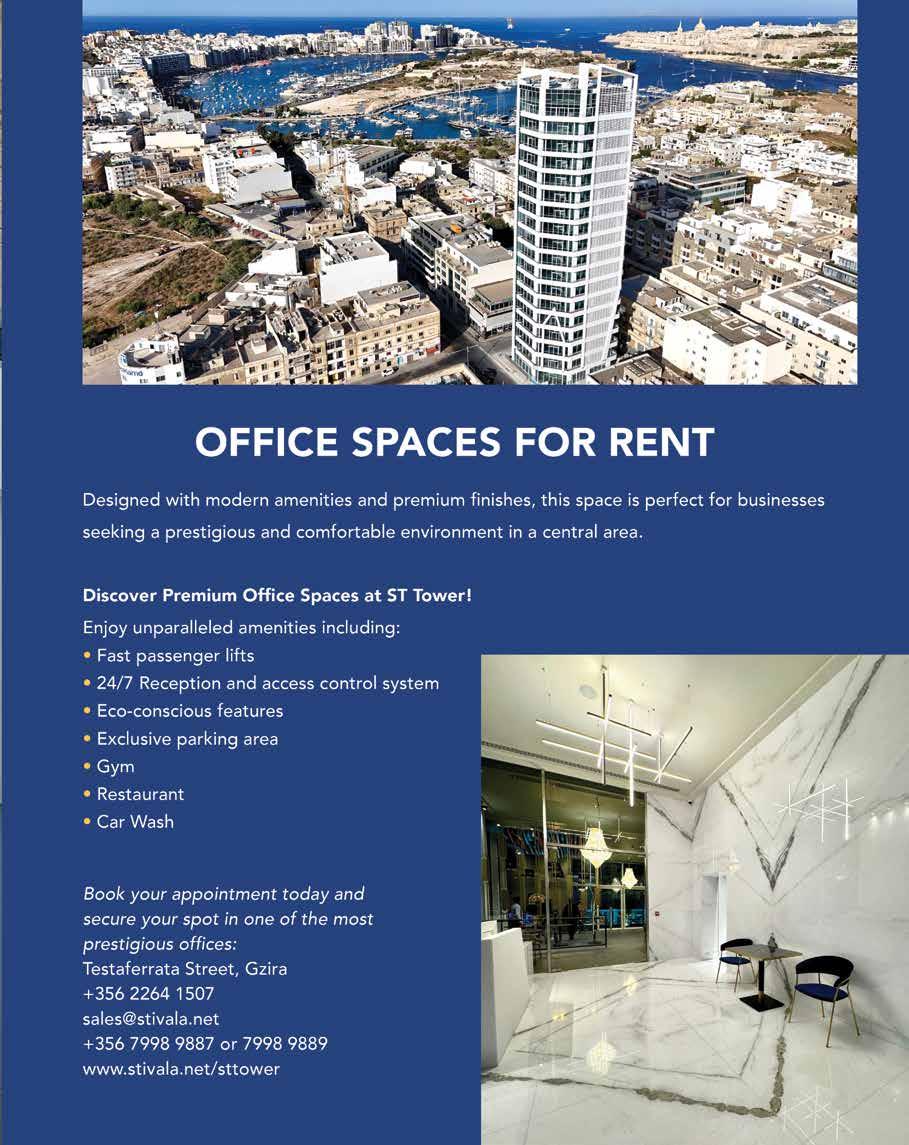





























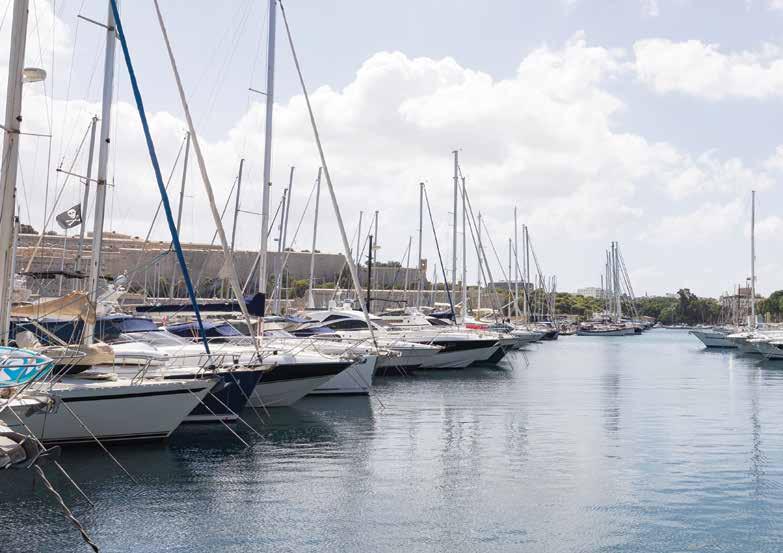
Welcome to the 2025 edition of Malta Invest, the global investment guide showcasing Malta as an attractive international investment destination. This is the largest and most comprehensive edition to date, supported by an expanded global distribution network. Malta Invest is now available in key strategic locations across London, Paris, Geneva, Frankfurt, Zurich, Dubai, Abu Dhabi, Brussels, and Malta. Distribution points include leading business centres, investment banks, corporate firms, luxury hotels, private members’ clubs, embassies, firstand business-class airline lounges, and private jet terminals –making it a first for Malta.
Produced, published and owned by Content House Group –one of Malta’s largest media organisations in the online and print sectors – Malta Invest is the only international investment guide focused exclusively on Malta as a destination. It offers extensive content, actionable insights and detailed information across various sectors for investors considering Malta as a jurisdiction of choice.
This one-stop guide provides invaluable details on Malta’s schemes and incentives designed to foster private enterprise. The 2025 edition also features in-depth analysis and custom content, spotlighting the key public and private stakeholders
poised to assist investors on their journey. Readers will also find timely updates on current and forthcoming policy and economic developments.
The publication delves into Malta’s dynamic economic transformation, highlighting a country that thrives on innovation and progress. From iGaming and fintech to renewable energy and artificial intelligence, Malta is establishing itself as a hub for industries shaping the future. Meanwhile, established sectors like financial services and tourism remain robust, offering refreshed opportunities aligned with Malta’s ambitious vision. The country is also breaking new ground in superyacht services and fostering a vibrant startup ecosystem to drive innovation.
Malta’s allure goes beyond its business environment. The islands attract high-net-worth individuals with a compelling mix of Mediterranean charm, rich history and contemporary luxury. Whether investing in premium properties within Special Designated Areas or restoring historic townhouses, these investors are shaping Malta into a cosmopolitan hub of global significance.
This edition of Malta Invest serves as a comprehensive resource, guiding potential investors at every stage of their journey. Inside, you’ll find detailed industry overviews, expert insights from
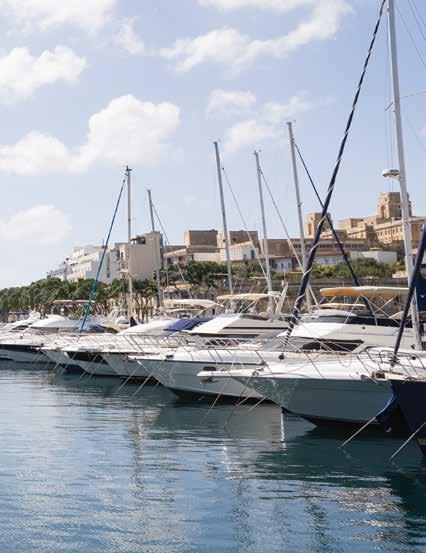
sector leaders and practical information on support schemes, tax regulations, residency requirements, and real estate opportunities. Contributions from industry experts and stakeholders further enrich the guide, equipping readers with the tools needed to make informed and strategic decisions.
When we say comprehensive, we mean it. By presenting a holistic view of Malta’s evolving economic landscape, this publication highlights the myriad opportunities available for both foreign and local investors in an economy that consistently exceeds expectations.
Finally, we’re excited to announce the launch of MaltaInvest.mt in early 2025 – the first online, AI-enabled investment guide dedicated to Malta. This innovative platform will offer investors, business professionals and entrepreneurs a centralised hub for accessing all the information they need to invest in Malta, powered by cuttingedge search tools and technology.
We hope you find this edition of Malta Invest invaluable. Your feedback is always appreciated and helps us continue to refine and improve this essential resource.
PUBLISHER
Content House
Quad Central, Q2, Level 2, Central Business District, CBD 1040, Malta
Tel: +356 2132 0713 info@contenthouse.mt www.contenthouse.mt
Malta Invest 2025 is published, produced and owned by Content House Group Ltd and its relevant subsidiary companies.
Visit MaltaInvest.mt, our new digital investment platform, for the latest business and investment news and updates.
EDITOR
Robert Louis Fenech
HEAD OF SALES & BUSINESS DEVELOPMENT
Marie Claire Camilleri
DEPUTY HEAD OF SALES & BUSINESS DEVELOPMENT
Godwin Buttigieg
CREATIVE DIRECTOR & DESIGN
Nicholas Cutajar
HEAD OF DIGITAL & MARKETING
Raisa Mazzola
ADMINISTRATION & CLIENT RELATIONSHIP EXECUTIVE
Rodianne Sammut
Content House Group Ltd would like to thank all the protagonists, sponsors, partners, advertisers, and all relevant private companies and public companies that have embraced this project and assisted the project team in the collation of information. The publisher would also like to thank all participants and interviewees who accepted to feature in this publication. Moreover, the publisher extends its gratitude to the entire project team who have made this project a success, and to the local and international distributors.
Malta Invest is strategically distributed for free in Dubai, Abu Dhabi, London, Paris, Frankfurt, Geneva, Zurich, Brussels, and Valletta. Our global reach includes distribution to top corporate firms, business centres, investment banks, airline lounges, and leading embassies. In the UK, the publication is also distributed in select luxury hotels, private members’ clubs, airline gate services, private jet centres, and at the Eurostar Lounge at London St Pancras. In Malta, Malta Invest is distributed to leading businesses, companies and corporate firms, as well as to prominent business leaders and CEOs, business centres, financial institutions, Government agencies and ministries, as well as yacht marinas.
The publisher cannot be held liable for any information that is published in this publication. Every effort has been made to ensure accuracy of information. The publisher cannot be held responsible for any decision based on the content published in Malta Invest, which is solely aimed as an informative guide.
The content appearing in this publication does not necessarily reflect the views of Content House Group Ltd, or of its subsidiary companies, as the publisher. All rights reserved. Reproduction in whole or in part without written permission of the publisher is strictly prohibited.
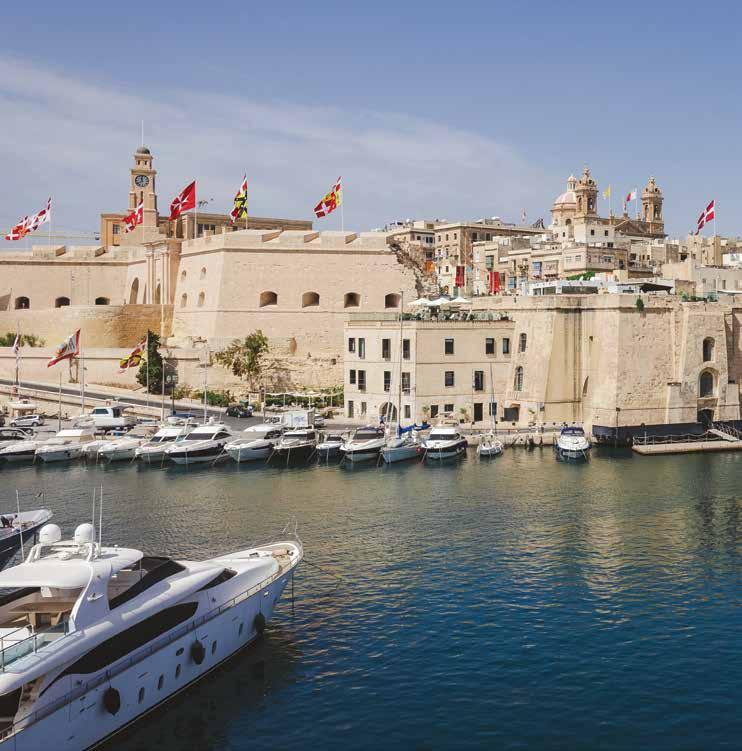
Why do so many individuals choose to live, work and invest in the smallest member state of the European Union?
If you find yourself pondering this, you’re in good company. Malta, a de facto pair of small islands in the heart of the Mediterranean, continually intrigues with its remarkable success story. As the EU’s tiniest nation, Malta punches well above its weight, boasting one of the Union’s strongest and most diverse economies. Currently, it is registering the highest economic growth in the EU. The European Commission’s official forecast highlights Malta’s achievements, noting that the Maltese economy continues to grow robustly,
driven by strong exports and domestic demand. Tourism flows have bounced back to well above pre-pandemic levels, and a strong inflow of workers is boosting domestic demand. After reaching 5.6 per cent GDP growth in 2023, the Maltese economy is expected to achieve a growth rate of 5 per cent in 2024 and 4.3 per cent in 2025.
Malta’s appeal is multifaceted. Its adoption of the euro in 2008 has provided stability and ease of business within the European market. An agile, highly skilled local workforce, proficient in English – an official language and the primary language of business – adds to its competitive edge. The island nation offers abundant opportunities
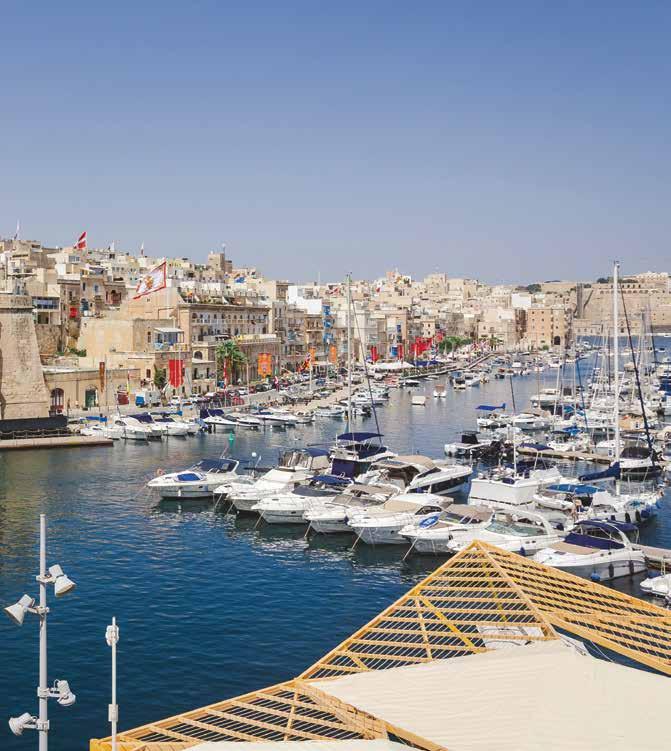
for investment and employment across various sectors, from finance and iGaming to shipping, aviation, pharmaceuticals, aquaculture, ICT, and chemical manufacturing.
Strategically located at the crossroads of north and south, east and west, Malta’s geographical significance has been recognised for millennia, shaping its rich cultural heritage. The island enjoys excellent year-round weather conditions, further enhancing its appeal as a desirable place to live and work. This makes it a popular destination for investors, global companies seeking a European presence, digital nomads, and thousands of expats. Additionally, Malta has made significant investments in education, cultivating a workforce capable of driving economic progress and innovation, which strengthens its position as an attractive hub for business and living.
Connectivity is another of Malta’s assets. Malta International Airport links the islands to around 100 destinations, ensuring easy access to major European cities. This robust connectivity is complemented by a solid digital infrastructure, facilitating seamless business operations. Moreover, Malta is experiencing a boom in tourism, a strategic industry that has attracted substantial investment to its shores. With over 3.5 million visitors, 2024 is expected to be crowned the record year in tourism, surpassing the previous year, which was the record holder until then.
Foreign investment flows have increased significantly over the years, with both Government and private entities doing their utmost to warmly welcome and facilitate such investment, and with service providers offering tailored, cost-effective solutions. The overall cost base, from human resources to real estate, remains competitive, rendering Malta an attractive destination for investors. Beyond the practical advantages, Malta offers excellent healthcare, a culture of innovation and a vibrant community that attracts individuals, families, startups, and multinationals. Moreover, safety is a hallmark of life in Malta, providing a secure environment for residents and businesses alike.
In summary, Malta’s unique blend of economic strength, strategic location, skilled workforce, and high quality of life makes it an exceptional place to invest and thrive. Explore the intricate tapestry of opportunities that Malta weaves and discover why this small island nation stands out on the global stage. Malta is proving its versatility through the diverse range of investment ventures it attracts to its shores. The country hosts an impressive array of industries, from aquaculture and film production to software engineering, education, gaming, financial services, and manufacturing. The 2025 edition of Malta Invest provides a comprehensive overview of Malta’s economy and delves into each of these economic sectors. Before diving in, it is worth outlining three broad pillars that underpin the country’s economic success: the stability it presents, the support it offers, and the access it grants to regional and global markets.
Gender Distribution in Malta 47%
563,443 as at end 2023 Total Population +4% Annual Population Growth
Population Density
1,783/km2
Malta ranks among the most stable and safest countries in the world, making it an attractive destination for foreign investment. It is governed by a parliamentary democracy led by two major parties that share a common understanding on economic matters, each building on the successes of previous administrations. The domestic political stability, combined with the safety net of Malta forming an integral part of the EU and the euro area, provides peace of mind for investors who continue to see the benefits of choosing Malta as a strong base in Europe.
That is not to say that Malta is immune from the challenges posed by global developments or local political issues at the domestic level. One of the toughest challenges Malta faced in recent years was high inflation, a phenomenon affecting the continent and beyond in the aftermath of Russia’s invasion of Ukraine. This delicate situation led to a cost-of-living crisis for many households and a significant increase in the cost base for businesses. Malta responded decisively by subsidising the cost of energy and fuel for investors, businesses and the population at large. Despite the EU labelling Malta’s approach as unsustainable, the decision contributed to a period of prolonged economic growth and stability, when other EU member states were facing economic woes and significant instability.
In Europe, inflation prompted central banks to raise interest rates after years of low rates. However, Malta’s highly liquid banks managed to maintain their long-term rates, providing enhanced stability for thousands of businesses, economic operators and investors in Malta. Consequently, local banks have continued to offer stable and competitive interest rates on commercial and business loans.
These examples highlight Malta’s ability to navigate through the current global situation while placing significant importance on the stability it offers to its population, investors and businesses operating in the country.
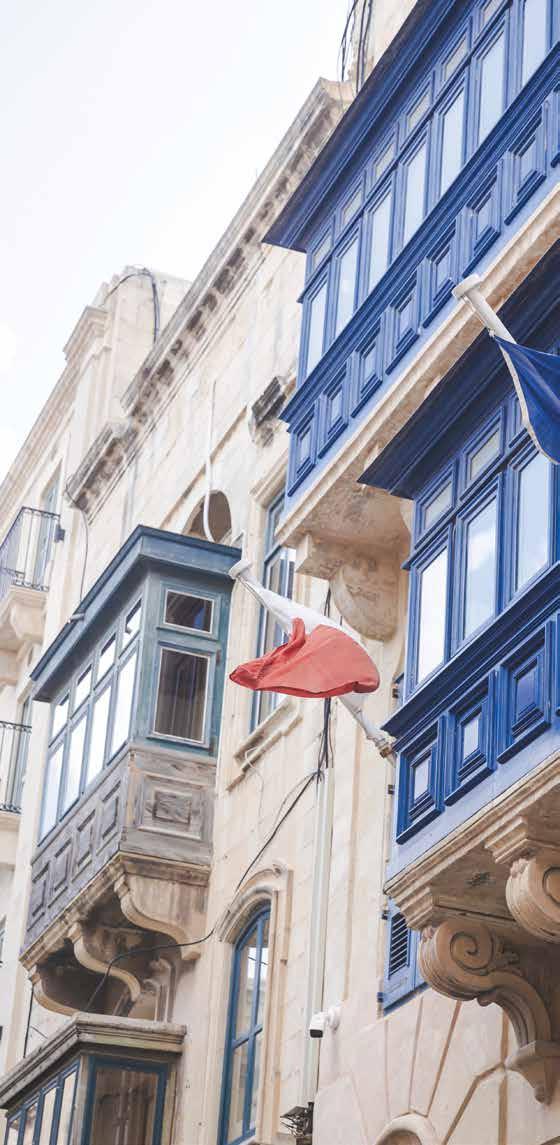


One of the important factors foreign investors consider when choosing their investment destination is the level of support they will find. This includes support from the workforce, Government agencies, the private sector, as well as access to domestic and EU grants. Therefore, the initial contact and experience can make all the difference.
Since Malta joined the EU in 2004, Government agencies and the private sector have upped their game and continue to evolve, demonstrating agility in assisting and welcoming foreign investment. Foreign investors and companies that have chosen to invest in Malta often praise the support provided by both private and public entities, as well as the consistent assistance from their local partners, who stand ready to provide guidance on a daily basis.
Malta’s extensive history as a destination for foreign investment has made private and public service providers adept at meeting the needs of incoming operators, ensuring that establishing a presence in the country is straightforward and transparent.
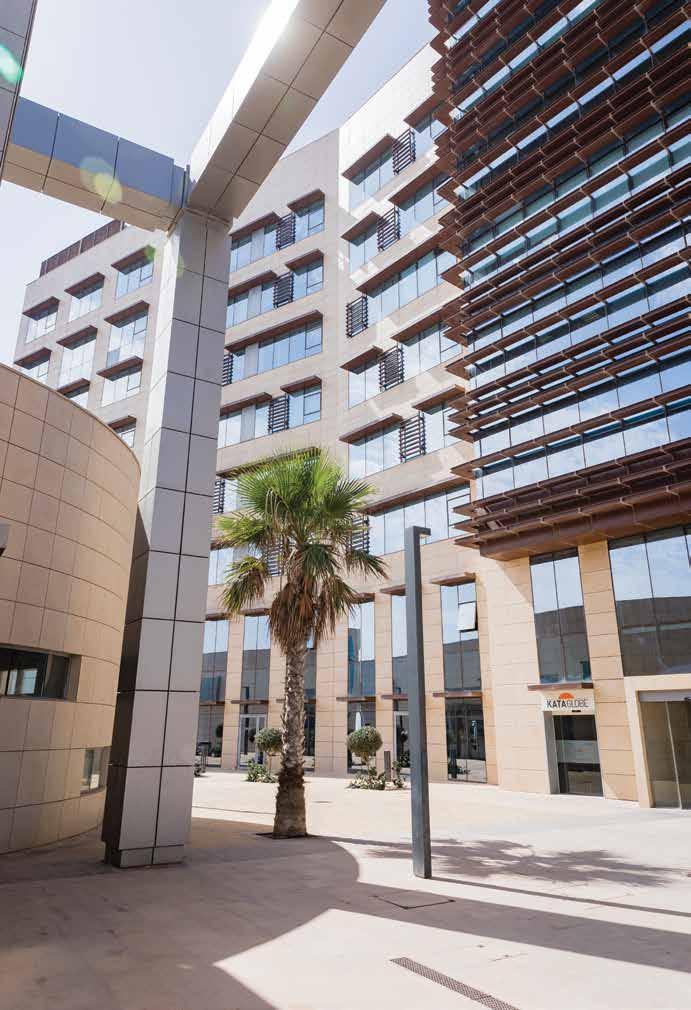
There are numerous initiatives and schemes available for investors to tap, ranging from grants and guarantees to tax credits and
free services. The primary support hub is Malta’s economic development agency, Malta Enterprise, which will be discussed in more detail in the next chapter (seep.60). At a macro level, the entire system is geared towards welcoming foreign investment. Due to the country’s small size, leveraging strong private consultants and corporate providers, along with utilising the information and assistance provided by public agencies, can create an effective hybrid approach to achieving your goals quickly and sustainably. This strategy ensures that even small and medium-sized businesses receive treatment comparable to that offered to much larger firms in other jurisdictions, including tailored assistance aimed at giving your company a competitive edge.
The support available extends beyond financial assistance, such as access to land in state-owned industrial zones. In terms of employment, employers will find that the local workforce is highly
skilled, dedicated, loyal, and capable of thinking outside the box. Companies unable to find the necessary talent locally can leverage the EU’s workforce of 200 million and potentially benefit from incentives to attract needed workers from abroad. Local educational and training institutes also prioritise understanding industry needs, allowing investors to have their say in the development of future human capital today.
Foreign investors will find a wealth of corporate service providers ready to assist with company registration, access to banking facilities, legal aid, recruitment, and all other requirements to set up a business. These professional services come at a much lower cost than in other major European cities. The same applies to technical services, human resources, rental costs, and support services, which remain significantly below the continental standard from a cost perspective, without compromising on quality.
Underpinning Malta’s strong economy are corporate, legal and judicial systems familiar to those accustomed to common law frameworks. These systems, essential for the smooth functioning of business, have been further strengthened through the implementation of EU regulations and directives. Moreover, the establishment of a commercial section within the Civil Court has been successful, and its jurisdiction over legal matters is expected to expand in the coming years. This extension will provide those with commercial interests in Malta the assurance of a specialised court dedicated to resolving disputes promptly and effectively.
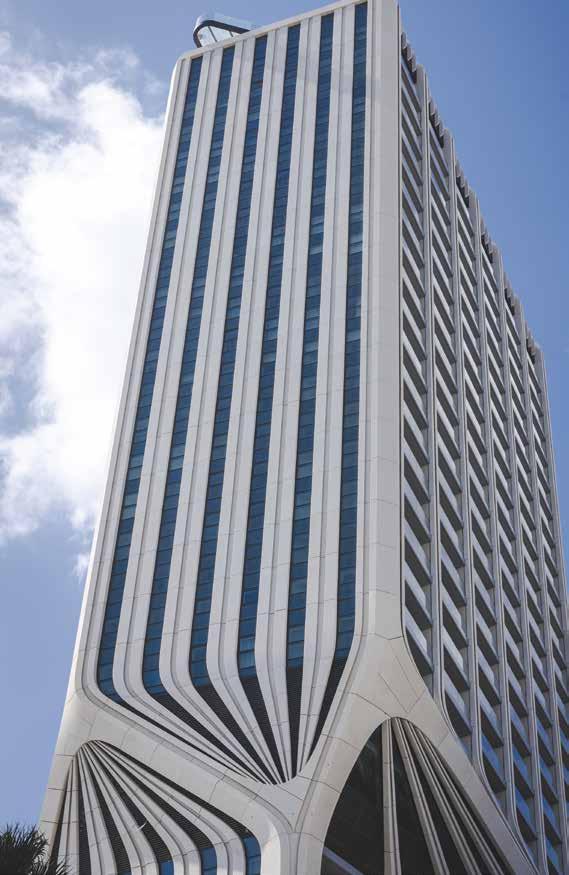
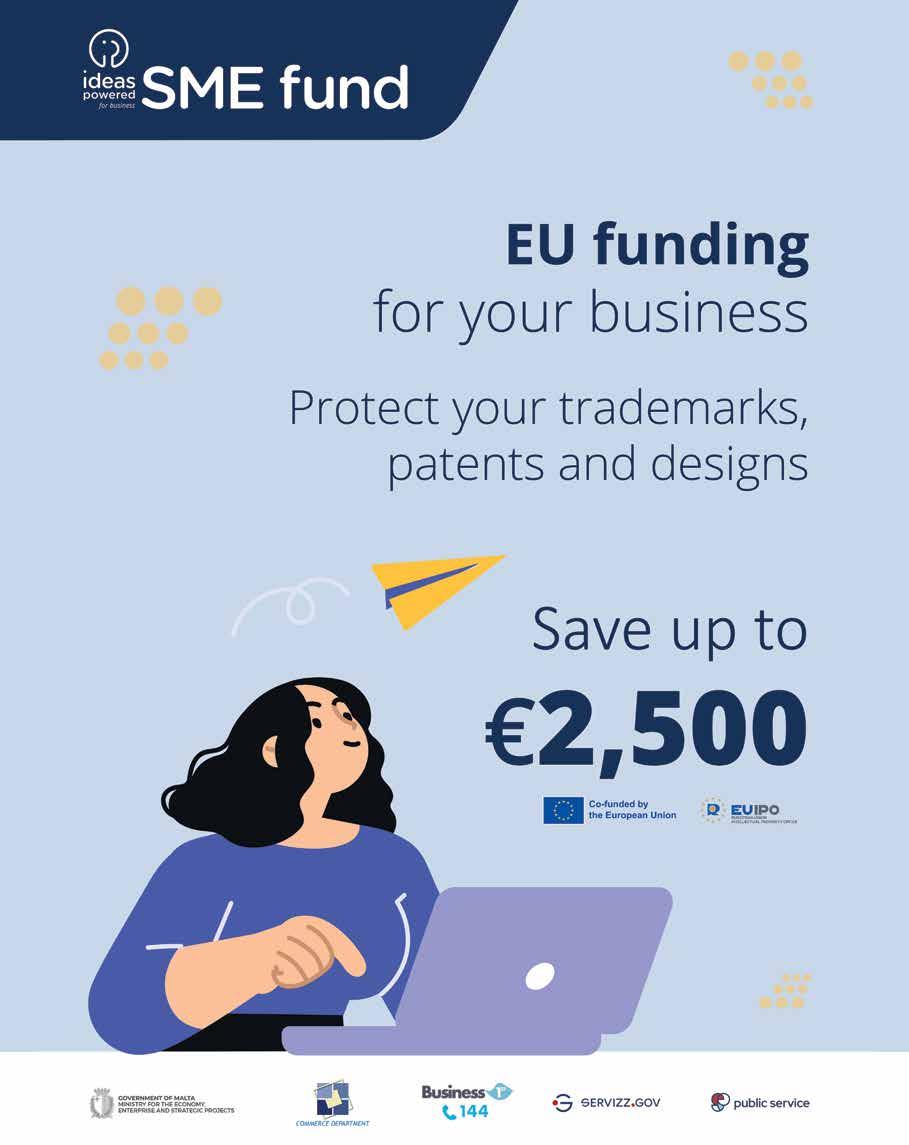
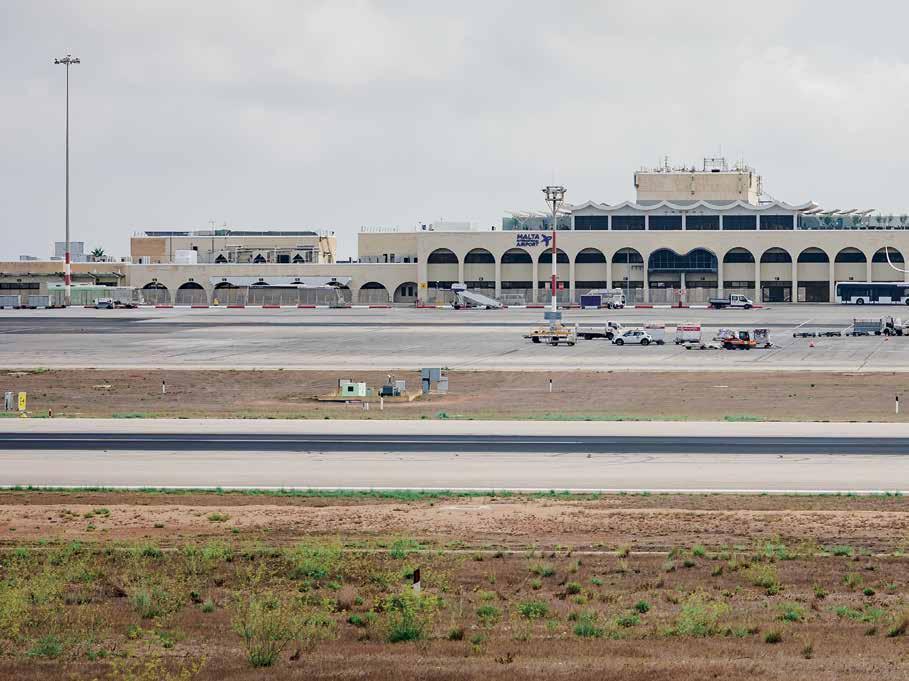
Make no mistake. Although Malta is often too small to be physically visible on world maps, its strategic location in Europe and the Mediterranean provides crucial access to the European bloc and its expansive Single Market. Malta’s proximity to Africa has also been pivotal in facilitating the expansion of local companies across various sectors, from manufacturing in the food and drink industries to software development, into North Africa and other parts of the central Mediterranean region.
Malta lies at a crossroads of civilisation, a strategically advantageous position that, combined with its membership of the EU’s Single Market, makes it an ideal location for companies seeking a base for international business operations.
Savvy investors have long recognised this potential. The textile factories that initially spurred foreign direct investment in Malta have since given way to more sophisticated production facilities
and import/export businesses, particularly those engaged in trade with European and North African markets.
One major artery for the flow of goods is Malta’s world-class port infrastructure. The Port of Valletta, also known as the Grand Harbour, serves as the primary entry point for people and goods arriving by sea. It stretches approximately 3.6km inland and offers a wide array of services, including ship repair and building yards, ship chandelling, bunkering facilities, and specialised silos. On the southern end of the main island lies the Malta Freeport, one of the Mediterranean’s largest transshipment hubs with over 120 global connections.
Another crucial artery is Malta International Airport, the first and last destination for over 95 per cent of all visitors to Malta. The airport connects Malta to over 100 destinations, including most regional capitals and major cities, many of which are less than three hours away. Annually, over 18,000 tonnes of cargo
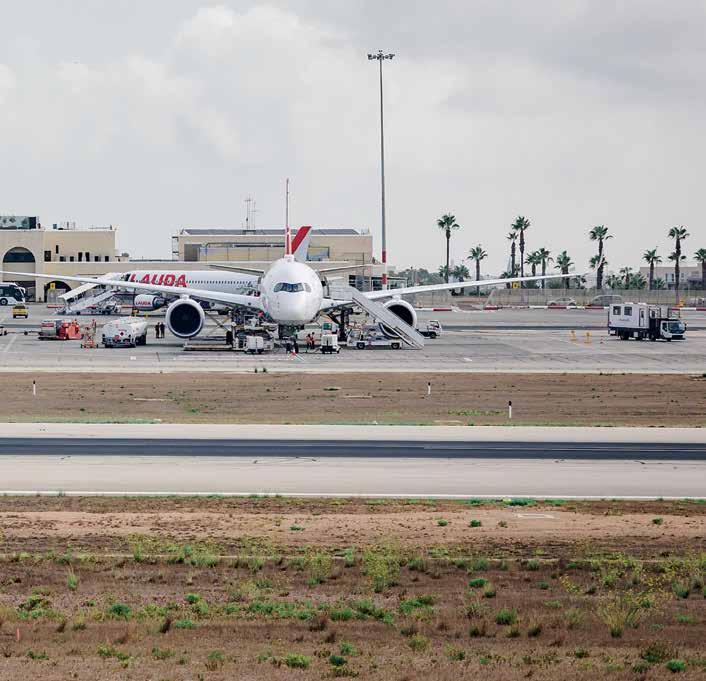
Over decades, Malta has offered foreign investors and companies an attractive tax regime that enables foreign-owned firms to save money. In a nutshell, these are key elements of Malta’s tax structure for foreigners:
No withholding taxes on dividends, interest, royalties, or proceeds from liquidation distributed to non-residents
No separate capital gains tax
No wealth taxes
No inheritance taxes
No stamp duty on asset transfers by companies carrying out international activities
pass through the airport, making it the primary hub for Maltese operations of global companies such as DHL and Servisair. Additionally, the airport hosts several maintenance facilities, including those operated by Lufthansa Technik, Ryanair, and most recently, EasyJet.
The digital revolution and robust infrastructure supporting it have ushered in a new generation of export-oriented service firms. Continued investment in Malta’s digital connectivity has yielded significant returns, facilitating the growth of two pivotal sectors over the past 25 years: financial services and remote gambling. The success of these industries, reliant on fast and stable network connections, underscores the quality of Malta’s communications infrastructure. Building on this foundation, Malta has established itself as a hub for emerging technologies. Companies in dynamic fields such as fintech, edtech, artificial intelligence (AI), blockchain, Internet of Things (IoT), software development, and esports are increasingly choosing Malta as their base of operations.
That leaves income tax as the main instrument of corporate taxation. The standard rate is 35 per cent, but foreign-owned companies are eligible for refunds that can bring the effective rate down to as low as 5 per cent.
Crucially, foreign firms whose business is controlled or managed in Malta are subject to the Maltese regime, to the extent that income from abroad is remitted to Malta.
The bottom line is that Malta’s taxation framework can be highly advantageous for foreign companies and investors. More details can be found in the next chapter (seep.68)
Is Malta in the European Union? What about Schengen?
Malta has successfully been a European Union member state since 2004 and joined the Schengen Area in 2007.
What currency does Malta use?
Euro. Malta joined the euro area in 2008.
Is Malta a rich country?
Malta has been the fastest-growing EU economy for three years running, with the latest statistics showing that Malta’s GDP per capita is 5 per cent higher than the Eurozone average.
What are Malta’s top exports?
Malta’s top material exports include petroleum products, pharmaceuticals, electronics, and fish, while its main services exports are related to the tourism and travel, remote gaming, financial services, and professional and technical consulting sectors.
Is finance readily accessible?
Since the main commercial banks have high liquidity, interest rates in Malta have remained stable and competitive. The Malta Stock Exchange is also a popular avenue for companies looking to tap the local capital market, while a recent push to encourage venture capital and private equity activity has started to yield results. However, bank finance remains the most popular way of financing corporate projects. There are around 25 banks active in the country, ranging from midsized local banks to branches of foreign institutions and specialised operations. Most have competitive fees while providing tailor-made banking solutions, including trade and project finance, custodian banking and specialist wealth management services.
Does everyone speak English?
Yes. Practically the entire workforce is proficient in English. Italian is also widely spoken, and the local population’s knowledge of French, German and Spanish has grown since joining the EU. A boom in the foreign-born population has also increased the number of people who speak other languages, ranging from Swedish and Polish to Arabic, Mandarin and Hindi.
Is Malta safe?
Malta is considered a very safe country where theft and violence are isolated incidents.
How’s the weather?
Malta enjoys over 300 days of sunshine every year, with mild winters and hot summers.
What’s the healthcare like?
Malta boasts excellent public healthcare. A thriving ecosystem of private healthcare providers is similarly recognised for the high quality of care it provides, and the country has in recent years been taking tentative steps toward promoting itself as a destination for medical tourism.
What are the residency options available?
Foreign investors have several residency options available to them. These range from full citizenship through naturalisation to retirement schemes and special residency options for digital nomads. You can find out more on the subject in the relevant chapter (seep.92)
Can I buy property on the Maltese Islands?
Yes, although holders of foreign passports are limited to only one residential property unless it is in one of several Special Designated Areas around the islands. For more information, see the chapter on real estate (p.120)
How many expats live in Malta?
There are around 100,000 people born abroad who now live in Malta. Many of these live in the cosmopolitan North Harbour region, surrounded by luxury residences, high-end shopping and excellent leisure opportunities.
Speaking of leisure, what is there to do in Malta?
Malta’s cosmopolitan lifestyle, coupled with its traditional charm, offers a unique blend that few places can match. The country has retained its island culture, with the relaxed Mediterranean way of life being a major selling point for those considering relocating. There is a wide
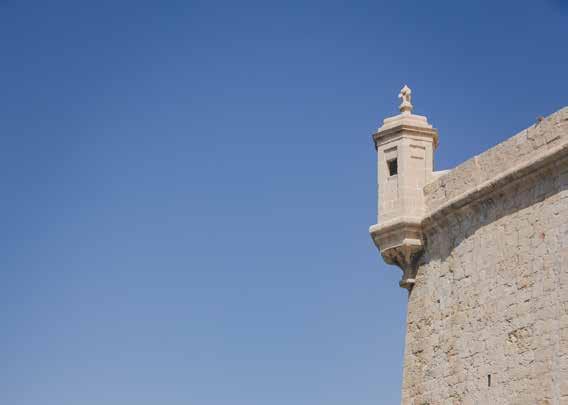

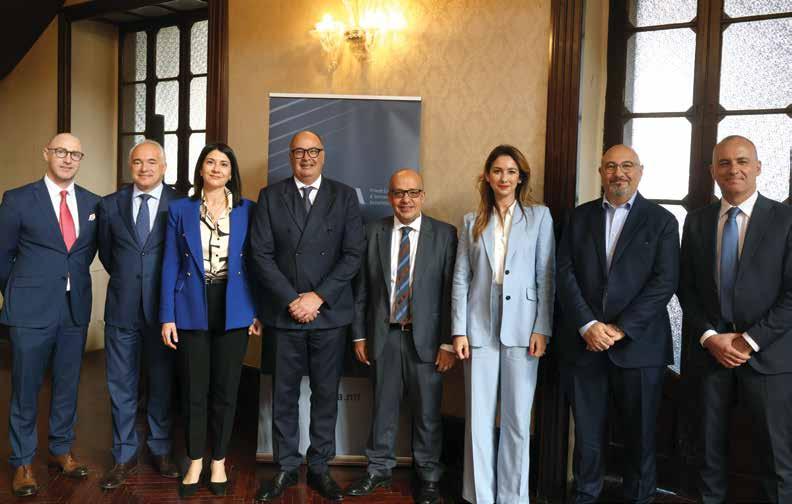
The Private Equity Venture Capital Association of Malta (PEVCA Malta) is at the forefront of strengthening and expanding the private equity and venture capital ecosystem on the island. As the gateway to new investment opportunities, PEVCA Malta is dedicated to fostering a dynamic environment for investors, fund managers, family offices, and service providers alike.
As we look ahead to 2025, PEVCA Malta is poised to deliver a series of impactful events and initiatives that will solidify Malta’s position as a destination for private equity and venture capital in the Mediterranean.
Research and Industry Recommendations
In 2025, PEVCA Malta will publish new research focused on the current state of private equity and venture capital activity in Malta, with a detailed examination of the funds market.

This report will serve as a key resource for industry stakeholders, offering critical insights and actionable recommendations aimed at policymakers to encourage growth and stability in the sector.
The research initiative underscores PEVCA Malta’s commitment to evidence-based advocacy and fostering a regulatory environment conducive to investment and economic development.
Professional Training Programmes: Advancing Industry Expertise To build a robust pipeline of skilled professionals and enhance the industry’s capabilities, PEVCA Malta is pleased to announce the launch of a comprehensive professional training programme.
Scheduled for May 2025, this first in a series of programmes will be led by Gavin Ryan, a highly respected private equity fund manager with over two decades of experience managing funds valued at hundreds of millions of euro. Ryan’s extensive background also includes advisory work with the World Bank. He has specialised in emerging and small markets – a perfect fit for Malta’s unique investment landscape.
PEVCA Malta’s first training initiative is designed for industry professionals seeking to elevate their expertise, as well as those aiming to transition into the field of private equity and venture capital. Participants will gain a deep
understanding of best practices, strategic fund management and innovative investment techniques, positioning them at the cutting edge of the sector.
PEVCA Malta is more than an industry association; it is a thriving network of professionals dedicated to mutual growth. Throughout 2025, members can look forward to exclusive networking events featuring distinguished international speakers and thought leaders in their space. These member meet-ups will provide invaluable opportunities for exchanging ideas, forming strategic partnerships, and discussing the latest trends impacting global and local markets.
PEVCA Malta gatherings serve as a platform where deals are brokered, partnerships are formed and innovation is sparked. With an agenda packed with world-class speakers and interactive panels, PEVCA Malta’s events promise to be highlights of the investment calendar for members and participants alike.
The PEVCA Podcast: Amplifying Malta’s Voice
One of the most exciting new initiatives for 2025 is the launch of the PEVCA Podcast. This series will spotlight key players in Malta’s private equity and venture capital landscape, featuring in-depth interviews with local stakeholders, regulators and international investors.
By offering a platform for candid conversations, the podcast aims to enhance visibility, inspire confidence among foreign investors and shine a light on the opportunities Malta presents. The podcast will serve as a strategic communication tool, helping to place Malta firmly on the map for venture capital and private equity innovation.
The board of directors at PEVCA Malta is spearheading ambitious outreach efforts aimed at attracting foreign asset managers to Malta. These initiatives will be executed in collaboration with national bodies to create a seamless investment experience and underline Malta’s appeal as an investmentfriendly jurisdiction. The outreach plan includes showcasing Malta’s strategic advantages, such as its favourable regulatory framework, skilled workforce, and connectivity to European and global markets.
PEVCA Malta continues to collaborate with key stakeholders, including the Malta Financial Services Authority (MFSA), to develop and offer advanced learning opportunities for members. This partnership ensures that the training and resources provided are in line with the latest regulatory standards and
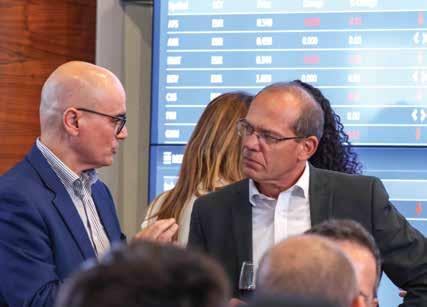
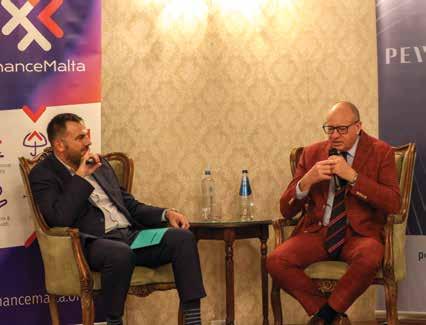
industry best practices. By equipping its members with superior knowledge and expertise, PEVCA Malta is laying the groundwork for a more competitive and vibrant private equity and venture capital ecosystem.
Malta’s advantageous position as a bridge between Europe and North Africa, combined with its business-friendly climate and robust legal framework, makes it an attractive destination for private equity and venture capital investments. With PEVCA Malta actively supporting these strengths through its initiatives and advocacy, there has never been a better time for investors to explore the opportunities this island offers.
Join PEVCA Malta in 2025 to be part of a transformative year filled with research breakthroughs, world-class training, high-impact networking events, and strategic outreach. Whether you are a seasoned investor, an ambitious professional or a new entrant to the field, PEVCA Malta is your gateway to leveraging the full potential of the Maltese private equity and venture capital landscape.
Learn more at pevca.mt

As DIZZ Group approaches its milestone 25th anniversary in 2025, Sarah Muscat Azzopardi discovers the story behind the company’s entrepreneurial vision and strategic growth within Malta’s retail landscape.
From its humble beginnings with a single Terranova franchise in 2000, DIZZ Group has evolved over 25 years into a powerhouse of international fashion and food brands, reshaping Malta’s retail and dining sectors in the process.
Diane Izzo, its CEO and Founder, reflects on the company’s remarkable journey, affirming, “over the years we have successfully embarked on numerous exciting projects that have become significant milestones, forming part of the extended DIZZ Group today.”
Indeed, while the group began its journey with Terranova, over the years, it has experienced continuous growth across both the fashion and catering sectors. Today, as the CEO maintains, its portfolio boasts around 20 distinct brands, reflecting a diverse range of styles and culinary experiences.
The company’s growth has also been marked by significant financial achievements. “In 2016, we approached the Malta Stock Exchange

and listed our first bond on the main market, which was successfully oversubscribed,” Ms Izzo notes, adding, “then, in 2018 and 2020, we successfully listed another two bonds on the Prospects and IFSM markets, and this financing enabled us to achieve a remarkable level of growth as we reap its rewards.”
This financial strategy has enabled substantial growth, with the group now employing around 350 people, cementing its position as “a highly respected entity within the Maltese business community.”
The evolution from fast fashion to a diverse portfolio of brands has been strategic and measured, the CEO continues, noting that “in the initial years of our business, our main focus was solely on fast fashion brands, which remains an important and considerable portion of our retail business.”
However, the team soon identified significant opportunities elsewhere. “Over the years, as the market evolved, we saw opportunities in the mid and luxury retail segments, which we felt were important additions to our

portfolio. These brands complement our offering, providing clients with a wider range of products while helping us diversify our risk profile.”
Regarding the food offering, the CEO maintains, “cautious experimentation over the years has led to this pillar becoming a very important component of the group, and having the right people within the operation has always been vital for the success of this part of the business, which we continue to pursue. Today, we are proud to be a considerable player in the market, evidenced by prestigious brands approaching us to form part of the DIZZ Group offering.”
Despite its success, the company’s journey has not been without challenges, particularly during the global Covid-19 pandemic. “Top and middle management rallied around, along with all members of staff, to find better and leaner ways of operating to ensure that we steered through this extremely difficult period with the least impact possible,” Ms Izzo recalls proudly. “Despite the immensity of this challenge, not one of the DIZZ family lost his or her job, which in turn has created a deep sense of loyalty among our employees, helping us achieve more successes together.”
“In 2018 and 2020, we successfully listed another two bonds on the Prospects and IFSM markets, and this financing enabled us to achieve a remarkable level of growth.”


“By successfully introducing international brands to the local market, DIZZ not only enlivens the retail scene but also creates jobs and boosts the economy. Their presence shows that Malta can be a great place for business, which could encourage even more foreign investment.”
Edwin Pisani, Group General Manager, elaborates on how the company has structured itself to manage its diverse portfolio. “DIZZ Group has really adjusted its management style to support growth across different sectors by adopting a decentralised approach. This means each division – such as fashion, food and retail – can operate independently while still fitting into the bigger picture. Each sector has its own specialised teams that focus on what works best in their markets, which helps them stay agile and responsive to trends,” he says.
Highlighting that collaboration is key to their success, the General Manager continues, “we also encourage collaboration between the divisions, sharing ideas and innovations that can benefit everyone. This teamwork helps them find ways to streamline processes, such as using similar marketing strategies or optimising their supply chains.”
Denise Bonello, COO of Retail Fashion, provides insight into the group’s approach to managing different market segments, emphasising the importance of market understanding, product differentiation and marketing strategy, together with customer experience and sustainability, in successfully navigating the fashion spectrum.
The introduction of mid-range designer brands has been transformative for the group, she explains. “Introducing mid-range brands has broadened our customer base, allowing us to cater to a larger segment of customers who seek quality products at affordable prices,” Ms Bonello says, adding, “the introduction of these brands
has diversified our product assortment. We now offer more versatile and classic pieces alongside trend-driven items, appealing to both everyday wearers and style-conscious shoppers looking for fashion that suits a range of occasions and price points.”
Looking to the future, the COO highlights the importance of sustainability and digital transformation: “As consumers in Malta and globally become more environmentally conscious, there will be increased demand for sustainable fashion. All our partners have already introduced collections focused on sustainability and ecofriendly products.”
The group is also investing in digital transformation, she notes, through user-friendly websites, apps and CRM systems, while focusing on building long-term relationships through personalised service. Meanwhile, in-store events and community building are also crucial, Ms Bonello adds, as they “allow customers to engage with the brand in a more relaxed and social environment, helping to foster deeper connections.”
Finally, the group’s food division has experienced remarkable growth under the leadership of Nicolai Cachia, Operations Manager for Food. “We recognised a growing interest in quality dining experiences, particularly in the casual and fast-casual sectors, which align well with the evolving lifestyle of consumers,” he explains. “Our strategy centres on curating unique brands and fostering local talent while maintaining high standards of food quality and service. We also pay close attention

to operational efficiency, integrating modern technologies to streamline our supply chain and enhance customer experience.”
Indeed, with the launches of Ladurée and Paul, DIZZ Group is set to further enhance Malta’s culinary landscape.
For Ladurée, known for its luxurious Parisian charm and world-renowned macarons, Mr Cachia affirms, “we will position the brand as a high-end destination for those seeking elegance, indulgence and refinement. Our goal is to make Ladurée the go-to choice for those celebrating special moments or looking for a premium café experience.” Meanwhile, Paul, with its rich history of artisanal baking, will be positioned as “an approachable, everyday experience that brings authentic French bakery culture to Malta. Our focus will be on offering high-quality, freshly baked goods and light meals in a relaxed, inviting environment.”
Meanwhile, the acquisition and revitalisation of the Michelin-recommended Marea restaurant represents another strategic move for the group. “Marea adds a new dimension to our offerings, particularly in the upscale dining category, allowing us to diversify our reach and appeal to a more premium market segment,” the Operations Manager notes. “By revitalising Marea, we aim to create a destination that combines exceptional cuisine with an outstanding atmosphere, catering to both locals and tourists seeking a refined yet approachable dining experience.”
As a major player in Malta’s retail sector, DIZZ Group’s impact extends beyond its business success. The company emphasises both employment and skill development – as one of the island’s leading retailers, the group provides a diverse range of job opportunities, employing a considerable number of individuals. “This not only helps to reduce unemployment rates but also supports local communities by offering stable jobs,” they state.
The company is also committed to fostering talent and enhancing skills within Malta’s workforce. “Through workshops, team-building and comprehensive training programmes conducted both locally and abroad, we equip our team members with the skills that not only benefit their personal career growth but also contribute to the overall improvement of the retail sector in Malta.”
Emphasising the group’s significant role in Malta’s economic landscape, General Manager Edwin Pisani notes that, “by successfully introducing
international brands to the local market, DIZZ not only enlivens the retail scene but also creates jobs and boosts the economy. Their presence shows that Malta can be a great place for business, which could encourage even more foreign investment.”
Overall, the team behind DIZZ Group is dedicated to creating a positive impact on the Maltese economy by promoting sustainable employment practices and investing in the future of the island’s workforce.
And as DIZZ Group looks towards international expansion, leveraging its territorial rights across Europe, the focus remains on maintaining quality and consistency across all brands. Their approach involves “setting clear standards for quality, training the team to deliver excellent service and gathering feedback to identify areas for improvement. Regular quality checks will help us stay on track, while sharing ideas and best practices among brands will ensure everyone benefits from each other’s successes.”
With its diverse portfolio of fashion and food brands, strong commitment to employee development and strategic vision for growth, DIZZ Group is poised to retain its position as a leading force in Malta’s retail and hospitality sectors as it celebrates its 25th anniversary and looks towards future expansion.
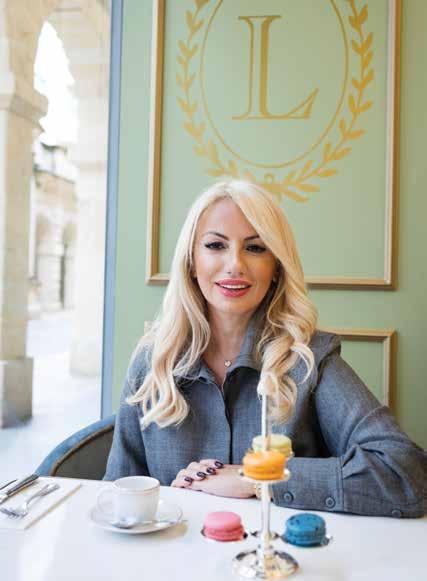


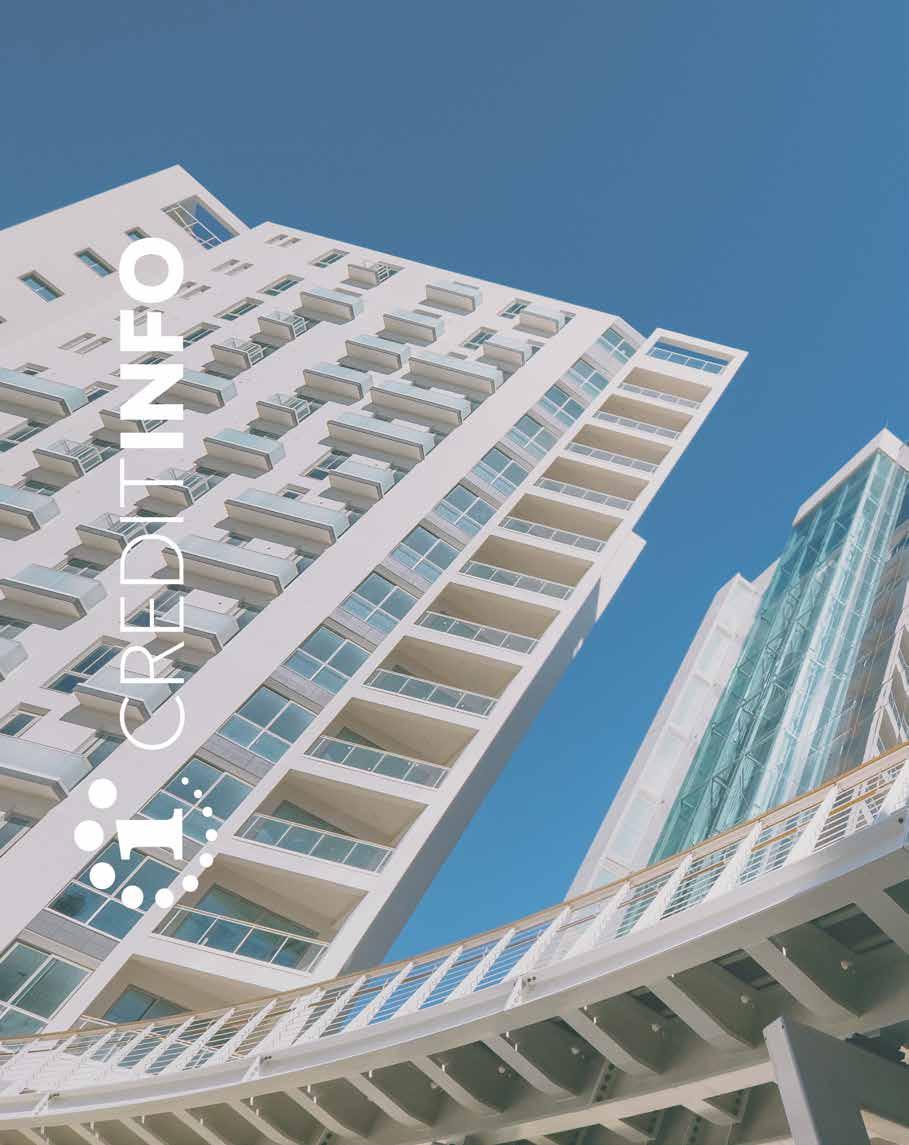
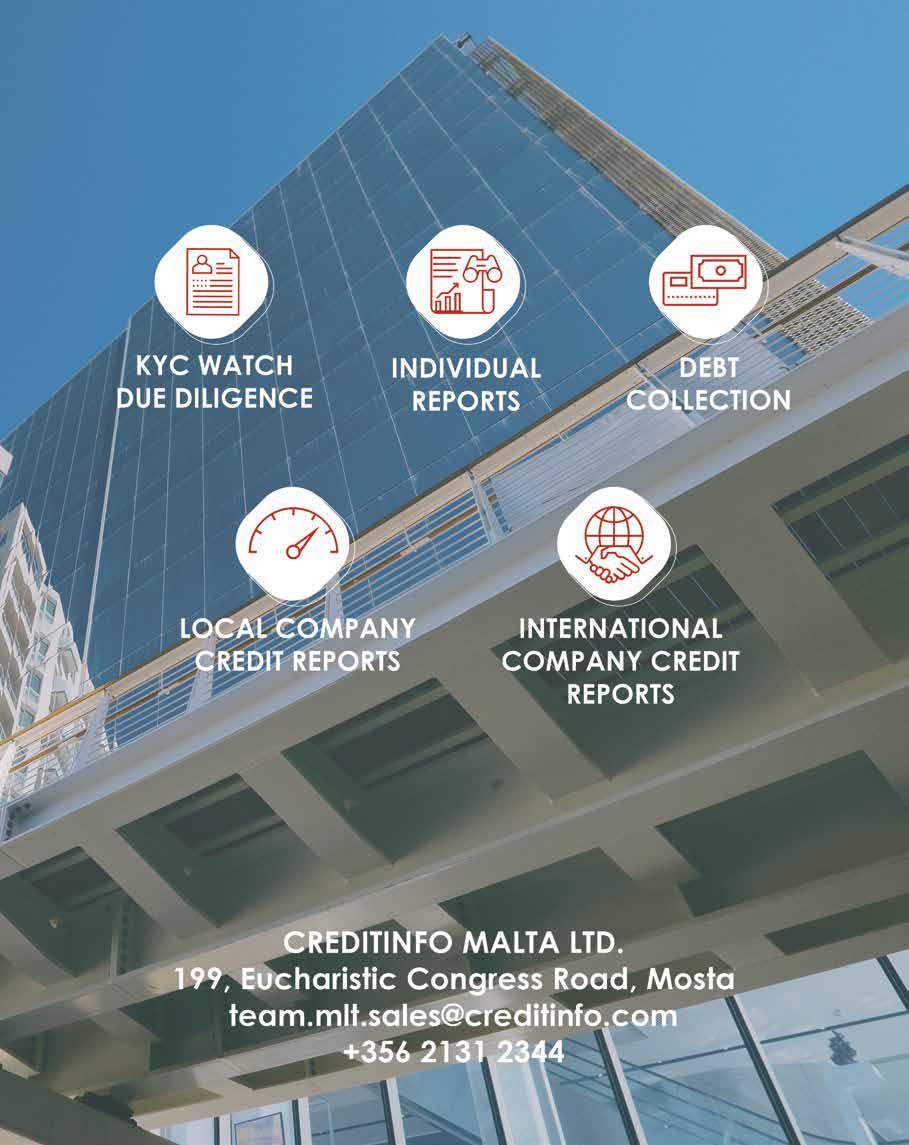


Foreign investors looking to establish a base in Malta will find no shortage of support. The country’s public and private service providers know what newcomers need, from the initial exploratory phase through to business set-up and beyond. Nurturing relationships with local partners is essential, ensuring that establishing a presence in Malta is relatively straightforward, inexpensive and fast, whether you are a startup or an established multinational. Expert guidance, typically provided by highly skilled and experienced advisory and corporate services firms, can help you navigate and maximise the potential gains offered by Malta’s legal, corporate and tax frameworks.
Several Government agencies are also dedicated to streamlining the bureaucratic process, and the country’s small size means that many authorities are just a phone call away. The relational nature of business in Malta means face-to-face meetings, where possible, are highly recommended, as they are crucial to cultivating genuine contacts.
Anyone seriously considering Malta as a destination for their investment, whether it is a branch of an established company, a back-office department, a startup, or an innovative business model, would do well to engage a local advisory firm and visit the islands to meet with the relevant authorities, agencies and private associates. Malta is more than the sum of its parts, and that intangible magic is best experienced in person, where the whole system geared toward attracting legitimate foreign investment can be seen and felt first-hand.
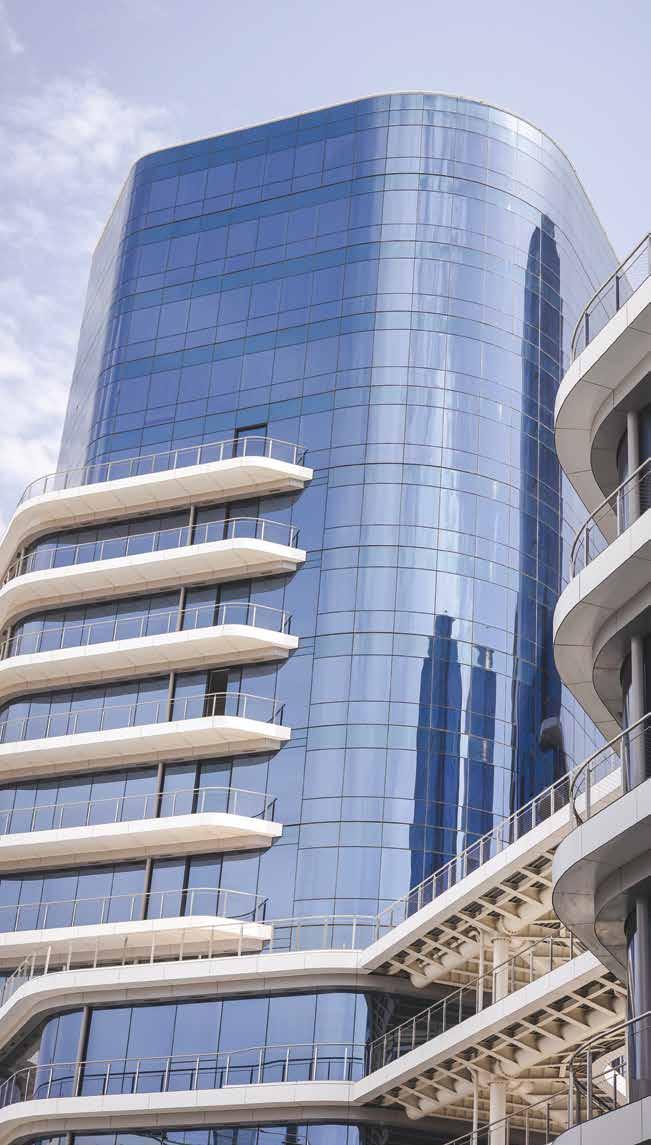
Malta’s corporate services providers (CSPs) have earned a stellar reputation for their unwavering commitment to safeguarding and advancing their clients’ interests. Their indepth understanding of the country’s dynamic and evolving economic and regulatory landscape makes them essential partners for anyone contemplating investing in Malta. Wellversed in the various incentives and support mechanisms available to foreign investors, these local partners can assist with everything from securing grants and tax benefits to finding the perfect industrial space, unlocking the full potential of Malta’s business environment. Other assistance provided includes obtaining work permits for employees, securing residency, applying for licences, opening bank accounts, and handling other requirements a prospective investor may face.
Clients often commend CSPs for their dedication to understanding their unique needs and for taking the time to listen, analyse and develop bespoke solutions that align with investors’ specific goals and objectives. Moreover, their tenacity and proactive approach ensure they are always looking out for your best interests, navigating challenges and seizing opportunities on your behalf. Just as importantly, by partnering with a local corporate services provider, you gain access to their network. Entering a new business environment with the right introductions and guidance can make all the difference, significantly facilitating the entire process.
Foreign investors would do well to engage with local stakeholders in the specific sector in which they operate. For example, those venturing into manufacturing, research and innovation projects will find critical support and resources at Malta Enterprise. In fact, the national economic development agency should be involved in any investment, since it can provide invaluable backing through its many support schemes – more on Malta Enterprise on the next page.
For those in the financial services sector, the Malta Financial Services Authority is a key contact, offering detailed counsel on the regulatory framework governing financial services in Malta. Finance Malta, meanwhile, is a public-private partnership providing critical insights into market-related matters and supporting the sector’s growth. Engaging with these organisations will help financial services firms navigate the complex regulatory landscape and identify opportunities for growth.
Investors interested in the iGaming industry should prioritise establishing a relationship with the Malta Gaming Authority (MGA). One of the preeminent global authorities on online gambling, the MGA offers comprehensive guidance on the legal and regulatory aspects of the sector, ensuring that businesses comply with local laws and regulations. Additionally, Gaming Malta serves as a valuable resource for those involved in the broader gaming industry, encompassing video game development, esports, and related fields such as augmented and virtual reality.
Beyond these specific sectors, investors can access information and support from a variety of public and private entities within the Maltese business community. Chapter 10 of this publication provides a comprehensive list of these organisations, offering a useful starting point for any investor looking to establish or expand their business in Malta.
Meeting with these stakeholders not only provides practical support but also helps investors build essential networks within the local business community. These connections can prove invaluable as businesses navigate the challenges and opportunities of operating in Malta. By leveraging the expertise and resources of these entities, investors can maximise their chances of success and fully capitalise on all that Malta has to offer.
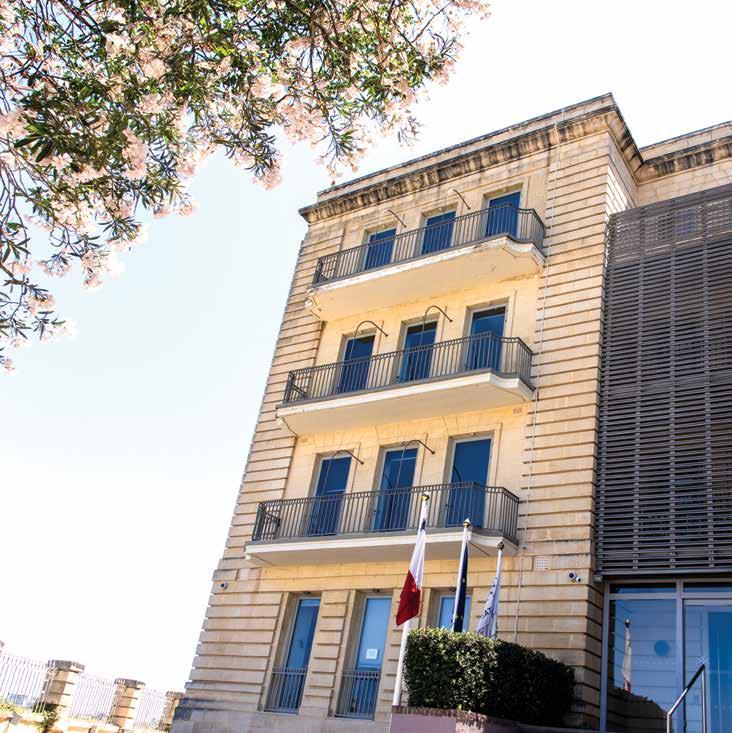
The ideal first port of call for any prospective investor, whether local or foreign, is surely Malta Enterprise, the country’s economic development agency. Its services include pre-investment fact finding to acquaint potential investors with the realities of operating in Malta, allocation of industrial space, access to finance, investment credits, and bespoke schemes to assist in export activities, research and development, and more, giving beneficiaries a competitive edge.
The agency also operates Business1st, a one-stop-shop platform that serves as a single point of contact to Government business information and services. The recently revamped
digital service, launched in 2024, has made setting up a company easier than ever, eliminating the need to fill out similar forms for different agencies and significantly streamlining the entire registration process. More digital services will be added as part of a multi-year plan to reduce bureaucracy and fully leverage digital systems – efforts that are set to make incorporation in Malta smoother and more efficient.
To extract the utmost value from these services, companies and individuals looking to start operations in Malta should engage with Malta Enterprise at the earliest stage possible, and be frank about their investment goals and needs. The team has extensive experience in lending an ear and extending a hand – use it!

The incentives offered by Malta Enterprise can be pivotal in helping investors decide to establish operations in Malta. Below is a small sample of the agency’s offering, which are regularly updated in line with changing economic realities. For the full, current list, visit its website www.maltaenterprise.com
Accelerate
This incentive provides a grant of up to €100,000 to cover accelerator participation fees and startup expenses (such as travel, rent and corporate services provider fees) for ventures with potential for growth, that have a viable business concept based on sound technical and scientific knowhow, and that are in the process of developing the technology into a market-ready offering.
Research and Development
The aim of this incentive is to assist industrial research and experimental development activities required by industry. By way of example, it can be used to provide support for pilot studies or to undertake experimental development, such as for the creation of commercially usable prototypes. The incentive can also facilitate collaboration between industry and academia by funding the secondment of university experts to enterprise.
Start-up Finance
Through this measure, Malta Enterprise can provide startups with an advance of up to €1.5 million, provided they operate from a (long) list of Maltese localities and qualify as innovative enterprises.
Business START
Business START offers seed and growth funding, with an initial grant of up to €10,000 to help startups develop their business proposal and assess the feasibility of their idea, prior to seeking third-party equity.
Invest aims to sustain regional industrial and economic development in Malta by supporting initial investments in new establishments,
the expansion of existing facilities and the diversification of existing businesses engaged in strategic sectors. Support may be granted through loan guarantees, interest rate subsidies, cash grants, and tax credits.
This measure supports new business initiatives, expansions and transformation activities that lead to new opportunities, additional employment, increased competitiveness, or broader market reach, by providing up to €300,000 over three years, awarded as a tax credit or cash grant.
Micro Invest encourages undertakings to innovate, expand and develop their operations through a tax credit equivalent to 45 per cent (65 per cent for Gozo-based businesses) of eligible expenditure.
In collaboration with INDIS, the entity responsible for managing Malta’s state-owned industrial zones, Malta Enterprise helps companies to set up or expand operations in Malta by allocating developable land or space in existing buildings for various uses.
In line with the European Union’s goal to achieve climate-neutrality by 2050, Malta is incentivising the twin digital and green transitions by funding businesses that develop more sustainable processes. Beneficiaries can receive a cash grant of up to €100,000, capped at 50 per cent of the eligible costs in machinery and equipment, with a further tax credit of €40,000 awarded under certain criteria.
While each scheme has its own eligibility criteria, investments aligned with Malta’s strategic economic development objectives will be best placed to receive the most generous support. These priority areas include:
manufacturing management of waste and environmental solutions research and development activities
provision of industrial services and solutions to manufacturing operations
digitisation of processes
software development (including video games and entertainment systems)
health, biotechnology, pharmaceuticals, and life sciences
projects related to the green and blue economies maintenance, repair and overhaul of aircraft and other electromechanical equipment
artisanal works
services that are scalable internationally and not limited by geographic scope
projects aimed at improving business performance and fostering innovation
Paul Mifsud is CEO at Sparkasse Bank Malta plc, where he oversees company strategy and the bank’s overall business management. He was instrumental in expanding the bank’s presence in Malta, developing its investment services and wealth management division, and steering the bank to become a major player in fund custody within the Maltese market.
As a leading financial institution in Malta, how does your bank support foreign investors looking to establish or expand their businesses here?
Our banking services are specifically tailored to support entities investing in Malta, particularly those requiring licensing by a regulator in Malta. The country offers several opportunities to international investors to set up their operations here, and we aim to support this growth as effectively as possible.
In your experience, what are the most common financial challenges that foreign investors face when setting up in Malta, and how does your bank help address these issues?
Rather than facing financial challenges per se, I would say that it is more about obtaining the correct advice and understanding the correct processes to follow. Effective guidance, thorough knowledge of local regulations and managed expectations are key to successful partnerships. Our team has in-depth knowledge and expertise in our specialist sectors, allowing us to guide potential investors effectively and manage expectations from the outset.
Malta has been working to position itself as a fintech hub. From a banking perspective, how is the country’s financial infrastructure evolving to accommodate innovative businesses and new technologies?
Malta is well-positioned in this respect, remaining at the forefront with a suite of regulations that support this sector and that several
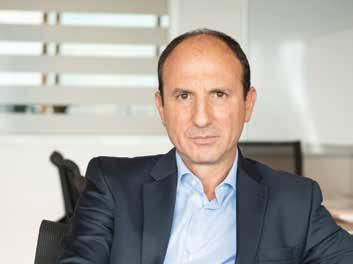
other jurisdictions seem to struggle to implement, such as the Markets in Crypto Assets (MiCA) Regulation.
How would you assess Malta’s current economic climate for foreign investment?
Malta is well-positioned for foreign investment, offering an EU jurisdiction with a robust framework and a network of service providers that enable businesses to establish operations effectively and quickly.
Given the global emphasis on anti-money laundering (AML) and know-your-customer (KYC) regulations, how does your bank balance the need for stringent compliance with providing efficient services to foreign investors? What should new investors be prepared for in this regard?
There is no compromise in this space – the laws and regulations are clear, and strict adherence is non-negotiable. These regulations are harmonised across the European Union, making it not just a Malta-specific issue. Savvy and experienced investors understand and welcome (and expect) stringent levels of compliance, as they support product integrity and instil confidence in the professional standards upheld by local practitioners.
Effective guidance, thorough knowledge of local regulations and managed expectations are key to successful partnerships.
George Gregory is the recently appointed CEO at Malta Enterprise, the country’s economic development agency tasked with attracting new foreign direct investment and facilitating the growth of existing operations. He has held partner positions at RSM Malta and other top tier firms, leading several high-profile projects, including acquisitions and restructuring plans.
As the new CEO at Malta Enterprise, can you outline the key incentives and support programmes that Malta Enterprise offers to attract foreign investors to the country?
Incentive schemes are crucial to proactively foster investment in key industries and therefore have to be relevant to the economic needs today, whilst also being forward-thinking to stimulate future growth. These schemes are aimed at assisting the establishment of new businesses, whether through greenfield investments by FDI companies, startups choosing to launch their business in Malta, local entrepreneurs developing a new venture, or established businesses looking to diversify into a new industry or become more sustainable ecologically.
Can you share some success stories of foreign companies that have established themselves in Malta with the assistance of Malta Enterprise?
Recent companies that Malta Enterprise has managed to attract to Malta include Torrent Pharma, a major Indian pharmaceuticals firm; R3Vox, an avant-garde sonar marine imaging firm; and GIMAS, a key player in green/clean technology from Turkey, which specialises in wind turbine manufacturing.

Over the last years, Malta Enterprise has also supported the growing startup and scale-up ecosystem by simplifying processes and enhancing incentives. This includes a mix of local and international innovators like Smart Materials, Tristatus, Hope Fertility, OpenIIOT, Axon Park, and edtech accelerator Supercharge Ventures.
We do not stop at the point of attraction but are now focusing even more diligently on our kick-off and retention processes. We have introduced an implementation unit to guide foreign direct investment (FDI) when setting up operations in Malta, ensuring businesses can hit the ground running. We also, of course, work with firms that have been established here for decades and have chosen to expand in size and operations, including internationally renowned companies like De La Rue, Trelleborg, Baxter, and Seifert. Our strategic foresight has also led us to focus on the semiconductor industry, securing Malta’s largest R&D project through the IPCEI2 application for STMicroelectronics Malta.
Looking ahead, how is Malta Enterprise adapting its strategies to address global economic challenges and maintain Malta’s competitiveness as an investment destination?
Over the past four years we have seen the global geopolitical environment becoming significantly more volatile, impacting Malta’s attractiveness as a business destination both directly and indirectly. While our size as a country can be seen as a limiting factor, it is in these situations that we can capitalise on our smallness. Being nimble in such market conditions brings significant advantages.
While our size can be seen as a limiting factor, we can capitalise on our smallness by being nimble in volatile market conditions.
As a country, we have consistently ensured business stability. On various occasions, the Government has absorbed shocks that businesses might otherwise have felt due to market developments. Having a sound and coherent Government policy for businesses has contributed positively to our appeal as an attractive FDI location.
ME’s overall strategy will remain focused on attracting high valueadding companies across different economic niches. From an FDI perspective, we are targeting a number of sectors; however, we will also be looking out for new opportunities arising from current market conditions. Our small size and agility can give us a valuable head start over our competitors.
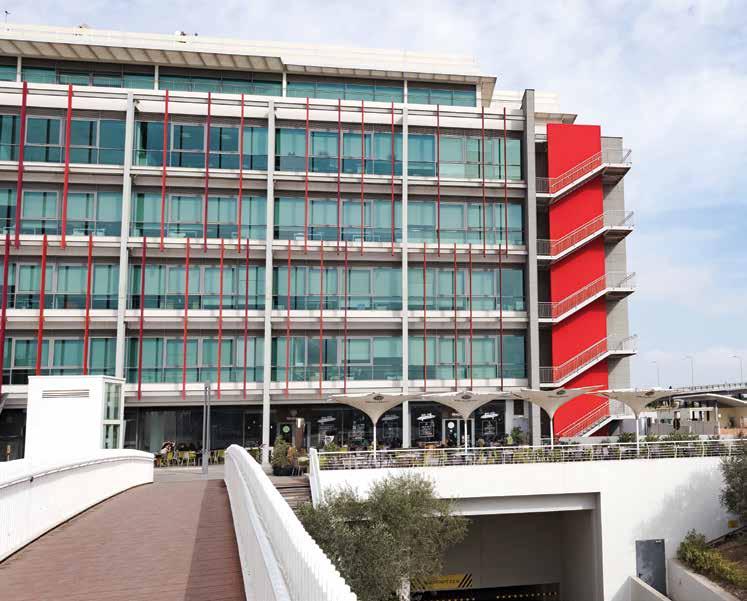
Many business activities require industry-specific licensing to ensure standards are met and regulations are enforced. The authorities have in-depth expertise in their respective sectors and can often provide help in getting your business up and running in compliance with local regulations. For companies involved in the below-listed sectors, it is advisable to establish early contact with the relevant authority. Their assistance can make all the difference.
Regulatory Authority
Malta Tourism Authority
Transport Malta
Malta Digital Innovation Authority
Malta Further and Higher Education Authority
Malta Financial Services Authority
Malta Gaming Authority
Malta Medicines Authority
Regulated Activity
Accommodation and catering
Aviation and maritime
Blockchain
Education
Financial services
iGaming
Pharmaceutical and life sciences
Malta Communications Authority Telecommunications
Foreign investors may also join trade bodies and associations active in Malta, both sectoral and general. Notable general associations include The Malta Chamber, the Malta Chamber of SMEs, the Malta Employers Association, and the Gozo Business Chamber. All four work tirelessly to represent the interests of Malta-based businesses and are highly active in publishing research, providing guidance and proposing improvements to the country’s business landscape, while serving as a platform for communication and knowledge-sharing among Malta’s key economic stakeholders. Many find that membership in such associations can be highly rewarding, facilitating their entry into the Maltese business community and generating new opportunities.

Gozo, Malta’s smaller sister island, is renowned for its tranquil ambience and breath-taking landscapes, offering an escape from the busy life of its larger counterpart – making it a favourite destination for expat retirees and digital nomads. However, Gozo’s allures go beyond the lifestyle it offers. Since being designated as the vanguard of the country’s twin green and digital revolutions, new opportunities have arisen in the development of high-tech solutions to the challenges facing Malta, Europe and the world.
In 2024, the Ministry for Gozo launched a new online portal to facilitate investment in the region (www.investgozo.gov.mt). The portal provides information on the different incentives available to investors in Gozo and highlights its comparative advantage in certain sectors. Many business support schemes offer more advantageous terms for Gozo-based companies, while other incentives are specific to Gozo, like reduced inter-island transport costs for manufacturing enterprises and several wage support measures, with the most generous reserved for firms engaged in knowledge-based activities.
Housed in a campus-style layout with two main buildings, the Gozo Innovation Hub is the home of the island’s knowledgebased industries. Managed by INDIS, the larger building is a 9,000sqm business centre split into units of various sizes, while the smaller building contains shared ancillary facilities like a conference hall and meeting rooms. Space in the Gozo Innovation Hub may be used by operations involved in, among others, back office and financial management, market research, media and audio-visual services, and new technologies like AI and machine learning, bioinformatics, cybersecurity, and the Internet of Things (IoT).
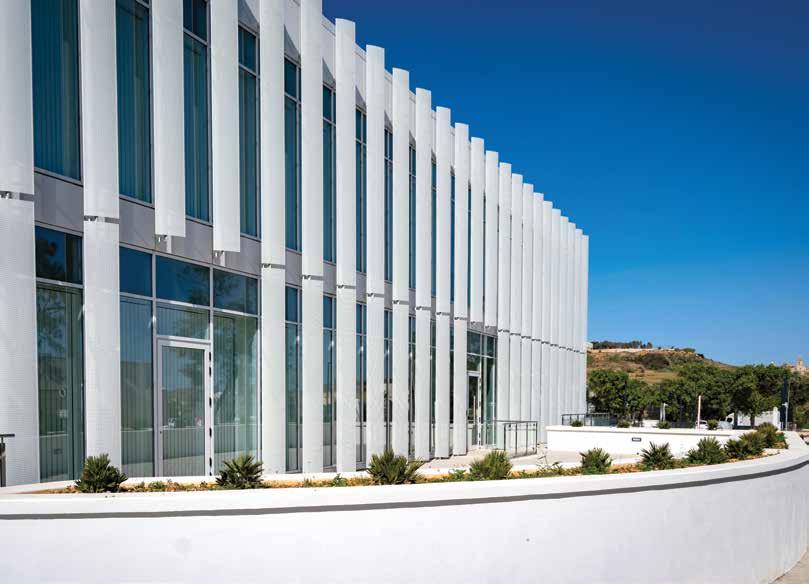
In recent years, Malta’s startup ecosystem has seen significant improvement as the country positions itself as a platform for international growth. Acknowledging that the domestic market alone does not offer the necessary economies of scales, the focus is on supporting young companies capable of selling their products and services across Europe and beyond.
Startups with a base in Malta can now benefit from a generous package of state support that includes grants and tax credits (Malta Enterprise), loan guarantees (Malta Development Bank) and seed guarantees (MIMCOL). This support was further enhanced in early 2024 when Malta Government Investments launched a €10 million venture capital fund aimed at helping startups set up operations in Malta.
However, a thriving ecosystem extends beyond financial support. The Startup Festival Malta is now a regular fixture on the calendar, while the prestigious EU-Startups Summit 2024 was also held in Malta, testament to the country’s growing cachet in the space. These events have proven invaluable in establishing Malta as an increasingly important player, backed by unwavering Government support.
Startup accelerators form an integral part of the ecosystem. The University of Malta’s TAKEOFF business incubator has been joined over the last couple of years by the world’s top edtech-focused accelerator (SuperCharger Ventures) and another which targets climate tech (Malta ClimAccelerator). These programmes attract a steady stream of foreign firms enticed to take their first steps in Malta – helped along by the Startup Visa extended to non-EU nationals, which creates an efficient route to residency for entrepreneurs as well as their teams.
Private sector interest has been slow to pick up, but is finally gathering steam after years of relative lethargy. Initiatives like the startup competition Pitchora and the TV show Shark Tank have played a crucial role in raising public interest, while JA Malta’s startup programme continues to attune youths to the huge potential that may await those willing to take calculated risks. Most promisingly, the final piece of the puzzle is now being addressed, with the establishment of a Private Equity and Venture Capital Association (PEVCA) in 2024, bringing together many of the country’s top financial institutions, investors and family offices.
The sector is growing rapidly as new initiatives and entities coalesce around the national effort to establish Malta as a startup hub, making this a hugely intriguing space to watch. As the country looks to its future, the investment in startups is already showing great promise, though the nature of the sector means that any optimism should be tempered with caution. Nonetheless, money is pouring in, and with it comes a new wave of hope for what could become another significant pillar of Malta’s economy.

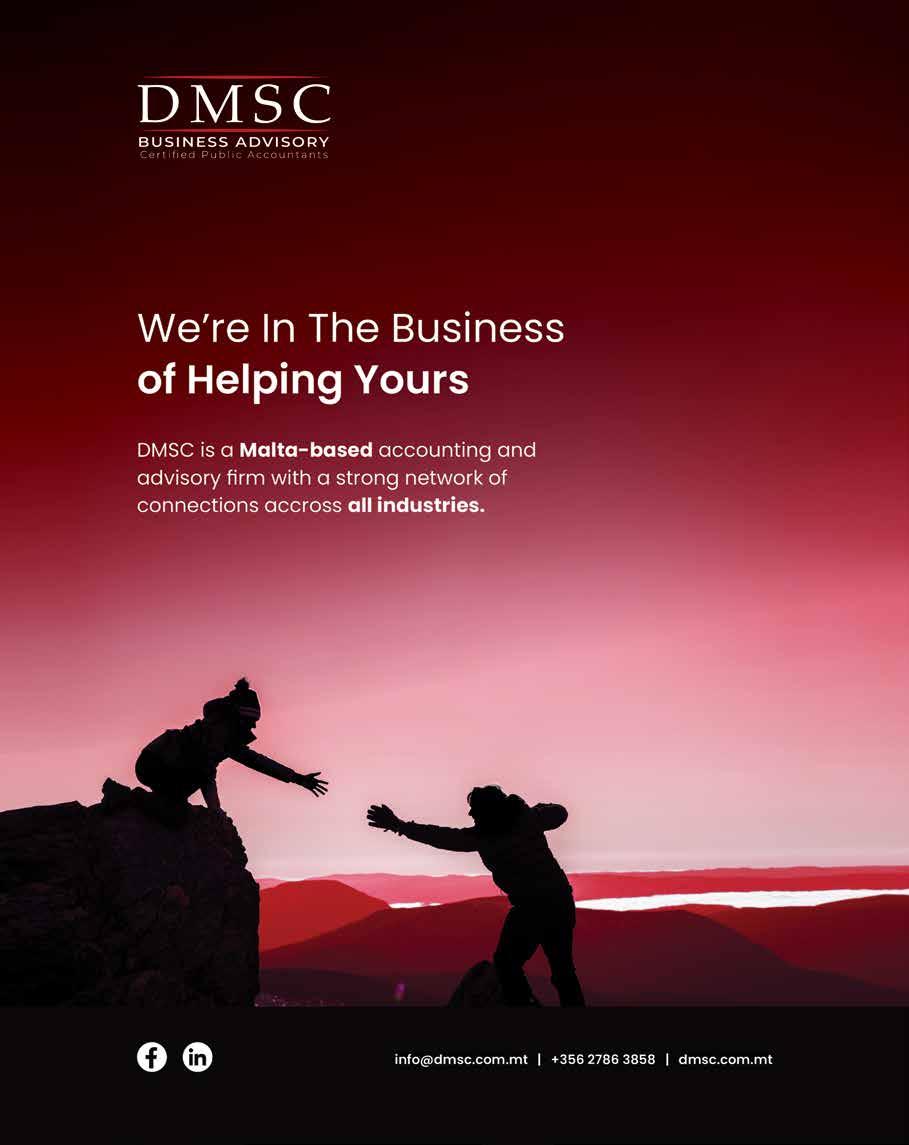
Malta offers foreign investors a highly attractive tax rate that is effectively the lowest in the European Union. This has served to attract companies from around the world, allowing them to mitigate their tax burden and maximise profits. Coupled with the lack of withholding taxes on dividends, interest, royalties, and proceeds from liquidation distributed to non-residents, as well as the absence of a separate capital gains tax, wealth or inheritance taxes, Malta makes for an interesting proposition for those seeking tax efficiency. Meanwhile, the country’s extensive network of taxation treaties and the provision of unilateral tax relief protects investors and entrepreneurs from incurring double taxation.
The numerous foreign firms present on the islands can attest to the substantial savings afforded by this unique tax framework, at the centre of which is an acclaimed refund system, bolstered by an extensive network of double taxation treaties and tax relief measures. It is essential for investors to engage local tax advisors that can navigate the system to identify the optimal structure to fully capitalise on the opportunities offered by Malta’s status as a fully onshore tax-efficient jurisdiction.


In Malta, a corporate income tax of 35 per cent is levied on the profits of all business concerns, calculated after adjusting for depreciation, unrealised losses and profits, and all expenses incurred in the production of income, as well as the interest expense on capital invested. Once the profits are distributed to shareholders as dividends, foreign shareholders are entitled to claim a tax refund on the taxes paid by the company. The refund rates depend on the kind of income declared by the company, and vary from 2/3rds to 100 per cent, although the portion most companies qualify to obtain as a refund is 6/7ths, generating an effective tax rate of 5 per cent.
Malta has committed to implementing a Minimum Tax Directive that would see the introduction of a minimum corporate tax rate of 15 per cent for companies generating combined revenues over €750 million. However, the Government has clarified that it will be delaying the implementation of the rules until 2030. Additionally, it has indicated that the new regime will be supplemented by a system of conditional tax credits linked to sustainability targets, allowing proactive firms to continue benefitting from some of the most competitive rates anywhere, thus maintaining Malta’s edge.
Malta’s tax code exempts dividends and capital gains related to income derived from subsidiaries from taxation in Malta. These provisions draw particular interest from multinational conglomerates looking for an efficient holding structure, as well as from investment portfolios involved in the ownership, management and administration of equity holdings in other companies. Eligibility hinges on a number of factors. Notably, less than half the entity’s income can be derived from passive interest, although other conditions may be applied. Once again, the services of a local tax professional familiar with the nuances and potential benefits of the Maltese tax system is crucial.
Malta levies a tax on consumption in line with most other European Union countries. Under EU rules, the Value Added Tax (VAT) is paid in only one country, and Malta’s standard rate is set at 18 per cent. Certain economic activities benefit from reduced rates, with accommodation, for example, subject to a 7 per cent VAT rate. Medical accessories and domestic help services, among others, fall under the 5 per cent rate, while food, pharmaceuticals and all exports are taxed at 0 per cent. Certain sectors may benefit from competitive VAT calculation, including ship and aircraft registration (see p. 209), so be sure to consult a financial advisor to determine whether your investment is eligible.
It only takes a few days to register a company with the Malta Business Registry and make it operational. This can be done remotely and relatively inexpensively. Companies registered in Malta require a Maltese address – often the office of the corporate services provider handling the registration. Accountancy, management consultancy and legal firms also provide such a service.
New private limited liability companies – the preferred vehicle for foreign investment – must also submit bylaws, the authorised and issued share capital, details of the shareholders, directors and other key persons, and a deposit slip showing the paid-up share capital credited to the company’s (not necessarily local) bank account. Once all that has been submitted, the Malta Business Registry will issue a certificate authorising the company to commence business. Depending on the sector, additional licensing may be required (seep.64)
Shares may be held directly, by nominee, or in trust, and there are no restrictions on the nationality or residency of Maltese company shareholders. Additionally, foreign companies can transfer their domicile to Malta without dissolution and the establishment of a new entity, reducing associated time and costs.
Accounting and Audit Requirements
Company accounting in Malta follows the EU Single Accounting Directive, transposed into Maltese law through the introduction of the General Accounting Principles for Small and Medium-Sized Entities (GAPSME). Public companies must however conform to the International Accounting Standards Board’s (IASB) Financial Reporting Standards (IFRS). Either way, investors are assured that financial statements are in line with prevailing European and global standards of clarity, accuracy and usefulness, generally including a balance sheet, a profit and loss account, notes to the accounts, a directors’ report, and an auditors’ report (with certain allowances for small companies).
Other Requirements
Upon receiving official confirmation of the company’s registration from the Malta Business Registry, the next steps include registration for VAT and income tax with the Commissioner for Revenue. If the company will engage employees, it must also register with the national employment agency, JobsPlus. Altogether, these registrations can be expected to take up to one week to complete, after which the company is fully set up and ready to operate.
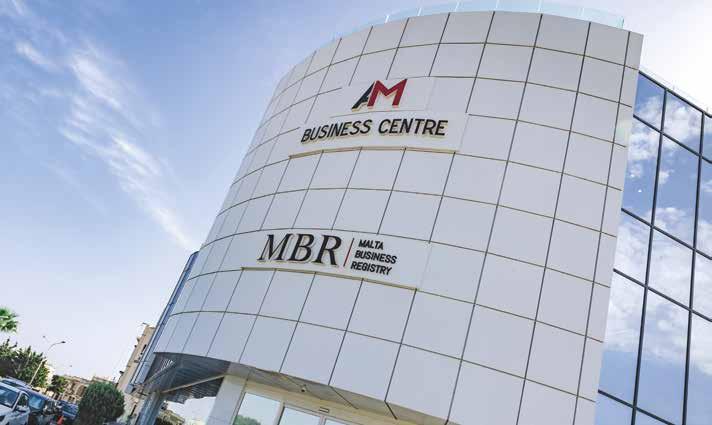
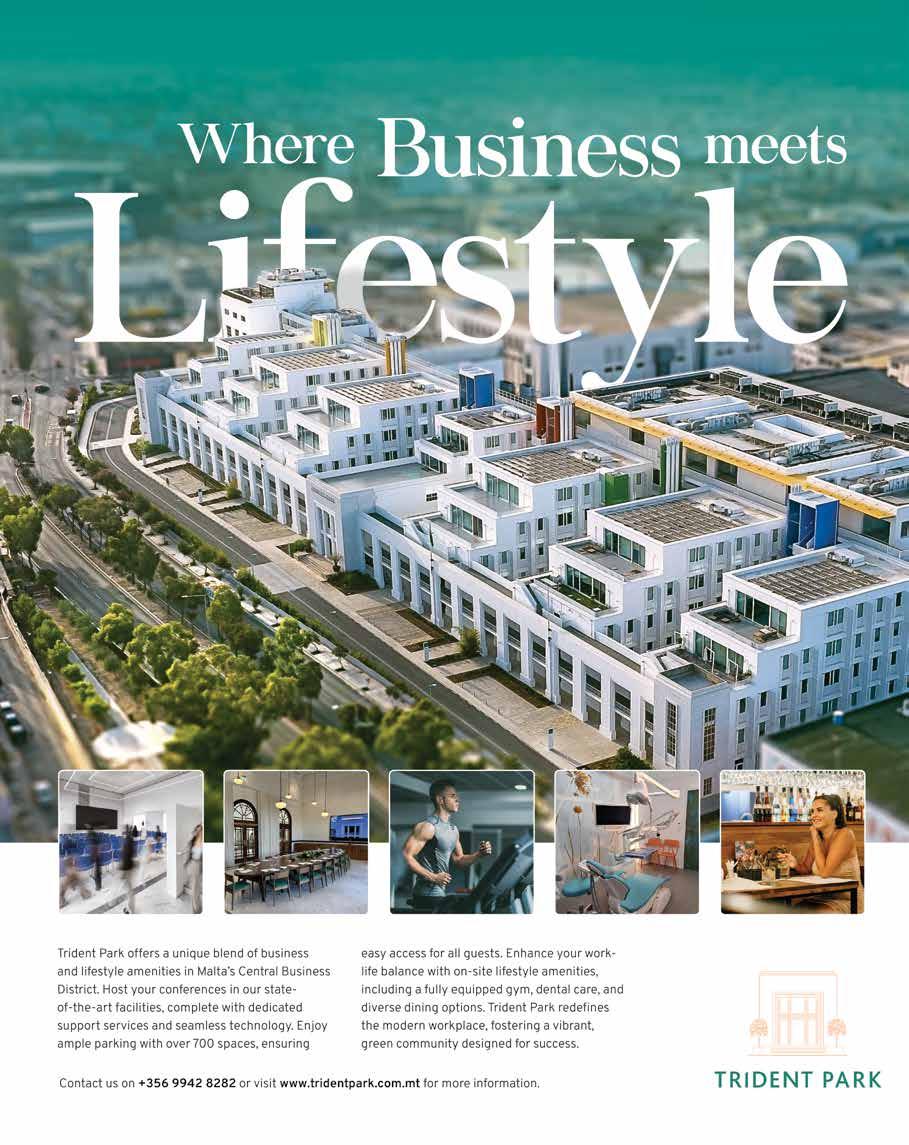
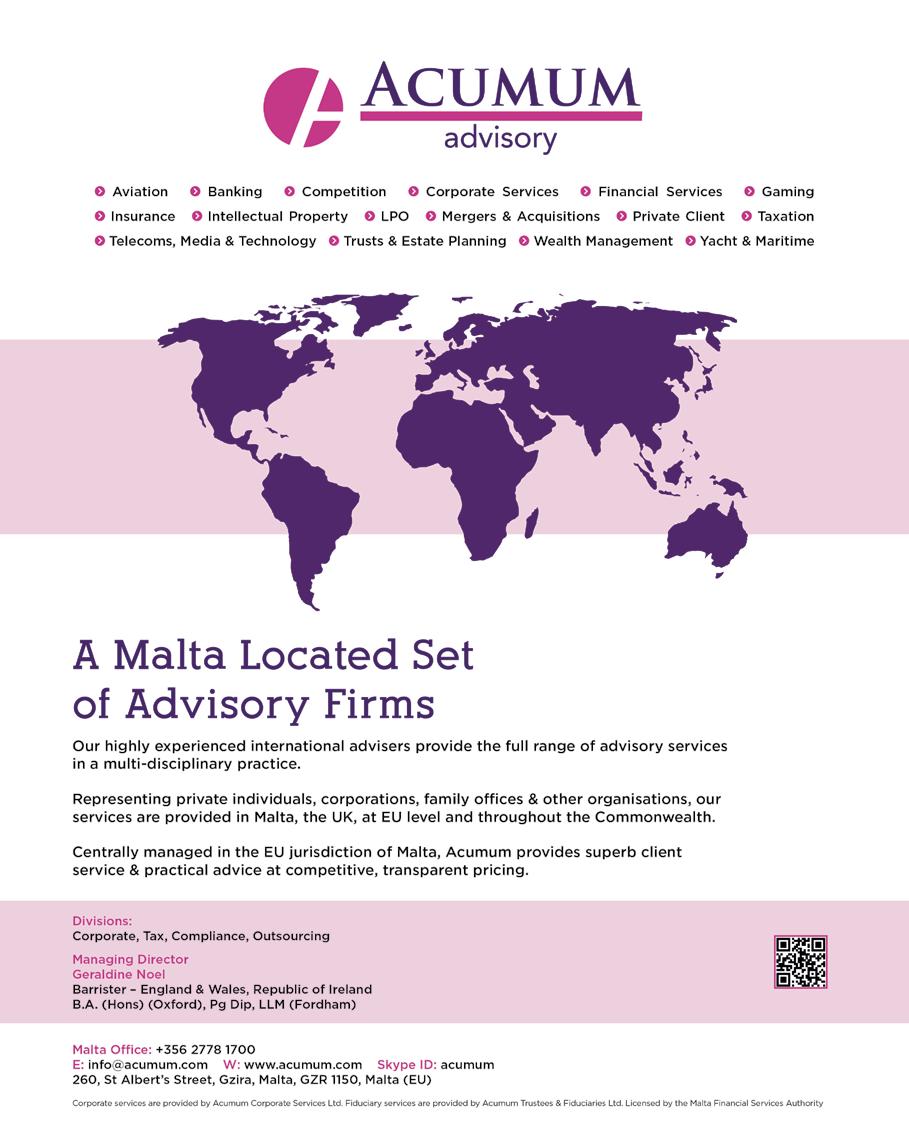
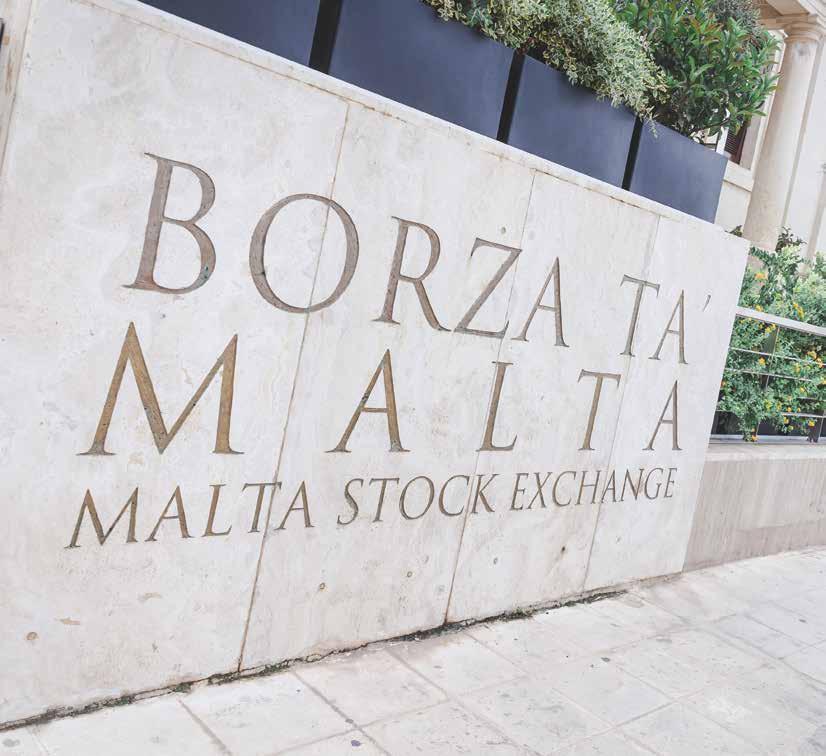
The Malta Stock Exchange, situated in Valletta, provides access to Malta’s capital market. Today, it is a fully-fledged platform for the admission and trading of financial instruments, namely bonds and equities, once these would have been granted admissibility to listing by the Malta Financial Services Authority or any other competent authority in recognised jurisdictions. The MSE operates a main market, a market specifically for institutional investors, and a multilateral trading facility, which provides a more cost-effective opportunity for startups and SMEs to raise up to €8 million in capital.
The MSE’s in-house Central Securities Depository (CSD) is linked with Clearstream Banking, offering a comprehensive range of services, including maintenance of registers, clearing and
settlement, securities administration, as well as custody services. It is also worth mentioning that, as part of its Corporate Social Responsibility, the MSE runs an educational institute (the MSE Institute) aimed at increasing financial literacy among investors and market participants alike.
Over the past few years, the MSE witnessed a surge in primary market activity as more enterprises have turned to the Maltese investor community to finance their projects, including some companies whose major operations are outside Malta. They are attracted by the enthusiasm shown by local investors for securities, with most corporate bond issues being fully subscribed. Indeed, this is evident from the fact that, since 2019, companies have raised over €1.4 billion through 64 separate bond issues on the Malta Stock Exchange.
Kenneth Farrugia is the Chief Executive Officer of the Bank of Valletta Group and also sits on the bank’s Board of Directors as an Executive Director, chairs the Executive Committee and is a member of several management committees. Additionally, he sits on the Board of Directors of BOV Fund Services Ltd, BOV Asset Management Ltd and MAPFRE MSV Life plc.
In your experience, what are the most common financial challenges that foreign investors face when setting up in Malta, and how does your bank help address these issues?
Establishing an operation in a new country involves various challenges. Pre-investment research is an essential part of this process, where potential investors evaluate the economic and business climate to assess the viability of expanding operations internationally. Key financial considerations include ease of payments and access to financing.
Bank of Valletta employs a tailored approach, recognising that each customer’s requirements are unique and necessitate customised solutions. The bank collaborates closely with potential investors, offering guidance and developing solutions for their banking and financing needs based on the specific requirements of each client and the sector in which they intend to operate.
Malta has been working to position itself as a fintech hub. From a banking perspective, how is the country’s financial infrastructure evolving to accommodate innovative businesses and new technologies?
Over the past two decades, Malta has launched various initiatives aimed at strengthening its value proposition as a fintech hub. Significant investments have been made in both the financial infrastructure and the telecoms sector, all aimed at attracting innovative businesses and supporting new technologies.
How would you assess Malta’s current economic climate for foreign investment? Are there particular sectors that you believe offer the most promising opportunities for investors?
Malta’s economy excels compared to other European countries, with strong GDP growth and low unemployment making it attractive to investors. Key sectors for international investment include hospitality, advanced manufacturing, aviation, maritime, gaming, ICT, and financial and fintech services.
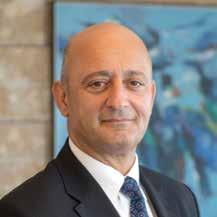
Given the global emphasis on anti-money laundering (AML) and know-your-customer (KYC) regulations, how does your bank balance the need for stringent compliance with providing efficient services to foreign investors? What should new investors be prepared for in this regard?
The bank’s anti-money laundering and know-your-customer regulations apply equally to all customers, regardless of whether they are local or foreign investors. The bank employs a risk-based approach that is influenced by the nature of the business activity and the corresponding risk profile of the customer.
Banks generally follow a detailed process to ensure that customer profiles are current, relevant, and up-to-date. Efforts are made to balance efficiency with compliance obligations. Customers recognise that KYC and due diligence requirements are standard practice worldwide and understand that accurate, relevant data enhances their banking experience while protecting their financial integrity.
Malta’s economy excels compared to other European countries, with strong GDP growth and low unemployment making it attractive to investors.
PEVCA Malta’s Secretary General Herald Bonnici uses his wealth of experience in the public and private sectors to help companies navigate the worlds of finance, sustainability and energy. Previously CEO of Malta Government Investments, where he was responsible for the establishment of a sovereign wealth fund network across the EMENA region, he now occupies a variety of roles.
PEVCA is a new organisation with familiar faces, with many of Malta’s largest financial and corporate stakeholders involved. Why was it set up?
The Private Equity and Venture Capital Association Malta, known as PEVCA Malta, brings together a diverse array of stakeholders, including fund managers, direct investors, institutional investors, family offices, financial institutions, accelerators, and professional services firms. It is committed to driving private investment, serving as a central hub where industry players can convene, learn and network, championing regulatory reforms to fortify and expand the private capital ecosystem, and cultivate cultural change within the business community.
What does Malta offer private equity and venture capital firms and funds?
Malta presents an array of compelling attributes for private equity and venture capital firms and funds. Among these is the stable and pro-business environment, a skilled and multilingual workforce, and a strategic location in close proximity to Europe, Africa and
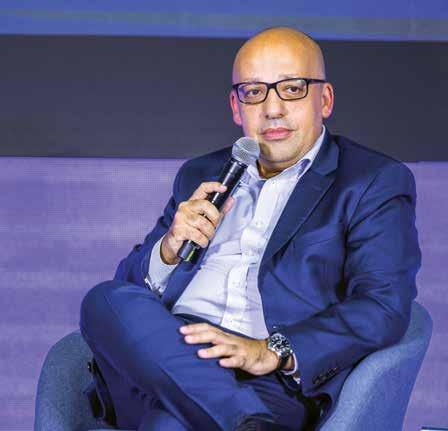
the Middle East. The robust regulatory framework overseen by the Malta Financial Services Authority (MFSA) upholds stringent governance, transparency and investor protection standards crucial to private equity and venture capital undertakings. The favourable fiscal regime positions Malta as a competitive financial jurisdiction, while Government policies cultivate an environment that is supportive of entrepreneurship and innovation.
What kind of opportunities are there for venture capital in Malta?
The country has solidified its position as a dynamic startup hub, particularly in sectors such as fintech, gaming, healthcare, and biotech, in addition to AI. Meanwhile, the Maltese Government has implemented policies and incentives aimed at attracting foreign investment and fortifying local startups, encompassing tax incentives, grants, and specialised support through entities like Malta Enterprise, Malta Venture Capital and Gaming Malta.
Are there any gaps in Malta’s private equity and venture capital ecosystem that foreign investors should be attuned to?
Malta’s private equity and venture capital landscape has experienced notable growth; however, it presents opportunities for foreign investors due to several discernible gaps.
Malta’s private equity and venture capital landscape has experienced notable growth; however, it presents opportunities for foreign investors due to several discernible gaps.
Despite the presence of some local funds, the overall pool of capital available for private equity and venture capital remains relatively modest. There is also a distinct disparity in funding for early-stage startups, as local investors exhibit a preference for later-stage investments. This presents an opportunity for foreign investors to provide crucial support to these startups and potentially benefit from their high growth potential.
Malta’s burgeoning tech and fintech sectors are currently underserved by investors with extensive sector-specific knowledge. Therefore, foreign investors possessing experience in these areas can not only provide financial backing but also impart valuable mentorship and strategic guidance.
By addressing these gaps, foreign investors can play a pivotal role in fortifying Malta’s private equity and venture capital ecosystem while concurrently benefiting from investing in an expanding market.
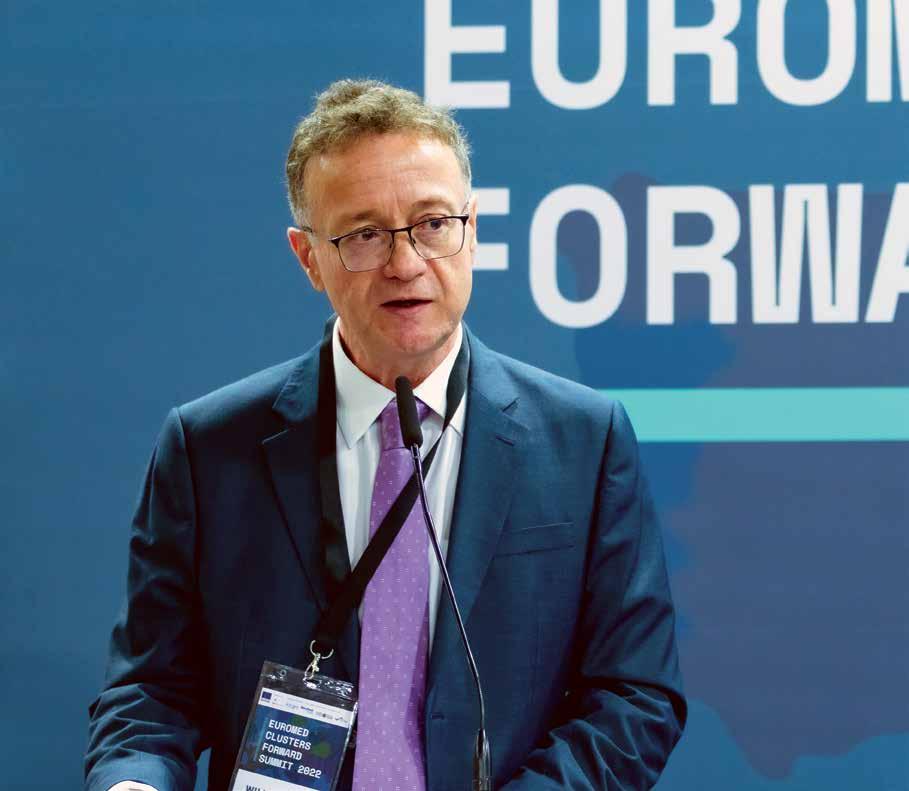
Malta’s strategic position, EU membership and broad expertise in specialised sectors are among the crucial factors boosting the country’s potential for lucrative investment opportunities, says William Wait, Chairman of Malta Enterprise. And, as he explains to Rebecca Anastasi, the entity is primed to leverage these advantages, thus facilitating the growth of the Maltese economy.
In 1967, just three years after Malta’s independence, the Government of the time established the Malta Development Corporation (MDC), tasked with laying the foundations for the island’s industrial and manufacturing sectors, a mandate which included attracting foreign direct investment (FDI) to support their development. Over its 50-plus years of existence, the entity, now known as Malta Enterprise, has become a crucial node in furthering the country’s economic growth – a mission, its Chairman William Wait says, centred on “leveraging Malta’s strategic location, highly skilled workforce and stable economic environment to attract FDI.”

Indeed, “as Malta’s economy diversified, so too have the responsibilities of our organisation. Today, Malta Enterprise acts as a central pillar in Malta’s economic development, providing a wide range of services including investment incentives, advisory services, strategic support, and infrastructure development that also caters to startups and innovative industries,” he explains, adding that Malta’s unique combination of factors makes it particularly attractive to foreign investors.
Firstly, the country’s geographic position in the middle of the Mediterranean facilitates the creation of unique and productive international networks, the Chairman asserts.
“Situated at the crossroads of Europe, Africa and the Middle East, Malta offers unparalleled access to several major markets. This strategic location is particularly appealing for companies looking to serve multiple regions from a single base,” he elaborates. Moreover, Malta’s European Union membership provides companies with access to the EU’s Single Market, thereby expanding opportunities for growth.
The island’s “pro-business environment is characterised by a competitive tax regime,” while the country also boasts “a highly skilled and multilingual workforce, and a robust legal framework,” factors which have attracted substantial investment into the country. In addition, “Malta’s political stability and transparent regulatory environment further enhance its attractiveness.”
These conditions have attracted many players and stakeholders keen to benefit from the potential they present. As a result, the Chairman continues, “Malta has
“Today, Malta Enterprise acts as a central pillar in Malta’s economic development.”
developed significant expertise in key sectors, including financial services, gaming, ICT, and life sciences. The presence of dedicated hubs, such as the Malta Life Sciences Park, provides companies with the infrastructure and support needed to innovate and grow. These hubs are designed to foster collaboration and innovation, making Malta an ideal location for companies operating in these sectors.”
Elaborating on the growth of specific industries over recent years, Mr Wait starts by detailing the opportunities created by increasing digitisation. “The digital economy is rapidly expanding, and Malta is well-positioned to capitalise on this trend. The ICT sector, including fintech, blockchain, and digital games development, is set to grow significantly.” He notes that Malta’s early adoption of technology and its progressive regulatory framework have already attracted numerous tech companies to the island, while Malta Enterprise’s financial incentives and grants support digital transformation and the development of new technologies.
The life sciences sector – particularly the fields of pharmaceuticals, biotechnology and medical cannabis –is another area “with strong growth potential,” he affirms. “Malta’s strategic investment in the Malta Life Sciences Park has created a hub for innovation in this field, attracting both local and international companies. Malta Enterprise plays a crucial role in this growth by offering tailored support for research and development, facilitating international partnerships, and providing access to state-of-the-art facilities. Our goal is to position Malta as a leading centre for life sciences in the Mediterranean region,” the Chairman continues.
Malta Enterprise is also “actively promoting” green industries as the vanguard of the island’s next stage of economic and social development. “As global demand for sustainable solutions increases, green technologies and industries related to renewable energy, waste management, and sustainable agriculture are expected to experience substantial growth in Malta.” To maximise the benefits this sector offers, Malta Enterprise provides incentives for businesses investing in sustainable practices and technologies, while supporting initiatives aimed at reducing the carbon footprint and promoting the circular

“At Malta Enterprise we recognise that small and medium enterprises (SMEs) are the backbone of Malta’s economy, driving innovation, job creation and economic resilience.”
economy. This ensures that Malta aligns with global sustainability goals while creating new economic opportunities.
Finally, Mr Wait is also enthusiastic about the compelling opportunities presented by advanced manufacturing, particularly in aerospace, precision engineering and high-value-added manufacturing. These sectors, he continues, are “poised for growth as Malta continues to develop its industrial base. The country’s strategic location, skilled workforce and favourable business environment make it an attractive destination for manufacturers looking to serve European and global markets.” Malta Enterprise supports this sector by offering incentives for investment in new technologies, facilitating access to international markets, and helping companies enhance their competitiveness through innovation and productivity enhancements.
These efforts are rooted in Malta Enterprise’s raison d’être and its understanding of the vital role inward investment plays in the country’s economic growth. “By attracting foreign companies to establish operations on the island, we can inject capital, create jobs, and stimulate demand for local goods and services. This not only boosts the economy but also helps to diversify it, reducing reliance on any single sector and making the economy more resilient to global shocks,” the Chairman says.
Furthermore, FDI brings not only capital, but also global expertise, technology and innovation. By attracting multinational companies, Malta gains access to global networks and advanced technologies that might not otherwise be available. “This, in turn, enhances the capabilities of the local workforce, fosters innovation and allows Maltese companies to integrate into global supply chains. The spillover effects of FDI are significant, leading to improved productivity and competitiveness across the economy.”
Across all industries contributing to the island’s economy, Malta Enterprise is committed to supporting businesses of all sizes: “Alongside attracting FDI, we are equally dedicated to nurturing local businesses,” Mr Wait insists. “At Malta Enterprise we recognise that small and medium enterprises (SMEs) are the backbone of Malta’s economy, driving innovation, job creation and economic resilience. Supporting SMEs is therefore a critical priority for us.”
To this end, he continues, the entity has “developed a comprehensive approach to ensure that these companies receive the tailored support they need to thrive.” This includes the Start in Malta initiative which provides a comprehensive package, including incubation services, networking opportunities and access to funding. “By creating a nurturing

“By attracting multinational companies, Malta gains access to global networks and advanced technologies that might not otherwise be available.”
environment for startups, we aim to foster a culture of entrepreneurship and innovation that benefits the wider SME community.” The Business Development and the Mirco Invest schemes also target SMEs poised to broaden their prospects.
Looking ahead, and in response to contingencies which have accelerated the proliferation of new industries, Mr Wait envisions Malta’s economic landscape evolving in several key ways, influenced by both global economic trends and local strategic initiatives. He anticipates Malta’s economy will continue to diversify, “moving further away from traditional sectors like tourism and manufacturing, towards more innovative and high-value industries such as digital technology, life sciences and fintech.” This shift is driven by Malta’s strategic focus on becoming a hub for cutting-edge technologies and industries, supported by a robust regulatory framework and targeted investments.
Yet, despite Malta’s potential, there might be some significant hurdles to address in the short and medium term, the Chairman admits. “Malta will need to navigate challenges such as inflation and the global economic slowdown. Inflationary pressures, particularly in food and services, are expected to persist, which could impact consumer spending and overall economic growth. Additionally, the global economic environment remains uncertain, with potential slowdowns in major economies that could affect Malta’s export-driven sectors. To mitigate these risks, Malta will need to maintain a balanced fiscal policy and continue attracting high-value investments to sustain growth even in a challenging global context,” he says.
Elaborating further on the impact of the international context, Mr Wait says that “the global economic landscape is increasingly volatile, with factors such as geopolitical tensions, economic downturns and shifts in international trade policies posing potential risks. As Chairman, one of my biggest challenges is ensuring that Malta Enterprise remains agile and resilient in the face of these uncertainties. This involves constantly monitoring global trends, assessing their impact on Malta and adjusting our strategies accordingly to mitigate risks while seizing emerging opportunities.”
And, while the country has “successfully positioned itself as an attractive destination for foreign direct investment, the challenge
remains to continuously attract high-value, sustainable investments that align with the country’s long-term economic goals.” This requires not only maintaining a competitive business environment but also offering unique value propositions that distinguish Malta from other investment destinations. Balancing the need for quick wins with the pursuit of long-term strategic investments is “a delicate and ongoing challenge,” he says.
As Chairman, Mr Wait remains “committed to balancing the diverse and sometimes conflicting expectations of various stakeholders, including the Government, private sector, international investors, and the public.” Indeed, as he looks ahead to the next few years, he will continue to prioritise “effective communication and transparency” while also building trust, as these “are essential in managing relationships and ensuring that all parties remain aligned with our strategic goals,” he says. At the same time, together with his team, he will continue to foster “a culture of continuous improvement and innovation within the organisation to ensure that we remain capable of meeting the evolving needs of the Maltese economy.”

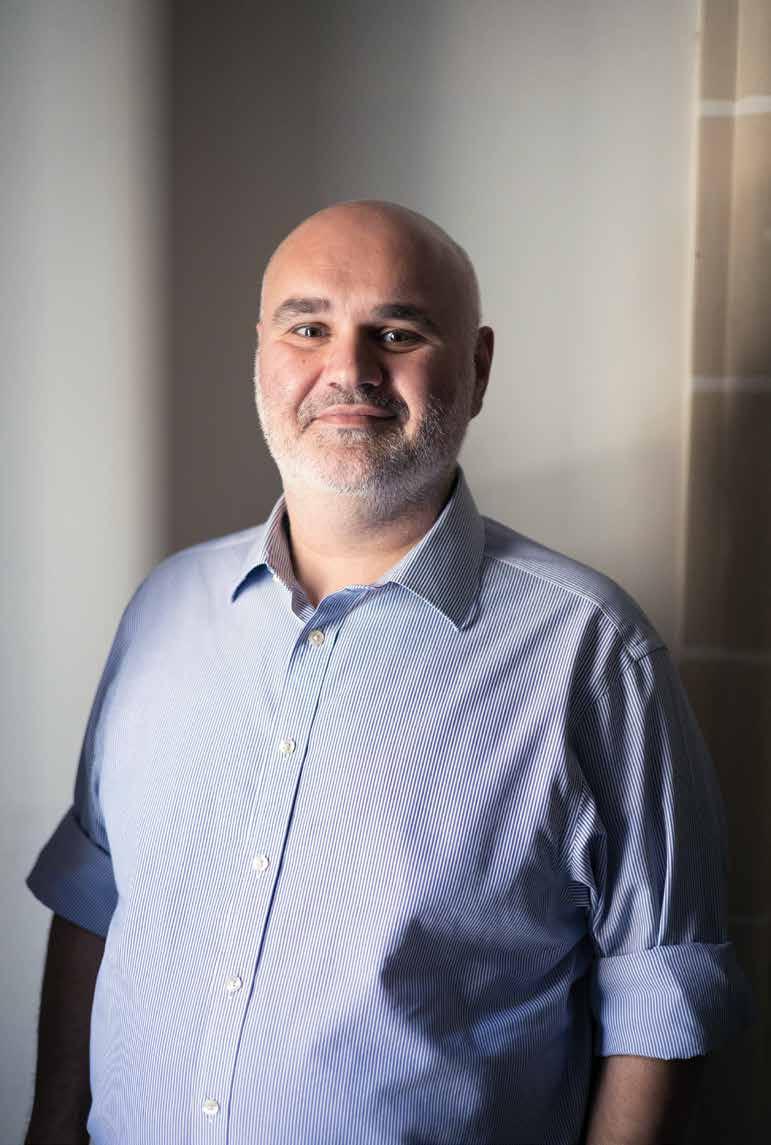
By providing lenders with a reliable tool to classify the risk posed by different borrowers, Creditinfo Country Manager Clifford Debono tells Warren Joseph Bugeja that he believes his company’s commitment to due diligence is a crucial factor in attracting foreign investment to Malta.
Founded in 2002, Creditinfo Malta was the first licensed credit reference agency in Malta. It has the backing of a global group of companies with over two decades of experience, that has established more than 25 credit bureaus across four continents.
“Past behaviour is one of the most powerful indicators of future behaviour,” states Creditinfo Country Manager Clifford Debono. “Credit scores, which detail payment histories, therefore enable banks and retailers to take calculated risks when facilitating access to finance.” He accentuates that the efforts of credit reference agencies (CRAs) in ensuring fair, transparent and ethical lending practices not only help borrowers achieve their financial goals but also promote overall economic stability and growth.
With only two credit agencies in Malta, Mr Debono was drawn to the challenge of working in a niche market still in its early stages within the local economy. His extensive background in finance, including a master’s degree in business administration and 11 years in the risk management sector, stood him in good stead for his role at Creditinfo Malta. Joining the company in 2018 in the Credit and Risk Analysis Department, Mr Debono quickly rose to become CFO in 2019 and Country Manager in November 2021. The learning curve was steep, and Mr Debono acknowledges each rung spent on the career ladder. “Given it’s not the usual line of business, going through all the channels within the company, especially at CFO level, learning about the various products and services, and how things operate, helped me enormously,” he says.
Ever since joining the sector, Mr Debono has worked hard to dispel the misconception that CRAs are merely ‘providers of a blacklist of borrowers’. “When I became Country Manager, my priority was to promote sound payment behaviour. We need to instil the mentality that people should be incentivised and rewarded for being diligent and not defaulting on payments.”
Meritocracy is a concept close to Mr Debono’s heart. “It is a buzzword that is often not put into practice,” he laments. “Interest rates should be determined by credit scores and past behaviour, and should not be dependent on having contacts. My intention is also to input positive data,” he states emphatically. Mr Debono’s mantra is reflected in an ongoing mission to “change the country’s mindset,” beginning with a brand awareness social media marketing campaign that he embarked upon and outsourced as soon as he took the helm. Next on the agenda, “we need to teach our youngsters how to manage their money, the importance of paying bills in a timely manner, and building up a good credit score.” Plans are in the pipeline in 2025 to reach out to young adults in educational institutions such as Junior College and hold in-person seminars.
Databases on individuals’ paying habits and defaulting debts towards financial institutions are obtained through the Central Credit Register set up by the Central Bank of Malta. Creditinfo Malta’s strength lies in its ability to gather detailed credit information within the business community. However, Mr Debono continues to lobby for access to individual consumer payment data from other institutions and seeks greater recognition and collaboration from Government entities on whose collaboration the sector depends.
“Data accuracy is a main pillar in our operations, as any inaccuracies in credit reports can impact consumers and businesses in terms of denial of credit or higher-priced credit,” Mr Debono states. This focus on accuracy and cybersecurity is critical, given the sensitive nature of the data handled. Creditinfo Malta employs comprehensive and continuous examination procedures, including directly reviewing policies, procedures and practices internally. These efforts are supported by programmes designed to ensure the accuracy of consumer information, monitor how data furnishes are screened, and minimise the likelihood of errors or duplicate information in reports.
“Integrity is key in all our operations.”
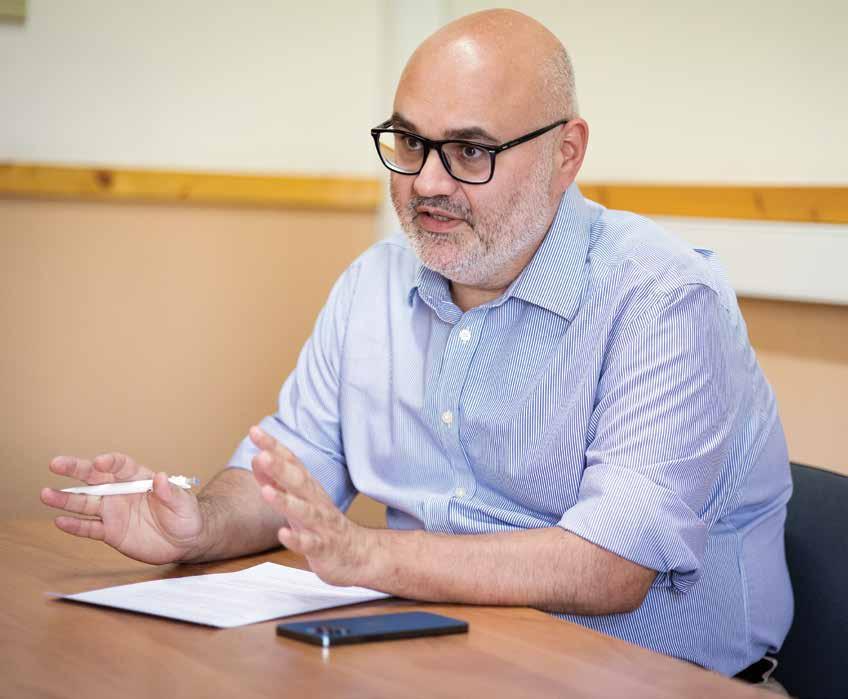
Being part of a worldwide group of companies gives Creditinfo Malta a competitive edge. The group’s stringent security measures include having a Chief Security Officer and an Information Security Policy that all business units must adhere to. Given the sensitive nature of the data processed, security is a fundamental part of Creditinfo Group’s core values. Measures such as data encryption, access controls, data minimisation, continuous monitoring, cybersecurity education sessions, and regulatory compliance ensure the availability, confidentiality and integrity of information related to the group, its employees, clients, and partners.
As far as Malta’s credit landscape is concerned, there has only been a slight increase in short-term loans, micro-lending and payday lending compared to other EU countries. Despite local banks tightening their mortgage lending policies in 2023, reflecting lower international risk
tolerance, interest rates have remained stable when contrasted with the Eurozone. Nevertheless, credit use is on the rise, with more Maltese retailers adopting BNPL (Buy Now Pay Later) schemes to address cash flow issues.
According to recent statistics, Mr Debono notes, “local firms took an average of 81 days to collect payment, which is far behind the European average and closer to France and Ireland, where the average is 74 days.”
To take the headache off debt collection, Creditinfo Malta has partnered with CheckYourTraders, a company set up to verify businesses and sole traders in the construction industry. Once a creditor is confirmed as genuine and lawful, and payment defaults are established, Creditinfo sends a pressure letter to the debtor, demanding settlement within 14 days. If the debtor fails to comply, they are registered in the system database, preventing them from using any bank or telecommunications

“Creditinfo Malta’s sound due diligence processes translate into a high level of transparency, accountability and good governance.”
provider. Other leverage products include statement stickers and bills of exchange. For debts outside Malta’s jurisdiction, Creditinfo collaborates with Baker Ing and Atradius.
Mr Debono highlights the example of a bathroom fittings retailer near his offices. “Most SMEs do not have dedicated accounts or debt collection departments. They want to focus on selling their products, not chasing debtors. If you have a client purchasing a bathroom over two years, you need to know if they have defaulted on payments before signing a BNPL contract.” This is where CRAs play a crucial role in calculating risk. “We immediately onboarded this client because they saw the system was tailor-made for them. In a cashless society, CRAs are even more important,” he emphasises.
Another tool in Creditinfo Malta’s arsenal is Live Transaction Monitoring, which offers real-time analysis and review of financial transactions. This
helps SMEs prevent and detect fraud, adhere to compliance and regulatory requirements instantly, and improve operational efficiency and financial health. Creditinfo’s technology employs AI, machine learning, data analytics, OCR software, and ID verification to scrutinise each transaction for potential irregularities. A new enhanced user interface portal, launching in late 2024, will feature improved data segmentation, including closed civil court rulings. “Our responsibility is not only to our clients but also to the public whose data we manage,” Mr Debono stresses. “If a defaulter settles their dues and there is no repeat behaviour, they should not be penalised in the future.”
The group and its management champion the principle of ‘not sacrificing integrity for outcome’. Mr Debono echoes this sentiment, stating, “integrity is key in all our operations.” The new user interface will include a “past history” tab and feature the caveat that “our task is not to provide judgements but facts and insights, and we need to be true and fair to those facts.”
Information-sharing institutions help alleviate problems of asymmetric information by counteracting adverse selection, moral hazard and information monopoly while reducing over-indebtedness. Mr Debono believes that “Creditinfo Malta’s sound due diligence processes translate into a high level of transparency, accountability and good governance,” thereby creating a ripple effect in the local economy. Credit bureaus are essential in a financial institution’s credit decision process. “Our economy relies heavily on financial services. The days of conducting business transactions without credit checks are long over,” Mr Debono remarks. The presence of CRAs in a country reassures foreign investors who rely on KYC (know your customer) checks before deciding to invest. Creditinfo Malta facilitates these decisions. “We may be a small company, but we have the backing and support of an international group. We have a lot to offer,” Mr Debono smiles.
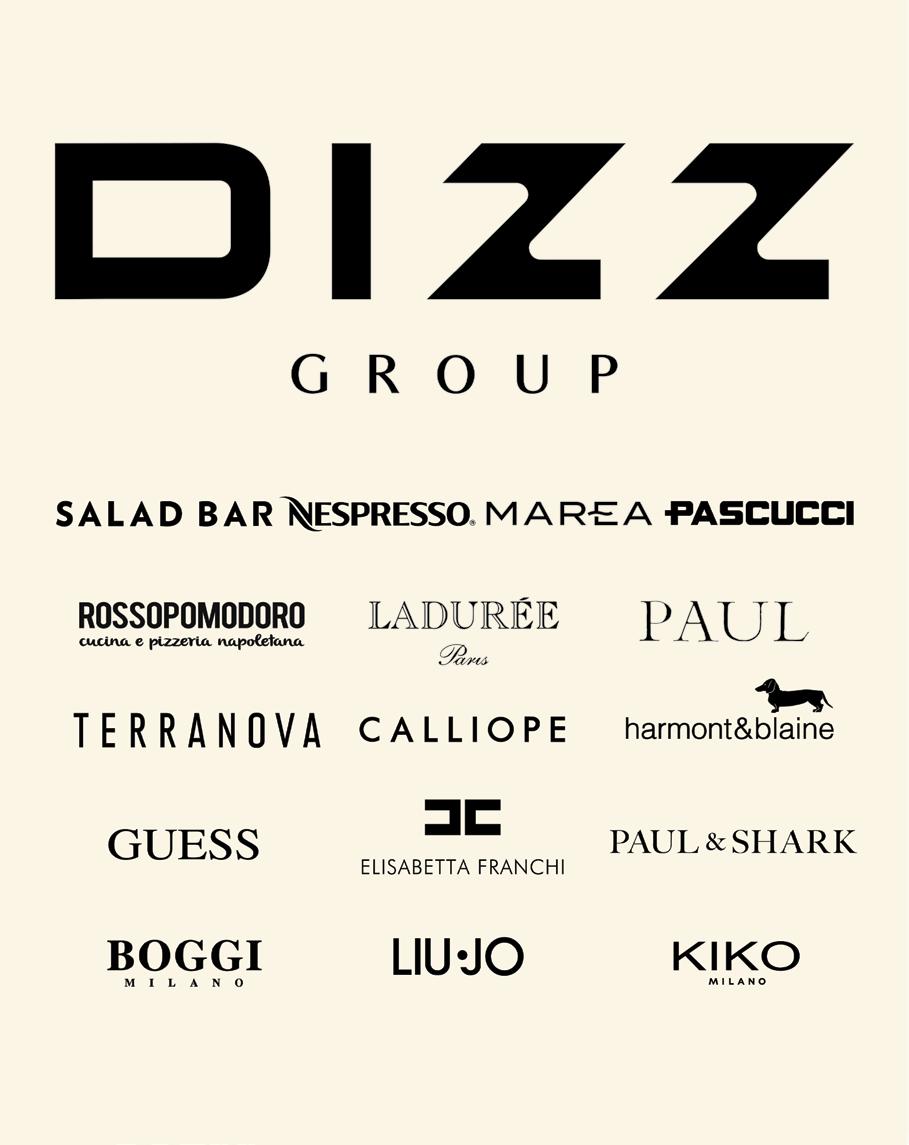



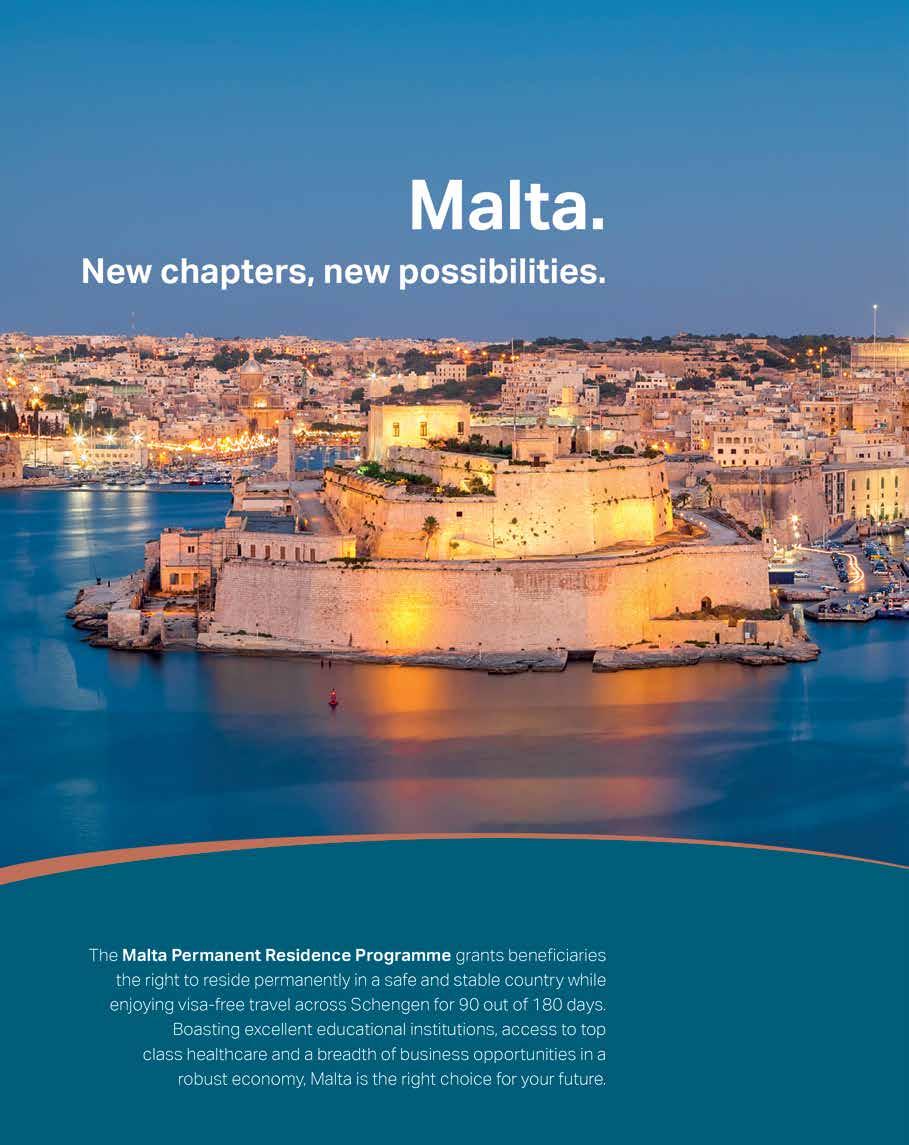
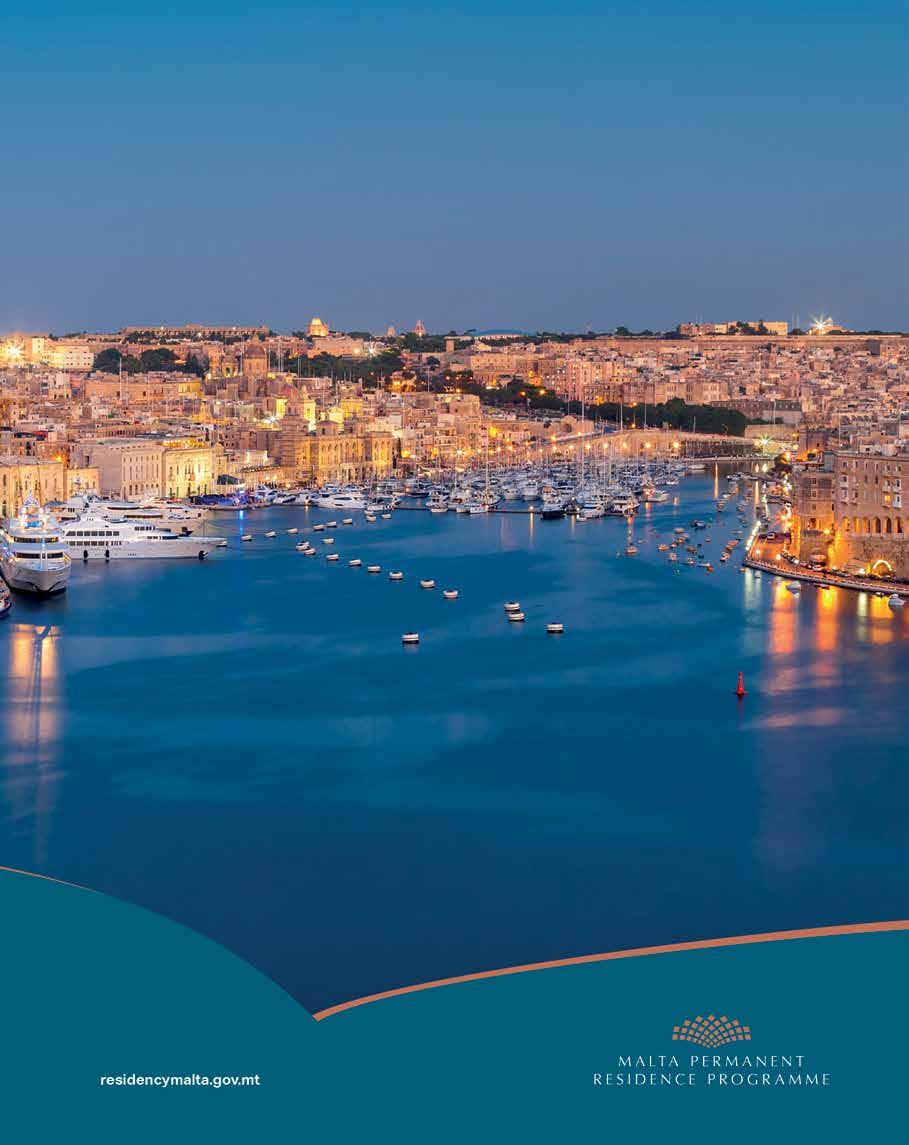
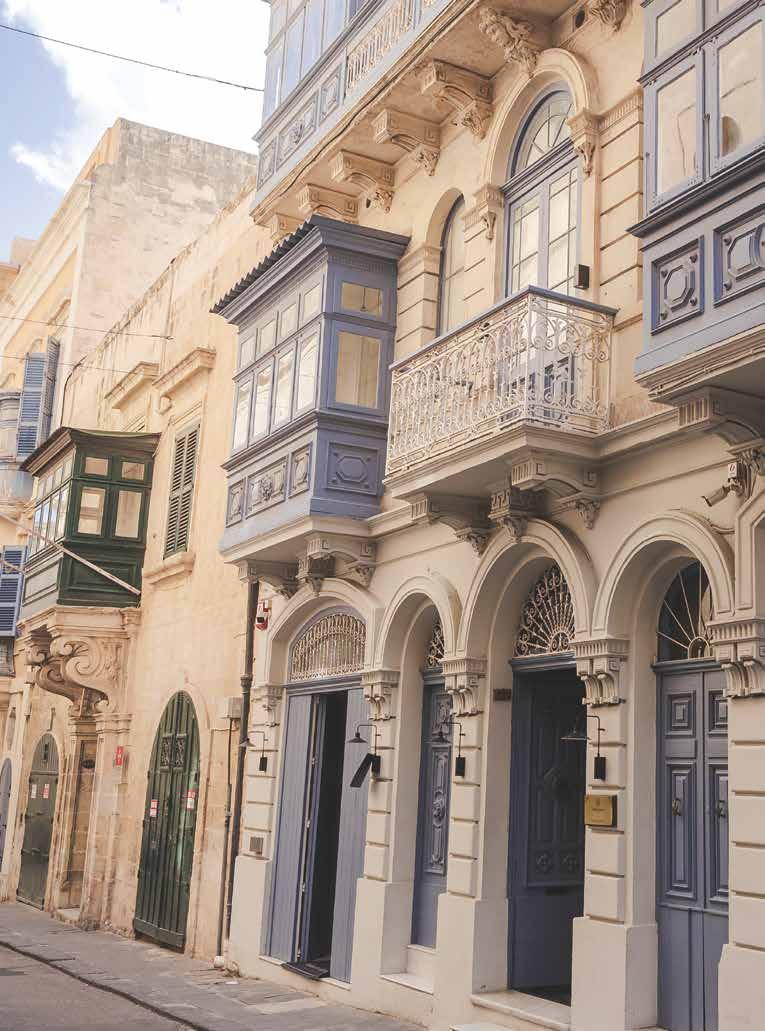
Malta has emerged as an attractive destination for high-net-worth individuals (HNWIs) and families, offering a unique blend of financial, lifestyle and strategic advantages. This Mediterranean nation, with its rich history and modern infrastructure, presents a compelling case for those seeking an alternative residence close to both Europe and the Middle East. Malta International Airport’s extensive connections facilitate business operations, travel and the maintenance of international relationships, while the country’s robust maritime infrastructure is ideal for yacht owners and maritime investors alike.
Supporting Malta’s popularity among global elites are various schemes designed to simplify the process of establishing residence. Many programmes offer advantageous tax frameworks and visa-free travel across the Schengen Area, covering most of Europe. Additionally, residence in Malta opens the door to the famed Mediterranean experience, enriched by its history, adventure and exceptional cuisine. Malta’s cultural melting pot makes the island feel like home for its growing expat community. A simple stroll along the Sliema waterfront reveals a tapestry of languages and cultures, reflecting the island’s vibrant, cosmopolitan and welcoming character.
The Maltese climate, characterised by mild to hot temperatures and 300 days of sunshine a year, is another significant draw for residents and tourists alike. The islands offer a wealth of cultural and recreational activities, from festivals and theatrical productions to major music events featuring top international acts. For outdoor enthusiasts, Malta provides excellent opportunities for sailing, diving and exploring picturesque landscapes. These lifestyle offerings also enhance Malta’s relational business culture, creating numerous networking opportunities for those looking to
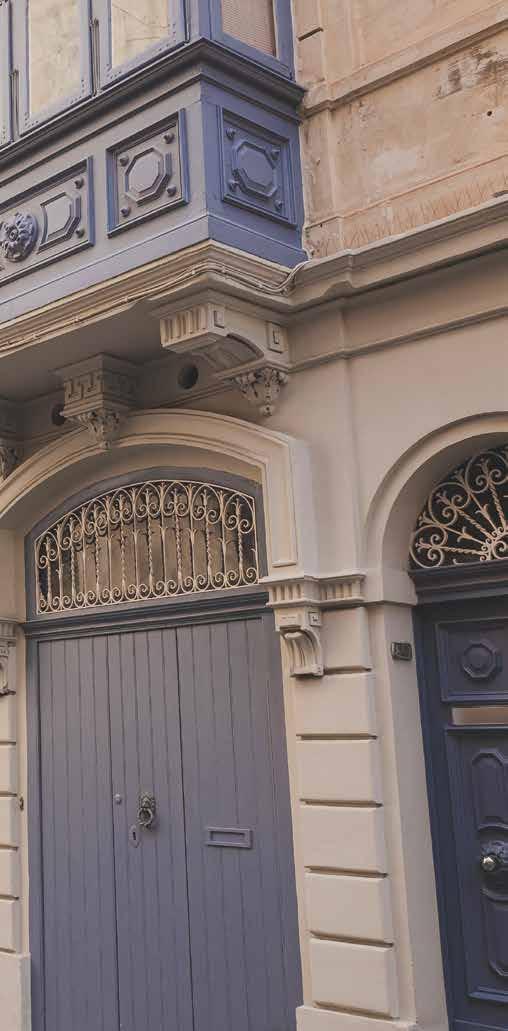
integrate into the local community. All of this unfolds against a backdrop of breath-taking architecture, including three UNESCO World Heritage Sites, earning Malta the reputation of an open-air museum.
Culinary enthusiasts will appreciate the recent proliferation of high-quality dining establishments offering a range of regional and global cuisines, with some receiving accolades from the Michelin Guide. Notably, in 2024 a Maltese restaurant was awarded its second Michelin star for the first time, highlighting the island’s culinary progress.
Malta also boasts top-tier healthcare facilities and schools, catering to the needs of young families and retirees alike. New arrivals adapt quickly, aided by the widespread use of English – an official language spoken by nearly everyone – and the locals’ friendly, welcoming nature. The growing foreign community has also spurred the development of a comprehensive ecosystem of legal, real estate and childcare services tailored to sophisticated and exacting standards.
Despite its bustling environment, Malta remains one of the safest countries in the world, with crime largely confined to isolated incidents. Residents report feeling safe walking alone at all hours, supported by the country’s strong security record and stable political climate – factors that appeal particularly to young families and retirees seeking peace of mind.
In sum, Malta presents a compelling proposition for highnet-worth individuals and families seeking a new residence, offering an exceptional living experience with numerous benefits. On the downside, Malta has become one of the most densely populated countries in the world, and the economic boom over the past decade has contributed to a growing sense that living in Malta feels more like living in a ‘city’ and less like life on a ‘Mediterranean island’.
Several residency schemes are available for those seriously considering Malta as a residency destination. All these schemes offer holders full travel flexibility to and from the islands, as well as the right to move freely within the 26 countries of the Schengen Area without any visa requirements for up to 90 days in each 180-day period. Meanwhile, permanent residents also have the freedom to repatriate any capital or income resulting from the sale of property or encashment of investments. However, important differences exist in terms of eligibility, application requirements and tax implications (bearing in mind that Malta does not impose any wealth, inheritance, estate, or gift taxes).
Maltese Citizenship Programme
Malta’s citizenship programme (officially known as Maltese Exceptional Investor Naturalisation, or MEIN) is designed to attract high-standing individuals and their families who can contribute to the country’s economic development. Granting visa-free or visa-on-arrival access to 185 countries, the Maltese passport offers unparalleled flexibility, ranking among the top 10 passports worldwide. Applicants for the citizenship-by-residence-and-investment programme are therefore subject to a thorough due diligence process to ensure that those granted Maltese citizenship are respectable individuals whose inclusion in the Maltese family is merited.
The desire for a second passport is often driven by a combination of practical, financial and personal factors, most notably as a route to a higher quality of life. For high-net-worth individuals, global entrepreneurs and their families, the benefits of dual citizenship are substantial, offering a safeguard and gateway to a more secure and prosperous future in an increasingly interconnected world.
The programme is currently the subject of litigation before the European Court of Justice, despite an overhaul of its rules in 2020. Brussels essentially asserts that the scheme is in breach of EU law because citizenship is granted without any obligation for the beneficiaries to have “real ties” to Malta. However, the Maltese Government disputes this view, maintaining that its interpretation of EU treaties is correct. Malta also insists that citizenship is a wholly national competence and therefore falls outside the purview of EU supervision.
Malta’s case was given a strong endorsement by the Court of Justice’s advocate general, who practically agreed with every point raised by the Maltese Government and recommended that the Court dismiss the Commission’s case. The advocate general’s opinion, while not binding, will be considered by the judges. At publication date, the proceedings are ongoing.

Jonathan Cardona is CEO of Residency Malta Agency, the Government entity that administers and promotes a number of Malta residency programmes. He has held the role since early 2024.
Why are foreign citizens attracted to the prospect of taking up residency in Malta?
There is a demand among high-net-worth third-country nationals for a second residency in a safe and stable jurisdiction that offers them and their families a comfortable lifestyle with access to good educational opportunities and reputable healthcare. Malta ticks these boxes and more, providing new residents with the opportunity to offer their children a better quality of life.
Second residencies are also considered as a ‘Plan B’ – a form of insurance they can rely on if their home country faces geopolitical strife or an economic downturn. Once again, Malta stands out among competitor countries offering similar residency programmes, boasting a safe, family-friendly and English-speaking society.
What are the top questions applicants ask about Residency Malta’s programmes?
Prospective clients typically inquire about the reputation of our programme, the value it will bring them and the level of service they can expect. However, the most common questions focus on the educational opportunities that Malta offers and the quality of its healthcare. Since the pandemic, healthcare has become even more important to almost every individual seeking residency abroad. Malta’s appeal as a jurisdiction remains the major draw, rather than the specific programmes themselves.
Have there been any changes to Residency Malta’s programmes over the last year?
There have been negligible material changes to the Malta Permanent Residence Programme, but the Nomad Residence Permit has undergone more significant updates. Applicants now need to meet new eligibility criteria, primarily a higher annual income threshold. Additionally, permit holders who continue to meet the programme’s requirements can now renew their permits up to three times, allowing for a maximum four-year stay. We’ve also
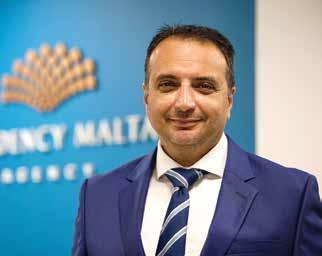
made the entire Nomad Residence Permit application process available online, ensuring a smoother user experience.
What I would like to highlight is what has remained unchanged –our commitment to the highest standards of scrutiny so that only persons of good conduct are granted Maltese residency. We also continue to streamline processes and invest in the technologies and people that help us deliver service excellence.
What one key piece of advice would you give prospective applicants to Malta’s residency programmes?
We advise applicants to submit complete and accurate applications, providing all the information requested with full disclosure. This prevents delays caused by the agency having to request further clarification, making the process smoother for all stakeholders involved.
The most common questions from applicants focus on the educational opportunities that Malta offers and the quality of its healthcare.
Dr Jonathan De Giovanni is a leading C-level executive and international tax lawyer. As CEO and Managing Director of Promethean Corporate Services, based in Malta and Milan, he specialises in consultancy across diverse sectors including immigration, gaming, shipping, and aviation. A blockchain and AI enthusiast, he provides expert advice on virtual financial assets regulation, international tax planning, corporate law, and Malta citizenship and residency.
How have Malta’s residency schemes changed over recent years?
Malta’s tax residency schemes have evolved over the years to adapt to international standards, economic needs and policy changes. Originally designed to attract foreign investment and individuals by offering favourable tax rates, these schemes have faced pressure from the EU and international bodies like the OECD to prevent tax evasion and aggressive tax planning. This has led to greater transparency and stricter compliance requirements, with changes including adjustments to tax rates, residency requirements and investment thresholds.
Recently, Malta has focused on attracting digital nomads and remote workers, introducing initiatives that cater to this growing segment. These changes reflect Malta’s ongoing efforts to balance attracting foreign investment with meeting international regulatory standards.
How can prospective applicants start their enquiries and how does Promethean assist in this regard?
To begin enquiries about obtaining Malta residence or citizenship, prospective applicants typically follow a structured process. They can start by scheduling an initial consultation to discuss their goals, eligibility and the different options available for obtaining residence or citizenship in Malta.

Promethean also provides guidance on the necessary documentation for the application, assisting with the preparation of paperwork and ensuring that all documents meet the legal requirements of the Maltese Government. Once residency or citizenship is granted, Promethean can assist with settling in Malta, including finding housing, opening bank accounts and other relocation services.
What, in your view, is the potential impact of the EU’s proceedings against Malta’s citizenship by investment (CBI) scheme, and what are your thoughts on the Advocate General’s recent Opinion in this regard?
Advocate General Gerard Hogan delivered his Opinion on 4th October 2024, supporting the CBI programme, which allows foreign investors to obtain Maltese and EU citizenship through substantial financial contributions after rigorous due diligence checks. Advocate General Hogan emphasised that member states have the right to define their own nationality laws, recognising Malta’s sovereignty and its legal authority to implement such programmes as long as they comply with EU law. This is a positive reflection on Malta’s rights and authority to control its citizenship policies. The Advocate General did not find any clear breach of EU law in Malta’s CBI programme. He pointed out that Malta has taken steps to ensure the integrity of its programme and rejected the view that citizenship granted in exchange for investment undermines the values of Union citizenship.
It’s crucial to research and choose the residency programme that best aligns with your financial situation, lifestyle preferences and long-term goals.
If the Court follows this Opinion in its final ruling, expected in early 2025, it will have significant positive implications for Malta. The Advocate General’s support indicates that Malta’s CBI programme can continue with minimal disruption, as long as it adheres to guidelines ensuring transparency and a genuine connection between applicants and the country.
Whatonekeypieceofadvicewouldyougiveprospective applicants to Malta’s residency programmes?
One key piece of advice for prospective applicants is to thoroughly understand the specific requirements and benefits of each programme. Malta offers various residency schemes, each with different criteria, investment requirements and tax implications. It’s crucial to research and choose the residency programme that best aligns with your financial situation, lifestyle preferences and long-term goals. Consulting with a licensed agent like Promethean can provide valuable insights and help ensure a smooth application process.
Citizenship Programme Tax Implications
Beneficiaries of the MEIN programme are subject to the regular Maltese personal tax rates on income arising in Malta. Income arising abroad which is not remitted to Malta falls beyond the purview of the local tax authorities, while capital and capital gains remittances are untaxed.
Citizenship Programme Eligibility Criteria
Nationality: Applicants can be citizens of any country, except those currently subject to international sanctions. As this list may be updated from time to time, it is recommended to refer to the MEIN FAQ on the Community Malta Agency website (komunita.gov.mt).
Capital: No particular capital requirements.
Background check: The due diligence process conducted by the Maltese authorities is considered one of the most stringent in the industry. It involves obtaining police clearance through thorough checks with Interpol, Europol and other agencies’ databases, followed by an assessment of the documentation provided to verify the sources of funds and wealth by anti-money laundering and terrorism financing professionals. All collected information is reviewed systematically and transparently. Applicants must be prepared to provide extensive documentation, including apostilled passport copies and birth certificates, certified copies of contracts, and bank statements and transactions upon request. Malta promotes the programme as a way to attract talent that can add value to the country, and the rigorous due diligence process ensures the focus is on quality, not quantity.
Citizenship Programme Application
Application and duration: An application must be submitted through a Licensed Agent. Citizenship is granted for life and is hereditary.
Property: Upon approval, applicants are obliged to either rent or purchase property in Malta. Rent must be a minimum of €16,000 annually, while purchased property must have a minimum value of €700,000. Applicants must retain the property for at least five years from the date of issue of the certificate of Maltese citizenship.
Residence card fee: The main applicant must pay a non-refundable application fee of €10,000 to obtain initial residence. The fee for each dependant is €1,000.
Due diligence fee: The main applicant must pay a non-refundable fee of €15,000 for the Maltese regulator to undertake its strict four-tier due diligence process, with each dependant over the age of 18 subject to an additional €10,000 fee. Third parties sponsoring an application must also pay a due diligence fee of €15,000.
Application fee: All applicants must pay a non-refundable €1,000 fee on submission of their application.
Upon passing an initial background check, applicants are granted a residence permit (against proof of property lease or purchase). Citizenship isonlyconsideredafterapplicantshaveresidedinthecountryforaminimum of12months.ThisdoesnotmeanthatMaltamustbeanapplicant’sprimary residenceduringthisperiod.However,agenuinelinktothecountrymustbe established. Applicants are generally encouraged to spend time in Malta, either through one extended stay or multiple shorter visits, and to enrol in socialorprofessionalbodies.
Once eligible to apply for citizenship, applicants have four months to completethefollowing:
Citizenship fee: All applicants must pay a €500 fee as part of their naturalisation application.
Exceptional investment: Applicants who have been residents of Malta for three years are required to make a contribution of €600,000 to the National Development and Social Fund (NDSF), or €750,0000 if applying after one year of residency. An additional €50,000 contribution is required for each dependant.
Donation: Applicants must donate at least €10,000 to a local philanthropic, cultural, scientific, artistic, sport, or animal welfare organisation registered with the Commissioner of Voluntary Organisations.
Once these criteria are met, applicants are invited to take an Oath of Allegiance to the Republic of Malta and its fundamental democratic values, afterwhichMaltesepassportsareissued.
For more information about the Malta Exceptional Investor Naturalisation programme, visit the website of the programme’s operator, the Community Malta Agency, a dedicated Governmentrun agency (komunita.gov.mt).
Full Maltese and European Union citizenship
Visa-free/visa-onarrival travel to 185 countries
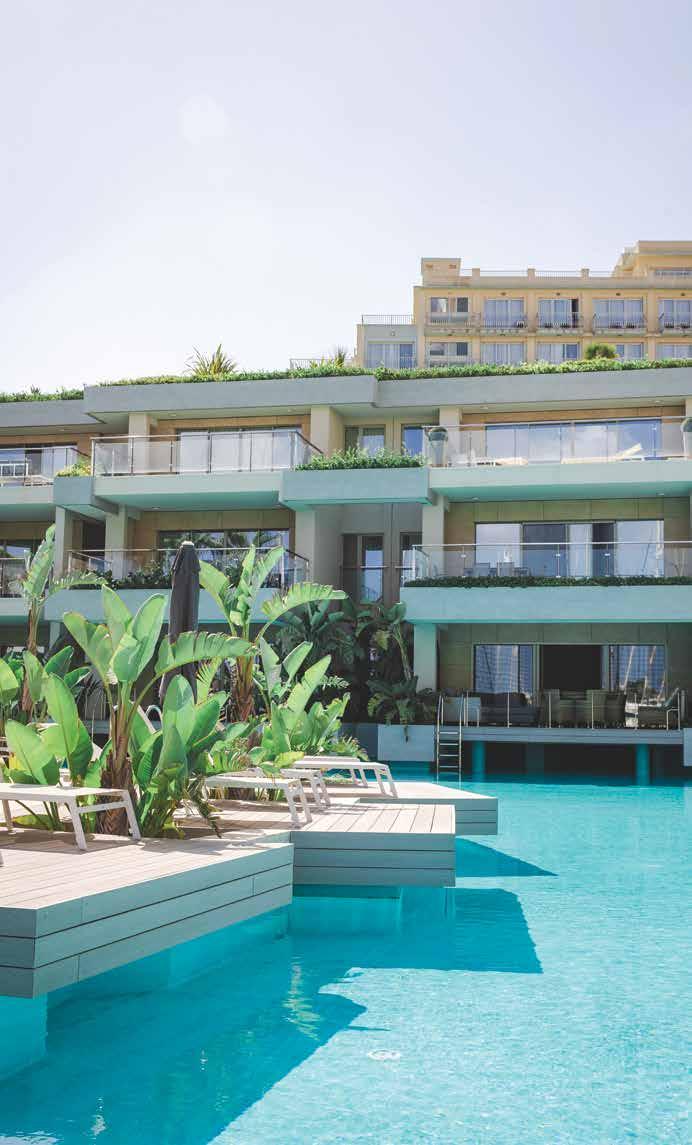
Malta Permanent Residence Programme
Malta’s flagship residency-by-investment scheme, the Malta Permanent Residence Programme (MPRP), allows beneficiaries to become Maltese residents for as long as they continue to meet the programme’s requirements. In addition to allowing free movement across the Schengen Area, the MPRP opens the door to Maltese property investments beyond the Special Designated Areas (p. 130), making the programme attractive to both real estate investors and those simply looking to establish residence in the country.
Eligibility for the MPRP hinges on property investments and Government contributions. The programme extends to up to four generations of the main applicant’s family.
Changes to the programme taking effect in 2025 simplify the property requirements and allow more flexibility in the eligibility criteria. The information presented below relates to the MPRP’s requirements from 1st January 2025.
Residence holders through the MPRP may be subject to statutory Maltese tax rules, with eligibility determined by domicile, ordinary residence and source of income.
Nationality: Applicants must be citizens of a country outside the EU or EEA, and cannot be Swiss. They also cannot be citizens of countries currently subject to international sanctions. It is recommended to refer to the MPRP FAQ on the Residency Malta website (residencymalta.gov. mt) for an updated list of such countries.
Capital: Applicants must present proof of ownership of at least €500,000 in capital assets, with a minimum of €150,000 in liquid financial assets like stocks, bonds, funds, or bank deposits (but not cryptocurrency). An alternative option decreases the minimum eligible liquid capital to just €75,000, against an increase in total capital to €650,000.
Income: Proof of sufficient financial resources to support themselves and their dependants without recourse to social assistance must be presented.
Background check: Applicants must have a clean criminal record and must not pose a threat to national security, public policy, public health, or public interest.
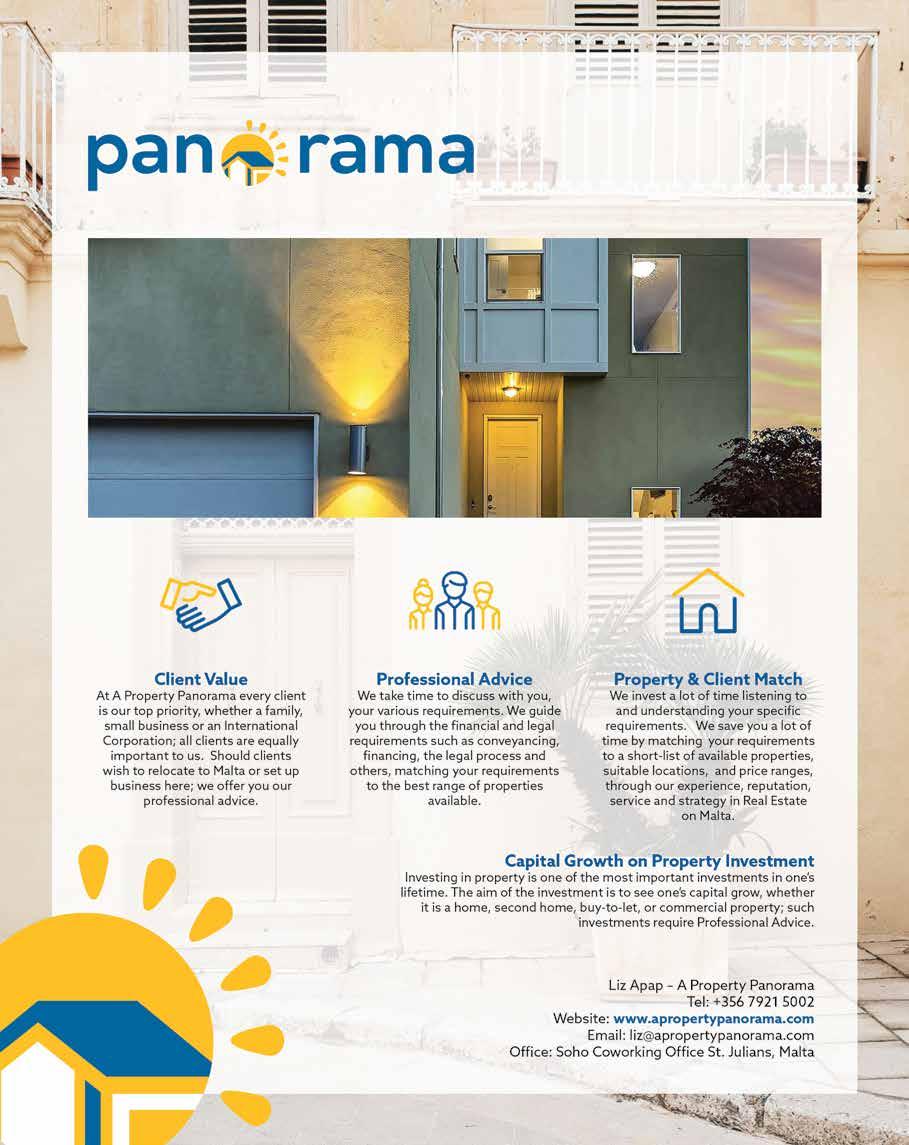
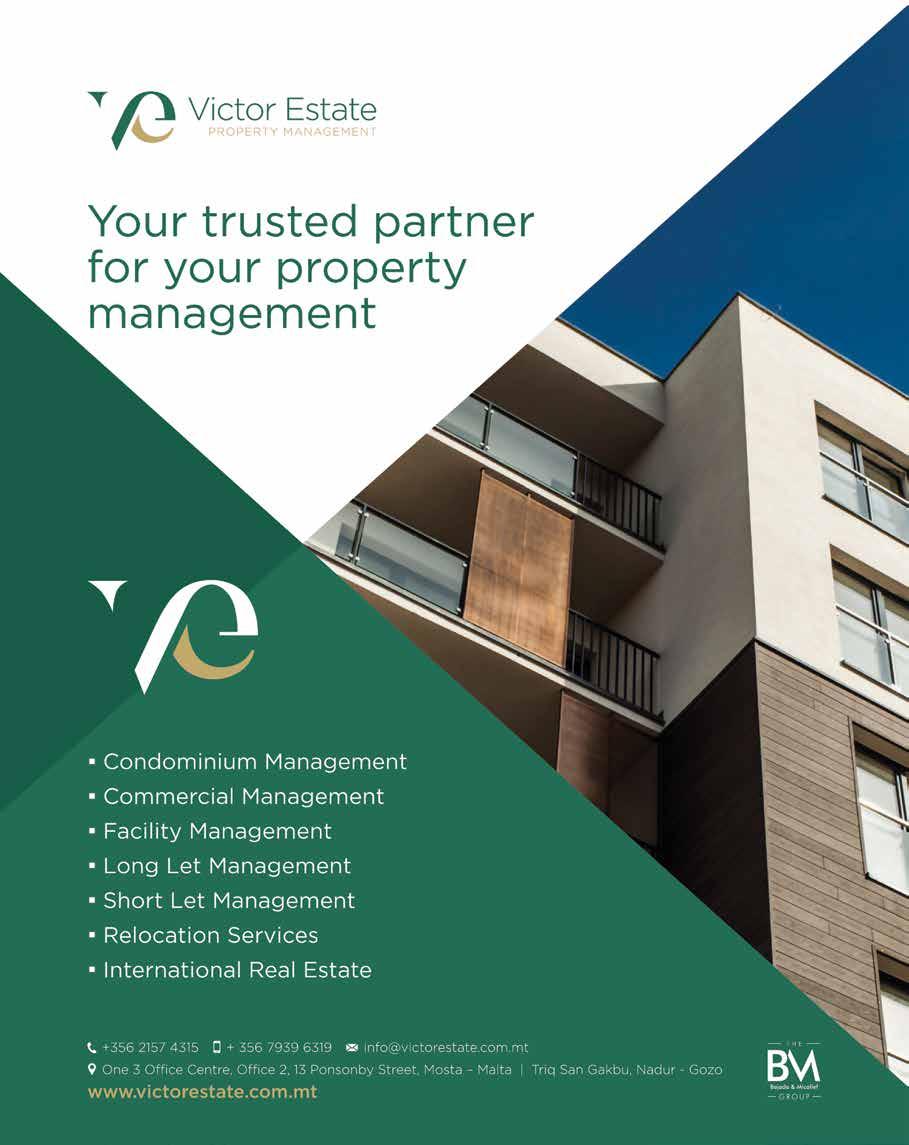
Application and duration: An application must be submitted through a Licensed Agent. The MPRP grants permanent residency rights, provided that the programme’s conditions continue to be met.
Property: Upon approval, applicants are required to either rent or purchase property in Malta. Rent must be a minimum of €14,000 annually. Purchased property must have a minimum value of €375,000. This qualifying property must be held for a minimum period of five years. Renters may switch their lease for a purchased property during this time, but a property owner cannot switch to a lease.
Application fee and Government contribution: Applicants must pay a non-refundable application fee of €50,000. Additionally, a contribution of €30,000 (if purchasing a property) or €60,000 (if renting) must be paid to the Government. This contribution covers the main applicant only. All other applicants, including spouse, children up to the age of 29 and grandchildren, are subject to an additional contribution of €10,000 each.
Donation: Applicants must make a donation of €2,000 to a local philanthropic, cultural, scientific, artistic, sport, or animal welfare association registered with the Commissioner of Voluntary Organisations.
Applicants must also be in possession of a valid travel document, comprehensive health insurance and, when travelling across Schengen, must take out travel insurance.
More information about the Malta Permanent Residence Programme can be found on the website of its operator, Residency Malta (residencymalta.gov.mt), a dedicated Government-run agency.
The Malta Residence Programme and Global Residence Programme (M(G)RP) are very similar to the MPRP. Both offer permanent residence benefits, including visa-free travel across the Schengen Area and access to Maltese real estate investments. However, the key difference lies in the eligibility criteria. While the MPRP requires a significant upfront contribution, the M(G)RP substitutes this with a minimum yearly tax obligation at a discounted rate.
The tax benefits associated with the M(G)RP can be particularly attractive to those seeking to optimise their personal tax structures, extending these advantages to the residence holder’s family as well. Coupled with Malta’s extensive network of double taxation agreements (seep.254), the scheme can be central to a tax plan designed to limit tax exposure.
Applications are processed in around three to six months. There is no minimum stay requirement, but applicants must ensure not to spend more than 183 days in any other jurisdiction in any single calendar year. The requirements and benefits of these two programmes are nearly identical, with the distinction being that the Malta Residence Programme is only available to EU/EEA passport holders, while the Malta Global Residence Programme is open to citizens of all but a few countries (details below).
M(G)RP Tax Implications
Residence holders through the M(G)RP are granted special tax status. Foreign-sourced income not remitted to Malta is taxed at 0 per cent, while income earned abroad that is remitted to Malta is taxed at a beneficial flat rate of 15 per cent.
M(G)RP Eligibility Criteria
Nationality: Applicants cannot be citizens of countries currently subject to international sanctions. It is recommended to refer to the MPRP FAQ on the Residency Malta website (residencymalta.gov.mt) for an up-todate list of such countries.
Capital: No particular capital requirements.
Minimum tax: M(G)RP beneficiaries must submit an annual tax return showing they have paid at least €15,000 in taxes (i.e. must remit at least €100,000 to Malta every year).
Income: Applicants must present proof of sufficient financial resources to support themselves and their dependants without recourse to social assistance.
Background check: Applicants must have a clean criminal record and must not pose a threat to national security, public policy, public health, or public interest.
Application and duration: An application must be submitted through a Licensed Agent. An important difference between this scheme and the Permanent Residence Programme is that an M(G)RP permit is issued for one year, with its renewal subject to the presentation of evidence that the minimum tax requirement, along with all the other conditions, has been met.
Property: Upon approval, applicants must either rent or purchase property in Malta, which will serve as their principal place of residence worldwide. Rent must total a minimum of €8,750 annually if the property is located in the South of Malta/Gozo or of €9,600 in the rest of Malta. Purchased property must have a minimum value of €220,000 in the South of Malta/Gozo or of €275,000 in the rest of Malta.
Application fee: The application must be accompanied by a fee of €5,500 if the qualifying property is in the South or in Gozo, or of €6,000 if located elsewhere. This fee covers the main applicant, their spouse, and any dependent children.
Applicants must also be in possession of a valid travel document, comprehensive health insurance and, when travelling across Schengen, non-EU nationals must take out travel insurance.
More information about the Residence and Global Residence Programmes can be found on the website of Malta’s income tax department, the Commissioner for Revenue (cfr.gov.mt), which is the entity responsible for the schemes.
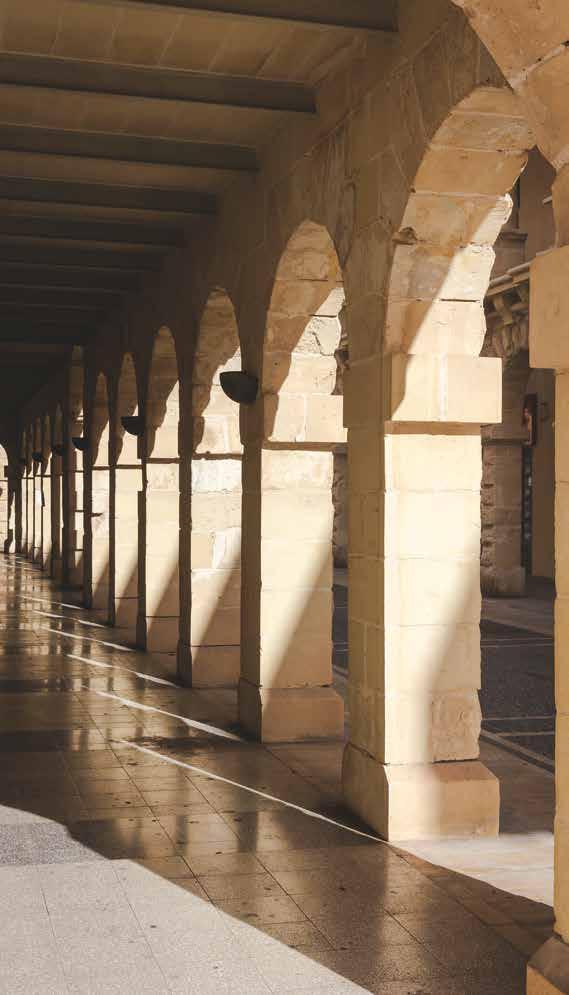
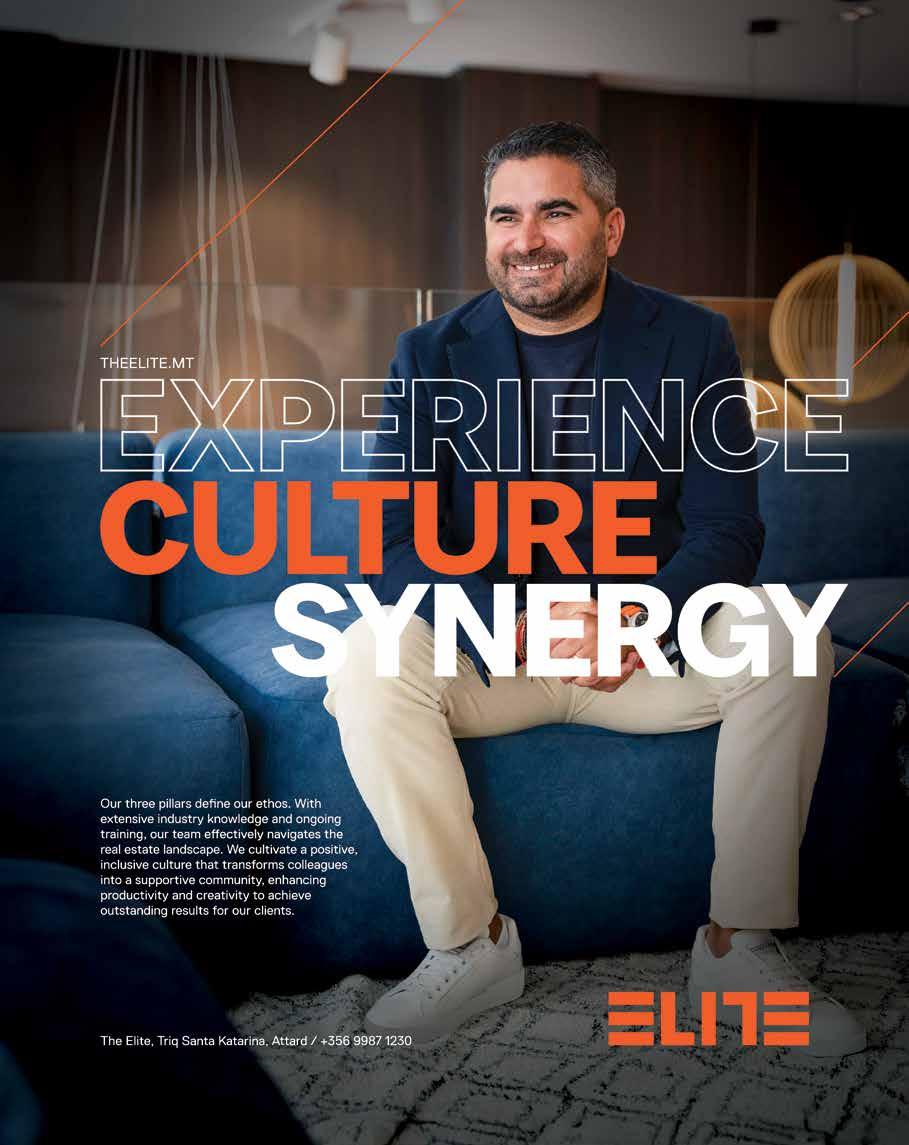
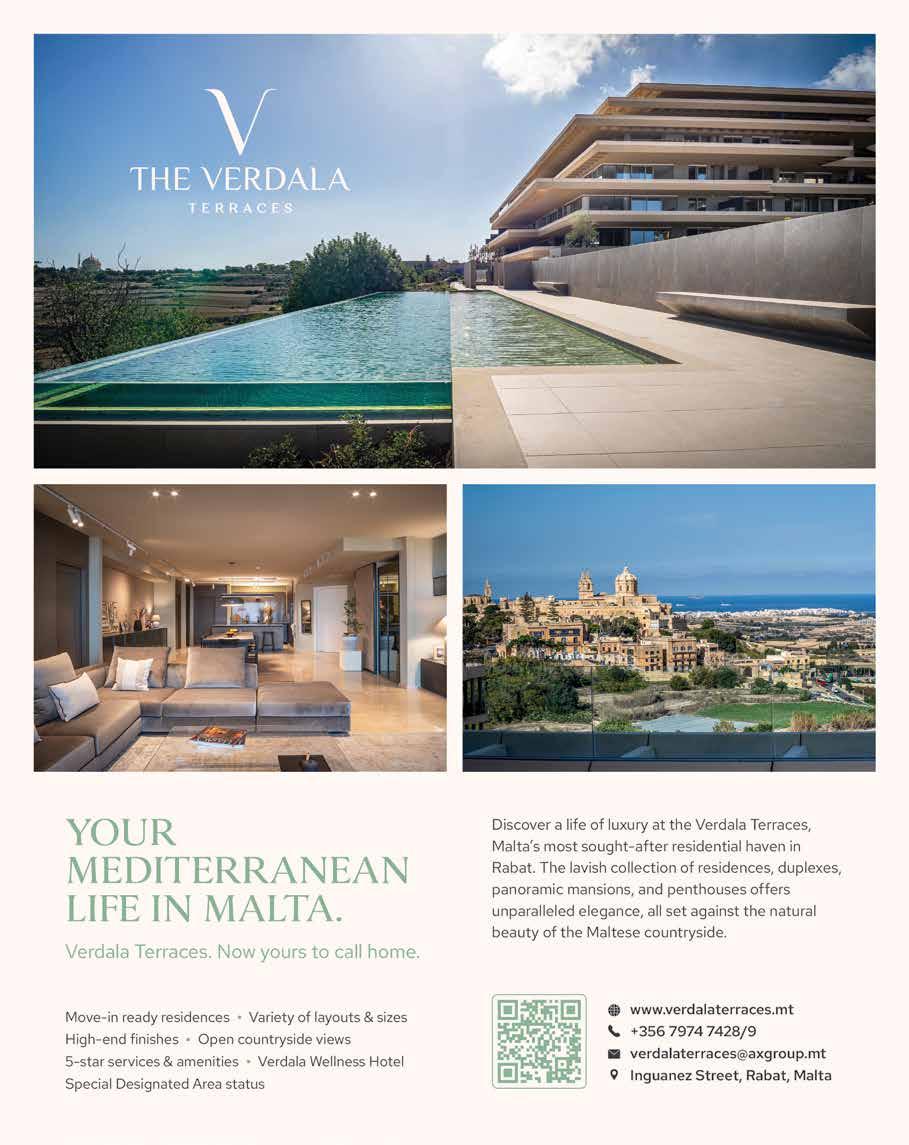
Malta has long been a favourite destination for people in their golden years. The country’s culture lends itself to a relaxed yet active lifestyle that leaves many feeling as though they have rolled back the years. Malta’s small size helps – wherever you choose to reside, you are never far from the capital, from the shops, services and amenities you need, and of course, from the world-class healthcare services available.
The Malta Retirement Programme (MRP) – open to persons who are not in employment and who receive periodical pension income – offers applicants from around the world the opportunity to carve out their slice of paradise, shared with many others of similar age and experience, creating wonderful opportunities for new connections.
Beneficiaries of the MRP need not worry about leaving trusted staff behind. The scheme allows for special carers, who have been providing substantial and regular care to the beneficiary or their dependants, to enter the country and even live with them in the property of their choice.
As the adage goes, retired does not mean inactive. Beneficiaries may engage in a variety of activities, including non-executive roles on company boards or involvement in the many trusts, foundations and similar organisations that make life in Malta so meaningful and rewarding.
The scheme requires a physical presence, with beneficiaries needing to reside in Malta for a minimum of 90 days in each calendar year, although this can be averaged out over a five-year period. Beneficiaries must also not reside in any other jurisdiction for over 183 days in any calendar year.
Residence holders under the MRP are granted special tax status, with pension income remitted to Malta taxed at an attractive flat rate of 15 per cent. Income arising in Malta is taxed at a flat rate of 35 per cent.
MRP Eligibility Criteria
Capital: No particular capital requirements.
Income: At least 75 per cent of the individual’s income must derive from a pension, with a maximum 25 per cent from other sources. Proof of sufficient financial resources to maintain themselves and their dependants without recourse to social assistance must be presented.
Background check: Applicants must have a clean criminal record and must not pose any threat to national security, public policy, public health, or public interest.
MRP Application
Application: An application must be submitted through an Authorised Registered Mandatory.
Property: Upon approval, applicants must purchase or rent a property in Malta as their principal residence. Purchased property must have a minimum value of €275,000 (€220,000 if located in Gozo or the South of Malta). A rental agreement must meanwhile be for a minimum of €9,600 per year (€8,750 if situated in Gozo or the South of Malta).
Application fee: €2,500.
Health insurance: Applicants must have global health insurance and provide evidence that they can maintain it indefinitely.
Applicants must also be in possession of a valid travel document, and, when travelling across the Schengen Area, non-EU nationals must take out travel insurance.
More information about the Malta Retirement Programme can be found on the website of Malta’s income tax department, the Commissioner for Revenue (cfr.gov.mt), which is the entity responsible for the scheme.
Minimum tax: MRP beneficiaries must submit an annual tax return, showing payment of at least €7,500 in taxes for the main beneficiary and another €500 per annum for every dependant. Maximise pension income
Bring household staff with you
Since its introduction in 2021 to meet increasing demand for a straightforward route to Maltese residency by the growing cohort of digital nomads, over 1,000 people have obtained the Nomad Residence Permit (NRP). Many are attracted to Malta for its culture, lifestyle options and connections to European destinations – not to mention the strong country-wide internet coverage. The Covid-19 pandemic caused a boom in location-independent remote work, as companies worldwide adapted their systems to enable staff to work from home. As the pandemic subsided and travel restrictions were lifted, not everyone returned to the office, and the digital nomad culture – simmering underground for over a decade – burst into the mainstream and created new opportunities for countries like Malta. Similarly, professionals and creatives working on a freelance basis, requiring just a laptop and an internet connection, are realising that they can live better, and more cheaply, in locations away from the big economic hubs. Why pay exorbitant rent in a rainy city, when you can get a beachfront apartment for half the price?
Today, Malta boasts a growing digital nomad community, with dedicated co-working spaces and frequent networking events. Beneficiaries of the NRP can also take advantage of the Schengen Area to travel around Europe without the need to obtain separates visas for each country, multiplying their opportunities and opening up a world of pan-European travel.
Applicants should note that in April 2024, the minimum eligible income was increased, and applicants are now required to prove they have a gross annual income of €42,000. At the same time, the maximum stay was extended to four years – in response to the demands of many nomads who find Malta to be a welcoming base they might even call home.
An update to the NRP’s tax rules for 2024 and beyond allows beneficiaries to benefit from a 10 per cent income tax rate on ‘authorised work’, which is effectively work falling under the categories eligible for the NRP. If such income is subject to tax in another jurisdiction with which Malta has a double taxation agreement (seep.254), no additional tax is payable in Malta. Additionally, for the first 12 months, there is no requirement to pay tax in Malta unless desired.
This is a major improvement over the previous rules, where NRP beneficiaries faced rates of up to 35 per cent. However, prospective beneficiaries should bear in mind that this favourable tax rate does not apply to income outside the scope of the NRP, such as dividend and interest payments, which would be subject to Malta’s general tax rules.
The changes bring more certainty to an area that was sometimes subject to confusion, but the new rules’ caveats will likely require the input of a local tax professional for beneficiaries to gain maximum benefit.
Nationality: Applicants must be citizens of a country outside the EU or EEA, and cannot be Swiss. They also cannot be citizens of countries currently subject to international sanctions. It is recommended to refer to the NRP FAQ on the Residency Malta website (residencymalta.gov. mt) for an up-to-date list of such countries.
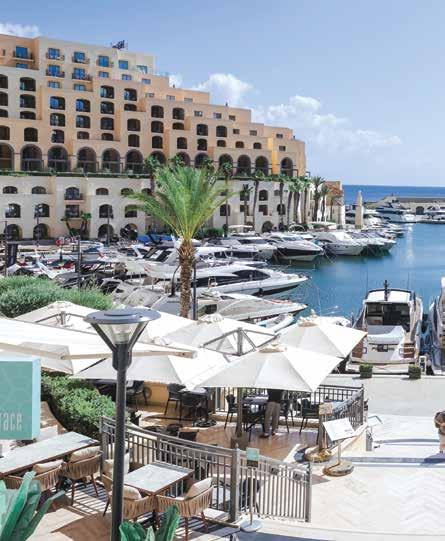
Nature of work: NRP applicants cannot work with or for a Maltese company, nor offer their services locally. They must show that they fall into one of three categories, which constitute ‘authorised work’:
(a) They work for an employer registered in a foreign country and have a contract of work;
(b) They are a partner or shareholder in, and conduct activities for, a company registered in a foreign country; or
(c) They offer freelance or consulting services under contract to clients whose permanent establishments are in a foreign country.
Income: Applicants must be able to prove that they earn a gross annual income of €42,000.
Background check: Applicants must have a clean criminal record and must not pose any threat to national security, public policy, public health, or public interest.
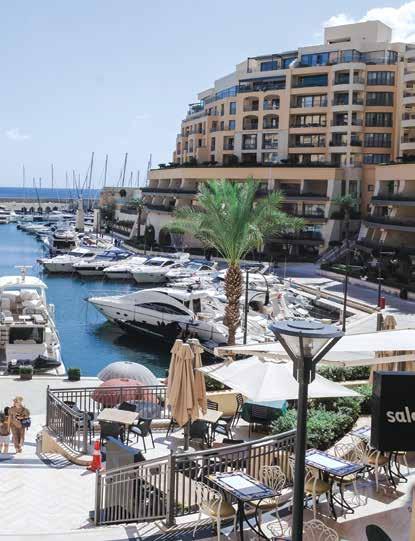
Application and duration: NRP applications can be submitted directly by the applicants themselves to Residency Malta, the agency operating the scheme. The permit is valid for up to one year and is renewable for up to three years.
Property: Applicants must present a valid rental or purchase agreement upon approval of their application.
Application fee: Each applicant must pay a non-refundable administrative fee of €300. This only covers the individual, so the same fee applies to each dependant. Permit renewal requires the resubmission of this fee.
Visa requirements: Successful applicants who do not require a visa can proceed to Malta upon approval, but citizens of over 90 countries do require a visa to enter Europe. Applicants from these countries must obtain a national visa from the state-run Identity Malta agency before travelling to Malta.
Applicants must also be in possession of a valid travel document, comprehensive health insurance and, when travelling across Schengen, must take out travel insurance.
More information about the Nomad Residence Programme can be found on the website of its operator, Residency Malta (residencymalta.gov.mt), a dedicated Government-run agency.
Malta Startup Residence Programme
Malta’s startup scene continues to gain momentum, with accelerators and incubators of global renown establishing a presence and new initiatives fostering a supportive ecosystem that is making waves beyond its shores. Central to these efforts is the Malta Startup Residence Programme (MSRP), which allows founders, core team members and their respective families who are not EU citizens to take up long-term residence.
Through the MSRP, beneficiaries obtain the stability needed to create and implement long-term business plans, supported by Malta Enterprise, the main contact point for startups and scale-ups looking to set up operations in Malta. Notably, these support measures do not require founders to give up equity in the company. Apart from the many benefits of Malta’s business and cultural environment, startups also receive the kind of personal attention that is difficult to find in larger jurisdictions.
This openness to one-to-one dialogue and active engagement to find the right solutions is one of the features entrepreneurs and investors mention most frequently when asked about their experiences in Malta, cementing the country’s reputation as a natural home for innovation.
Beneficiaries of the MSRP must live and pay taxes in Malta, and are subject to statutory Maltese tax rules (seep.253)
Startups will be considered eligible if they are engaged in innovative economic activities enabled through knowledge and technology. They must provide services or products that are not readily available on the market, or which will be provided through a novel process. Preference is given to startups involved in high-end manufacturing, industrial services, software development, life sciences, and blue, green and sustainable industries.
Nationality: Applicants must be citizens of a country that is not in the EU or EEA, and cannot be Swiss. They also cannot be citizens of countries currently subject to international sanctions. It is recommended to refer to the MSRP FAQ on the Residency Malta website (residencymalta. gov.mt) for an up-to-date list of such countries.
Position: Applicants must be the founder or co-founder of an enterprise that has been registered for not more than seven years, and which has not taken over the activity of another enterprise or been formed through a merger. Core team members must have full-time employment contracts with the startup, with gross salaries of at least €30,000.
Investment: The startup incorporated in Malta is required to have a tangible investment or paid-up share capital of at least €25,000. If more than four co-founders apply for the MSRP, an additional €10,000 must be invested for each additional co-founder.
Income: Applicants must prove sufficient financial resources by providing a bank statement.
Background check: Applicants must have a clean criminal record and must not pose any threat to national security, public policy, public health, or public interest. They must also not have had previous applications for residency or citizenship rejected, in Malta or abroad.
Application and duration: MSRP applications, including a business plan, can be submitted directly by the applicants themselves to Malta Enterprise. The permit is valid for three years and is renewable for another five years, as long as the startup still meets the eligibility criteria.
Application fee: Each applicant must pay a non-refundable administrative fee of €750. This only covers the individual, so the same fee applies to each dependant.
Applicants must also be in possession of a valid travel document, comprehensive health insurance and, when travelling across Schengen, must take out travel insurance.
More information about the Malta Startup Residence Programme can be found on the website of its operator, Residency Malta (residencymalta.gov.mt), a dedicated Government-run agency.
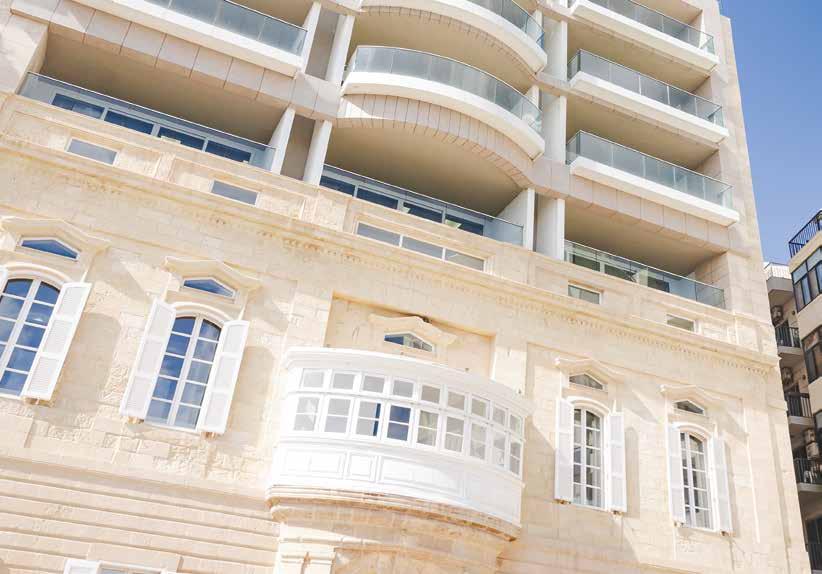
Ammar Soltan is the Founder and Managing Director of eeetwell, a fast-growing healthy food franchise with 27 stores across Malta, France, Italy, Belgium, the United Kingdom, Dubai, and Libya. Starting his career at 19, he advanced through various roles, working his way up to leave a significant mark in the food industry.
What are the benefits of living in Malta, as an individual and as a business leader?
Living in Malta has been an incredible experience for me, both personally and professionally. On a personal level, I love the Mediterranean lifestyle – the sunny days, the sea and the welcoming community. From a business perspective, Malta is a strategic gem in the heart of the Mediterranean, offering a business-friendly environment that supports growth and innovation. It’s a place where a strong vision, combined with hard work, can truly thrive. The close-knit community in Malta makes it easier to connect with people, collaborate and build something meaningful.
Your story is quite inspirational, having arrived as a young man and initially working as a manual labourer in the construction sector before taking the plunge and starting eeetwell. How conducive is Malta, socially and economically, to such a journey?
My journey in Malta started with hard work and humble beginnings. However, after my arrival, I found a community that truly values ambition and determination. There’s this can-do spirit here – a belief that if you put in the effort, you can make things happen. Economically, Malta may be small, but it’s agile and open to new ideas. There’s a growing appetite for healthier, more sustainable living, which aligns perfectly with eeetwell’s mission. The tight-knit community makes it easy to connect with like-minded people who believe in your vision. Malta is a place where doors will open if you’re ready to walk through them.
As eeetwell has grown, you have become familiar with the business landscapes of other countries. In light of this, what would you say are the pros and cons of investing in Malta?
Investing in Malta comes with its fair share of positives. You’ve got a strategic location, a competitive tax system and a Government that wants to see businesses succeed. There’s also a great sense of community here – people support each other, and the workforce is skilled, multilingual and adaptable. On the downside, Malta’s size can be somewhat limiting and logistics can sometimes be tricky with imports. However, Malta’s connectivity to Europe and beyond turns these challenges into opportunities. At the end of the day, it’s all about seeing the bigger picture and leveraging Malta’s strategic position to unlock wider opportunities.
What advice would you give those who are considering making Malta their home?
Malta is a great place to call home, whether for business or lifestyle. My advice? Dive right in. Embrace the culture, connect with locals, get involved, and make the most of the island’s networking opportunities. The island might be small but that’s actually a big advantage – you can easily build relationships and find your community. There’s a lot to discover here! Enjoy the local food and the beautiful nature, and soak up the endless summer days. If you come with an open heart, Malta has a lot to offer.
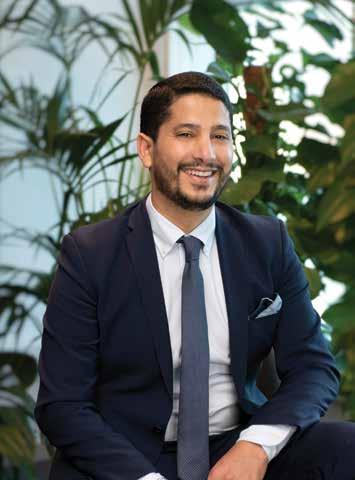
What advice would you give those who are considering investing in Malta?
If you’re thinking about investing in Malta, I’d recommend starting by doing your homework and connecting with local experts who truly understand the market. Malta has a lot going on, especially in sectors like finance, tech and hospitality. Its position as a bridge between Europe and North Africa is a unique advantage. Sure, there are challenges – every market has them – but with the right mindset and a willingness to work, Malta can be incredibly rewarding. Build strong local relationships, be ready to adapt and you will find plenty of opportunities to grow and make a real impact.
There’s this can-do spirit here – a belief that if you put in the effort, you can make things happen.
MadeYou is a people development business specialising in leadership training and executive coaching with clients across Europe and globally. Luke Todd, who has been living in Malta since 2013, founded the firm in 2014. Since then, he has overseen its development and expansion into employer branding and 360-degree feedback as CEO.
What were your reasons for choosing to become a resident here in Malta?
One of the main reasons I chose to settle in Malta is that English is widely spoken here. On top of that, the quality of life is much better than in London. Not to mention that my parents had always planned to retire to Malta, so it was something I had already been considering.
What have the benefits been for you, as an individual and as a business leader?
As an individual, Malta has greatly improved my work-life balance. Having more quality personal time has made a real difference.
As a business leader, the benefits have been significant. If you do good work, consistently deliver on key objectives and show a clear return on investment, you build strong customer loyalty. What I’ve noticed here, more than in any other country I’ve worked in, is that businesses tend to continue working with those who add value and can prove it. This has been instrumental in helping me grow the business.
How easy was it to settle down on the island, both socially and at work?
Settling down at work was smooth. It’s very easy to do business in Malta, with a strong emphasis on face-to-face meetings, networking and building a solid business network. This approach works really well on the island.
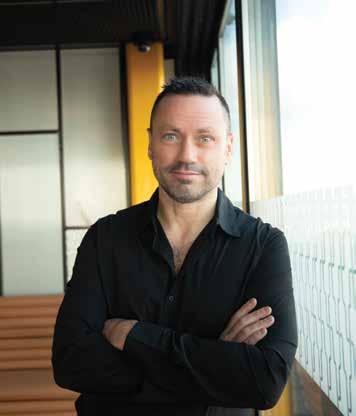
Socially, it was also easy to adjust. People here are friendly, approachable and always willing to lend a hand, which has made settling in much more comfortable.
What is running an international business from Malta like?
Running an international business from Malta has been amazing. We’re a remote-first company, offering both remote and in-person services.
From a remote perspective, it’s seamless to operate from Malta – the network infrastructure is stable, and connecting with people globally is easy.
For in-person work, Malta is well-connected in terms of travel, with links to major international airports, making it simple to reach other destinations. Additionally, the strong presence of international businesses here has allowed us to collaborate with companies that have a Maltese entity, helping us build our profile beyond the island.
Malta has greatly improved my work-life balance. Having more quality personal time has made a real difference.
What would you say are the pros and cons of investing in Malta?
The pros of investing in Malta are clear. It’s a growing economy with a strong focus on upskilling the local workforce and staying ahead of the curve, particularly in technology. There’s a genuine appetite for growth, both from businesses and individuals, creating a dynamic environment for investment.
As for the cons, one of the main challenges is the preconceptions people outside Malta may have. Being a small island, Malta doesn’t always get the international recognition it deserves as a strong business hub. So, the key challenge is raising Malta’s profile and showcasing just how great a place it is to do business.
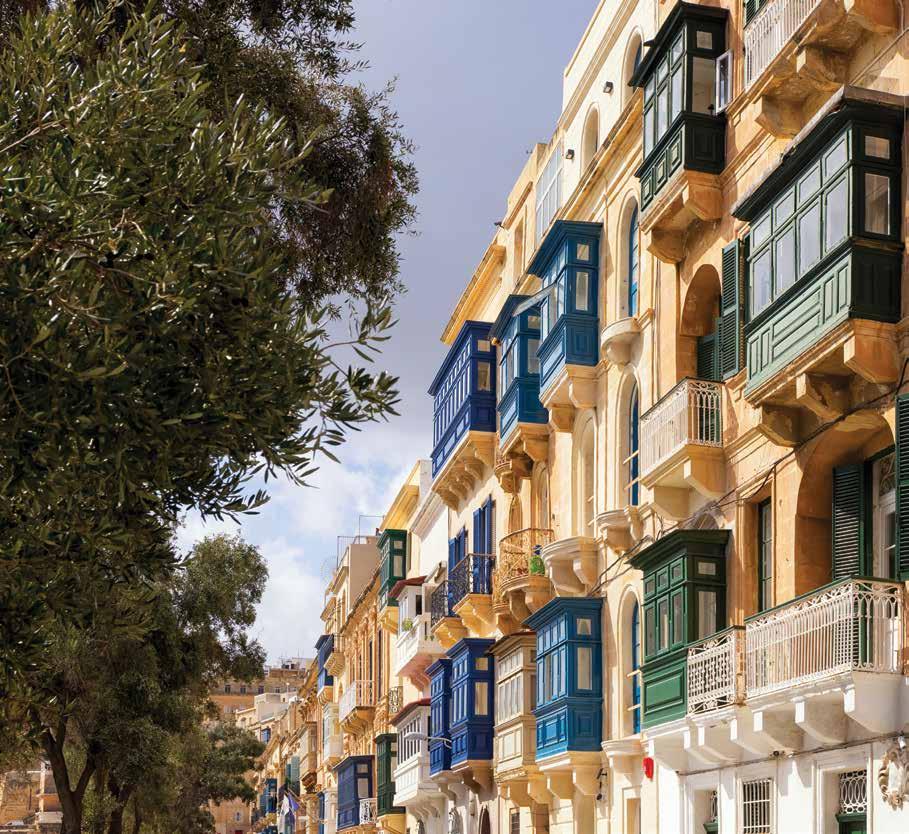
Residency Malta is a Government entity committed to facilitating seamless and secure pathways for non-EU nationals to call Malta their home. Spearheading the agency, CEO Jonathan Cardona tells Warren Joseph Bugeja that its programmes are instrumental in attracting talent and resources that drive Malta’s progress and global integration.
Positioned strategically bang in the centre of the Mediterranean, an EU member state on the doorstep of Africa, Malta has long been celebrated for its rich history, stunning landscapes and vibrant culture. Today, this island nation is rapidly emerging as a coveted destination for individuals and families seeking stability, safety and quality of life through its innovative residency programmes. Beyond the obvious appeal of a buzzing Mediterranean lifestyle, these temporary or permanent programmes offer a unique blend of business
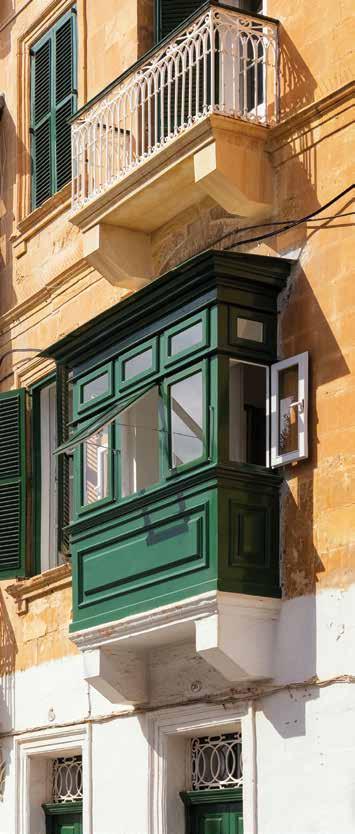
opportunities and top-tier education and healthcare, all within a secure and well-regulated framework.
Under the dynamic leadership of CEO Jonathan Cardona and his predecessors, Residency Malta has meticulously crafted and now manages two flagship programmes: the Malta Permanent Residency Programme (MPRP) and the Nomad Residence Permit (NRP). These programmes are not only attracting a diverse pool of applicants from across the globe but are also contributing significantly to Malta’s economic and social landscape.
“This rigorous process ensures that only fit-andproper individuals are granted residency.”
A Vision for Growth: The Malta Permanent Residence Programme
The MPRP stands out as a premier residency-by-investment initiative. Designed to provide a clear and structured pathway to residency, the MPRP requires applicants to make investments in property and contribute to Government funds. The programme has garnered significant interest, particularly in the post-Covid era, as more individuals seek stable jurisdictions and secure environments in Europe. The MPRP’s appeal lies not only in its added value positioning but also in the clarity and transparency of the application process. “There are no hidden surprises or agendas along the way. Everyone is treated the same. What you see is what you get,” Mr Cardona emphasises.
The MPRP offers beneficiaries the right to settle, stay and reside permanently in Malta. Additionally, they enjoy visa-free travel across the Schengen Zone for 90 out of 180 days, and the ability to include up to four generations in a single application. “The success of the MPRP is rooted in the all-around value it offers. One of the major advantages of the MPRP is that the initial capital outlay is not exorbitant,” Mr Cardona explains. “Applicants risk less money upfront, as the major capital investment only occurs after their application is approved. If their application is refused, they are not short-changed. The Maltese process is more pragmatic than other overseas residency programmes, and this is what attracts our clients.” Furthermore, each step of the programme is easily comprehensible and precise, and follows a logical, straightforward sequence. “There are no moving goalposts,” Mr Cardona reaffirms.
The programme’s popularity led to a post-Covid spike in applications, which at one point surged from 60 to 150 applications a month, causing unexpected delays in processing times. To manage the growing demand, Residency Malta has invested in several measures aimed at speeding up the application process without compromising the quality of its due diligence.
This rigorous process ensures that only fit-and-proper individuals are granted residency, a principle that Mr Cardona believes is crucial to the programme’s long-term success.
“Applicants want to be part of a programme that is clean and transparent,” says Mr Cardona. Due diligence is indeed a key differentiator for Malta. “We leave no stone unturned in ensuring that every applicant meets our standards,” he insists. The process starts with a thorough verification of the documents provided and the applicant’s financial background. Residency Malta then engages local and international experts to conduct in-depth, on-the-ground research to assist in jurisdictions such as China, where language and cultural barriers exist, and access to information can be challenging. “We review local media reports, pending court cases, and databases accessed by our agents and overseas partners to gain a clearer picture and cross-verify the information provided by applicants,” Mr Cardona states. The agency also conducts regular compliance procedures and spontaneous spot checks on properties. Ultimately, Residency Malta’s analysts compile a final report and present their conclusions and recommendations to one of three independent boards, which delivers the final verdict. “Our goal is to maintain the programme’s integrity, which in turn protects the country’s reputation. The fact that our programme is perceived as clean and reputable attracts high-quality applicants – people who are successful, resourceful and can contribute positively to Malta,” Mr Cardona asserts.
“The majority of MPRP applicants are Asian, so our strategy going forward is to promote the programme in other regions such as Turkey, Africa and America, engaging potential clients both directly and through a series of half-day seminars and briefing sessions in select locations.”
“The feedback is quite positive,” Mr Cardona enthuses. “Most applicants begin by renting, and about a year later, once their children have settled in school, many decide to commit and purchase a property.”
Embracing the Digital Revolution: The Nomad Residence Permit Launched as a response to the growing trend of remote work, the NRP allows individuals to live in Malta while retaining their employment in another country. This programme is particularly attractive to digital nomads who seek a dynamic and multicultural environment where they can work remotely while enjoying the incredible outdoor lifestyle that Malta offers.
Malta’s cutting-edge telecommunications infrastructure, coupled with its widespread English proficiency, positions it as an ideal base for digital nomads. The island offers excellent connectivity, with nationwide 5G mobile internet service, making it easy for remote workers to stay connected. The NRP is issued for one year and can be renewed, provided the applicant continues to meet the eligibility criteria.
“Malta ticks all the boxes for a nomadic lifestyle,” Mr Cardona notes. “We have observed a growing number of digital nomads choosing Malta as their base, drawn by the island’s vibrant expat community, excellent business networking opportunities and the appealing Mediterranean climate. The fact that English is an official language further simplifies communication and settling in is fast and easy.”
Moreover, Malta’s central location in the Mediterranean offers easy access to Europe, North Africa and the Middle East, making travel convenient. “We’ve also noted a growth in co-working spaces and networking hubs, which are crucial for digital nomads,” Mr Cardona adds. The digital nomad community in Malta is diverse, with applicants from across the globe, including Asia and Africa. Interestingly, the average age of NRP applicants is around 40, indicating that the programme appeals to a mature and experienced demographic. These individuals are not just seeking a place to live but are also bringing with them valuable skills and expertise that contribute to Malta’s economy.
“Malta has been attracting young digital expats for years, particularly since it became a hub for gaming companies,” Mr Cardona explains. “The NRP has opened the doors to even more mobile international talent coming to Malta, and we are seeing a steady increase in applications. While the programme is still in its early stages, the potential for growth is immense.”
Applications for the Nomad Residence Permit have steadily increased from 30 to 80 a month. The programme is primarily marketed on digital platforms. Residency Malta has recently launched an Instagram channel and collaborates with influencers who are digital nomads themselves. “This helps us reach a broader audience and engage with them in a more informal and relatable way. The nomad community is tight-knit, and positive word-of-mouth plays a significant role in attracting new applicants,” Mr Cardona remarks.
“The fact that our programme is perceived as clean and reputable attracts high-quality applicants –people who are successful, resourceful and can contribute positively to Malta.”
Navigating the Future: Strategic Initiatives and Challenges
Under Mr Cardona’s guidance, the Residency Malta Agency has been proactive in aligning its operations with upcoming regulations, including those under the EU’s AML 6 directive, which will subject agents to the scrutiny of the Financial Intelligence Analysis Unit (FIAU). The agency has also implemented a risk appetite policy that has reduced subjectivity in decision-making and increased output.
“Our mission is to act as a catalyst for suitable individuals wishing to make Malta their place of residence,” Mr Cardona states. “We have a young and dynamic team that is open to new ideas and committed to continuous improvement. We are focused on increasing our output, reducing backlogs and enhancing our IT infrastructure to streamline the application process further.”
Mr Cardona’s leadership fosters a culture where diverse perspectives are valued. This approach ensures that the agency can navigate challenges effectively and continue to offer high-quality services to its clients.
“Leadership is about creating a frank and constructive environment where everyone feels comfortable sharing their views,” Mr Cardona shares. “I believe in a team-based approach where we discuss decisions from all angles before reaching a conclusion. This method has always worked for me, and it has helped us navigate the complex landscape of residency programmes successfully. Working together, we’re not just processing applications; we’re contributing to Malta’s growth as a global player,” he highlights.
Embracing Innovation and Attracting Global Talent
Looking ahead, the agency is exploring the use of artificial intelligence (AI) tools to make the application process more efficient and move towards a more digital, paperless system while maintaining the highest quality standards. “The goal is to become a benchmark in the industry for how residency programmes should be run, ensuring that Malta remains a top choice for individuals seeking a secure and prosperous future,” Mr Cardona maintains.
While the financial contributions are significant – last year, for example, the MPRP brought in around €55 million to the economy – the real value, according to Mr Cardona, lies in the people the agency attracts: “Many of our applicants come from large blue-chip companies with vast experience, networks and ideas.” For instance, Malta’s success in the iGaming industry is partly due to the insights and expertise brought in by international entrepreneurs. Similarly, Residency Malta’s programmes are helping to build a more dynamic, cosmopolitan Malta that is wellprepared for future challenges.
As the agency continues to refine its processes and expand its reach, it is clear that Malta’s robust and transparent residency programmes will continue to attract top-tier applicants from around the world, further solidifying the island’s reputation as a leading destination for residency and investment.
Find out more about Residency Malta’s programmes on residencymalta.gov.mt
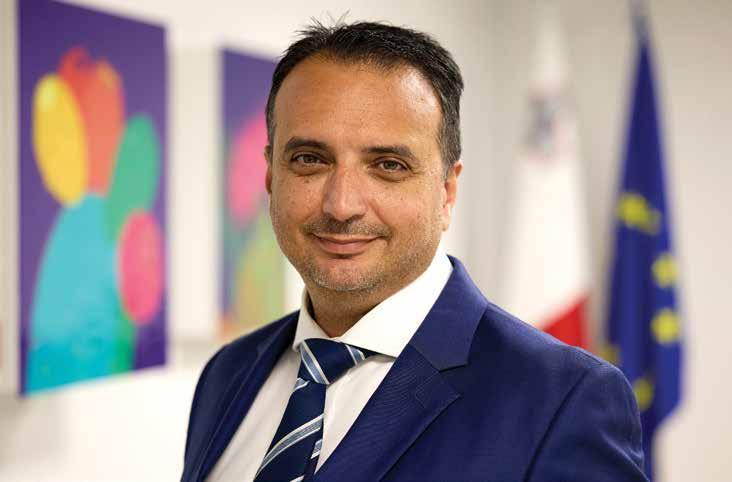
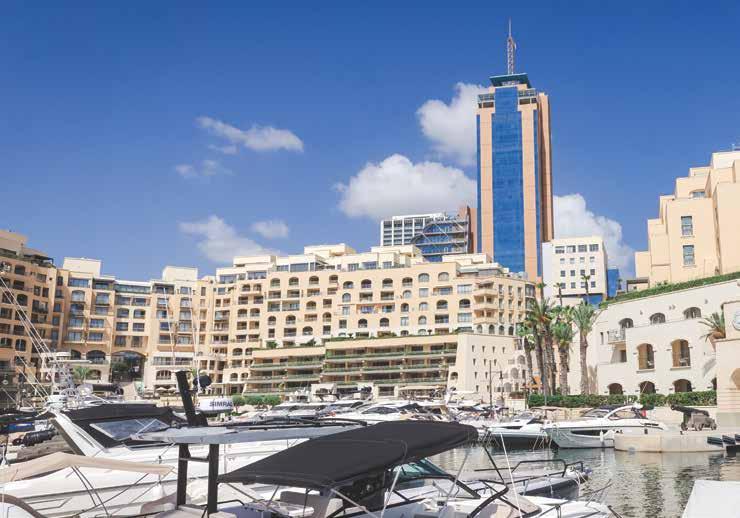
Ask the Maltese public about the best investment in Malta, and the overwhelming consensus will point to real estate. The perception of property as a safe and lucrative investment is deeply rooted, and anyone who has invested in property in Malta over the past decades has enjoyed a superlative return on investment. As a small island, Malta’s land is inherently scarce, and a rapidly growing population with increasing housing demand has created fertile ground for investment opportunities. Both large-scale and small-scale investors have capitalised on the classic dynamic of limited supply and rising demand, which continues to drive property prices upward.
Over the past half-century, Malta’s real estate market has consistently strengthened, with property prices roughly doubling every decade. Each 10-year cycle tends to feature a period of rapid growth, followed by relative stability. Currently, the market is experiencing a phase of consolidation, with property prices generally rising at a steady, moderate pace (6.8 per cent between 2023 and 2024), following a period of rapid growth (and increase in prices) between 2015 and 2020. Significant downturns have been rare, if they have occurred at all. The only notable dip took place during the global financial crisis in 2009, when Maltese property prices dropped by approximately 5 per cent –a modest decline compared to the steep falls witnessed elsewhere. As a result, Malta’s real estate sector has earned its reputation as a stable and sound investment.
While Malta’s property market may seem foolproof, successful investment depends on a deeper understanding of its unique
characteristics. One such aspect is the high level of homeownership, with around 75 per cent of Malta’s residents owning their own homes – a figure that rises to 85 per cent among the Maltese themselves. Additionally, about half of the remaining population lives in rentcontrolled properties. Property ownership is highly fragmented, driven predominantly by small-scale investors, with corporate involvement accounting for less than 10 per cent of residential transactions.
Malta’s accession to the European Union sparked a surge in housing demand, as professionals were drawn to the island by thriving sectors like iGaming and financial services. This influx turned many Maltese residents into landlords, purchasing second and third properties to rent to expatriates. The rising demand for housing among foreign professionals has also led to higher standards in development, particularly in the luxury property sector. Residency schemes tied to property ownership have further intensified these trends, transforming Malta’s property market from one primarily focused on second homes into a vibrant buy-to-let market – a major investment avenue for locals. The strong connection between private wealth and real estate in Malta ensures Government support for market stability, even in challenging times. For instance, during the Covid-19 pandemic, the Government reduced taxes on property transactions, leading to an unprecedented surge in both sales volume and value.
Investors in Maltese real estate benefit from three key factors: high occupancy rates, relatively low operating costs and low to moderate taxation on property transactions. Occupancy rates, as noted, remain robust, though monitoring current trends and future projections, as
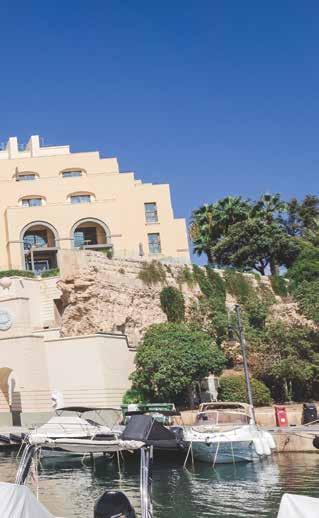
Source: Central Bank of Malta, Grant Thornton, Dhalia
discussed in the following pages, is essential. Holding property incurs minimal costs, as Malta does not impose municipal or estate taxes. The primary taxes on real estate relate to buying, selling and renting. Rental income is taxed at a flat rate of 15 per cent, although landlords can opt for a different system that includes such revenue in their annual tax return, allowing for deductions, subject to standard income tax rates. The 15 per cent flat rate is generally favoured. For property purchases, a 5 per cent stamp duty is applied, while sales are subject to an 8 per cent capital gains or final withholding tax. Properties that have served as a primary residence for at least three years are exempt from this tax, while properties sold after less than three or five years may qualify for a reduced rate of 2 or 5 per cent, respectively, under certain conditions. It’s also important to note that taxes on property transactions are calculated on the full sale price, excluding the value of movables.
over the 10-year period to 2023
Source: Grant Thornton, Dhalia
While real estate is Malta’s most popular investment avenue, it can be challenging for foreign nationals to enter the market due to restrictions on purchasing properties that are not intended as a primary residence unless the buyer has established residency. However, Special Designated Areas (SDAs) provide a solution. These luxury developments, offering exclusive amenities and stunning views, allow foreign investors to purchase property without restrictions, making them an ideal option for those seeking to invest in Malta’s real estate market.
This chapter delves deeper into these aspects, equipping you with the insights needed to embark on your Maltese real estate journey, whether you’re searching for a new home or exploring enticing investment opportunities.
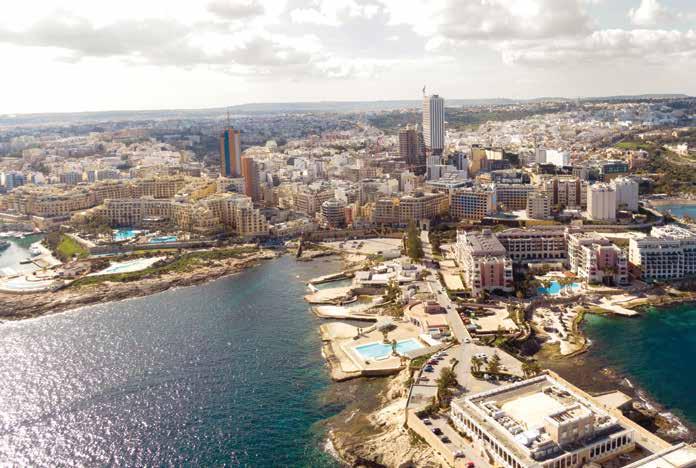
Given the local tendency to value home ownership and the limited supply of property on the small islands, Malta restricts the sale of real estate to non-residents. While Maltese and European Union citizens who have lived in Malta for at least five continuous years can purchase an unlimited amount of property, those who do not meet this condition must obtain an Acquisition of Immovable Property (AIP) permit before being
able to buy a second residential property. It is worth noting that no such permit is required when buying property for commercial use.
Non-EU buyers face further restrictions, requiring an AIP permit to buy any property outside Special Designated Areas (SDAs,seep.130). They can only acquire commercial real estate for specific (albeit broad) reasons. A reliable property consultant can provide further guidance.
Permit only granted for tourist or industrial development, or uses that contribute to the development of
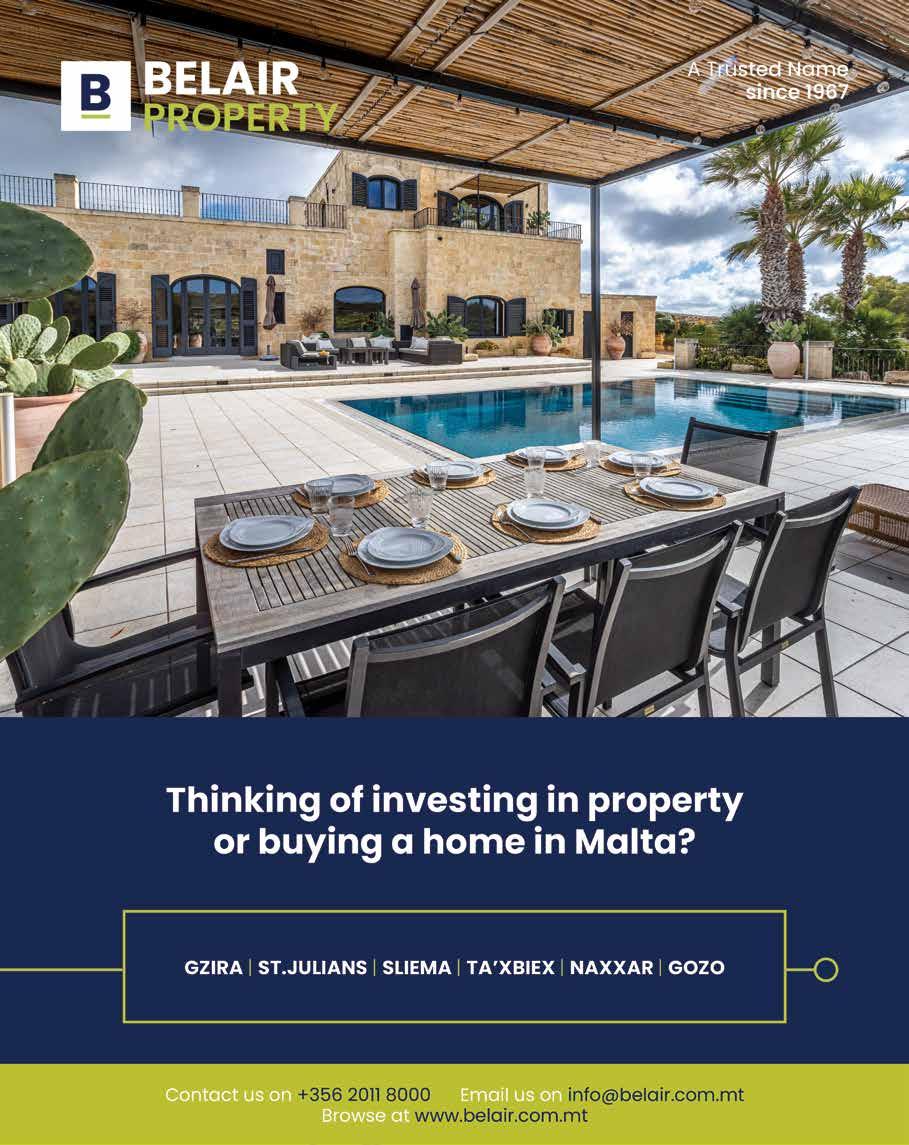
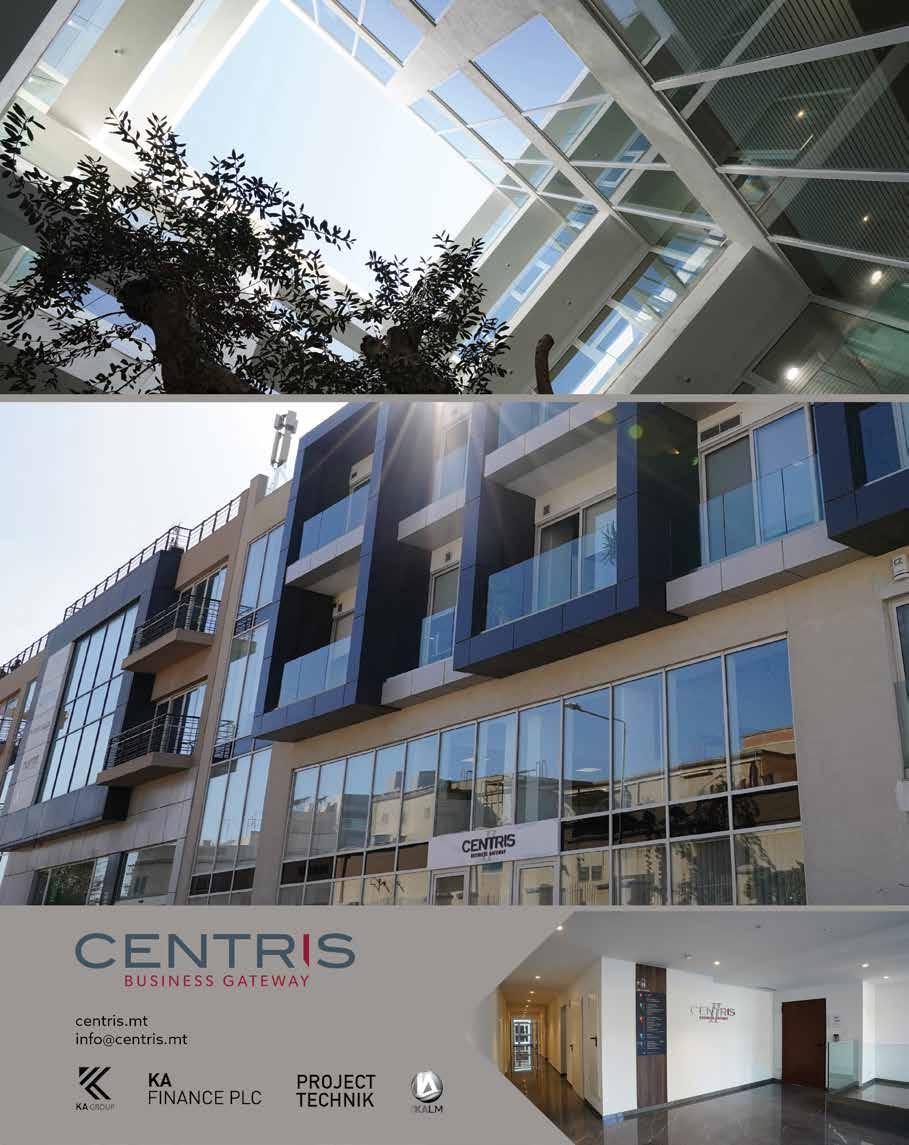
The hardest part of buying a property – though for many, it’s also the most enjoyable – is finding the right one. While real estate agencies have become almost essential to this process, prospective buyers should remain directly involved and ready to act swiftly when opportunities arise. Malta’s property market moves fast, and it’s not uncommon for a well-priced property to sell on the same day it’s listed. Luxury properties, however, tend to be less affected by this rapid pace. For those hoping to score a bargain, patience is key – such opportunities are rare. The low cost of holding property, coupled with the fact that property investors tend to be fairly liquid, means there is little urgency to sell, except in cases of personal circumstances. Establishing relationships with multiple property agents from different agencies can be a smart move, as they may alert you to new listings the moment they hit the market.
Once you’ve found the right property and agreed on a price with the seller, the buying process is relatively straightforward. First, a notary – engaged by the prospective buyer – will draw up a promise of sale agreement. This legally binding document outlines the agreed price, any conditions of the sale and the deadline for the final transfer. Typically, the period between signing the promise of sale agreement to the final deed is three to six months. The buyer normally pays a 10 per cent deposit upon signing the promise of sale agreement, which is usually kept by the notary. If the buyer backs out for reasons not specified in the promise of sale agreement, the deposit is forfeited to the seller, so it’s essential to do your due diligence before signing. Additionally, the buyer must pay 1 per cent of the stamp duty (calculated on the transaction price minus the value of any agreedupon movable furniture) at this stage. The remaining 4 per cent is due when signing the final contract of sale.
Once the promise of sale agreement is signed and the deposit paid, the notary will conduct a thorough investigation of the property’s legal history and title. This involves reviewing previous contracts and relevant documents to verify its ownership and boundaries, as well as checking for any legal issues or guarantees. Planning permissions and building regulation certificates will also be verified.
When the notary is satisfied that everything is in order, a meeting is set up to finalise the contract, at which point the balance of the sale price is paid and ownership of the property is transferred to the buyer. Notary tariffs are established by law, as are all the taxes, stamp duty and other relevant charges due from both purchasers and sellers. Legal fees and stamp duty are payable by the purchaser, while agency fees are payable by the seller.
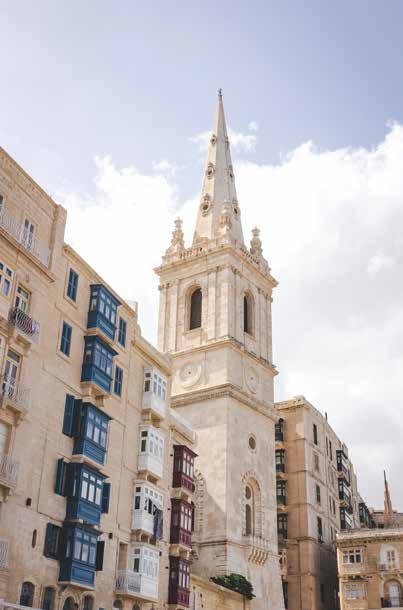
Despite its small size, each locality in Malta has a distinctive character that attracts different people. One significant advantage is that no matter where you choose to live, you’re never far from anywhere else – meaning you’re almost always close to your business, the beach and your favourite restaurant! Living in the cosmopolitan hub of the east coast places you in the heart of the financial and tech districts, yet a short drive can take you to the rugged west for breathtaking sunsets from Malta’s cliffs. While certain locations offer logistical benefits, they shouldn’t be overemphasised. Prospective buyers should avoid narrowing their search too much, as many locals travel across the island daily. Although traffic can be frustrating, it’s rarely a deal breaker if your dream home lies outside the main urban areas.
The first and most crucial step for foreigners looking to get acquainted with Malta’s real estate market is to explore various localities to find the area that best suits them. A knowledgeable agent is invaluable during this phase, offering localised insights that a casual observer might miss.
Valletta, Malta’s capital and a UNESCO World Heritage Site, offers exceptional investment opportunities. Over the past decade, it has undergone a remarkable transformation, with investments pouring into boutique hotels, upmarket residential developments and commercial spaces. However, parts of Valletta still await restoration, presenting ample opportunity for growth and profit as it continues to evolve into a world-class destination.
Across the historic Grand Harbour lie the Three Cities – Birgu (Vittoriosa), Isla (Senglea) and Bormla (Cospicua). These areas, rich in history and architecture, have also seen significant investment in recent years. A leading international yacht marina and some good eateries can be found here, and expats are increasingly drawn to the beautifully converted, character-filled properties in these historic streets.
Sliema and St Julian’s form Malta’s most cosmopolitan area, serving as hubs for iGaming, financial services, tourism, and entertainment. These localities have broad appeal for both locals and foreigners, with their mix of international restaurants, premium swimming spots and luxury shopping options. Unsurprisingly, property here commands high prices. Surrounding these hubs are Gżira, Swieqi, San Ġwann, and Pembroke, which offer a more suburban feel while still housing a diverse international community.
In the north, St Paul’s Bay and Mellieħa are major tourist destinations, home to some of the country’s largest hotels. The St Paul’s Bay area includes the resort towns of Qawra and Buġibba, while Mellieħa boasts Malta’s largest sandy beach. Both areas offer a range of properties across different price points and are popular among expatriates.

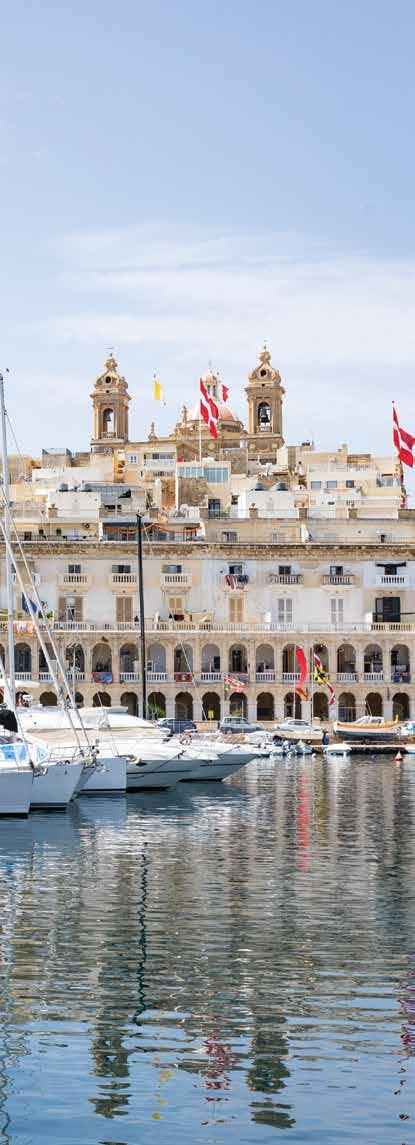
At the southern end of the island, Marsaxlokk and Marsaskala are prime tourism areas. Marsaskala, though more residential, features excellent restaurants, bars and several picturesque beaches. A nature park separates it from Marsaxlokk, famous for its waterside dining, traditional fishing boats and popular fish market. Property in these southern localities offers great value for money, with strong rental potential compared to the pricier northern areas.
Birkirkara, Santa Venera and Qormi may not be tourist hotspots, but they are popular central locations for workers due to their proximity to the Central Business District, Valletta, Mater Dei Hospital, and Malta’s main thoroughfare. Qormi, in particular, provides a glimpse into traditional Maltese life.
Similarly, Mosta, Naxxar, and the Three Villages – Lija, Balzan and Attard –are part of Malta’s residential heartland. Their proximity to open northern spaces appeals to professionals, and properties here often fetch higher prices.
Investors seeking bargains with high potential for appreciation should consider Ħamrun and Marsa. The latter is a somewhat neglected inner harbour area that the Government plans to regenerate, making it a promising long-term investment opportunity.
The villages along Malta’s western coast – Mġarr, Rabat, Dingli, Siġġiewi, Qrendi and Żurrieq – best capture the island’s timeless charm. These villages, surrounded by beautiful countryside and stunning coastal views, are particularly popular among expats seeking a peaceful slice of Mediterranean life. They also present excellent prospects for rental investments.
Gozo, Malta’s quieter sister island, offers property at lower prices than Malta, though the gap has narrowed in recent years. Much of the development is centred in the capital, Victoria, which boasts a wealth of entertainment and dining options, as well as in the coastal resorts of Marsalforn and Xlendi. Many foreign buyers, however, prefer the tranquillity of Gozo’s smaller villages, where they can enjoy unparalleled peace and quiet.
In each of the islands’ locations, property buyers will find a diverse mix of options. In areas like Valletta and the Three Cities, historic palazzos await a discerning eye to restore them to their former grandeur. Areas like Ibraġġ, The Gardens and Madliena offer sleek, modern villas characterised by sharp lines and a futuristic feel, while Sliema’s townhouses often reflect mid-century Modernism. Along the Sliema Front, upscale apartments and penthouses boast sweeping views of the Mediterranean. In contrast, more rural areas provide space for expansive country homes where rustic charm blends with contemporary design. This variety ensures there’s a property to suit every taste, whether you prefer ultra-modern or delightfully historic styles, and everything in between.
Ian Casolani is the Managing Director of Belair Property, a company he has been instrumental in developing and growing over the past 30 years, and which is today recognised as one of the leading players in Malta’s real estate industry. He has served as a Council and Board Member of The Malta Chamber for several years, and is a former President of the Federation of Estate Agents.
Why choose Malta for relocation or investment, over other Mediterranean destinations?
Malta is an attractive destination for relocation and investment due to its stable economy, competitive tax incentives, EU membership, high quality of life, and strategic location. It boasts a robust economy showing consistent growth and resilience even during global downturns. The country is renowned for its safety, superb healthcare and schooling, and warm Mediterranean climate. English is an official language, making it ideal for business and expatriates. The real estate market is attractive, with more affordable property prices compared to major cities like London or Monaco. The island’s rich cultural heritage, lively social scene and vibrant atmosphere add to its appeal, with its cosmopolitan and international lifestyle attracting expats from around the world. It is no longer a seasonal island where places close and life slows down in the winter months. January to December, night or day, restaurants are bustling, cafés are full and there’s always something going on, whether you’re in a small village or one of the main towns.

What challenges do foreign nationals or companies relocating to Malta face?
Relocating to Malta can indeed present various challenges for foreign nationals and companies, such as navigating local real estate and tax laws, understanding residency requirements and managing essential services like banking and utilities. Agencies like Belair Property play a crucial role in easing this transition. Expertise in local regulations and a strong network of partner professional advisors enable us to provide comprehensive support to clients. By guiding clients through legal requirements and offering assistance with everyday tasks, Belair Property ensures a smoother relocation experience, helping clients settle into their new homes or offices with greater ease and confidence.
How has the Maltese property market changed since you started out?
The Maltese property market has undergone a significant transformation over the past 30 years. When I first started back in the ’90s, the market was quite basic, with limited options for quality homes and commercial spaces. However, the emergence of lifestyle developments, upscale apartment buildings and modern business centres has dramatically changed the landscape.
Malta’s real estate market is quite unique, so it’s important not to take anything for granted or make assumptions.
Key factors driving these changes include Malta’s accession to the EU, which opened the door to foreign investment, and the growth of sectors like financial services and iGaming. The introduction of residency programmes aimed at attracting foreign tax residents and retirees has also played a crucial role in shaping the market. Together, these elements have contributed to the vibrant and diverse property market that Malta boasts today.
What advice would you give to someone looking to invest in Maltese real estate for the first time?
Malta’s real estate market is quite unique, so it’s important not to take anything for granted or make assumptions. It’s essential to do your research and familiarise yourself with the market dynamics, as well as the distinctions between different areas, even if they are close in proximity. Take the time to explore the types of properties available, their pricing and accessibility. Above all, it’s crucial to understand potential planning and title issues that certain properties might have. These are factors that credible, reputable service providers can help you navigate, which is why it’s important to surround yourself with trusted professionals.
A property specialist with close to 25 years of industry experience, Kurt Abela leads KA Holdings, which develops, sells and rents out real estate, largely in the commercial market. Through Project Technik, he is also involved in the sale and installation of building materials.
Malta has also been affected by the global slump in demand for office space, as firms adopt hybrid working models and increase their use of digital tools.
Yet KA Holdings owns and manages two office blocks under the Centris brand that are fully occupied. What are the factors that make for a successful office development?
Since entering this business sector, we have proactively adapted to the changing demand for office space. Our management has consistently provided both current and prospective tenants with flexible solutions tailored to their evolving requirements. For instance, when tenants needed to reduce their office space, we offered alternative spaces that better aligned with their new needs. This adaptability has been crucial in retaining existing tenants and attracting new clients seeking flexible office solutions.
This approach was particularly evident during the development of Centris II, where our team demonstrated a readiness to adjust and revise plans based on the changing working models and space needs of our tenants. We also explored offering hot-desking solutions for clients with short-term office requirements, further enhancing our adaptability.
Additionally, our strategic location has played a vital role in supporting our tenants by providing convenient access to logistical infrastructure and creating a conducive environment for business operations and employee well-being. Being responsive to tenant needs and providing the right amenities has been key to maintaining full occupancy in our office blocks, even amidst global challenges in the office space market.
Is there room in Malta for more office blocks?
Balance is key in every aspect of business. While the office block sector is nearing saturation, we believe that success depends on more than simply offering space. Providing tenants with timely support and creating a pleasant surrounding environment are essential for long-term tenant satisfaction. Competitive rental rates remain important, but tenants are willing to invest more when they receive exceptional service and feel their evolving needs are met. By prioritising tenant care and service quality, we ensure lasting partnerships, even in a competitive market.
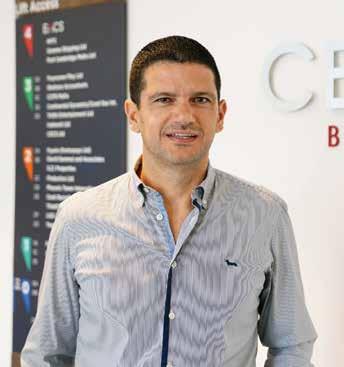
What segments or locations should foreign investors pay close attention to for opportunities?
The Central Business District (Mrieħel) has experienced significant growth over the past few years, both in terms of infrastructure and the range of amenities available to employees. The area now offers a variety of facilities, including entertainment spots, retail outlets, childcare services, and other conveniences that contribute to a better work-life balance.
We have developed a diverse tenant base that includes businesses from sectors such as banking, recruitment, financial services, and ICT. These businesses benefit from synergies with one another and with similar enterprises in the area, creating an interconnected ecosystem that fosters collaboration and innovation. This makes the Central Business District a vibrant hub for commerce.
Given these developments, foreign investors should consider areas like the Central Business District, which offers strong infrastructure, diverse amenities and a collaborative business environment. Opportunities are particularly strong in sectors that align with the area’s established business ecosystem, such as finance, ICT and related services.
Businesses in the Central Business District benefit from synergies with one another and with similar enterprises in the area, creating an interconnected ecosystem that fosters collaboration and innovation.

Maltese real estate is an excellent store of value. Accordingly, many local and foreign investors buy and hold property in SDAs as a valuable tangible asset, confident that demand for exclusive and upscale housing will remain robust as Malta’s economy continues to grow. Other investors prefer more active strategies, with several examples of seasoned real estate investors sniffing out and capitalising on latent opportunities in Malta. A look at some of the successful foreign real estate investments from recent years sheds light on the strategies used to add distinct value to the country’s property landscape.
A group of experienced foreign real estate developers and investors, for example, established the VBL Group after recognising Valletta’s underutilised potential in the years prior to its designation as the European Capital of Culture in 2018, a time when considerable efforts were being made to regenerate a city that had become rundown from underinvestment. By combining local insight with foreign expertise and capital, the company embarked on a large-scale, long-term renovation project beyond the reach of the local investment community. As a result, it has become the largest private landowner in Malta’s capital and has seen the value of its portfolio rise significantly over the years as new life was breathed into the area.
Similarly, the German Von der Heyden Group saw a diamond in the rough in the Maċina, a historic, 16th-century bastion overlooking the Grand Harbour. The group has since restored it into a boutique luxury hotel and venue with an exquisite gastronomic offering. Strategically situated alongside the country’s main superyacht marina, the Gran Cugó Macina has become one of Malta’s premier hospitality offerings, and showcases the synergies made possible by the islands’ dense and unique urban landscape. The company followed that investment with another in the Three Cities, taking over the historic 18th-century Palace of the Captains of the Galleys and converting it into a boutique hotel for the most refined tastes. The Cugó Gran Vittoriosa, with 18 individually designed suites, is set to open in late 2024.
While Malta’s wealth of historic sites offers a compelling backdrop for foreign investment ventures with a visionary approach, real estate opportunities are not solely about converting legacy buildings to modern use. For example, Malta Properties Company (MPC), a subsidiary of Dubai Holding, is a key player in the commercial real estate segment, with its office blocks and industrial properties hosting several blue-chip enterprises.
Foreign investors would do well to examine the country’s present and future needs to identify market gaps that local investors may be unable, unwilling or slow to fill. Upmarket residences at realistic prices remain in short supply and are eagerly lapped up as soon as they are brought to market. There is also a shortage of modern apartments in the uppermiddle range that cater to the sophisticated demands of educated professionals who are willing to pay a premium for highly finished smart homes with strong sustainability credentials – if only they could find them. In this endeavour, local partners and property consultants, particularly those specialising in assisting foreign buyers, can be invaluable.
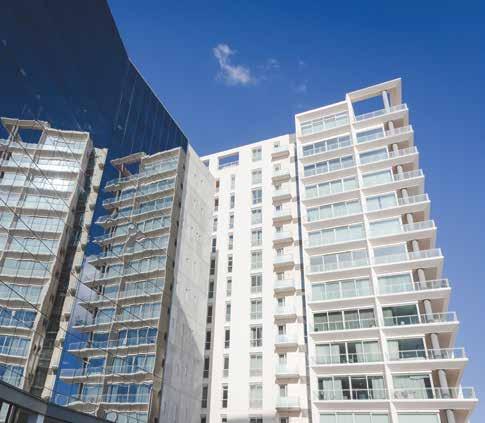
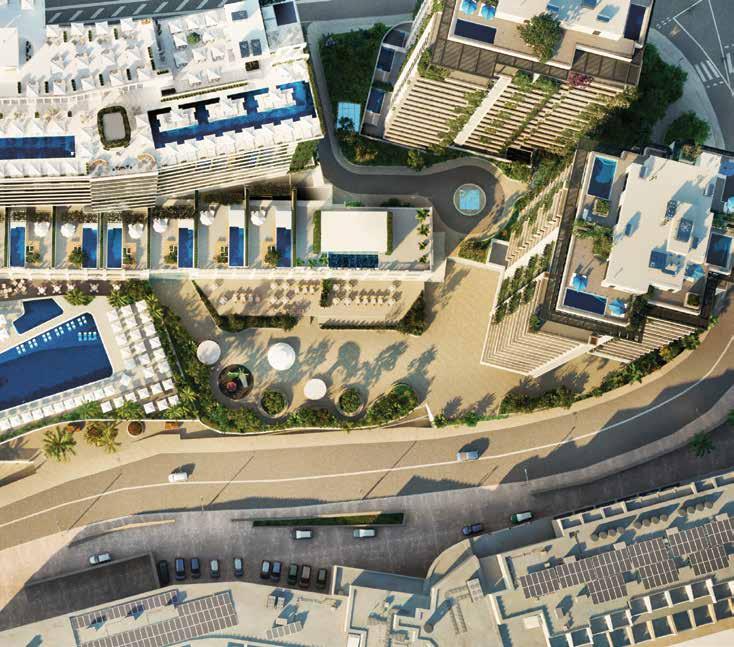
Some of Malta’s most prestigious addresses are found in the Special Designated Areas (SDAs) dotted around the country. Conceived, designed and constructed to the highest standards, they provide a superior standard of living and top-tier security in beautiful surroundings, featuring stylish finishes, landscaped gardens, beautiful communal areas, and world-class amenities. Importantly, there are no limits or prior authorisation requirements for citizens of any country to purchase any number of properties in SDAs, making them particularly attractive to non-EU nationals. Additionally, owners of SDA properties can rent them out without restrictions, enabling them to generate cash flow from their investment.
As the most cosmopolitan region in Malta, the North Harbour area hosts several SDAs. In St Julian’s, these include Portomaso, with its yacht marina and casino, Mercury Towers – Malta’s tallest building, designed by the renowned architect Zaha Hadid – and Pendergardens, offering a mix of apartments and villas. The most recent SDA to join the list is The ORA Residences, consisting of two residential towers
The ORA Residences
overlooking St George’s Bay. A short distance away, in Sliema, one can find Tigné Point and the Fort Cambridge Zone, an area with high-end residences, offices and retail outlets that has become one of Malta’s top shopping destinations.
For those looking to escape the hustle and bustle of Malta’s commercial hub, the SDAs in the north may be more to their taste. Tas-Sellum Residence, in Mellieħa, is conveniently located next to Malta’s largest sandy beach, but residents there can beat the summer crowds by using one of the complex’s three large swimming pools. If privacy is a priority, Madliena Village, a gated community nestled between rolling hills with stunning panoramic views, may be just what you are looking for. Meanwhile, one of Malta’s newest SDAs, still under development, is Verdala Terraces, centrally located in Rabat, just a stone’s throw from the old capital of Mdina.
For those who prefer their exclusive surroundings to be steeped in history, St Angelo Mansions, in Vittoriosa, offers the ideal setting. Situated in the heart of the Grand Harbour against the backdrop of the iconic Fort St Angelo, the area is also convenient for boat owners, with a nearby yacht marina providing superyacht amenities.
In Gozo, Fort Chambray is a unique development built inside a historic fort, where residents can walk along the ramparts while watching the sun set into the Mediterranean Sea, making it a romantic getaway like no other.
There are many more SDAs besides, each with a particular flavour, all combining Maltese charm with international trends. Whether used as a primary or seasonal residence, or held as an investment property, SDA real estate should be on every prospective property buyer’s radar.
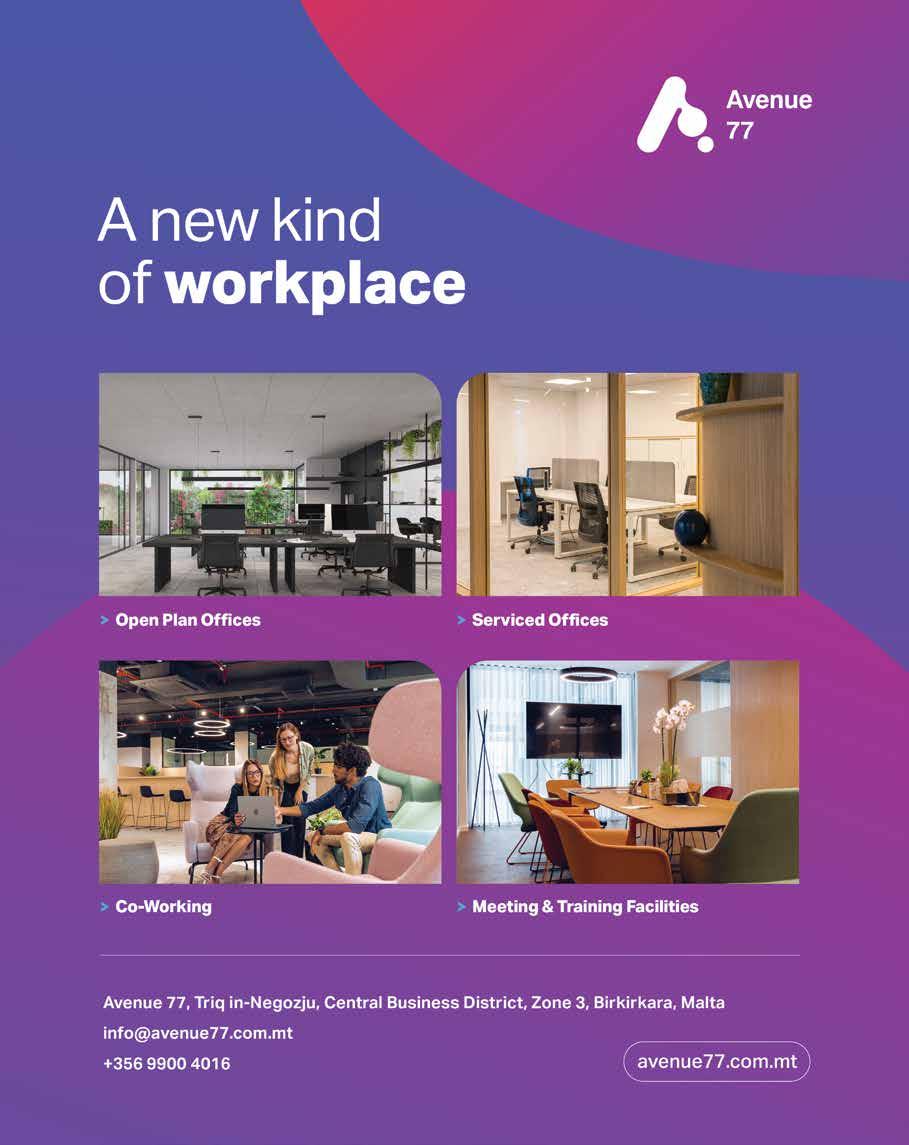
After racking up over a decade of experience with two of Malta’s largest real estate agencies, Henry Zammit co-founded The Elite, one of the country’s newest players in the property market. He now leads the company as CEO, with a mission to elevate the real estate experience to new heights.
What are the particular elements that make Malta an attractive place to buy real estate, for foreign investors?
There are several key factors at play. First, its strategic location in the Mediterranean offers a blend of European and Mediterranean lifestyles, with excellent connectivity to major European cities. The country enjoys a stable political climate, a robust legal framework and a strong economy with consistent GDP growth. Additionally, Malta’s favourable tax regime, which includes no property taxes and attractive residency programmes, further enhances its appeal. The island’s rich history, cultural diversity and beautiful natural landscapes add to its desirability as both a lifestyle destination and a sound investment opportunity.
Special Designated Areas are popular among those looking for an investment property and store of value – but how has such investment performed, in reality?
Investments in Special Designated Areas (SDAs) in Malta have consistently performed well, demonstrating steady appreciation in property values. These areas, which allow non-residents to purchase multiple properties with the same rights as locals, have seen consistent demand due to their high standards of development, prime locations, and comprehensive amenities. Historically, even during periods of broader market volatility, SDAs
have shown resilience, with strong rental yields and capital growth, driven by both local and international demand.
Malta’s property market has shown a degree of insulation from global and regional real estate fluctuations. In your opinion, why is this the case? And do you expect it to continue in the medium term?
This can be attributed to several factors, including the island’s limited land availability, which creates a natural scarcity that supports property prices. Additionally, the steady inflow of foreign professionals and expatriates, coupled with strong local demand, sustains the market. Malta’s economy is also considerably diversified and has been less exposed to the shocks that have affected other regional economies.
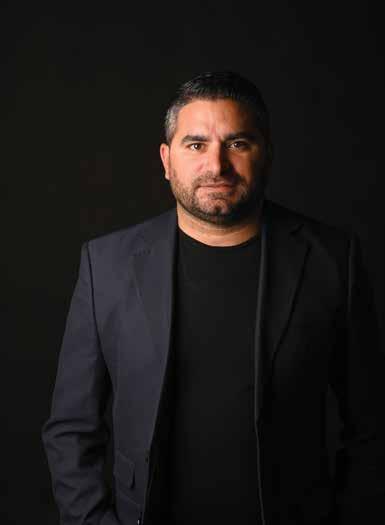
Looking ahead to the medium term, I expect this trend of relative independence to continue, provided the country maintains its economic stability and continues to attract international business and investment.
Malta’s property market is not quite as red-hot as it had been until recently. What is your prognosis for the coming years?
Malta’s market has shown resilience and strength, making it a promising option for those looking to diversify their portfolio with a stable and appreciating asset.
While there may be signs of a deceleration in the rate of price increases, this does not necessarily indicate a downturn. Instead, it could suggest a normalisation following years of rapid growth. My prognosis for the coming years is cautiously optimistic. I anticipate a period of stabilisation, where the market continues to grow but at a more sustainable pace. The fundamentals of Malta’s real estate market remain strong, with ongoing demand, limited supply and the appeal of Malta as a destination all contributing to its resilience.
If you had to give foreign investors looking at Malta’s real estate a word of advice, what would it be?
Focus on long-term value and quality. Malta offers a unique opportunity, but like any investment, it’s essential to do thorough research. I would recommend targeting properties in wellestablished areas, particularly SDAs, Valletta and the Three Cities, which have shown consistent performance. Additionally, consider the potential for rental income, as the demand for rental properties remains strong. Working with a knowledgeable local agent can also provide valuable insights and help navigate the market effectively. Malta’s market has shown resilience and strength, making it a promising option for those looking to diversify their portfolio with a stable and appreciating asset.
Justin Camilleri has been working in Malta’s real estate sector for over 10 years. During that time, he established Real Agents, a boutique property consultancy firm allowing its experienced agents the freedom to do what they do best.
What are the particular elements that make Malta an attractive place to buy real estate for foreign investors?
From my experience, buyers choose Malta for many reasons, including its location, its status as an EU member state – which provides investors with access to EU markets and benefits – its English-speaking population, and its steady real estate market growth in recent years. There are also the residency and citizenship programmes, which provide foreign nationals the opportunity to live and work in Malta.
Can you identify any trends in Malta’s property market over the past year?
The main trend over the past year is the continually rising property prices due to factors such as strong demand and limited supply. With a growing population and a very strong rental market, there has been an increased demand for rental properties. This has led to higher rental prices in almost all areas.
Can you identify any specific trends or developments expected in Malta’s real estate landscape over the next five years?
Over the next five years, I expect the trend to continue shifting away from an emphasis on quantity toward a focus on quality in property developments. Buyers and investors will likely prioritise well-designed, well-located properties with high build quality over simply seeking so-called ‘bargains’. Meanwhile, stricter regulations and incentives will drive developers toward more sustainable construction practices.
We will see more eco-friendly buildings featuring energy-efficient technologies, such as solar panels, improved insulation and highquality finishes that some developers are already implementing.
I believe we will also see more green spaces and pedestrianfriendly zones incorporated into new developments. Both the Government and banks are incentivising these types of buildings.
There have been differing interpretations of Malta’s property data, with some suggesting a slowdown while others insist the market remains strong. What is your prognosis for the coming years?
Malta’s property market will likely transition from the rapid growth seen in recent years to a more balanced and steady state. Prices are expected to continue rising, but at a slower and more sustainable pace. Ongoing Government policies, such as tax incentives for first-time buyers and schemes to restore older properties, will help maintain demand, particularly for affordable and restored homes.

Can you identify any pros and cons in Malta’s real estate market that foreign investors should be aware of?
One major attraction is the high rental yields. Malta’s robust expatriate community, driven by its booming financial, IT and gaming sectors, creates steady demand for rental properties, particularly in central and northern areas. Additionally, the thriving tourism industry supports the short-term rental market, especially in popular holiday destinations.
On the downside, high entry prices are a concern. In soughtafter areas like Sliema, St Julian’s and Valletta, property prices have surged over the years. High costs may limit potential returns, especially in the luxury or high-end markets where the price-to-rent ratio can become less favourable.
Finally, there’s the risk of oversupply. Some segments of the market, particularly high-density apartments and luxury properties in prime areas, may face potential oversupply, leading to price stagnation or slower appreciation in the future.
Malta’s robust expatriate community, driven by its booming financial, IT and gaming sectors, creates steady demand for rental properties, particularly in central and northern areas.
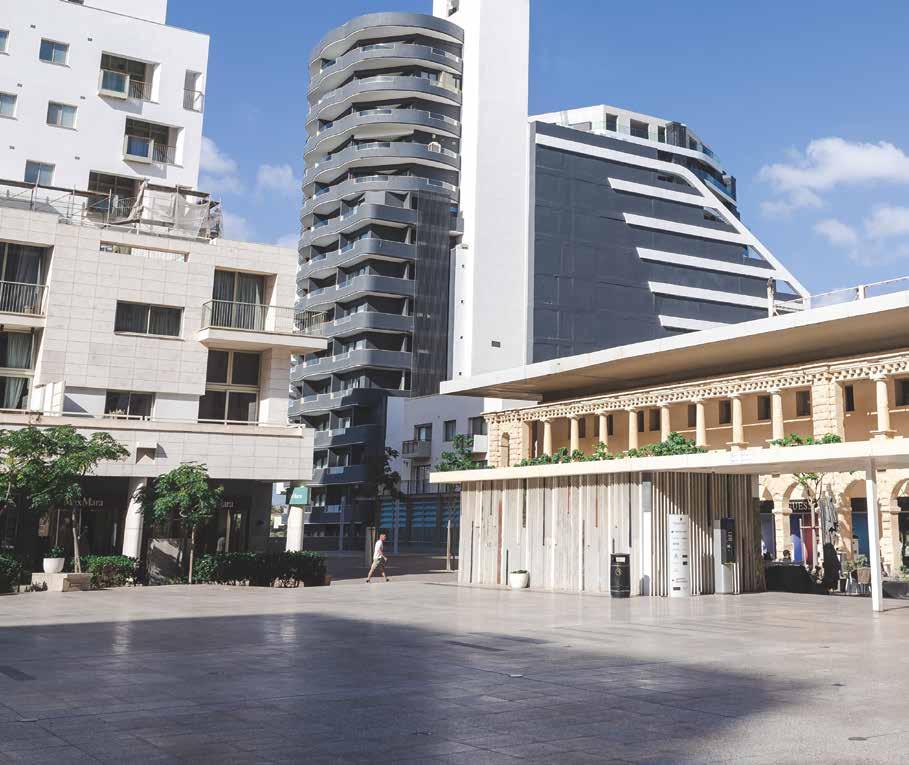
Malta’s growing economy and investment in new sectors continue to drive strong demand for commercial premises. Several major business centres and office blocks have come on the market, increasing the supply of ultra-modern office space, with more developments in the pipeline, including in underserved areas like Valletta.
However, anyone looking into investing in office space should thread carefully. While demand for new developments remains strong, this has largely come at the expense of older office blocks, exerting downward pressure on prices. With the completion of new offices currently underway, along with the persistent popularity of hybrid work arrangements, there is no guarantee that the prices for top-end developments will remain high. Therefore, while investment opportunities and market gaps certainly exist, and can be exploited by seasoned investors who know how to add value, this is one area where extensive research is essential.
That does not mean that there is no space for further development. Indeed, experienced investors confident
of developing a new concept that will address market needs will almost certainly find a demand for it, and will likely be able to charge a premium rate. Evidence for this can be seen in the first chart opposite, showing that the maximum rent charged in many localities is far higher than the average. These premium properties tend to stand out by offering more than just a workspace, providing amenities like gyms, supermarkets and restaurants, which enhance the quality of life for employees. The growing cohort of foreign workers has also contributed to this trend, as they are more likely to live close to their workplace and organise their life around it.
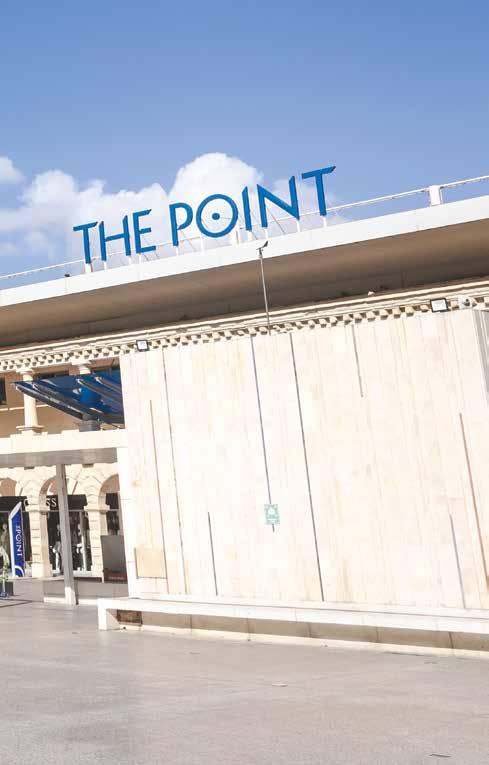
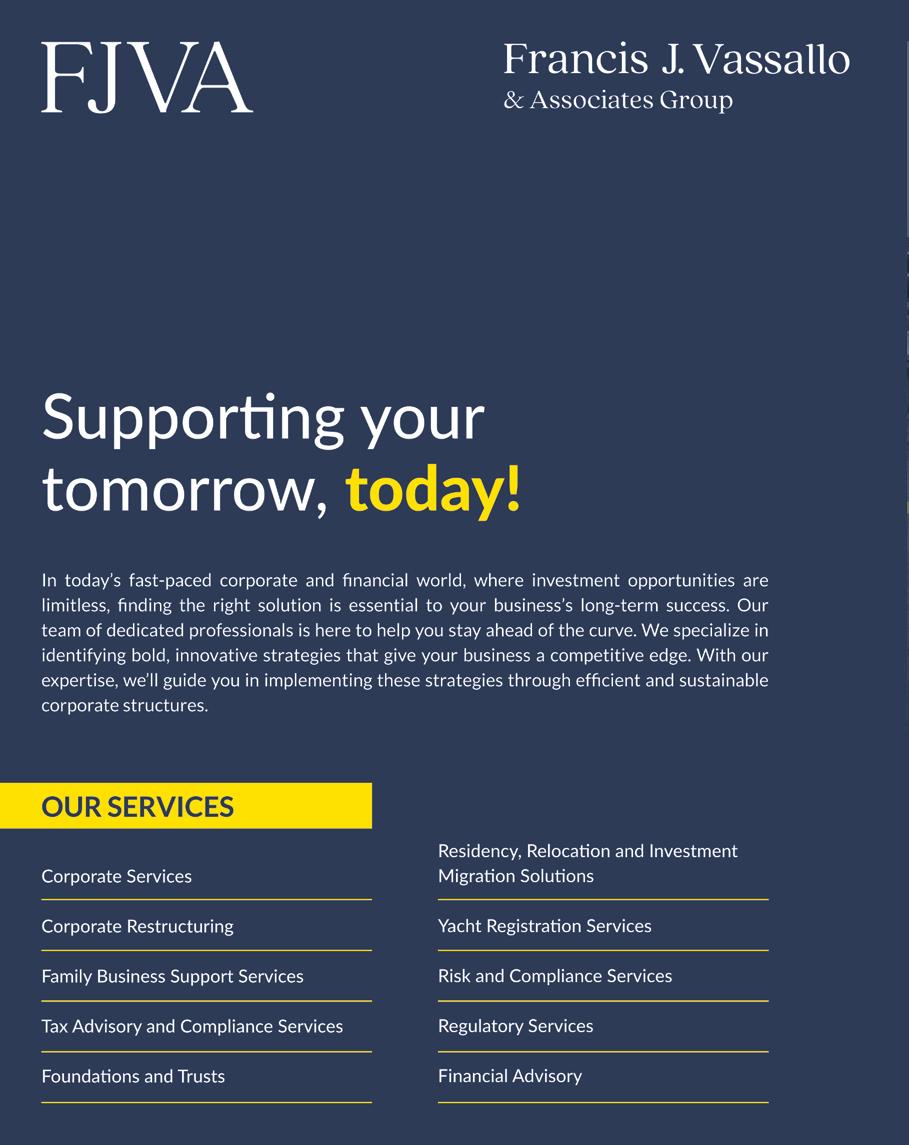
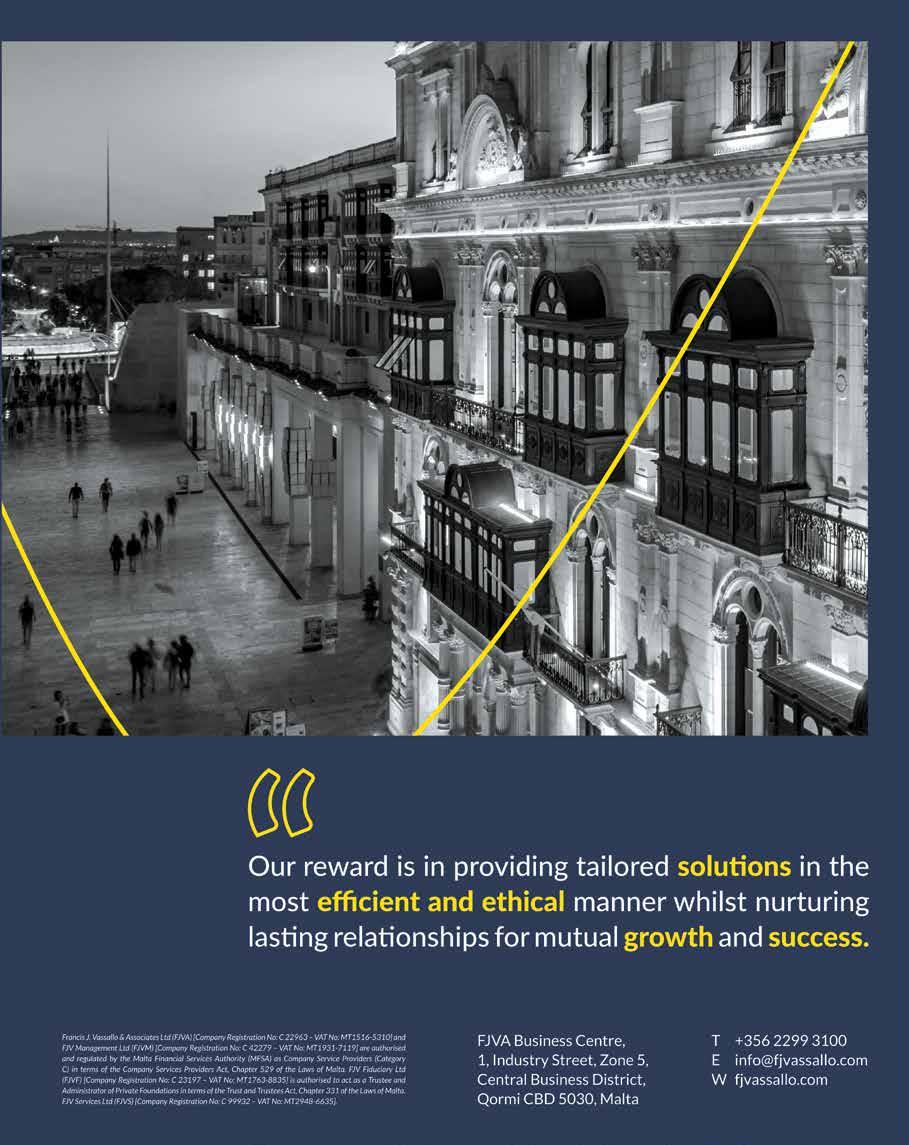

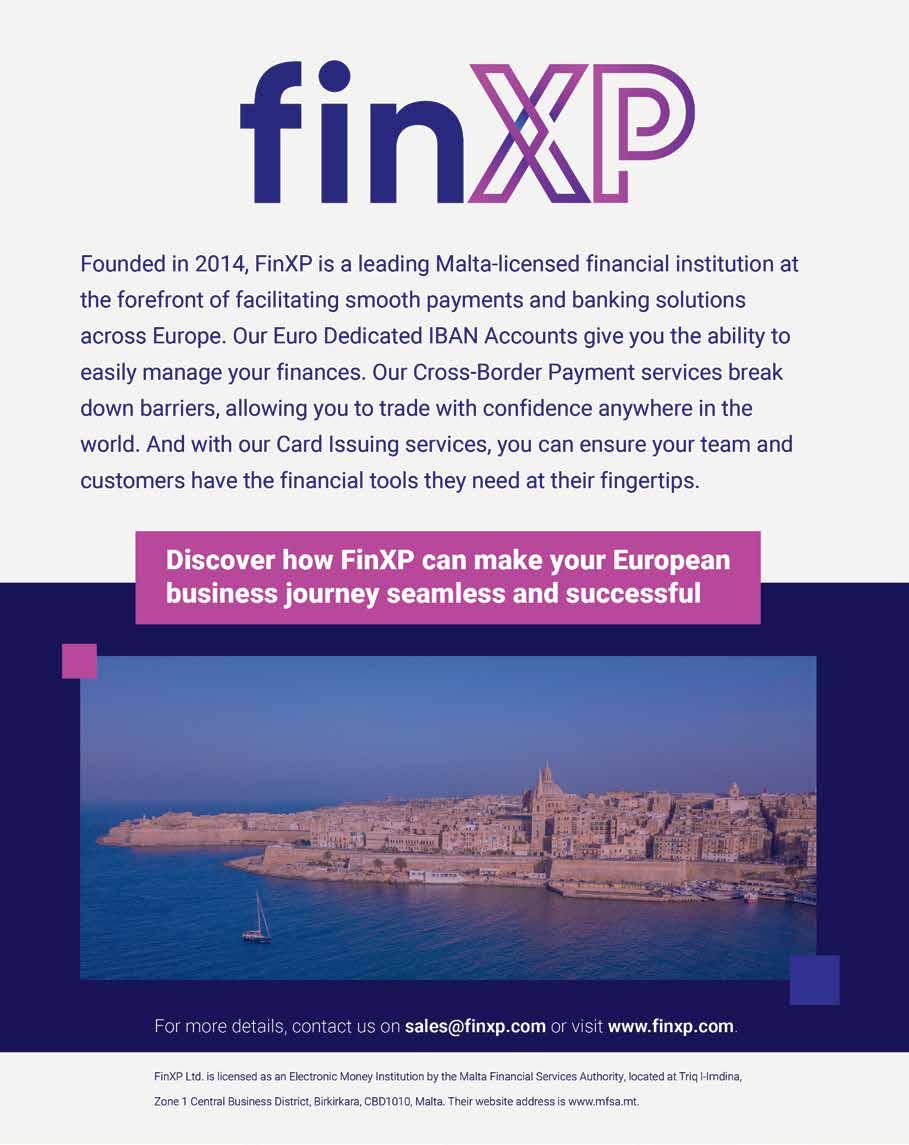
Malta’s financial services sector is one of the islands’ major economic drivers, contributing over 10 per cent to the nation’s total economic output. The sector’s growth stems from strategic liberalisation efforts in the early 1990s, which transformed Malta into a secure yet innovative financial jurisdiction. These early reforms established Malta as a cost-effective destination for wealth and asset management, with the Government and private sector collaboratively building a robust legal and regulatory framework that appeals strongly to foreign investors.
Malta offers a comprehensive array of financial services, from traditional banking and wealth management to advanced asset management and blockchain services. As a member of the European Union and the Eurozone, Malta provides investors with stability, confidence and seamless access to one of the world’s largest economies. EU membership further assures investors of stringent regulatory standards, adding an extra layer of security for wealth management. Malta’s attractive tax regime and varied legal structures make it an ideal location for asset domicile, allowing individuals and corporations to structure their wealth efficiently.
The sector’s breadth and resilience are among its key strengths, encompassing funds, wealth management, insurance, banking, fintech, and blockchain. Despite global challenges, Malta’s financial ecosystem has shown remarkable adaptability, a testament to the country’s capacity to navigate external economic and geopolitical shifts. As of 2024, the sector includes approximately 25 banks, 50 financial institutions and over 500 funds, supported by international advisory services and major audit, legal and tax firms, all of which contribute to a well-rounded financial hub.
Malta’s unique characteristics further enhance its appeal to foreign investors. Surveys highlight advantages such as widespread English use, which simplifies engagement with Government entities and local partners. Additionally, Malta’s lifestyle offerings –befitting a top tourist destination – attract high-net-worth individuals and skilled professionals seeking a balanced quality of life.
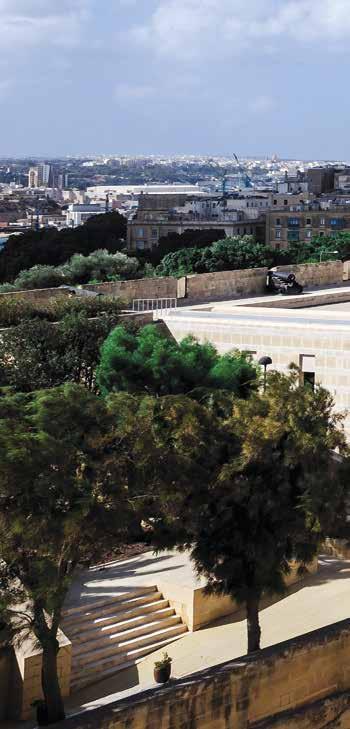
Strategically located in the Mediterranean, Malta serves as a natural hub for intercultural business dialogue, making it an attractive meeting point for European, Arab and Anglo-American business leaders. With longstanding ties to the United States, China and India, Malta plays a key role in international trade and investment discussions. Its policy of ‘active neutrality’ strengthens its diplomatic appeal, positioning Malta as a facilitator in global business dialogue.
Overall, Malta’s financial services sector has evolved into a sophisticated and resilient ecosystem. The Government’s commitment to a stable yet adaptable regulatory environment, in partnership with industry leaders, ensures Malta remains competitive among global financial hubs. With a well-established
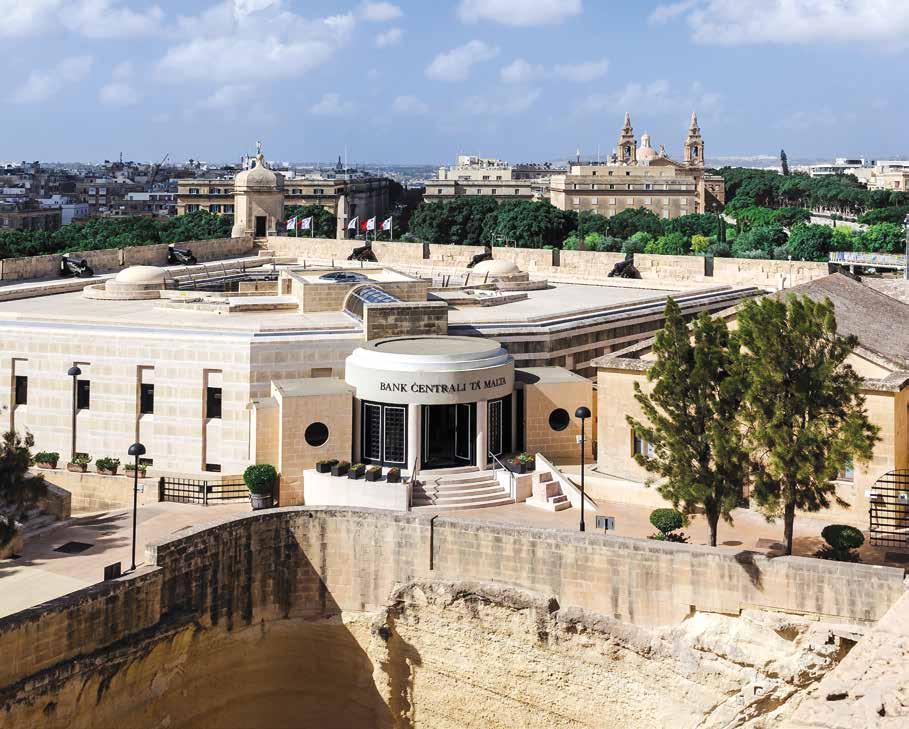
legal framework, strategic alliances and a focus on innovation, Malta’s financial industry is well-positioned to continue to attract high-value investments in the years ahead.
Malta’s reputation as a financial hub is built on its agile, industryaligned legislative framework, which swiftly adapts to the sector’s evolving needs. This flexibility has made Malta a soughtafter jurisdiction, allowing it to stand out in a competitive global market. Malta’s regulatory approach emphasises cooperation, with Government and industry stakeholders working closely to implement frameworks efficiently, marking it as a uniquely dynamic and flexible jurisdiction for a range of financial services.
This legislative adaptability has led to structures like incorporated cells – a unique European offering – being extended from insurance to other financial sectors. Malta is also one of the few jurisdictions offering both trusts and foundations, each with distinct advantages for asset management, allowing a tailored approach to diverse financial needs.
In fintech, Malta’s well-defined regulations minimise risks for financial technology firms, attracting numerous operators seeking a stable environment for innovation. Malta’s leadership in cryptocurrency regulation, including the introduction of the Virtual Financial Assets Act in 2019, anticipated standards later adopted by the EU’s Markets in Crypto-Assets (MiCA) Regulation in 2023. This proactive stance positions Malta as a forward-thinking leader in digital finance.
Malta’s small size supports a tightly-knit ecosystem where economic, bureaucratic and political stakeholders maintain open dialogue. This interconnectedness fosters an efficient and effective regulatory environment. Industry consultations are frequent, and policymakers act swiftly to incorporate industry feedback, aligning Malta’s growth with current trends and future needs.
Committed to financial innovation, Malta continues to update regulatory frameworks to address new market demands. Recent consultations have focused on Notified Professional Investor Funds, insurance reforms impacting pensions, the establishment of single family offices and the inclusion of non-fungible tokens (NFTs) within Malta’s crypto regulations. These measures ensure Malta remains attractive to both established financial entities and emerging players seeking a sophisticated, forward-looking jurisdiction.
Malta’s financial sector offers a balanced environment for wealth management that appeals to global investors, combining innovation with strict regulatory oversight. While embracing flexibility, Malta upholds high compliance standards that often exceed those of other countries, providing transparency and security. The Malta Financial Services Authority (MFSA) serves as the primary regulator, collaborating closely with licensed enterprises and coordinating with law enforcement and international agencies to safeguard the sector’s integrity. An MFSA licence grants firms seamless access to the entire EU market, enhancing Malta’s appeal for financial businesses seeking efficient operations within Europe.
An added layer of protection for clients is provided by the Arbiter for Financial Services, an independent entity that mediates and investigates complaints against providers. In blockchain, the Malta Digital Innovation Authority (MDIA) further distinguishes Malta as the first country to regulate Distributed Ledger Technology (DLT) platforms and smart contracts, certifying these platforms and handling technology registrations.
Malta’s full imputation tax regime and tax refund system for corporate shareholders mean that Malta-based operations benefit from one of the lowest effective rates in Europe (seep.68). Corporate tax reform is solidly on the Government’s agenda, with promised changes intended to retain Malta’s competitive advantage and maintain a net-neutral impact on Government revenue. While a measure of uncertainty is unavoidable, investors can be assured that the jurisdiction will remain attractive in terms of taxation.
More information on the provisions relevant to financial services (current to late 2024) is provided in the following sections, but for a personalised review of how Malta’s tax regime can be of benefit to you, consulting a tax professional is advised.
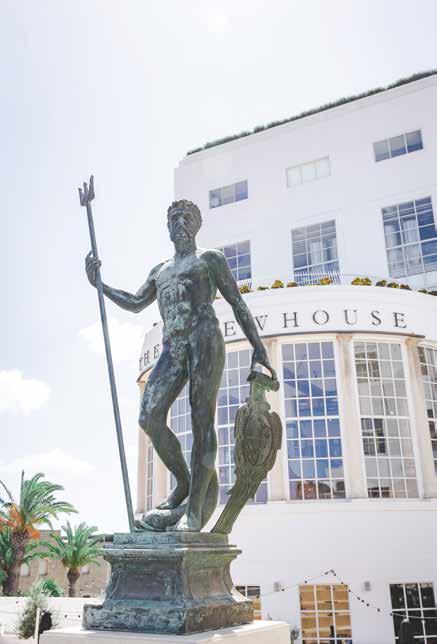
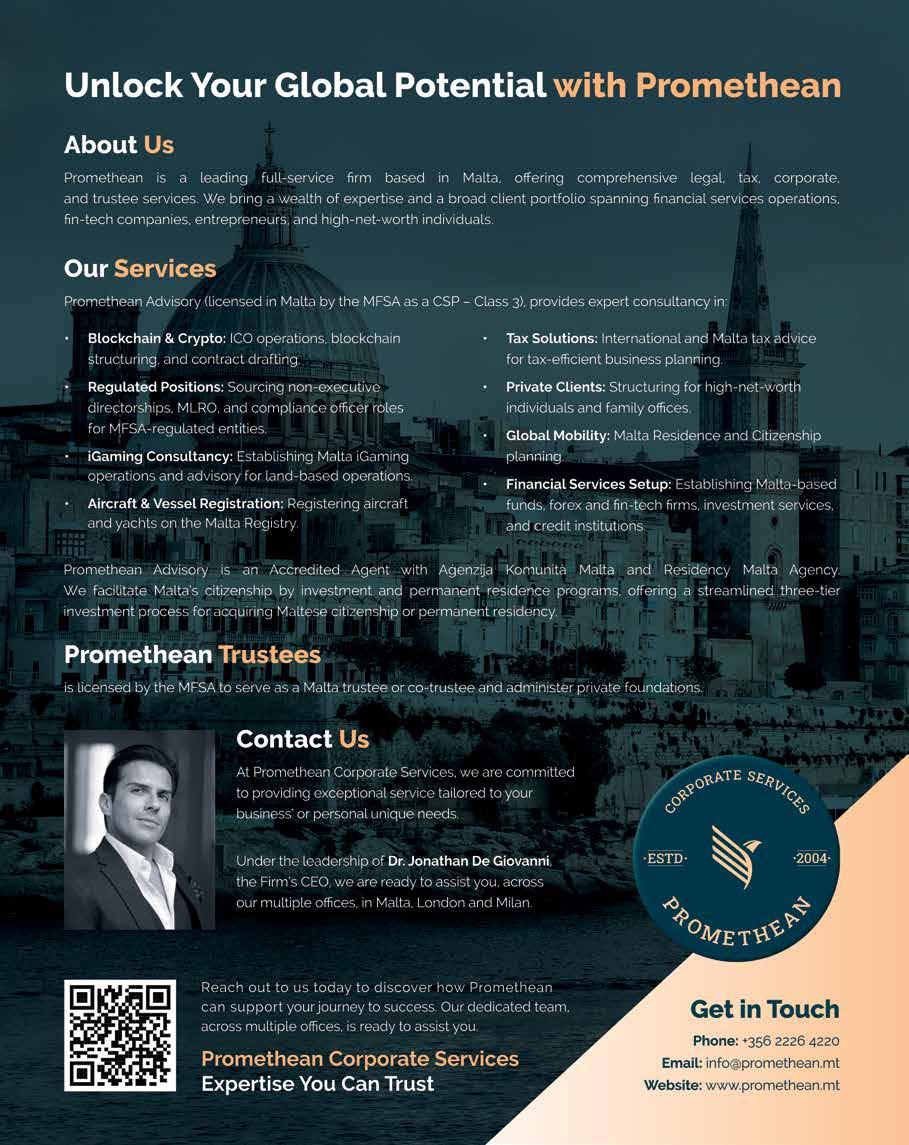
Malta has emerged as a hub for investment funds, with over 500 funds and schemes registered with the MFSA. This growth reflects Malta’s commitment to fostering a supportive and flexible environment for fund managers and administrators. By establishing in Malta, fund managers can operate within a fully regulated and evolving EU jurisdiction, gaining the advantage of being onshore while accessing a range of innovative, cost-effective investment vehicles and services.
Malta’s regulatory environment is a major draw for investment funds, known for balancing rigour with accessibility. The regulator processes licence applications with a time-sensitive, efficient approach, enabling funds, including those re-domiciling from other financial centres, to easily navigate the regulatory framework. Additionally, funds domiciled in Malta benefit from smooth access to European markets – a significant advantage for investors looking to operate within the EU.
Unlike some jurisdictions that mandate local fund administrators, Malta allows funds to choose their preferred administrative arrangements, enhancing its flexibility. Nearly 90 per cent of registered funds are locally administered, with over half managed by Malta-based third parties. This set-up provides a trusted support network for funds while allowing others the option to self-manage; around a third of Malta-registered funds follow this self-management model. This adaptable approach is further strengthened by accommodating diverse investment strategies and fund structures, enabling promoters to select the set-up that best meets their investment goals.
As at the end of 2024, Malta-registered funds held almost €20 billion in assets under management. A significant shift in fund structure preferences has also been observed, with a number of funds converting their licence from PIFs to NAIFs (seep.149)
Malta’s local industry provides an exhaustive range of services to funds domiciled across the EU and further afield, enabling foreign operators to benefit from the wealth of international expertise that asset management and servicing providers have amassed over recent decades. Whether it involves full outsourcing of fund administration, compliance, regulatory reporting, or back and middle office services, Maltese firms provide the cost-competitive solutions required for efficient fund management.
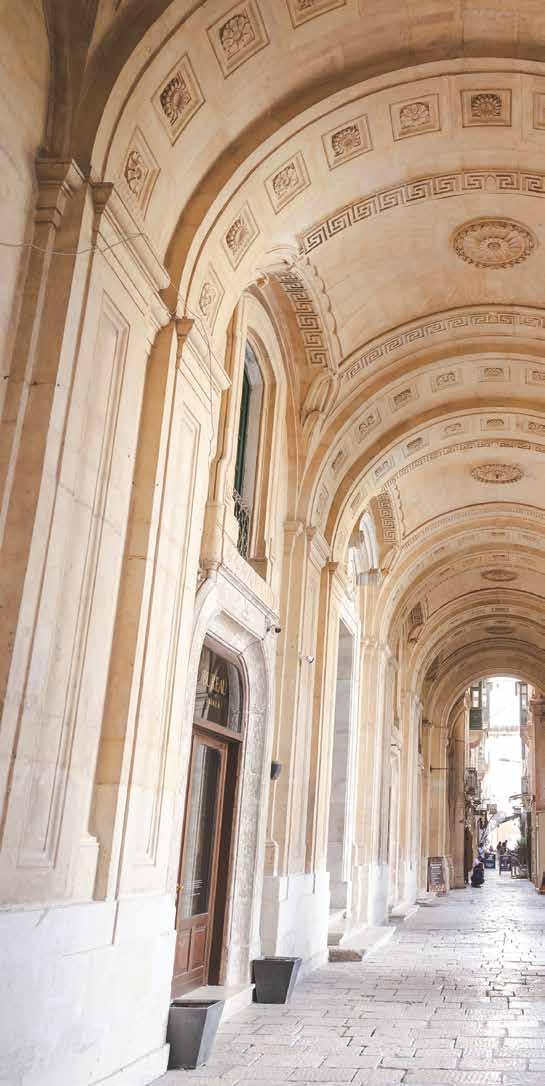

Source:
In Malta, vehicles for a Collective Investment Scheme (CIS) can take the form of investment companies, limited partnerships, unit trusts, contractual funds, and incorporated cell companies. These legal structures allow fund promoters to leverage their specific characteristics to craft schemes perfectly suited to different investment strategies.
Malta offers two main corporate fund structures: investment companies with variable share capital (SICAVs) and investment companies with fixed share capital (INVCOs). SICAVs, modelled on Luxembourg structures of the same name, are highly flexible, allowing for a broad range of investment strategies across various asset types, including securities and both movable and immovable property. INVCOs, on the other hand, are more restricted, focusing primarily on securities and bound by specific requirements regarding holdings, profit distribution and income retention.
Both SICAVs and INVCOs can be established as umbrella or multi-fund companies, where share capital is divided into distinct sub-funds. Each sub-fund’s assets and liabilities are ring-fenced, ensuring that returns depend solely on its individual performance, independent of other sub-funds within the same umbrella.
It is also possible to set up companies with multiple share classes, enabling tailored structures that support diverse investment objectives and business models. For example, a fund can have one sub-fund following a high-risk strategy with two classes having different fee structures, and another sub-fund following a low-risk strategy with various classes having their net asset values calculated with different frequencies. The flexibility afforded is such that different sub-funds could have different managers following very different strategies.
Limited partnerships, or partnerships en commandite, are popular among private equity and venture capital investors in Malta. These partnerships limit the liability of limited partners to their initial investment, while a limited liability company often acts as the general partner to strengthen the fund’s local substance. They offer flexibility similar to that of investment companies, allowing for variable or fixed share capital, different classes of shares, fractional shares, and even sub-funds denominated in various currencies. Each sub-fund’s assets and liabilities can be segregated from others within the partnership.
The tax treatment of these partnerships aligns with that of companies (see p. 68), and if capital is not divided into shares, the
partnership is tax-transparent. In such cases, income and gains are taxed based on the partners’ tax status and residence, meaning non-resident, non-domiciled partners only pay tax on Maltesesourced income. While this transparency may be beneficial, the more attractive features of Malta’s tax system, like the refund mechanism, apply primarily to companies. Consequently, limited partnerships may elect to be treated as companies, enabling partners to benefit from Malta’s favourable tax regime.
Trusts are another common legal vehicle for collective investment schemes and are subject to fewer restrictions than companies. They can also be structured to be tax-transparent, which may be particularly attractive in certain cases, such as when underlying assets held by the unit trust are subject to high withholding taxes in the country of issue.
ManoelIslandPhoto:InigoTaylor
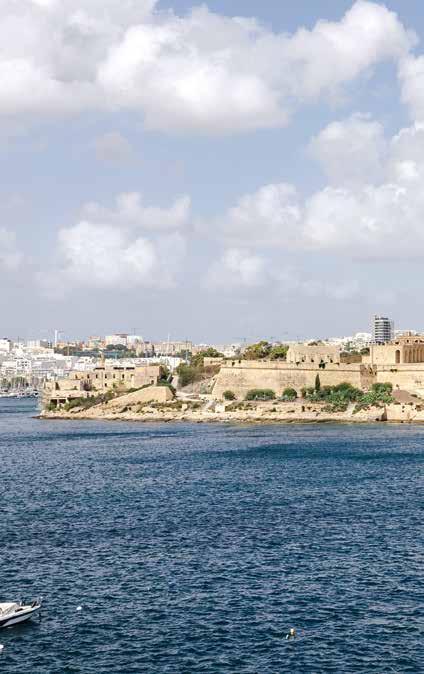
Common contractual funds, or mutual funds, do not have a separate legal personality and therefore require a custodian in whose name the assets are to be held. Maltese mutual funds typically establish a company to act as a special investment vehicle, holding assets on behalf of the fund and shielding these assets from creditors’ claims.
Incorporated Cell Companies (ICCs) are an innovative legal structure with numerous advantages for fund promoters. First implemented in the insurance sector, this structure proved flexible and robust enough to be extended to the fund sector. ICCs materially expand the range of uses by enhancing the segregation of assets between each cell. For example, a SICAV structured as an ICC may designate each sub-fund as an Incorporated Cell (IC), granting each one separate legal and juridical personality, thus enabling it to transact in its own name.
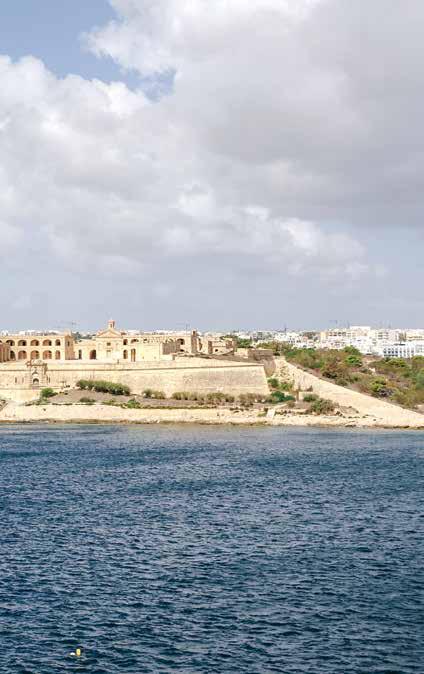
Another type of ICC that has proven particularly popular among small managers and startup funds is the Recognised Incorporated Cell Company (RICC). This is a limited liability company providing purely administrative services to incorporated cells within the cluster. The RICC can therefore accommodate a platform model comprising an ICC providing, for example, contractual and startup support to any number of ICs. This relationship does not mean that ICs are subsidiaries of the RICC; each IC, having separate legal personality, needs to be duly licensed as a collective investment scheme.
The legal structures described above can be used to set up any of the several Collective Investment Schemes (CIS), or funds, provided for in Maltese legislation. The resulting array of options can be tailored to serve the needs of any kind of investor. Although regulated to different degrees, all funds are monitored by the Malta Financial Services Authority.
The EU’s UCITS Directive allows qualified funds to be marketed freely across Europe under a unified regulatory framework, with around 20 per cent of Malta-registered funds falling under the UCITS framework and benefitting from its well-regarded protections for investors. The UCITS model is internationally respected, often chosen by non-EU fund managers seeking access to the bloc’s capital markets.
Malta-based UCITS enjoy significant tax advantages: they are exempt from Maltese income tax if more than 85 per cent of their underlying assets are held abroad, face no tax on net asset value or capital gains for non-Maltese investors and incur no withholding tax on dividends or stamp duty on unit transfers. This tax efficiency adds to their appeal as an investment vehicle.
Alternative Investment Funds (AIFs) in Malta encompass a range of strategies, including venture capital, hedge funds, private equity, and real estate, and can apply to all asset classes. AIFs are subject to EU regulations under the Alternative Investment Fund Manager Directive (AIFMD), which covers aspects such as leverage, risk profile and liquidity restrictions, and provides EU passporting rights. This enables AIFs to be managed and marketed across Europe directly or through a local branch. For retail-focused AIFs (RAIFs), the AIFMD imposes additional investment and borrowing guidelines.
Malta’s Notified AIF (NAIF) structure is tailored for speed, allowing market entry in as little as 10 days. Although NAIF managers remain bound by AIFMD regulations, they assume full responsibility for due diligence, bypassing MFSA authorisation or supervision. This makes NAIFs exclusive to professional or qualifying investors. Since 2019, NAIFs have gained considerable traction, with the number of registered NAIFs nearly doubling.
Venture capital, hedge funds, private equity funds, real estate funds, and any other investment strategies across all asset classes can be structured as AIFs. They are subject to restrictions on leverage limits, fund risk profiles and portfolio liquidity, as laid down in the EU’s AIFMD. Like UCITS, AIFs benefit from passporting rights, allowing them to be managed and marketed across the EU, either directly or via a local branch. When targeted towards retail investors (Retail AIFs or RAIFs), the AIFMD imposes additional investment and borrowing provisions.
In Malta, the Professional Investor Fund (PIF) licence is widely utilised, accounting for around 40 per cent of all funds registered in the country. Known for its adaptability, the PIF is ideal for wealth managers handling private clients, as it operates under a lighter regulatory framework with no leverage or investment restrictions and no diversification requirements. This flexibility makes it suitable for investments in complex or non-traditional assets like private equity, derivatives, real estate, traded endowment plans, and virtual
currencies. However, PIFs fall outside EU frameworks like UCITS and AIFMD, meaning they lack passporting rights and are instead governed by national private placement regimes across EU states.
With PIFs facing increased competition from NAIFs in recent years, the MFSA has responded by launching the Notified PIF (NPIF) in 2023. Mirroring the NAIF’s streamlined process, the NPIF allows for set-up within 10 working days. As a non-retail scheme, NPIFs only require notification to the regulator rather than full authorisation, easing entry for fund managers while maintaining regulatory standards.
Malta-based collective investment schemes benefit from a tax regime designed to minimise exposure. Key features include no tax on net asset value, no stamp duty or VAT on share issues or transfers by licensed funds, and a VAT exemption on fund management and administration services. Non-resident investors are also exempt from tax on dividends and capital gains from fund unit transfers. For non-tax-transparent structures, profits are subject to a 35 per cent corporate tax, but investors can reduce their liability to as low as 5 per cent using Malta’s full imputation and tax refund systems. Taken together with the country’s extensive network of double taxation agreements and its unilateral tax relief system, Malta emerges as a uniquely enticing domicile for funds of all kinds.
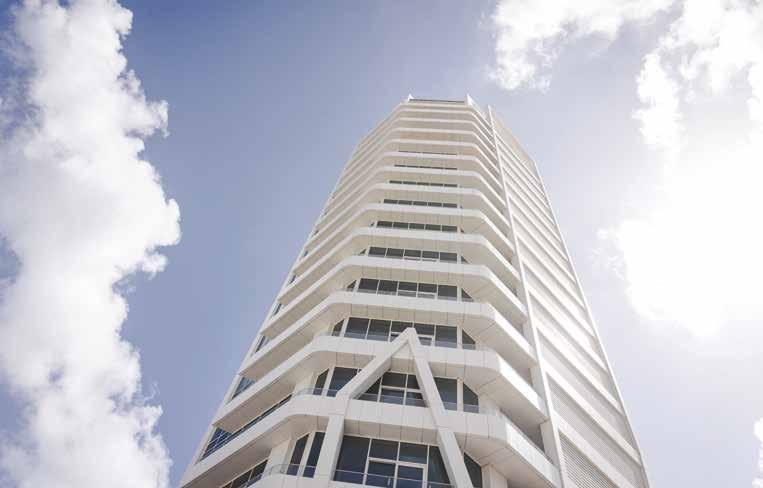
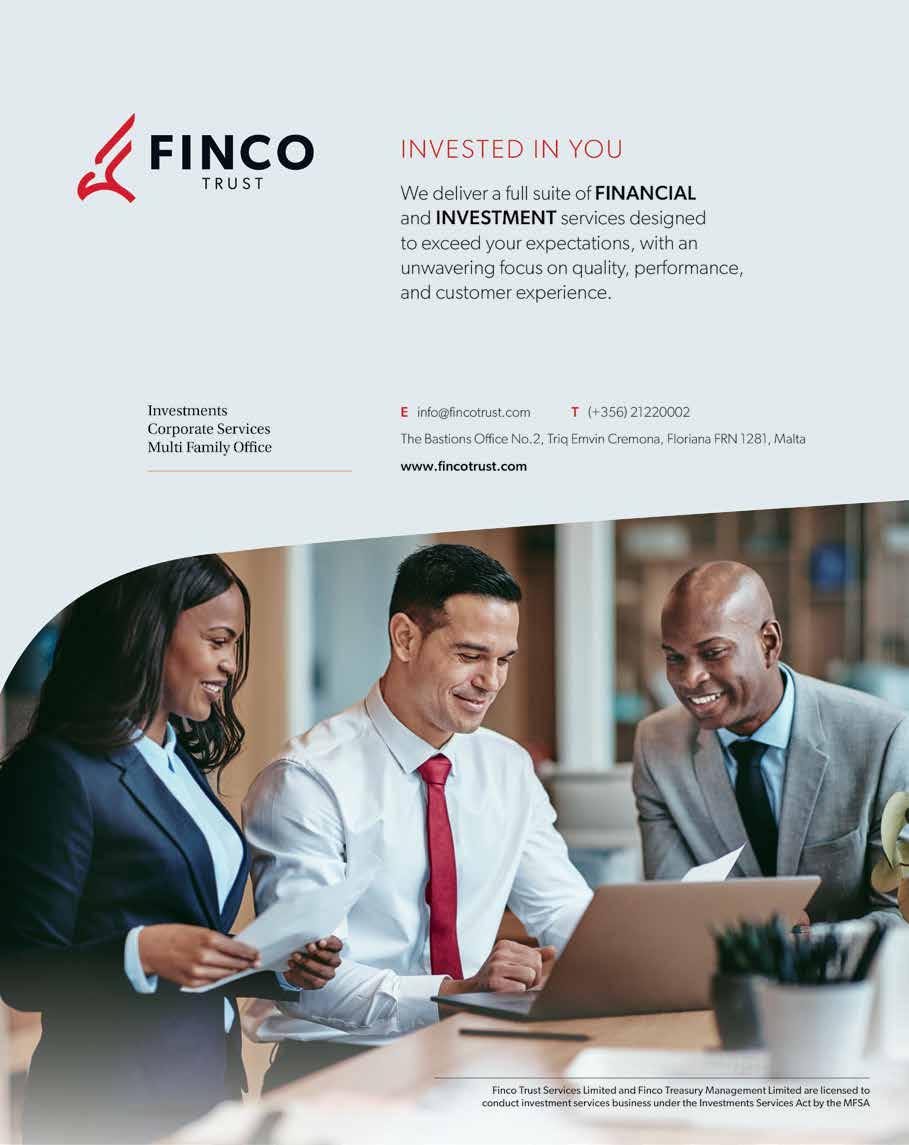
Graziella Grech joined FinanceMalta in 2023 as Chief Operations Officer. In addition to promoting Malta as an international financial services centre, she strives to strengthen relationships with the Foundation’s members to enhance collaboration and add value. She has over 27 years of experience in the financial services industry, primarily in retail and business banking, investments and insurance, back-office operations, complaints handling, and project management.
What are some common misconceptions that prospective investors in financial services have about Malta?
During tradeshows and conferences, I frequently encounter misconceptions about Malta that need clarification. One common assumption is that Malta’s small geographical size limits its business potential. In reality, Malta boasts a thriving financial services sector, offering a diverse range of opportunities in banking, investment funds and fintech. Another misconception is that Malta lacks innovation; however, Malta is recognised for its leadership in fintech and blockchain regulation, attracting a growing number of tech companies and startups.
The greylisting of Malta by the Financial Action Task Force (FATF) in 2021 is often mentioned as a concern. While this raised questions about the country’s financial practices, it’s important to highlight that Malta successfully addressed these issues and was removed from the grey list in record time. This underscores Malta’s commitment to regulatory compliance and its proactive approach to strengthening its financial framework.
There remains considerable uncertainty about how Malta will meet its commitment to revise its tax regime. How would you respond to a prospective investor concerned about the lack of clarity?
I understand that uncertainty surrounding Malta’s tax regime can be a concern for prospective investors. The Maltese Government is actively engaged in tax reforms aimed at aligning with international standards while maintaining competitiveness. Recent statements by the Finance Ministry have outlined plans regarding the implementation of Pillar Two. As of June 2024, 45 countries have begun implementing Pillar Two’s model rules, and EU member states are in the process of aligning their laws accordingly. Malta, with fewer than 12 in-scope multinational groups, has opted to defer implementing these rules for six years. This decision allows for a measured approach to reform, ensuring that Malta remains competitive while working on measures compliant with EU State Aid rules.
Despite the ongoing discussions of reform, Malta continues to offer a competitive tax regime. The existing structure remains advantageous for investors, and the Government’s aim is to ensure that any future changes enhance, rather than detract from, Malta’s appeal as a business hub.

What kind of assistance from public and private entities can prospective investors in Malta expect to find?
Prospective investors in Malta can expect substantial support from both public and private entities. Investment promotion agencies such as FinanceMalta and Malta Enterprise provide crucial information on regulations, incentives and funding opportunities. The Government offers various financial incentives, including grants and tax credits, to help reduce initial costs and enhance investment returns.
Legal and consultancy firms assist investors in navigating Malta’s regulatory framework, including licensing and compliance issues. Additionally, sector-specific agencies, like the Malta Financial Services Authority, offer tailored support for various industries. Investors can also benefit from networking opportunities at conferences and trade shows, facilitating connections with local businesses and potential partners.
Access to a skilled workforce is available through local educational institutions and workforce development initiatives. Overall, these resources are designed to help investors navigate the Maltese market effectively and maximise their chances of success.
The existing tax structure remains advantageous for investors, and the Government’s aim is to ensure that any future changes enhance, rather than detract from, Malta’s appeal as a business hub.
Finco is a leading Maltese financial services firm offering wealth management, investment advisory and corporate finance services. Established over 35 years ago, the company has built a strong reputation for delivering tailored solutions to both individual and institutional clients. Chris Casapinta, recently appointed as Executive Chairman, brings extensive experience from his tenure in international banking and finance with PwC and Alter Domus.
Can you summarise Malta’s value proposition as a wealth management jurisdiction?
As a well-established financial services centre, Malta adds significant value to international investors. Over the years, the jurisdiction has built a robust regulatory framework that offers sufficient flexibility to both professionals and investors, fostering innovation and supporting speed to market. Malta has also seen growth in firms offering different financial services across sectors including pensions, insurance, fund management, and wealth management. More recently, there has been a notable influx of electronic money institutions and payment service providers. This growth and diversification within the financial services industry is important as it results in the jurisdiction appealing to a broad range of investors with varying needs.
Additionally, various fiscal incentives attract both high-net-worth individuals (HNWIs) and international financial services operators. The favourable fiscal environment has enticed a growing number of individuals and corporates to establish themselves here in Malta.

Malta also offers an excellent lifestyle within a safe and secure environment.
Is there a particular profile of investor, fund or client that may find Malta particularly attractive?
From my experience in the industry, I always strongly believed that Malta is especially attractive to individual investors and HNWIs. Over the years, the country has developed various incentives to attract private individuals. Most people who have decided to do so enjoy the lifestyle and tend to comment positively about life in Malta.
The combination of an attractive regulatory framework, a positive business environment and a favourable lifestyle appeals to individuals who want to operate in a well-regulated environment that also offers flexibility for smaller businesses. In fact, in recent years Malta has witnessed a number of international family offices setting up shop here.
Malta has developed novel structures like NAIFs, now also NPIFs, and cell companies. How important is this type of innovation in the financial services sector?
Over the years Malta has developed various incentives to attract private individuals to reside in Malta. Most people who have decided to do so enjoy the lifestyle and tend to comment positively about life in Malta.
The fast-paced and challenging financial services environment requires significant innovation in the way investment vehicles are structured. It is important that the local industry continues to innovate to meet investors’ expectations in a landscape that is evolving at various levels be it regulatory, fiscal and the markets in general. For a jurisdiction to remain relevant, ongoing innovation is essential.
Can you tell us a bit more about the way trusts and foundations operate in Malta?
Trust and foundations are typically managed and administered by licensed and regulated Trustees. Although their organisational structure can be flexible, being managed by a regulated entity ensures a certain level of governance and risk management. The regulatory framework allows clients to set up a private trust company with a remit that is typically restricted for a family or a limited group of people.
Clients may choose to use a trust or foundation for various reasons. Private clients would typically use these structures for estate and succession planning. Trusts are also used for other purposes, such as employee benefit trusts and security trusts.
Malta’s sophisticated financial services industry, along with EU membership and the euro as its currency, make it a prime choice for highnet-worth individuals and families seeking effective, cost-efficient wealth management. Its adaptable, customisable services are supported by a network of reliable professionals known for preserving generational wealth and offering highly personalised solutions. Malta has also gained a reputation as an ideal jurisdiction for outsourcing family office and wealth management back-office functions, reducing costs and enhancing profitability for firms increasingly shifting operations to the islands.
Malta is one of the few jurisdictions where both trusts and foundations can be established, offering tools to safeguard assets, manage risk, and facilitate estate planning, succession and tax minimisation. These structures also allow for securitisation, corporate financing, creditor protection, and philanthropic endeavours. Trusts typically appeal to those from common law backgrounds, while foundations often attract clients familiar with civil law systems.
The framework allows for a high degree of pliability. For example, set-ups may involve the creation of a limited liability company to act as the trustee of the trust holding the assets,

with the board of directors often comprising family members and their trusted advisors. These Private Trust Companies (PTCs) thus allow family members to have a say in the administration of a trust. As with any wealth and estate planning, the starting point is to engage the right professionals to understand the rules and then establish how they may be used to benefit your interests.
Malta takes a bold approach where it counts and remains cautious where it matters: trustees and investment services providers alike need to be licensed with the MFSA, giving clients and their families the assurance that their assets are being managed by reputable operators. The jurisdiction’s popularity

has attracted major international players who now compete with long-standing local operators, giving clients a greater breadth of products and services to choose from.
Malta’s financial services landscape, supported by both local operators and major foreign firms, offers a wide range of products tailored to high-net-worth, corporate and institutional clients. The Professional Investor Fund (PIF) serves as an efficient entry point for affluent investors, with some firms launching platforms dedicated to family offices. Malta’s financial hub also fosters synergies with emerging tech sectors present locally and abroad, enabling innovative investment options like crypto-tokens (seep. 161) and facilitating exploration in areas like the Internet of Things (IoT) and Virtual Reality (VR).
Malta thus offers the affluent a safe, stable jurisdiction and an accessible gateway to global investment. With its variety of available structures, Malta continues to be a go-to jurisdiction for those seeking tailor-made arrangements for the management of their wealth.
Another element of Malta’s wealth management offering is its highly competitive framework for the registration of ships, such as superyachts, and aircraft. With its location as a strategic port of call, extensive VAT incentives and excellent marina and airfield infrastructure, Malta is an attractive holding jurisdiction for such assets. Turn to the relevant chapter (p.204) for more information on the country’s dedicated solutions in these areas.
High-net-worth individuals also find considerable lifestyle and fiscal benefits in joining Malta’s thriving cosmopolitan community, with several routes available to those wishing to make the country their home away from home. A full rundown of the schemes available and the attractions on offer can be found in the chapter dedicated to residency (p.92)
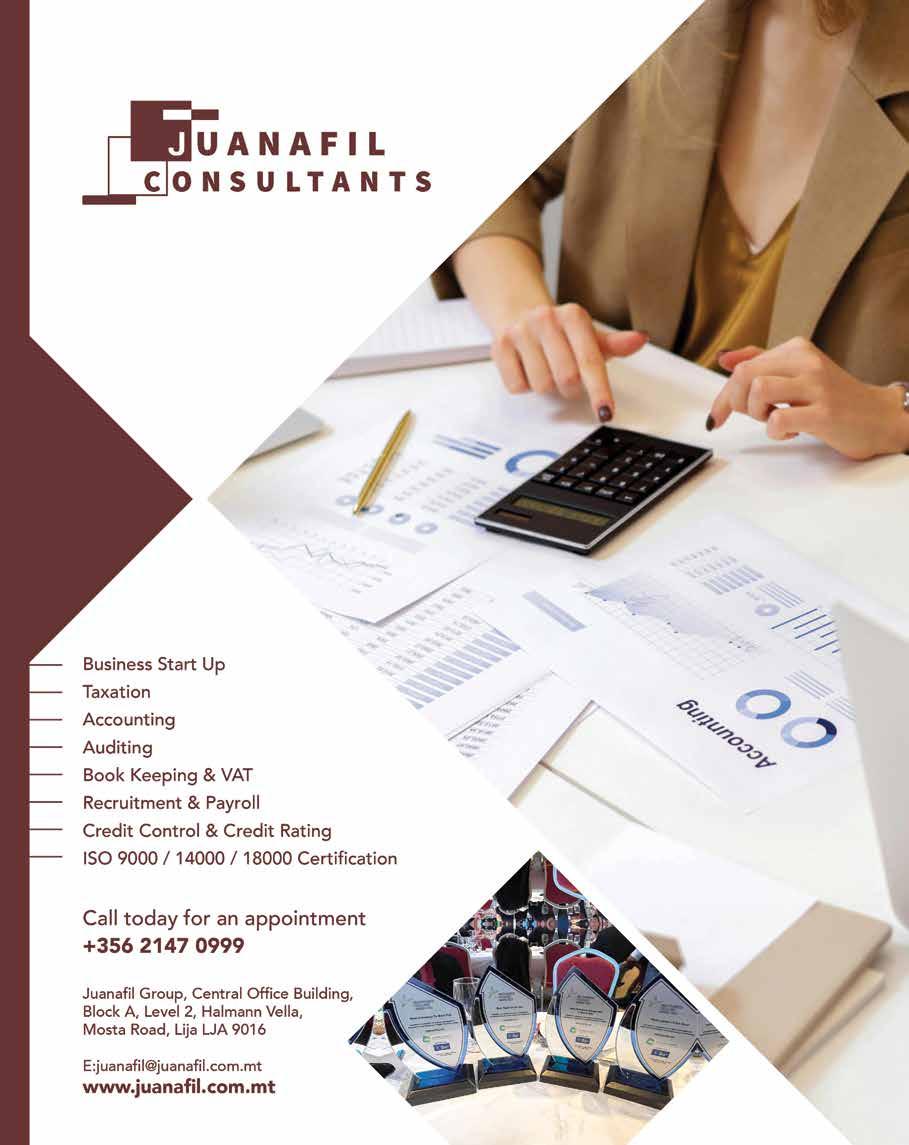
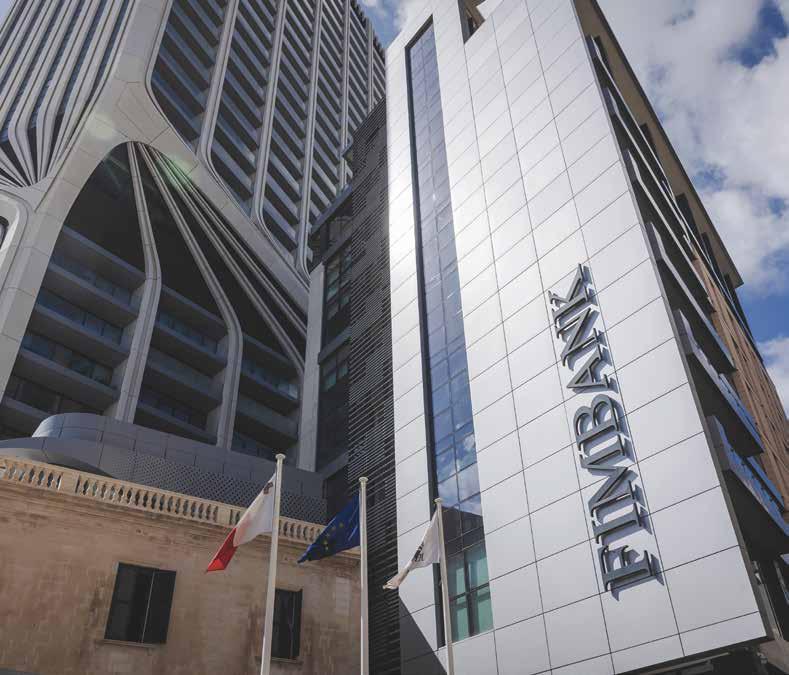
Malta’s banking sector is among the most secure and liquid in Europe, with strong capital reserves supporting its growth. The sector has transformed significantly since the turn of the century, now comprising 25 banks of varying sizes catering to the needs of a broad range of clients. The major domestically oriented banks have fuelled the country’s rapid growth, relying on their vast reserves of customer deposits to keep interest rates stable through thick and thin. The importance of this stability to Malta’s economic health cannot be overstated, with businesses and households alike benefitting from the shelter afforded to them during the European Central Bank’s repeated interest hikes in 2022 and 2023. This stability has contributed to a low rate of defaults, even in times of crisis, ensuring that Malta’s banking system sails through global headwinds unscathed.
The consumer banking market is dominated by a major player, Bank of Valletta (BOV), closely followed by HSBC, with several
smaller yet significant banks also playing a role. In late 2024, HSBC indicated that it intends to make an exit, in line with its global restructuring strategy and pivot towards Asia, which has led to its withdrawal from several markets. APS, the third-largest player, is reportedly in advanced talks to acquire HSBC Malta, a move that would position it as a major competitor to BOV. Meanwhile, foreign investors have largely focused on niche markets, particularly in investment and private banking. Several are part of multinational groups, where they support their foreign affiliates through specialised services, such as trade finance, syndicated loans and project finance.
Demand for innovative financial products remains high among smaller corporate clients and those in high-risk sectors. In some cases, Malta Enterprise and the Malta Development Bank have provided interim support in underserved areas. Additionally, the Government has expressed its willingness to support the entry of new players addressing the needs of under-served sectors.
Malta’s insurance sector is traditionally the third pillar of its financial services industry, following asset management and banking. The country’s strong regulatory framework, competitive costs and innovative structures, such as Protected and Incorporated Cell Companies (seep.149), have attracted numerous insurance undertakings, reinsurance firms, intermediaries, and cells. With a Maltese licence, companies can operate across the EU, making insurance a dynamic growth industry within the wider financial services sector, with most firms selling insurance to clients outside Malta.
Malta’s insurance companies offer a wide range of coverage, including personal, health, property, motor, travel, liability, and employee protection. The market also includes insurance management firms serving large corporations and providing reinsurance solutions, from global players to boutique firms offering operational and managerial support. The industry supports over 1,200 jobs and benefits from a network of specialised audit, legal and advisory services. Additionally, the Government is investing in the development of a dynamic InsurTech cluster, leveraging Malta’s cell company framework to test and implement technologies such as blockchain, AI and smart contracts.
The country’s insurance framework provides for three types of insurance companies: standalone insurance or reinsurance (captive) companies, cells within Protected Cell Companies and cells within Incorporated Cell Companies.
Malta is the only EU country providing for the set-up of cell companies, which allow firms, insurance managers and brokers to underwrite risks through cells within a core company. This structure offers a cost-effective, ring-fenced alternative to establishing a standalone insurance company. Initially introduced through Protected Cell Company (PCC) legislation, Malta has since expanded the offering to include Incorporated Cell Companies (ICC), giving businesses more flexibility to choose the most suitable framework.
Cell companies are popular due to their cost-efficiency, quick set-up and flexibility. Insurance entities using these structures can operate with a single corporate vehicle containing multiple cells, each with segregated assets and liabilities. In a PCC, core assets may be exposed to the liabilities of the cells, while in an ICC, core assets are shielded. In both cases, only one licence is required for the core entity, which manages compliance and administration, thus lowering costs. This structure also allows for the sharing of resources, such as staff, across the core and cells, generating potential savings.
Cell structures are ideal for a variety of undertakings, including startups without the capital to set up their own insurance business, non-insurance corporations seeking insurance expertise and large insurance groups looking to consolidate operations while maintaining strict segregation within their portfolios. While both PCCs and ICCs provide cost-effective alternatives to captive insurance companies, the key distinction is that PCCs are structured as a single legal entity, whereas each ICC cell is an independent company with its own legal status and regulatory requirements.
As financial stakeholders increasingly recognise the benefits of cell structures, the sector is expected to continue expanding, with Malta at the forefront of this growth.
In recognition of the growing importance of insurance-linked securities (ILS) and the convergence of reinsurance and capital markets, Malta has also enacted legislation providing for the formation of Reinsurance Special Purpose Vehicles (RSPVs) and Securitisation Cell Companies (SCCs). RSPVs enable insurance or reinsurance undertakings to cede risk by funding potential liabilities through capital markets, while SCCs involve the establishment of a segregated cell for this purpose. Such setups are popular for catastrophe bond issues and longevity risk transfer transactions, for example, with the main benefits emerging from their application as cost-effective programme or platform structures if repeat transactions are envisaged.
Christine Camilleri started her journey as a clerk at Juanafil in 1999, rising through the ranks over a 25-year career to be appointed CEO in November 2023. Her extensive experience has helped her cultivate deep familiarity with Juanafil’s clients, who rely on the company for services ranging from bookkeeping, accounting and payroll to technical support and ISO certification.
How has your journey from clerk to CEO shaped your leadership style at Juanafil?
First of all, I must admit that this has been a very long journey. As they say, Rome wasn’t built in a day! I strongly believe in starting from the basics and progressing step by step. Leadership is all about clear communication with clients, motivating the entire team and most importantly, approaching challenges positively and calmly. It’s not an easy task, but I believe nothing is impossible!
How have Juanafil’s clients evolved over the years, and what trends are shaping their needs today?
Our clientele is vast and varied, with many clients coming from local industries, mainly in the tourism, wholesale and retail sectors. In the past, clients preferred to meet up in person to discuss their needs. Today, as everyone’s schedules are so busy, digital communication has become the norm. Clients are reassured knowing we’re only a phone call away, and when possible, I personally visit them on-site, a practice that I find helps build strong business relationships.
How does Malta’s competitive position in attracting foreign investment compare to other European countries?
Malta is highly attractive compared to other European countries, as shown by the substantial number of EU citizens and companies

that are investing in the country. Malta offers many advantages, starting with its strategic location at the crossroads between Europe and Africa, and extending to our beautiful climate and architecture. These unique qualities are further enhanced by Malta’s competitive tax regime.
What role does Malta’s corporate services sector play in supporting foreign companies setting up operations here?
Malta’s corporate services sector plays a significant role, as operators in this field act as gatekeepers with extensive handson experience. When a foreign company decides to set up operations in Malta, it typically has already conducted its research on the country, and would be aware of the benefits Malta offers. At that point, the corporate services provider needs to perform its own due diligence and, ultimately, help close the deal.
Are there specific industries in Malta that are driving growth in demand for corporate services?
In our experience, we are seeing strong growth in demand from the tourism sector, bolstered by Malta’s reputation as a politically stable country with a robust economy. Malta is also ranked among the safest countries in the world, making it an ideal destination for businesses.
Malta is highly attractive compared to other European countries, as shown by the substantial number of EU citizens and companies that are investing in the country.
Jens Podewski is the Co-Founder and CEO of FinXP, which provides a comprehensive range of payment and banking solutions for corporates and fintech firms. He has been instrumental in driving FinXP’s growth and innovation since its founding in 2014. Today, FinXP is an established and trusted European fintech, constantly pushing new boundaries with its partners and clients.
As a payment solutions provider focused on the B2B market, FinXP has expanded its operations across Europe. Having recently celebrated your 10th anniversary, what role have Malta’s unique characteristics played in this success?
Malta has provided a solid foundation for FinXP’s growth. As an EU member state, Malta offers a stable and business-friendly environment, which is particularly attractive to fintech firms like us. The country’s robust regulatory framework, including the licensing regimes overseen by the Malta Financial Services Authority (MFSA), has enabled us to operate with confidence while ensuring compliance with stringent EU regulations.
From a cultural perspective, Malta’s emphasis on multilingualism and international business has been a great asset, especially as we serve clients in diverse markets across Europe. Overall, while our success over these past 10 years has been driven by many factors, Malta’s characteristics have undoubtedly played a supportive role.
What major changes have you observed in paytech over the past decade?
Over the past decade, the European paytech industry has seen significant shifts, with regulations like PSD2 and the rise of open
Malta’s strong connectivity – both digital and logistical – enables businesses to efficiently manage European operations from an accessible location.

banking driving innovation. Instant payments are becoming the norm, and businesses now expect seamless cross-border transactions. We’ve also witnessed the growth of digital currencies and alternative payment methods, alongside an increased focus on cybersecurity and fraud prevention. Overall, the paytech sector has become more customer-centric, with solutions tailored to specific business needs.
Why should a fintech firm consider Malta as a base of operations?
Malta offers fintech firms a strategic base within the EU, providing access to the EU market under a stable regulatory framework. The island is business-friendly and has an attractive tax regime which supports corporate growth. With a growing fintech ecosystem, a multilingual workforce and strong digital infrastructure, Malta has evolved into a place where fintech firms can start up and scale effectively.
Is there any benefit to setting up in Malta and operating abroad?
Setting up in Malta offers several advantages. Being in the EU provides Maltese businesses with access to European markets and facilitates compliance with EU regulations. Additionally, Malta has established itself as a hub for fintech, with a supportive ecosystem. The island’s small size fosters close relationships with regulators, which can expedite decision-making processes. Moreover, Malta’s strong connectivity – both digital and logistical – enables businesses to efficiently manage European operations from an accessible location.
What are the major challenges affecting companies like yours in Malta?
One of the main challenges for fintech firms like FinXP is navigating the increasingly complex regulatory landscape across Europe, particularly as compliance demands continue to evolve. Staying ahead of changes in areas like anti-money laundering, cybersecurity and data protection requires significant resources. Additionally, while Malta’s financial services sector is growing, accessing specialised talent can sometimes be challenging. On the other hand, given the country’s favourable climate and its quality of life, many companies can and do attract top talent from abroad.
Malta’s strong blend of financial and tech expertise has established it as a prime hub for a rapidly growing fintech sector, driven by local innovation that addresses industry-specific needs. For example, iGaming companies, despite being viewed as high-risk by traditional banks, now benefit from a growing range of digital payment service providers that cater specifically to their needs while adapting to evolving regulations. Similarly, Malta’s role as a back-office service centre has fuelled investment in regtech and automated payroll solutions.
Malta’s economy has positioned it at the forefront of digital finance, with software solutions emerging to streamline business processes across sectors. The Maltese Government has been proactive in supporting these advancements, becoming the first to implement a dedicated framework for Distributed Ledger Technology (DLT, or blockchain) and launching a national AI strategy in 2023. This strategy outlines initiatives to accelerate AI adoption across both the public and private sectors. The MFSA’s regulatory sandbox provides a controlled environment for testing innovative business models and services, further enhancing Malta’s appeal to tech investors.
The success of the fintech sector is supported by Malta’s highly skilled workforce, bolstered by significant national investment in training. Educational institutions now offer specialisations in fields like machine learning, big data and text processing, alongside strong programmes in finance, law and accounting. This blend of expertise positions Malta’s human capital to drive the next phase of fintech development.
Additionally, Malta’s state-of-the-art digital infrastructure is a key asset, with the country recognised among the best-connected in the world (see p. 258). Telecom providers continue to invest in future-proofing the islands’ digital connectivity, ensuring that Malta’s infrastructure can meet the demands of growing techdriven businesses.
Launched in 2018, the Malta Digital Innovation Authority (MDIA) was the world’s first regulatory body focused on blockchain technology, Initial Coin Offerings (ICOs) and virtual currencies. The MDIA is responsible for certifying DLT platforms and smart contracts, and manages the voluntary registration of technology arrangements. It works closely with the MFSA, which licenses and supervises virtual financial assets exchanges, aiming to bring order to a previously unregulated market to ensure consumer protection and market integrity.
The MDIA was established when Malta passed the Virtual Financial Assets Act, making it the first jurisdiction to licence crypto operators. Since then, the global crypto sector has experienced a whirlwind of events, with the last couple of years being particularly tumultuous as major exchanges collapsed amidst fraud allegations. Now, the sector is experiencing a rebound, with major governments and corporate investors giving their backing and driving a fresh wave of growth. Throughout the turmoil, Malta’s robust regulatory framework ensured that no locally licensed operators were caught up in the scandals rocking the industry. The EU’s own landmark legislative package for the industry, which was approved and entered into force in mid-2023, draws extensively from Malta’s framework, ensuring that crypto operators based in Malta require little to no additional adjustments to comply with the bloc’s new rules.
As global developments continue to open new fields of commercial potential, the MDIA’s remit has expanded. It now spearheads Malta’s push to establish itself as a centre of excellence in AI. With a mission to support innovation, not stifle it, the MDIA provides guidance to individuals and organisations in their journey to master and utilise AI.
FJVA CEO Adriana Camilleri Vassallo and Head of Tax Advisory
Kurt Risiott tell Prabjit Chohan-Patel that Malta’s strong legislature, financial frameworks and corporate structures underscore its viability as a jurisdiction of choice for non-EU corporates considering operational expansion and high-networth individuals seeking diverse investment opportunities.
Amidst ever-changing market dynamics and an unprecedented level of geopolitical uncertainty, businesses and investors are increasingly seeking alternative jurisdictions beyond their home territories to base their operations and safeguard their assets. In today’s increasingly interconnected global economy, selecting the most appropriate jurisdiction involves more than a positive tax environment. The jurisdiction must provide a well-rounded strategic advantage that transcends financial incentives: stability, growth opportunities, robust regulation and efficiency are some of the other considerations.
Malta, with its prime geographical location (providing a gateway into Southern Europe and access to international maritime routes), growing international outlook, supportive business environment and resilient economy, is wellpositioned to meet this demand. As an EU member country, it also presents an ideal centre for companies looking to benefit from seamless access to the European Single Market.
From a personal perspective, the country can be described as the perfect option for business leaders thinking about moving their lives (and relocating their families) to another country. A rich cultural heritage, welcoming Mediterranean climate with 300 days of sunshine each year, a well-regarded healthcare system, a blooming gastronomic scene, and low crime rates are highly attractive factors.
Established in 1998 by a former Governor of the Central Bank of Malta, Francis J. Vassallo, and his daughter Adriana Camilleri Vassallo, corporate services provider Francis J. Vassallo & Associates Ltd (FJVA) lends its expertise to private wealth individuals, Maltese companies and multinationals seeking comprehensive support for their corporate and personal needs. The firm specialises in company structures, family business services (also encompassing foundation and trust administration), residency assistance, and advisory services in tax, finance, risk, regulation and compliance.
CEO Adriana Camilleri Vassallo and Head of Tax Advisory
Kurt Risiott maintain that while Malta’s business appeal

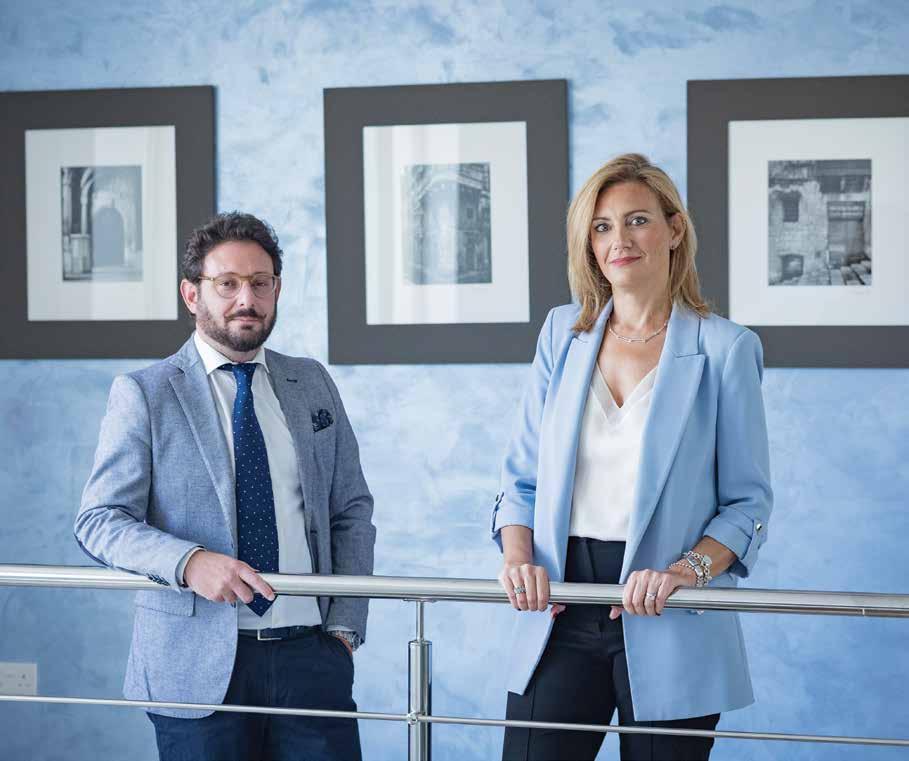
has traditionally been rooted in the country’s favourable tax regime, the narrative is now evolving from this longstanding, tax-dominated message to a more growth-oriented approach. Focusing on this shift in perspective, FJVA’s partners put the spotlight on other key drivers enhancing the country’s strategic value and attracting businesses and individuals to Malta’s shores. Their case for Malta’s consideration as a jurisdiction of choice is a compelling one, in particular for the attention of non-EU entities looking beyond their own borders for business and investment.
“Malta has long offered significant benefits to emerging businesses and other entities from developing jurisdictions seeking to invest in Europe and needing a ‘neutral stepping stone’ to facilitate this,” Dr Risiott explains. While, for individuals, Portugal, Spain and Italy have tended to be the more popular choices (perhaps as a result of
a different promotional approach), Malta’s advantageous personal residency relocation programmes are often less well-known, despite their clear competitive edge over many other jurisdictions.
Besides the individual residency aspect, company set-up is a crucial and non-negotiable element of any corporate relocation or diversification. Highlighting Malta’s advantage over other jurisdictions, Dr Risiott emphasises the country’s high level of corporate flexibility, demonstrated by the diverse range of vehicles and solutions available for corporate structuring and restructuring. “In our experience, clients are typically familiar only with limited liability companies, and possibly trusts, and may not be aware of other options.” However, beyond these standard options, Malta offers a respectable – “and often overlooked” – range of structures that allow international businesses to establish a European presence.
“Malta has long offered significant benefits to businesses from developing jurisdictions seeking to invest in Europe and needing a ‘neutral stepping stone’ to facilitate this.”
Kurt Risiott
These include – among others – partnerships, foundations (including private beneficiary foundations for wealth and succession planning), and branch/ representative offices.
Furthermore, Malta’s regulations on the continuation of companies enable the conversion of non-EU companies into Maltese companies, allowing these entities to maintain their operations and commercial arrangements. It is worth noting that this solution is not widely available in other European jurisdictions, Dr Risiott says.
Ms Camilleri Vassallo emphasises the importance of understanding whether the client’s objective is short or long term. “A holding structure, for instance, may be suited to short-term objectives, whereas long-term motives such as succession planning take us into the realm of foundations.” While investors
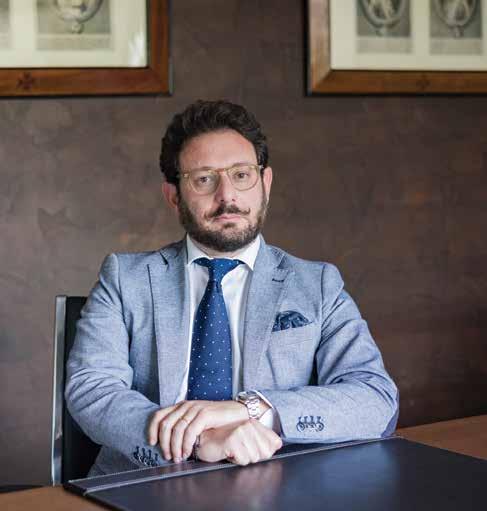
and shareholders are best served by funds or partnerships, family-owned concerns are generally guided towards trusts and foundations. Trusts tend to be a popular solution in Malta but, as Dr Risiott explains, private beneficiary foundations are particularly worth considering, as they combine the legal personality of a corporate entity with the discretion and succession planning benefits of a trust. FJVA has found this type of foundation to be well-received by foreign clients who often meet hurdles seeking this structure elsewhere in the EU.
Meanwhile, Dr Risiott believes Malta has the capacity to become a “Singapore of the EU” by developing its family office portfolio. Family offices (private wealth management entities designed for high-net-worth individuals) can be an ideal ‘low maintenance’ solution given that they require minimal resources for implementation.
From a fiscal and tax perspective, the former colony benefits from a Companies Act that echoes elements of the UK Companies Act and a national tax system influenced by its historical British ties, including a full imputation system and a network of double taxation treaties. A further strength of Malta’s corporate infrastructure is its ability to fully implement shareholders’ agreements within the chosen structure – an advantage not universally available in other jurisdictions, which can significantly hinder companies seeking to regulate their business relationships.
Dr Risiott notes that Malta’s financial services legislation enjoys a positive reputation among practitioners from other jurisdictions for its dynamic and effective nature – particularly when compared with larger jurisdictions. Malta maintains consistent effort and stability in this area, partly due to the significant contribution of the financial services sector to its GDP.
Crucially, while this archipelago has traditionally been known for its tourism industry, it is increasingly becoming a hub for emerging sectors thanks to numerous Government programmes and initiatives aimed at creating optimal conditions for the finance, gaming and technology industries. The country’s forward-thinking approach is evident in its
promotion of innovative technologies and advancements in AI and fintech spaces. Although national parliaments may not be aligned on every issue, Dr Risiott emphasises the Maltese Government’s “pro-investment, pro-business legislative stance.”
This drive to thrive opens up the dialogue about agility. While the island may be limited in space and natural resources, its small size also offers a certain ease of responsiveness to the international business community; a tiny but mighty identity, so to speak. “My father has always said that as a laboratory economy, any changes –whether positive or negative – are very quickly observed in Malta,” Ms Camilleri Vassallo notes. This lab economy status can be leveraged to benefit international clients by allowing rapid observation and assessment of new regulations, policies, or economic shifts in Malta’s smaller, controlled environment, thus enabling quick adjustments before attempting to scale up.
It is not surprising that Ms Camilleri Vassallo and Dr Risiott view Malta’s attractiveness as extending beyond fiscal benefits; indeed, tax incentives are described as a secondary consideration rather than the primary factor guiding discussions about relocation.
That said, it would be remiss not to acknowledge areas where this Mediterranean jurisdiction can improve. The partners recommend the course correction of potentially overzealous regulation and compliance, simplification of certain legal procedures in the name of greater efficiency, a larger number of annual company incorporations (drawing inspiration from the successful practices of territories such as Luxemburg), and further diplomatic efforts to boost Malta’s visibility abroad (including in Latin America).
To this end, Ms Camilleri Vassallo proposes a “collective endeavour to define the future direction of the corporate services sector through an industry-wide mission statement.” Tailored and efficient solutions, ethical business, client focus, and mutual growth and success are suggested as relevant elements of such a mission statement (in the vein of FJVA’s own).
“An even more client-focused private banking model of doing business with our clients is to be encouraged,” Ms Camilleri Vassallo adds. “It is important that as an industry, the primary impetus is not the number of companies or structures we can sell. Rather, we must be led by focusing on our clients’ needs and providing the correct solution for those individual needs.” It leads us to zeroing in on FJVA’s own bespoke practices and philosophy for a moment. The firm “does not rubber stamp or template anything,” Dr Risiott confirms. “All recommendations are guided by the client’s particular circumstances, as we are in the business of providing truly tailormade solutions.”
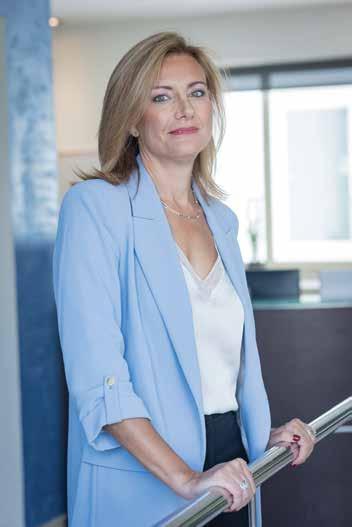
Returning to the tiny but mighty theme, FJVA’s CEO and Head of Tax Advisory concur: “Malta may be small, but we think big”. Both partners urge closer attention to the unique blend of strategic advantages that the dynamic, multifaceted business hub has to offer. Dr Risiott is confident Malta has what it takes to become a jurisdiction of choice for international companies searching for a stable, proactive and flexible domain within EU borders. As a jurisdiction that is committed to fostering a business-friendly environment, supporting sustainable growth and adapting to the evolving needs of international businesses, Malta is a serious contender in today’s challenging global economy as the place to do business for those looking beyond simple tax efficiency.
“As a laboratory economy, any changes – whether positive or negative – are very quickly observed in Malta.”
Adriana Camilleri Vassallo
Sparkasse Bank Malta Managing Director Paul Mifsud, alongside Karl Micallef, Head of Business Development for Investment Services, and Miguel Attard, responsible for Business Development & Relationship Management, meet Warren Joseph Bugeja to share insights into the milestones and forwardthinking initiatives that have cemented their expertise in financial services.
Sculpting a success story through strategic foresight and a commitment to excellence, Sparkasse Bank Malta plc’s journey since its establishment in 2000 is one of resilience and organic business growth. Positioned as a leader in depository and investment services, the bank has expanded its footprint in Malta and beyond while maintaining its reputation as “the bank with a human touch.”
Sparkasse Bank Malta was originally established as a subsidiary of Sparkasse Schwarz, a regional savings bank in Austria, during a period when Malta was attracting foreign financial institutions. Initially focused on accepting foreign deposits, the bank gradually expanded its services to cater to Maltese residents, transitioning from the Maltese lira to the euro.
Managing Director Paul Mifsud reflects on the journey, highlighting the early successes that laid the foundation for the bank’s expansion. “The key to our growth has always been the commitment and tenacity of our leadership, management and staff,” Mr Mifsud notes. A pivotal moment came when the bank obtained its custodian licence. “This licence allowed us to provide custody services to funds registered in Malta. At the time, reaching the €1 billion mark in assets under custody was a significant milestone. Today, we’ve surpassed €10 billion, solidifying our position
as a major player in the local market.” This growth led to a significant change when the bank separated from its parent group, allowing it to operate as a standalone entity with greater flexibility.
Another notable benchmark was the early adoption of direct payments through SEPA (Single Euro Payments Area), positioning Sparkasse Bank Malta as a technological leader within Malta’s financial services industry. “Implementing SEPA payments was a major achievement for a bank of our size,” Mr Mifsud adds. “It demonstrated the expertise of our IT and Payments teams, and underscored our commitment to staying ahead of the curve in innovation.”
Furthermore, the launch of the Dublin branch in 2018 was a crucial step in the bank’s international growth strategy. “Expanding to Dublin mirrored our Maltese operations and reflected the strategic diversification of our service offerings,” he explains.
Sparkasse Bank’s strategy of organic growth has been instrumental in its success. “We’ve always prioritised reinvesting our profits, which has sent a strong message both internally and externally about our commitment to building and sustaining growth,” Mr Mifsud elaborates. The bank’s 2023 financial performance reflects this strategy,

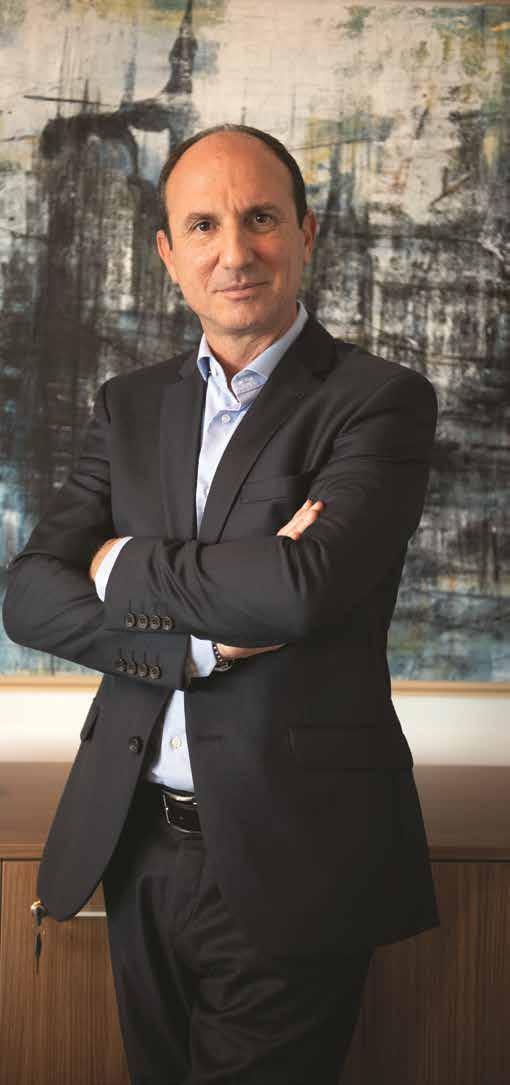
“Our business model and our dedicated workforce are key to our resilience and success.”
Paul Mifsud
with notable improvements driven by favourable interest rates. “The shift from negative to positive interest rates was a significant driver, given our business model’s focus on high liquidity. We’re now looking to diversify and expand our product offerings, particularly in portfolio management, to maintain this momentum.”
The Managing Director, who has been with the bank for 17 years, describes his leadership journey as one of evolution. “When I started, we were a small team of seven. Today, we have 120 employees across three countries. As the bank grew, so did our need for specialised roles and management structures,” he recalls. “I’ve had to transition from wanting overall control to trusting others and listening more. Being present, transparent and respectful are values I hold dear and have guided my leadership style.”
Sparkasse’s reputation and governance play a key role in gaining the trust of investors. “Our business model, which doesn’t rely on credit or mortgage services, has helped us remain resilient. We focus on serving licensed or regulated entities in Malta, which are less susceptible to economic downturns compared to traditional businesses,” says Mr Mifsud.
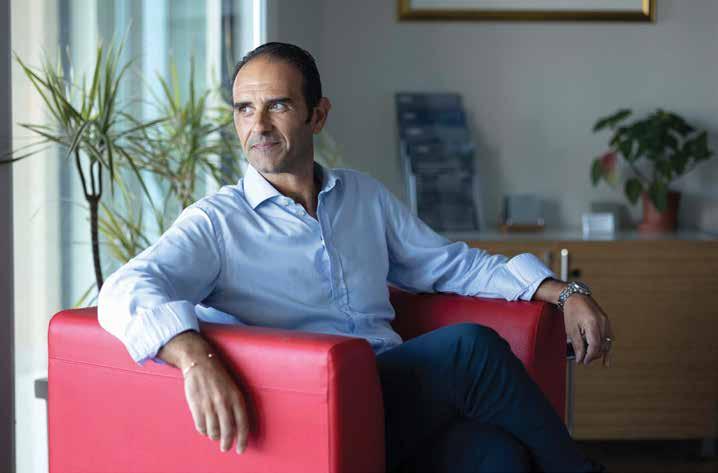
“Fast forward 10, 20 years and ESG won’t be an option but a mandatory standard.”
Karl Micallef
Karl Micallef, the bank’s Head of Business Development for Investment Services, echoes this sentiment. “We’ve been around for 25 years, navigating various market challenges, and our conservative, robust balance sheet, free from high-risk lending, is a huge advantage,” he states. The bank’s cautious yet flexible approach to liquidity management has helped it stand out in the market. With over 50 per cent of its assets held at the Central Bank of Malta, Sparkasse ensures that client funds are both secure and accessible. “We’ve always emphasised liquidity and security, which allows businesses to manage their finances with confidence,” notes Mr Micallef.
Holding a Chartered Financial Analyst (CFA) certification in ESG (environmental, social, and governance) Investing, Mr Micallef is particularly committed to integrating sustainable and ethical ESG policies into Sparkasse’s investment management offerings. These policies help guide the bank’s investment committee in asset allocation and portfolio composition for clients, relying on data from independent third parties for accuracy. He underscores that this is not a short-term trend but a longterm commitment. “Fast forward 10, 20 years and ESG won’t be an option but a mandatory standard,” he stresses.
Sparkasse is currently applying for an extension of its investment services licence to include discretionary portfolio management, with plans to implement “a state-of-the-art portfolio management system – the Rolls-
Royce of systems,” next year. Mr Micallef points out that this transition aligns with the bank’s focus on data-driven decision-making. “You can only manage what you measure,” he explains, highlighting the importance of monitoring performance closely to ensure clients receive clear value from their investments. “You don’t want to be surprised by the results; you need to anticipate them,” he maintains.
Sparkasse Bank’s customer-centric approach has been a key driver of its success. The bank prides itself on building personal relationships with clients, ensuring they are not just another number. Miguel Attard, responsible for Business Development & Relationship Management, emphasises this commitment. “We are the depository of choice, that first port of call,” he says. “Our clients know they can trust us, and that’s the foundation of all our relationships.” Mr Attard also highlights the bank’s open-door policy, which has been pivotal in its growth, particularly in industries initially seen as risky, such as gaming and startups.
Both Mr Micallef and Mr Attard mention the importance of staying adaptable to client needs. Over the past 25 years, Sparkasse Bank has expanded beyond basic banking services to offer advisory, treasury and investment management solutions, all tailored to each client’s requirements. “We’ve evolved alongside our clients, often transforming simple banking relationships into broader, more comprehensive partnerships,” Mr Attard explains.
The pair emphasise the depth of talent within the bank and the importance of fostering a collaborative environment: “there’s a lot of energy among the young professionals here, and they see solutions differently. When you bring all these perspectives together around the table at an investment committee, the discussions are exciting, and the results motivate the whole team,” Mr Micallef enthuses. Meanwhile, Mr Attard calls attention to Malta’s talented and hardworking human resources, describing them as key to both the bank’s and the country’s success. Sparkasse Bank, like Malta, thrives on its service offering, and Mr Attard sees nurturing young talent as crucial to maintaining growth. With an average employee age of around 30, the bank fosters a new generation of professionals committed to its long-term vision.
Sparkasse Bank has always been proactive in adapting to new regulatory frameworks. Mr Attard points to the bank’s readiness for recent developments like the AML-6 Directive and upcoming regulations such as PSD3 and MiCA. “We see these changes as opportunities. Being prepared early allows us to shape our processes and systems in a way that meets market expectations. It places us in a better position to serve our customers while maintaining a symbiotic relationship that drives mutual growth,” he says.
Mr Attard’s role in the bank’s expansion into Ireland, following regulatory approval to establish a depository there, was a significant step in growing the bank’s international presence. “We’ve built a strong team in Ireland, with local expertise that mirrors our operations in Malta. This commitment to integrating with local markets is a key part of our strategy,” he shares.
As the dynamic financial services industry remains a key pillar of Malta’s economy, Sparkasse is well-positioned to explore new opportunities and continue playing a critical role in the industry’s future. Malta has become an attractive destination for global businesses, thanks to its strategic location, EU membership, quality of life, and favourable regulatory environment. “Malta offers unencumbered access to European markets, providing free movement of capital and assets, making it an ideal gateway for companies looking to expand,” Mr Attard remarks.
Malta’s financial sector has matured into a strong and reputable hub, supported by its solid legal framework and positive economic outlook. The island has established itself as a leader in banking, insurance and investment services. In recent years, there has also been a significant rise in fintech firms, alongside established sectors like iGaming and the nascent crypto space, all contributing to Malta’s dynamic financial ecosystem and all of which the bank aims to support..
With a 25-year history of stability and growth, Sparkasse Bank is confidently looking to the future. The bank plans to leverage technology to enhance its service offerings. “We’re focusing on API connectivity to streamline transactional flows for our customers. This will not only improve operational efficiency but also reinforce our commitment to staying at the forefront of technological advancements,” Mr Mifsud pledges. As new trends emerge in fintech, digital banking and ESG, the bank is poised to lead the way in shaping the future of financial services in Malta and beyond. “Our aim is to be recognised as the ‘go-to’ bank for regulated and licensed entities,” Mr Attard affirms. This focus on robust governance, combined with the bank’s emphasis on cuttingedge technology, sustainability and a dedicated team of professionals, will ensure Sparkasse is well-prepared to meet the evolving needs of its clientele. “We believe Sparkasse can be the investment manager that institutional and private clients turn to for reliable, forward-thinking solutions,” Mr Micallef concludes.
Find out more about Sparkasse Bank Malta plc at sparkasse-bank-malta.com
“We’ve evolved alongside our clients, often transforming simple banking relationships into broader, more comprehensive partnerships.”
Miguel Attard

Malta’s robust economic performance, despite ongoing global challenges, can largely be attributed to its strategic economic diversification. Key economic stakeholders have actively pursued opportunities to cultivate new sectors and attract essential foreign investment to its shores. Leveraging its unique attributes, globally renowned firms have established Malta as a critical link in their supply chains, producing an array of products, from semiconductors and medical devices to drones and chemicals.
Many visitors who primarily associate Malta with tourism are surprised to learn that components in their vehicles, children’s toys and some of their prescribed medicines originate from the island’s industrial zones. Given its limited size, Malta is not geared for large-scale mass production, nor is it suitable for low valueadded manufacturing outfits. However, the country excels in high-value, technologically advanced production that demands specialised training – a niche where astute investors have long found lucrative opportunities.
Malta’s proximity to mainland Europe and its strategic position along major maritime trade routes offer companies a distinct advantage, facilitating efficient access to global markets. The country’s manufacturing sector produces a range of intermediate and finished goods, catering to both industrial clients and end consumers.
In addition to manufacturing, Malta has positioned itself as a hub for information technology, driven by substantial public and private investment in digital infrastructure. Local firms are also well-placed to develop diverse software solutions, particularly for enterprise applications. Furthermore, as the race for artificial intelligence intensifies, a growing number of Malta-based companies are leading the way, gaining international recognition for AI solutions that enhance business efficiency and reduce costs.
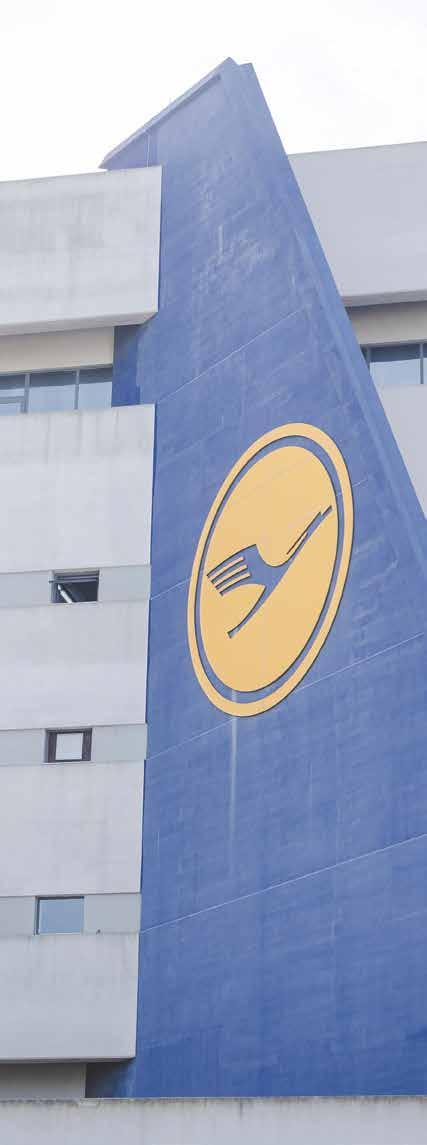

Aligned with the EU’s vision for climate neutrality within a generation, Malta is shaping policies and incentives to support this goal while maintaining an emphasis on digitalisation and high-value sectors. Investors and businesses aligned with Malta’s vision for a future-proof economy will benefit from robust local support, balancing practicality with strict adherence to EU and international standards.
The knowledge-intensive nature of Malta’s industrial and broader economic landscape has also opened substantial opportunities for those providing ancillary services, including consultants with expertise in rapidly growing sectors and providers of digital solutions critical for seamless business operations.

Malta’s manufacturing sector continues to grow at a steady pace as foreign firms establish new production facilities and long-standing investors expand their operations. As one of the main sources of foreign direct investment in the country, export-oriented manufacturing firms can expect to find well-developed infrastructure with excellent connections to all key regional markets. Manufacturers setting up operations in Malta benefit from a skilled workforce known for conscientiousness and creativity. While Malta’s cost of living and business expenses have aligned more closely with the European average, it remains more affordable than major Western European capitals. Support from the Government and public agencies plays an important role, ensuring that Malta remains competitive in sectors that are a priority for national development and attracting industry
leaders from the USA, UK, Germany, France, and Italy, whose high standards can be upheld in Malta.
The increasing demand for industrial space has led the state entity responsible for Malta’s industrial zones, INDIS, to embark on a multi-year programme of expansion and renewal. Malta’s extensive experience with foreign direct investment has also enabled authorities to design a broad package of incentives to support the development of diverse manufacturing enterprises. The support ecosystem is rounded out by educational institutions like the

University of Malta and the Malta College of Arts, Science and Technology (MCAST), which contribute considerable expertise in maximising the use of state and EU funds.
Following recent global supply chain disruptions and geopolitical tensions, near-shoring and friend-shoring have gained importance. With a stable economy and EU membership, Malta is increasingly appealing for companies that prioritise secure, reliable supply chains.
Today, Malta’s manufacturing industry is highly diversified, with much of it focused on the production of components for, among others, the electronic, engineering, automobile, and chemical industries. Some of the main products and fields of operation of Malta-based manufacturers include:
Automotive components Boat components Circuit boards
Food and beverages Injection moulding and tooling Medical devices
Petrochemicals Pharmaceuticals Precision engineering
Seals Security printing Semiconductors
Switchgears Toys and games Custom-engineered and applicationspecific small-batch products
Dr Keith M. Azzopardi is the Co-Founder and CEO of Smart Materials Ltd, a Maltese startup that has developed an innovative production process for the manufacture of a game-changing type of foam known as auxetic foam. He holds a doctorate in metamaterials and has successfully created a number of market-leading and awardwinning chemical and hardware products at his first startup, Thought3D.
What are the main benefits and challenges for innovative tech startups in Malta?
The small size of the local market can be both a challenge and a blessing. Startups in Malta must adopt a global mindset from day one, as the local market alone is too limited for substantial growth. Hiring is another challenge due to the limited local talent pool. Additionally, the local startup investment ecosystem is constrained, which means startups often need to seek investment abroad once they reach a certain scale.
However, Malta’s small size also offers advantages. It’s an easily accessible market, useful for piloting new ideas. The island’s high quality of life makes it an attractive place to live and work. Moreover, Malta offers excellent governmental support, and key individuals in policy and innovation are easily reachable, which is invaluable when navigating new regulatory frameworks or seeking strategic backing for novel technologies.
Has it been easy to connect with potential partners, suppliers and clients, and to find employees?
It has been relatively easy to connect with partners, suppliers and potential clients, both locally and abroad. Given the nature of our business, most of these are based outside of Malta, and we are in discussions with some of the largest global brands in a number of verticals. If the product is sufficiently innovative, crossborder collaborations are not an issue. Finding employees with the necessary skillsets and a startup-ready mindset has been more challenging, but it’s a challenge we are continually addressing.

Have you seen changes to the startup ecosystem over the last years?
Yes, the Maltese startup ecosystem has grown significantly in recent years. The startup framework is expanding into many new areas. Initiatives such as the Startup Festival, the European Startup Summit being held in Malta and the introduction of accelerators like SuperCharger Ventures and Plug and Play have been great additions. Furthermore, the launch of the Malta Venture Capital initiative, along with ongoing support schemes like the TAKEOFF Seed Fund and the MIMCOL Investment Tax Scheme, has added momentum to the local ecosystem, pushing it towards greater maturity and impact.
Malta is also prioritising founder well-being as a central part of its agenda. A strong and healthy founder will undoubtedly result in better business performance. This focus is making Malta unique in the startup ecosystem and, if done correctly, could have a major impact on Malta’s future development.
What advice would you give to any tech entrepreneur considering Malta as a place to establish a business or research facility?
Malta is an excellent location for R&D and tech businesses. Its size allows for focused work and staying under the radar, which can be advantageous when developing new ideas. Government support is strong, and the Mediterranean environment offers a high quality of life. Additionally, Malta’s connectivity to major European hubs makes it a convenient base for business and research development.
Malta offers excellent governmental support, and key individuals in policy and innovation are easily reachable, which is invaluable when navigating new regulatory frameworks or seeking strategic backing for novel technologies.

Malta exports around €500 million in pharmaceuticals and chemicals each year, establishing itself as a major player in the European medicines market. This sector is deeply embedded in the country’s economic fabric, with companies benefitting from proximity to key markets, Government support and open dialogue between industry stakeholders and education providers aimed at developing the potential of the country’s human resources.
As the national regulator, the Malta Medicines Authority is highly respected within the EU and beyond. Medicines registered with the Authority enjoy mutual recognition by the United States’ Food and Drug Administration, making accreditation in Malta especially beneficial. The Medicines Authority oversees operators’ compliance
with Good Manufacturing Practices (GMP) and processes licences and authorisations for all medicinal products. In this role, it also competes globally, attracting pharmaceutical companies to register their products in Malta for batch release, testing and validation. As a European reference state, Maltese registration allows producers to market their products across the EU with a trusted seal of approval. While some countries offer cheaper registration, they often charge an export tax on each unit exported, whereas Malta does not, making it the preferred choice for large exporters.
Malta is a leader in the production of generic pharmaceuticals, being one of the few European Union countries to fully recognise the research exemption of the Patent Cooperation Treaty and European Patent
Convention. This broad interpretation of the convention allows companies in Malta to develop generic versions of patented drugs prior to the patent’s expiry, provided they are not commercialised. A generic drug can be manufactured, tested and approved while the competitor’s patent is still in effect, enabling Malta-based generic pharmaceutical companies to bring their product to market without delay upon patent expiration.
Malta’s Life Sciences Park is a state-of-the-art complex designed to streamline research and development, enabling companies to start operations with minimal preparation. Located near Mater Dei Hospital and the University of Malta, the park facilitates collaboration between industry and academia. The facility offers biology and chemistry lab spaces ranging from 100sqm to 300sqm, along with meeting rooms and a secure area for specialised activities, including the storage of flammable materials and hazardous waste. Additionally, a dedicated building supports digital services, encompassing imaging, software applications and data interpretation.
Other facilities and services include gene sequencing, analytical services units, production of human proteins from genetically modified plants, cyclotron radionuclide production for PET screening, and clinical testing of new chemical entities (NCEs) and generics.
Malta pioneered the medicinal cannabis sector by establishing a production and distribution framework in 2018. Despite initial regulatory and technical challenges, the industry gained momentum, with Malta-made products reaching patients abroad by 2022. Numerous companies now operate research and production facilities in the country. Alongside the regulatory clarity provided by legislation, Malta’s mature pharmaceutical sector has supported the growth of this nascent industry, which continues to expand monthly. With the global medicinal cannabis market projected to reach €25 billion by 2026, Malta is poised for substantial growth.
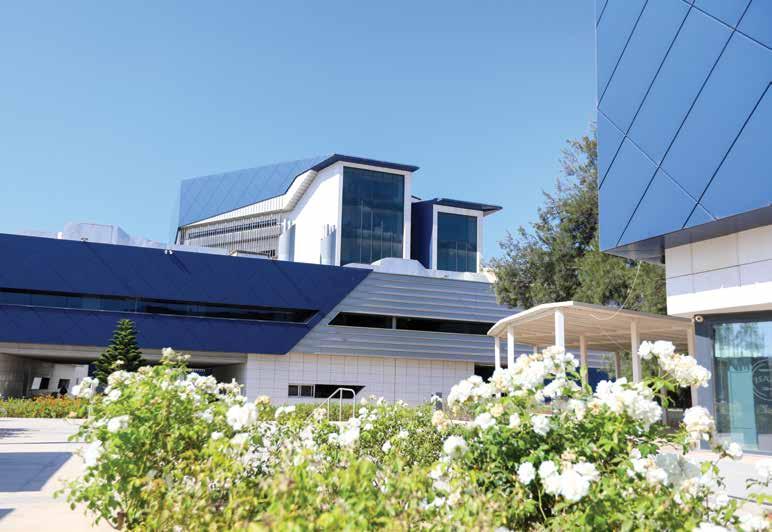
LifeSciencesParkPhoto:DavidMallia-INDISMalta
Alistair Castillo is the Chief Technology Officer at Melita.io, overseeing global connectivity solutions for IoT and M2M, with 95 per cent of SIM activity outside Malta. Celebrating 25 years at Melita in 2024, he began as a Network Engineer and later spent 15 years as Head of Core Networks, managing broadband, mobile and TV services.
What are the benefits of operating in Malta for a globally oriented IT enterprise?
Malta offers a favourable regulatory and business environment, particularly for tech companies. Its status as a European Union member state ensures compliance with EU regulations like GDPR, while offering easy access to EU markets. Furthermore, Malta’s commitment to advanced digital infrastructure is evident, with Melita investing heavily in next-gen technologies like its 10-Gigabit network, ensuring that homes and companies have access to fast and reliable internet services. The nationwide 5G network offers faster speeds, greater reliability and lower latency. This infrastructure positions Malta as a leading hub for IT and IoT enterprises aiming for global reach.
How did its acquisition by EQT affect the development of Melita.io?
Since EQT acquired Melita in 2019, the company has undergone significant transformation, focusing on expanding its infrastructure and global reach. Under EQT’s ownership, Melita has made substantial investments in high-speed internet and 5G networks, positioning itself as a leader in IoT connectivity. This has enabled Melita.io to offer innovative solutions like seamless global M2M communication, which in turn has helped secure clients worldwide. It is worth noting that we have also gained considerable insight into the practical use of AI, ranking among the top two in EQT’s global portfolio of companies.
[Editor’s note: Following this interview, in late 2024, Goldman Sachs Alternatives announced that it would be acquiring Melita from EQT Infrastructure, subject to regulatory approvals. Bloomberg reported the value of the transaction at around €750 million.]
How easy is it to find highly skilled talent for roles involving complex tasks in Malta?
Malta has been making significant strides in developing its talent pool, particularly in the tech and IoT sectors. The country’s investment in education and various initiatives is geared towards nurturing a skilled workforce. However, due to the limited local population, Malta still relies on attracting foreign talent for complex technical roles and specialised expertise.
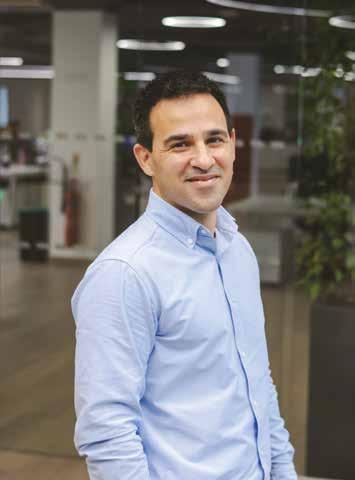
Can you share some brief insights on how Melita.io was able to penetrate foreign markets?
Melita.io’s global growth has been driven by strategic partnerships and collaborations. With employees in Germany, Kenya, the Philippines and Sweden, and over 295 global roaming agreements across 180+ countries, we deliver IoT connectivity solutions worldwide. Our strong partner ecosystem allows us to provide tailored IoT solutions that integrate technology with industry expertise. The acquisition of German IoT companies Crout and Conekkt, along with Q. Beyond’s IoT SIM product, has expanded our hardware and service offerings globally. Security, enhanced by Google Chronicle’s advanced AI-powered tools, remains central to our strategy, building trust with partners and customers.
As a technically proficient leader in a fast-growing field, what advice would you give to someone in a similar position looking to establish a base in Malta?
For anyone looking to establish a tech base in Malta, it’s crucial to focus on the country’s excellent internet connectivity and businessfriendly environment. Building relationships with local regulatory bodies and leveraging Malta’s strategic position within the EU can provide significant advantages. Additionally, tapping into local and EU grant programmes, while considering the need for foreign talent when necessary, will help foster growth. Leaders should also stay ahead of evolving regulations, particularly in cybersecurity and data protection, as these are critical in the tech space.
Its advanced digital infrastructure positions Malta as a leading hub for IT and IoT enterprises aiming for global reach.
Dr Gege Gatt is the CEO of London-based company EBO, an AI enterprise that automates citizen engagement. He is a digital entrepreneur, a TEDx speaker and a recipient of the UK’s 2024 Enterprise Awards. He also serves as a Board Member of Humanity 2.0, developed by the Vatican in Rome with a consortium of thought leaders to identify and address barriers to human flourishing.
As the founder of a Maltese firm pioneering realworld applications of Artificial Intelligence (AI), did you find the local business and investment landscape conducive to growth?
Malta offers a unique blend of opportunities and challenges for AI-driven companies like EBO. The nation’s size fosters a close-knit business community, allowing quicker, more personal interactions with stakeholders; however it also means that the graduate count and the throughput is limited. Support from local institutions exists but is limited to the economic strictures of a small nation. Most significantly, access to capital is constrained and the M&A scene remains largely static. As an AI company, we’ve benefitted from Malta’s position as a bridge between Europe and other continents. However, fostering a robust AI ecosystem necessitates a committed focus on developing digital infrastructure, promoting an innovation culture and establishing data-friendly policies to support sustained innovation at scale.
EBO.ai’s most high-profile client is in the UK – the NHS. How did that contract come about?
Our journey with the NHS began in 2019, during a time when digital transformation in healthcare was accelerating and AI was beginning to demonstrate real value. We partnered with established UK firms to introduce innovative AI solutions that address some of the NHS’s most pressing needs, such as patient waiting list management and operational efficiencies.
Do you think a Malta-based company would have similar growth opportunities in the UK now that the country has left the EU?
Post-Brexit, opportunities for Malta-based companies in the UK may appear superficially more complex; however, demand for reliable AI solutions remains strong. Malta’s presence in the EU could offer companies like ours an advantage, particularly in showcasing AI as a pro-privacy, agile solution that transcends borders. With proactive adaptation, Malta-based tech companies can still succeed in the UK market, especially by emphasising the strength and ethical standards of EU-derived AI applications.

What advice would you give to tech entrepreneurs considering Malta as a location for their operations or R&D?
Malta offers distinct advantages, particularly for entrepreneurs focused on European markets. For tech entrepreneurs, Malta’s appeal lies in its skilled workforce and supportive regulatory environment. However, I would advise entrepreneurs to prepare for the unique challenges that come with scaling and raising capital outside of this small market. Maintaining a global perspective, forming partnerships beyond local borders and fostering a culture of adaptability are crucial. Furthermore, engaging with local networks – such as TradeMalta, Malta Enterprise, MDIA, MDB, Tech.mt, and other innovation hubs – can help entrepreneurs maximise Malta’s resources and contribute to the local ecosystem.
BMIT plc purchased a minority stake in EBO in 2020. Can you share any insights or lessons from this phase in EBO’s development?
The partnership with BMIT plc was both strategic and symbiotic, providing EBO with access to the iGaming sector while allowing BMIT to expand its digital capabilities beyond data centres to AI. For aspiring entrepreneurs, our experience highlights the importance of finding investors aligned with your long-term vision and values. Partnerships like ours demonstrate that mutual value creation can drive growth without compromising independence. A key takeaway is to approach partnerships as collaborations for innovation, not just funding, to ensure they support your company’s evolution and reinforce its mission.
Malta offers a unique blend of opportunities and challenges for AIdriven companies.
Malta is a recognised hub for software engineering and enterprise application development, with a robust landscape of small and medium-sized firms delivering specialised solutions across diverse sectors, including financial services, healthcare, aviation, manufacturing, oil and gas, and retail. These firms are supported by global players that have established a strong presence, either directly or through local partnerships, to leverage Malta’s strategic advantages.
Malta boasts top-tier internet connectivity – the best in Europe – alongside a skilled local workforce and an active IT education sector, all of which enhance the country’s appeal. Local training institutions cover essential technologies for the digital economy, offering certifications in Microsoft, Oracle, Adobe, Cisco, Amazon, Dell, VMWare, Google and HP. Additionally, the alignment of Malta’s data privacy and security laws with EU standards simplifies compliance and reduces bureaucratic costs, creating a streamlined environment for both local and international tech firms.
Malta’s software sector is well-positioned within global tech trends, often mirroring or even leading developments in artificial intelligence (AI), Distributed Ledger Technology (DLT or blockchain) and the Internet of Things (IoT). With proactive regulatory frameworks and Government support, Malta has become fertile ground for innovation in these areas. Local companies have delivered notable solutions, such as AI-driven chatbots for healthcare, intelligent energy-saving systems for manufacturing and IoT applications for aviation – all testament to Malta’s capacity for industry-specific innovation.
The ecosystem is further strengthened by the presence of potential partners and clients across various sectors, creating a dynamic environment for investment in sector-specific technology solutions. As customised software solutions remain

integral to the 21st century economy, Malta’s software sector is poised for sustained growth, building on its foundation of connectivity, regulatory alignment and a skilled workforce.
A niche that is gaining traction is educational technology, or edtech. While still in its infancy, this sector is set to grow rapidly as investments accrue, supported by the establishment of a Maltese base by a startup accelerator of global renown. SuperCharger Ventures, the largest edtech-dedicated accelerator ecosystem, has locations in London, Singapore and Malta. The local set-up offers to cover salaries, reimburse expenses and provide access to funding and soft loans. Partnered with leading Maltese software companies and educational institutes, the programme presents an exciting new opportunity and a glimpse of what the future holds as digital innovation unfolds.
Starting out as an importer of renewable energy systems, Bajada Lyons Group has diversified its interests over the years, expanding into engineering, manufacturing, hospitality, and elderly care. A Vice President of The Malta Chamber, Mark Bajada has won recognition as an EY Entrepreneur of the Year and has gained prominence as an investor on Shark Tank Malta.
As a respected business leader involved in several sectors, what would you say are Malta’s most attractive qualities for entrepreneurs and investors?
Malta offers a thriving business ecosystem with robust infrastructure, ease of doing business and a strategic position as a gateway to Europe, making it highly attractive for entrepreneurs and investors. The country provides a supportive regulatory environment, financial incentives and streamlined processes that enable businesses to grow efficiently. Coupled with a high quality of life, excellent healthcare and a Mediterranean lifestyle, Malta presents a unique blend of professional opportunity and personal appeal that attracts top talent and fosters long-term investment.
Are there any market gaps that a foreign investor should look out for?
Yes, several market gaps in Malta present excellent opportunities for foreign investors, particularly in tech, robotics, digitalisation and healthcare. These sectors are ripe for innovation, with demand for advanced digital solutions, automation and modern healthcare technologies outpacing current offerings. Malta’s commitment to digital transformation, coupled with a supportive regulatory environment, makes it ideal for investors who can bring expertise, technology and scalable solutions to meet these growing needs and help drive the country’s economic advancement.
How important are relationships in the Maltese way of doing business?
Relationships are absolutely essential in Malta’s business environment. As a small island, Malta relies heavily on trust and

rapport, making personal connections fundamental to success. Building a solid reputation is key, as strong relationships often lead to new opportunities and foster long-term business partnerships. In Malta, networking and trusted recommendations play a crucial role in opening doors and establishing credibility, highlighting the importance of meaningful connections in achieving business success.
How have Malta’s location and its logistics infrastructure impacted your strategic decision-making in your business?
Malta’s location and well-established logistics infrastructure, including strong air and sea connectivity, have significantly supported our strategic decision-making, especially in sourcing high-tech energy systems from distant markets like Australia. The reliable network of airlines and shipping routes, developed over many years, ensures that goods move efficiently to and from Malta. This connectivity enables us to maintain a smooth supply chain, reach international markets effectively and integrate advanced technologies, supporting both our local operations and broader business goals.
You have been a notable figure on the local angel investment scene. Have you seen changes in Malta’s startup ecosystem over the last years?
Malta’s startup ecosystem has developed gradually yet strongly in recent years, with a promising international approach that appeals to local investors. The Government has introduced several incentives to further stimulate this growth, such as tax credits, grants and funding schemes aimed at boosting innovation and research in sectors like technology, healthcare, gaming, and digitalisation. Additionally, Malta Enterprise’s support schemes and funding for R&D projects provide startups with the financial support needed to scale. These initiatives, alongside Malta’s growing reputation as a tech hub, make it an increasingly attractive environment for both entrepreneurs and angel investors.
As a small island, Malta relies heavily on trust and rapport, making personal connections fundamental to success.
What one piece of key advice would you give to a foreign investor, entrepreneur or business thinking of setting up shop in Malta?
My key advice would be: be patient, build relationships and persevere. Malta’s business culture thrives on personal connections, so don’t expect things to happen overnight. It’s about making the right connections, showing up and nurturing trust over time. If you’re in it for the long haul, Malta will reward your efforts – just don’t expect it to be a sprint!
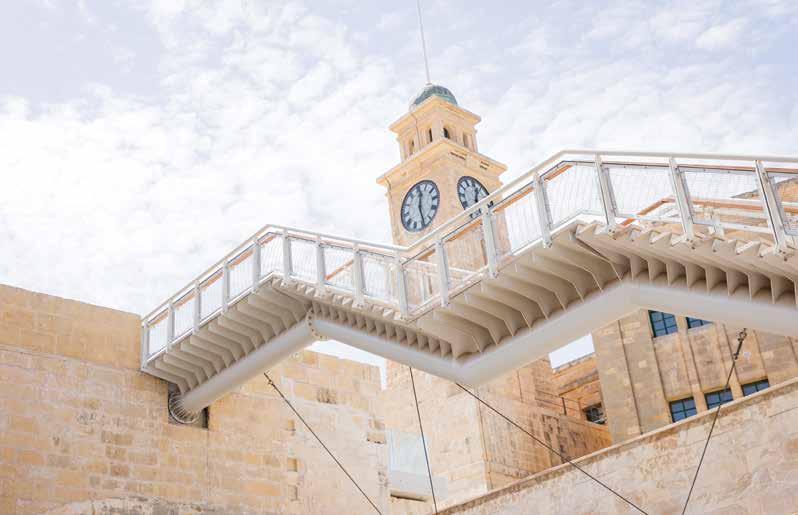
Malta continues to attract a broad spectrum of industries, including niche operators setting up facilities on the island. Prospects for growth across various sectors appear highly promising.
Outlined below is a concise overview of some of the other industries that make up the Maltese economy. Each sector involves a kaleidoscope of local and international companies, attracted by the islands’ central position and the many targeted incentives designed to stimulate economic activity. The use of English and EU membership, alongside a highly educated and skilled workforce, ensure the right resources are available to turn projections into reality. These qualities are further maximised through a nimble approach to policy and regulation – a sometimes-undervalued benefit which has proven pivotal to the development of numerous economic pillars.
Audiovisual Production
Malta’s stunning landscapes and architectural heritage, which are so popular with visitors, have also proven versatile backdrops for a wide variety of audiovisual productions. The country has been attracting iconic productions for decades, with classic films like Midnight Express (1978) and Popeye (1980) showcasing Malta on the big screen. For the Academy Award-winning Gladiator (2000), and its highly anticipated sequel Gladiator 2 (2024), an entire replica of Ancient Rome, including the Colosseum, was built at Malta Film Studios, the islands’ main production facility, which has been operating since 1964 and has serviced over 200 productions. Steven Spielberg’s Munich (2005), Angelina Jolie’s By The Sea (2015), and Michael Bay’s 13 Hours (2016) were also largely or entirely shot in Malta. Other popular productions include Game of Thrones (2011), Captain Phillips (2013), World War Z (2013), Jurassic World Dominion (2022), and Napoleon (2023).
Producers and directors find in Malta a well-developed infrastructure and several local production houses attuned to Hollywood’s needs.
Malta Film Studios notably boasts a special effects water facility, featuring one indoor tank and two of the world’s largest exterior water tanks, each with a natural horizon due to their coastal location. The studio itself is equipped with a vast range of water special effects equipment, making it ideal for productions set on the open waters.
In addition to its high-calibre infrastructure and beautiful locations, all within a short drive, Malta also offers producers a generous cash rebate of up to 40 per cent of eligible expenditure. These include accommodation, catering services, props, equipment, vehicles, craft service, per diems, and computer equipment. The Malta Film Commission administers these incentives and promotes Malta within the audiovisual industry. Producers are encouraged to reach out to the team to find out whether Malta could be the right location for their next production.
Malta’s aquaculture sector has become a powerhouse in bluefin tuna production, with exports largely targeting Japan, where Maltese bluefin tuna is highly prized for sushi and sashimi. Indeed, Japanese and Korean investors were among the first to recognise Malta’s potential as a fish farming nation, illustrating the beneficial impact of far-sighted foreign direct investment. Investment in Malta’s aquaculture has also broadened the sector’s scope to include research and consulting services, enabling Maltese companies to advise internationally on sustainable farming and efficient production methods. Recent trade agreements with China further support market expansion, with notable interest from Chinese buyers during expos. This growth has allowed Malta to balance economic priorities with environmental objectives, using advanced feeding and breeding techniques to meet global sustainability standards. As fish farming expands worldwide by roughly 6 per cent annually, Malta’s aquaculture sector is poised for further growth in both established and emerging markets.
Malta’s maritime sector serves as a dynamic hub for commercial and leisure vessels alike, bolstered by a strong regulatory framework and Europe’s largest ship registry. Positioned in the central Mediterranean, Malta offers extensive maritime services, from maintenance and registration to specialised provisions for the oil and gas sectors, making it a highly versatile port of call for international shipping and a one-stopshop for vessel requirements, whether for a cruise liner, superyacht, or oil rig. Along the main harbours of Valletta and Marsamxett, new opportunities continue to emerge, in line with the industry’s evolution to meet 21st-century standards, from world-class engineering to discreet concierge services. As the sector goes from strength to strength, market gaps ripe for investment have come to light, primarily in largescale financing not fully addressed by local banks. Meanwhile, Malta has recently emerged as the world’s number one jurisdiction for the registration of superyachts, drawing ultra-high-net-worth (UHNW) individuals and fuelling demand for luxury amenities that is yet to be fully met.
Malta’s seas represent a largely untapped resource, with growing recognition that the next significant economic sector may well arise from its surrounding blue waters. This trend is not unique to Malta; worldwide, there is a growing focus on the ocean’s role in food production and renewable energy as major opportunities for economic development. In response to this, Malta has initiated the Blue Med Focal Point, serving as a critical contact for companies looking to develop sustainable blue economy ventures. This initiative is designed to support businesses in creating innovative niches within the maritime sector, thereby facilitating growth and sustainability. Through the initiative, the Government has also allocated €4 million to attract startups, scale-ups and SMEs with innovative solutions in the fields of blue tech and biotechnology, the mitigation of ocean pollution, blue economy innovation, and blue renewable energy. The opportunities are vast, and with this being considered a priority area for development by Maltese authorities, there is a raft of incentives investors can make use of, including dedicated programmes aimed at deepening the field of knowledge through research efforts. Potential investors are encouraged to reach out to Malta Enterprise and the Malta Maritime Forum, which serves as a vital resource by connecting local expertise with international interests, helping to advance Malta’s position in the global blue economy.
Aircraft maintenance, servicing and refurbishment works continue around the clock in hangars situated around Malta International Airport. The increasing number of airlines obtaining Air Operator Certificates
and registering aircraft in Malta find an ecosystem of companies ready to service all their needs. In fact, three of Europe’s largest airlines, Lufthansa, Ryanair and easyJet, have dedicated bases in the country, a testament to Malta’s ability to punch far above its weight in business.
A new sector in active development is the unmanned aerial vehicles (UAV) industry, commonly known as drones. In mid-2023, a Maltese pilot flew the world’s first unmanned cargo drone, taking off from Malta’s airport runway, with the first drone deliveries scheduled to launch within weeks of this publication’s print date. The use of UAVs in the logistics industry is set to skyrocket, attracting investment from global enterprises keen to find solutions to the last-mile conundrum. Similarly, the opportunities for synergy with the maritime and oil and gas industries are tremendous, with drones expected to revolutionise commercial transport during this decade.
Malta’s private healthcare operators have garnered a reputation for delivering outstanding medical services at competitive prices, attracting patients from across Europe and North Africa. One of the significant advantages of seeking treatment in Malta is the widespread use of English, which is a considerable draw for international visitors compared to other health tourism hotspots in the region. Although the industry is currently on a smaller scale, this presents significant opportunities for investment in innovative treatments and enhanced clinical experiences.
In tandem with the growth of healthcare services, Malta is also expanding its medical education offerings for international students. The recent establishment of a campus for Queen Mary University of London’s Barts and The London School of Medicine and Dentistry marks a significant development, building on the University of Malta’s Medical School, which has successfully trained hundreds of students from around the globe. This initiative aims to elevate Malta’s status as a hub for medical education and research, further enriching the country’s healthcare landscape.
For a country that imports most of the food it consumes, it may seem counterintuitive that Malta is home to several food producers whose products are sold all over the world. Given the small local market, more and more of these companies are recognising that the best opportunities for growth lie abroad. This drive to internationalise relies on local partners in the new markets, such as distributors and retailers, making this one area where foreign investment can benefit the Maltese and their domestic economy alike.
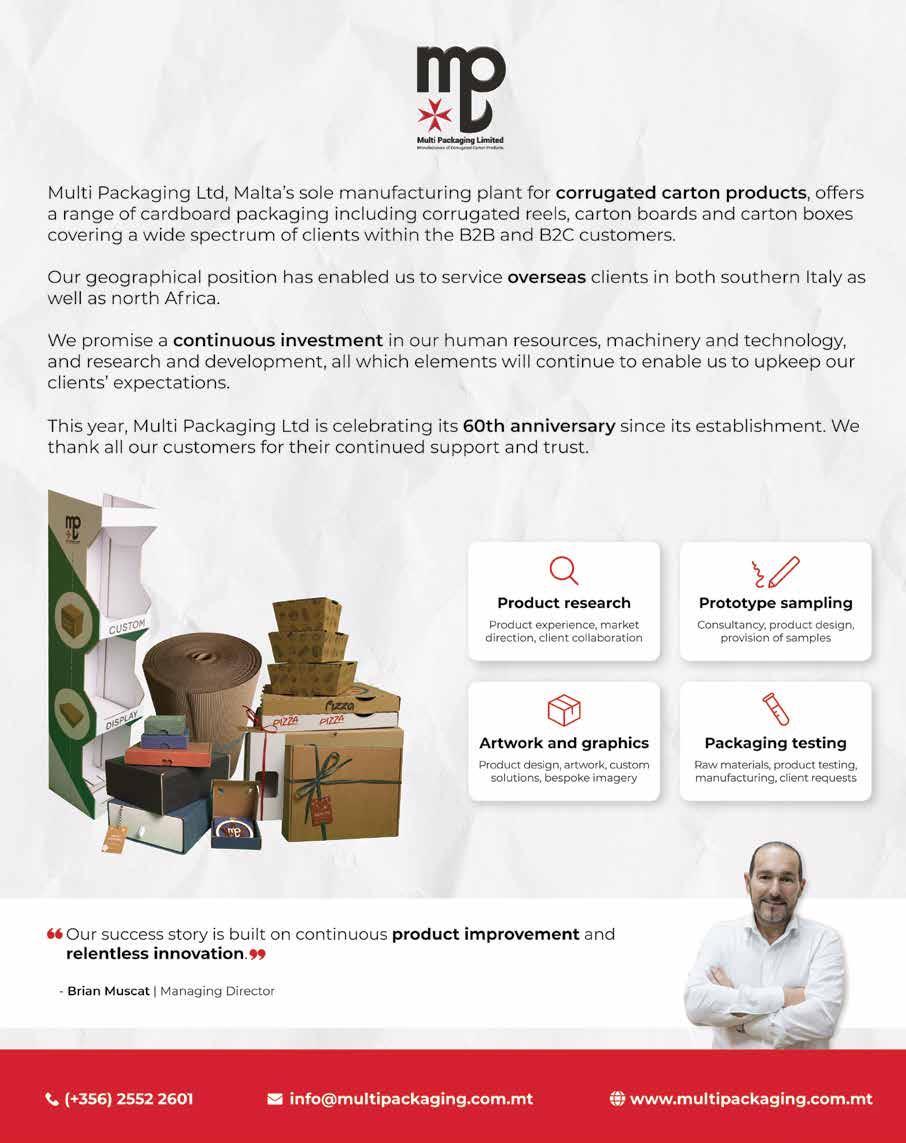
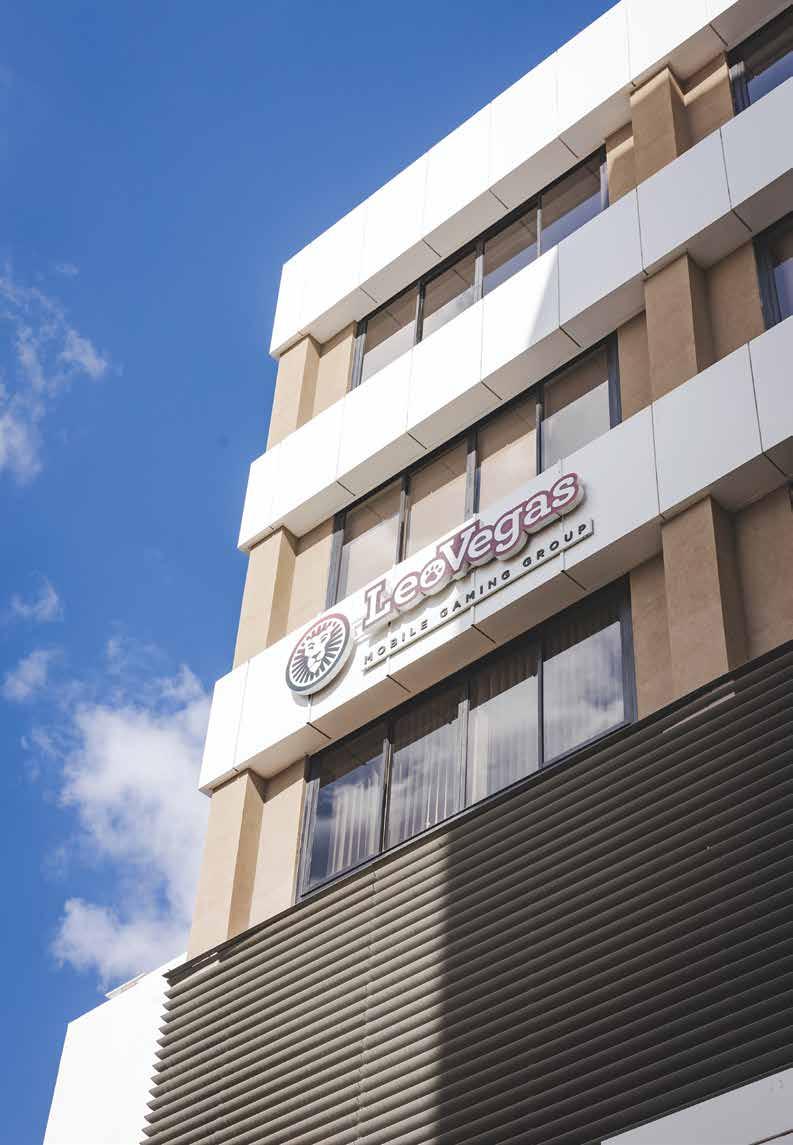
Malta’s role as a global pioneer in the online gambling industry exemplifies the country’s economic and political savvy. Despite its blueprint for the sector being emulated worldwide, Malta remains a thriving iGaming hub, home to over 300 licensed operators, including giants such as Bet365 and Kindred Group. This significant concentration accounts for more than 10 per cent of the global online gaming market, contributing €1.4 billion annually to the Maltese economy. To appreciate the industry’s scale, consider that nearly half of Malta’s entire internet bandwidth is dedicated to iGaming activities, underscoring its critical role in the nation’s economic fabric. The industry supports over 10,000 multinational professionals and has fostered an ecosystem of innovation and collaboration, with substantial economic spillover effects.
Malta’s regulatory framework, the first of its kind in the European Union, continues to set the standard by facilitating a smooth, responsive partnership between the regulator and industry stakeholders. This collaboration ensures that Malta remains at the forefront of legal and technological advancements, maintaining its reputation as a leader in the iGaming sector and as a nexus of opportunities for synergy.
As the global market evolves, particularly with the introduction of national regulations across Europe, the iGaming industry faces new challenges, including rising compliance costs and market fragmentation. Protectionist measures mean access to consumer markets is no longer guaranteed. However, the Malta Gaming Authority licence remains a highly valuable asset for operators with global ambitions, particularly those expanding into burgeoning markets in North and South America. On the B2B front, Malta boasts an impressive pedigree, hosting leading developers and platforms that power the global industry, built on years of experience. For visionary entrepreneurs and bold investors, Malta’s shifting iGaming landscape represents boundless opportunities.
Malta’s commitment to staying on the cutting edge has led to the introduction of groundbreaking legislation on Distributed Ledger Technology (DLT), also known as blockchain, allowing operators to accept Bitcoin and other virtual currencies. The EU’s Markets in Crypto-Assets Regulation (MiCA) draws extensive inspiration from Malta’s legislative framework, with clear and unmistakable similarities (seep.161)
For investors and entrepreneurs, establishing a base in Malta offers the added benefit of the jurisdiction’s and regulator’s deep expertise across all aspects of the iGaming industry. This includes technical, legislative and business realities, as well as social considerations like responsible gaming and safeguards against addiction.
The skills and experience cultivated over two decades in Malta’s iGaming sector have opened doors in other industries the country is nurturing, including esports, video game development and extended reality (XR). These emerging tech sectors are well-positioned for future growth, backed by strong Government support and a range of incentives.
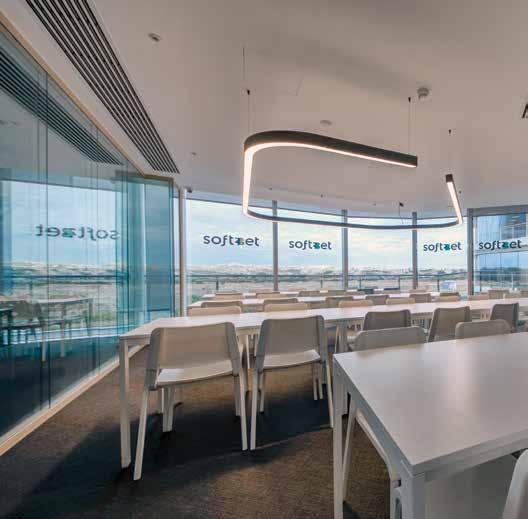
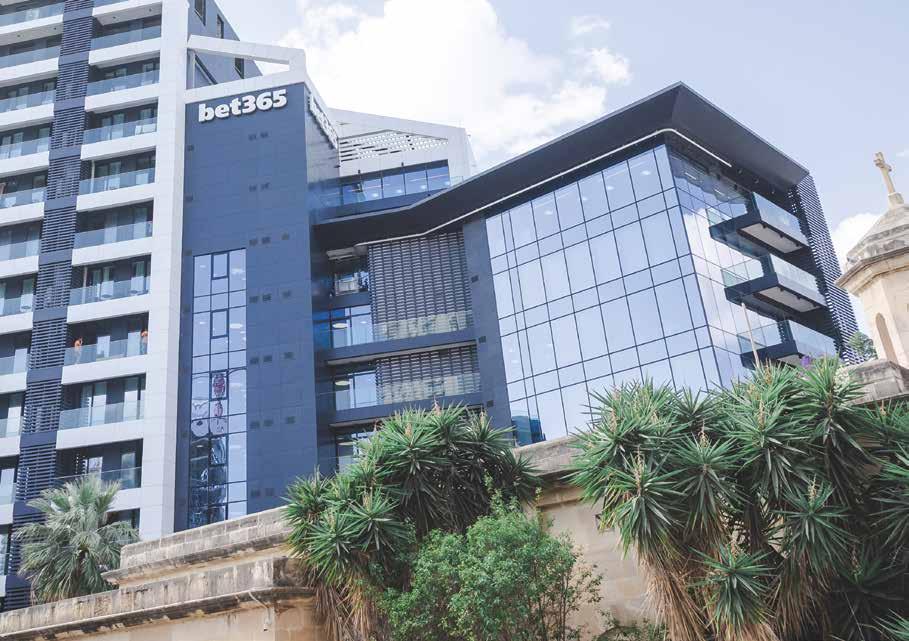
The iGaming sector has shown remarkable resilience, continuing to expand, despite challenges related to a shortage of employees, inflationary pressures and aggressive competition from other jurisdictions.
Between 2019 and 2023, the industry’s gross value added (GVA) grew by 25 per cent to stand at €1.4 billion, representing around 7 per cent of Malta’s total GVA. In 2023, for the first time, the number of licensed operators active on the B2B front eclipsed those working on B2C activities. The products and services provided by the B2B firms in Malta are in demand by both local B2C operators and foreign-regulated entities seeking the safeguards provided by a Maltese licence. Employment in the sector also saw steady growth, and 62 per cent of operators expected gaming revenue to increase in 2025. Confidence remains high, with most companies planning to expand their workforce.
Emerging trends that will shape the industry’s future include the increasing dominance of mobile gaming, with 53 per cent of player activity in Europe conducted on mobile devices. The development
of blockchain technology and the metaverse in gaming is also gaining momentum. Malta, a leader in regulating Distributed Ledger Technology for gaming, is reinforcing its reputation as a forwardthinking jurisdiction. Meanwhile, investment in virtual, augmented and mixed reality is growing, driven by the demand for more personalised gaming experiences.
On the regulatory front, Malta demonstrated its continued support for the industry by introducing a new law in mid-2023 (Article 56A of the Malta Gaming Act), which protects Malta-licensed operators from legal liability resulting from gambling activities covered under their MGA licence. This provision shields operators from foreign court judgments that may declare an activity illegal, as long as it is legal in Malta and the operator is licensed to provide it.
With deep roots in the country, strong Government backing and a robust regulatory framework, Malta’s iGaming sector is well-positioned for continued growth, ready to capitalise on the opportunities presented by the industry’s global expansion.

13,404
Source: MGA. Data corresponds to December 2023 figures.
Since Malta’s accession to the EU in 2004, the country has been a trailblazer in the online gaming space. Full access to the Single Market allowed Maltese companies to advertise and provide services throughout the EU, while freedom of movement facilitated the flow of expats to Malta to join these multinationals. Policymakers and regulators have worked to maintain the country’s reputation in the industry and have addressed concerns or tangible issues, whenever they emerged.
Malta’s legislative innovation in creating a comprehensive iGaming framework laid the foundation for the sector, but building a multi-billion-euro industry with global reach required more than just laws. Continuous investment in Malta’s communications infrastructure has enabled the country to meet the stringent requirements of this global industry, including constant real-time data updates. The common use of English, a highly skilled workforce and the streamlined process for importing talent not available locally further enhance Malta’s appeal. The industry is home to a significant expat community from across Europe and beyond, drawn by Malta’s Mediterranean lifestyle, good weather, cultural attractions, and easy access to mainland Europe.
Successive governments’ unwavering support for the iGaming sector is evident, and ongoing dialogue with the private sector has remained a critical part of the success story. This collaboration has also led to several initiatives, including specialised education programmes and continued investment in digital infrastructure.
Today, Malta boasts a mature iGaming ecosystem that includes game providers, aggregators and platform providers, along with essential support services such as data centres, IT managed services, specialised legal and accounting firms, affiliate marketers, customer support outsourcing, and search engine optimisation (SEO) agencies.
As online gaming expands rapidly in North and South America and Asia, investors and established foreign players are seeking new opportunities for collaboration. Experienced MGA-licensed firms are in high demand among local partners in these regions, driving increased merger and acquisition activity.
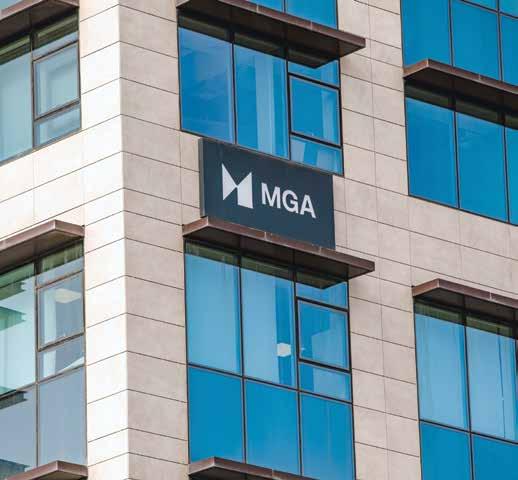
Enrico Bradamante is an experienced executive, investor and advisor with more than 12 years of iGaming industry experience. He currently serves as Chief Growth Officer at Relax Gaming, a leading content supplier and aggregator. His previous roles include Managing Director of NetEnt and Chief Commercial Officer at Aristocrat Interactive (formerly Pariplay), as well as key commercial roles at Kodak and Dell. He is also the Chairman and Founder of the industry trade association iGaming Executives Network (iGEN).
Malta has managed to retain its attractiveness as an iGaming jurisdiction despite growing competition and regulatory challenges. What’s behind its continuing success?
Malta capitalised on its first-mover advantage. By 2004 it was the first jurisdiction to properly regulate online gambling. In these last 20 years it kept building on this advantage, reaching a critical mass of talent and companies. It is the gaming hub in Europe. There is no doubt about it. There are other hubs in other localities and countries in Europe, but they are smaller hubs. Malta stands out due to its critical mass of competencies, companies and staff concentrated on the island.
Many European markets are now requiring their own national licences, resulting in the fragmentation of the B2C offering. Do you see the Maltese industry moving towards a concentration on B2B activity, or does B2C still have a place in Malta?

The continued decline in the number of territories that companies holding an MGA B2C licence can operate in is affecting its value, with the licence likely to eventually become ineffective and surplus to requirement. That is not to say that B2C operators will leave Malta. They will likely take on B2B licences and operate in other territories with the respective domestic licence from Malta..

What other benefits should an iGaming investor looking at establishing a base in Malta be aware of?
Malta’s corporate tax regime is highly favourable for companies with foreign shareholders. This structure has been instrumental in driving the growth of the gaming as well as other industries like the financial sector. However, international tax agreements will raise the current effective tax rate of 5 per cent to a minimum 15 per cent –a significant difference. Malta has secured an extension until 2029, meaning corporate taxation remains a key advantage in the interim.
Another positive is that entrepreneurs and investors looking at creating new and innovative products and experiences will find Malta to be a place where you can leverage the competencies and staff that are already on the island.
The opening up of the US market represents one of the biggest opportunities for the iGaming sector over the coming years. Are Maltese companies ready to capitalise on this opportunity?
Yes. The US today is already the largest regulated market in the world, having surpassed all other countries. However, every state is regulating the industry independently, so there is no such thing as a US licence. Companies need to develop the technology in order to meet the licensing requirements of the various regulators, establishing different tech stacks for each state. Despite these challenges, the US is a huge opportunity and several companies based in Malta have a foot in various US states, so much so that some companies are also being acquired by US firms.
Malta is the gaming hub in Europe. There is no doubt about it.

The Maltese licensing regime has been instrumental in fostering a sustainable iGaming industry. A significant part of this success is due to the Malta Gaming Authority (MGA), whose reputation as a reliable and effective regulator grants its licensees a certain degree of credibility. Securing an MGA licence requires adherence to strict standards, which positions companies as trustworthy entities in the eyes of the industry, partners and other regulators. Over the years, the local regulator raised the bar to ensure that through adequate due diligence, compliance and enforcement, it eliminates and, to a certain degree, deters, industry players that are not wanted.
Malta’s licensing process follows a robust yet pragmatic model, adaptable to the industry’s evolving needs. The regulatory framework is technology-neutral and game-neutral, with a strong focus on consumer protection. This makes it straightforward to operate a successful global business from Malta.
Two main licences are offered: one for B2C (business-toconsumer) activities and another for B2B (business-tobusiness) services. The framework also accommodates corporate group licences, reducing bureaucracy by allowing multiple companies within a group to operate under a single licence. For instance, a B2B provider supplying only to other
entities within a B2C-licensed group is not required to obtain a separate licence.
Each application undergoes a four-stage validation process, beginning with comprehensive due diligence on all parties involved to ensure business integrity. This is followed by a financial assessment, a review of statutory and operational capabilities, and a system review to verify technical compliance. Only once these four pillars are satisfied does the MGA issue a licence.
This thorough process ensures that licensees are wellprepared for real-world operations, earn the trust of their players and benefit from easier access to licences in other markets.

The MGA’s role extends well beyond licensing. Regular audits ensure ongoing compliance, with particular attention to player fund segregation and financial solvency. The Authority also monitors commercial communications to ensure alignment with socially responsible standards. Player protection is a key focus, with licensees required to offer responsible gaming tools that help players control their gambling habits, such as setting limits on time and money spent. The MGA conducts routine inspections to identify at-risk players and ensures swift intervention. Additionally, the Authority actively combats match-fixing and malicious sports betting, working closely with the Financial Intelligence Analysis Unit, Malta’s financial crime watchdog, to prevent money laundering.
These regulatory measures protect both players and the integrity of Malta’s gaming licences, benefiting operators and enhancing the country’s reputation for security and trustworthiness.
The application fee for a licence, whether B2C or B2B, is €5,000. Annual licence fees range from €3,000 to €35,000, depending on revenue. B2C licensees are also subject to a compliance contribution based on a percentage of their gaming revenue, capped at a maximum amount. The exact contribution rates vary by game type and revenue bracket, with further details available on the Malta Gaming Authority’s website (mga.org.mt).
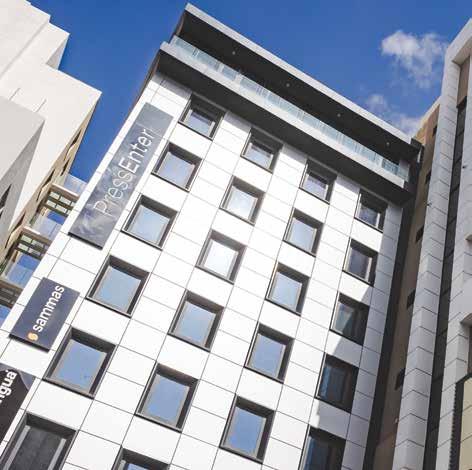
The four game types regulated by the MGA are:
Type 1
Games of chance played against the house, determined by a random number generator (eg casino games such as roulette, blackjack, baccarat, poker, lotteries, and virtual sports games).
Type 2
Games of chance based on competition outcomes, where operators manage risk by adjusting the odds offered to players (eg sports betting).
Type 3
Player-versus-player games where the operator takes a commission rather than being exposed to gaming risk (eg poker, bingo, betting exchanges).
Type 4
Controlled skill games, such as fantasy sports.

A Co-Founder of one of the first video game development companies to open in Malta, Anvil Games Studios CEO and Game Director Andrew Farrugia has brought together an international team to create the award-winning original game Holdfast.
Having launched back in 2013, you have had a frontrow seat to the changes in the local game development ecosystem over the last decade. What are some of the most impactful developments you have seen during this time?
There was an unfortunate lack of recognition and support for the digital games sector back when we kickstarted our enterprise. Combined with a lack of talent and extremely limited funding opportunities, the feat appeared impossible at the time. However, we persevered and saw our first IP – Holdfast – launch to international acclaim in 2017.
We have since seen numerous positive developments in Malta’s digital gaming ecosystem that are fostering a startup culture through direct support. Gaming Malta’s partnership with Unity is similarly strengthening the pool of available professionals and addressing the talent gap. Most of our hires are now Maltese nationals. Playcon, the local video game and esports convention, also speaks to the maturity of this sector.
Have you received support from Government and local agencies?
Support for enterprises championing innovation and creativity has been gradually increasing. Our studio has also benefited directly through schemes by Malta Enterprise and Gaming Malta. Startups developing innovative technologies are now eligible for a significantly broader range of support measures through these agencies. This injection of early capital plays an instrumental role in the conception of a vertical slice, which makes it easier to attract the financing needed to see a project through to completion.
Many businesses struggle to fill vacancies locally, with the tight job market posing a challenge to the development of industries demanding specialised skills. What has your experience been with finding the right talent?
We kickstarted the enterprise with a team of three, which brought our Holdfast IP to international success in 2017. At the time, our operations were predominantly reliant on foreign freelancers. Since then, we’ve transitioned to establishing an in-studio workforce, growing to nine locally and six offshore. Recruitment challenges have significantly diminished over the past few years, and we’ve never faced issues attracting the right talent.
You were previously situated in Basecamp, a startup incubator facility in Malta. What was your experience there like?
Throughout our two-year stay at Basecamp, we managed to establish valuable relationships with other pioneers in Malta’s digital game industry. Basecamp brought together studios that had previously worked in isolation, fostering a knowledge-sharing culture through its events.
Basecamp is a brilliant initiative for startups, offering space at a reduced cost complemented by excellent infrastructure. We have since relocated to SmartCity to accommodate our growing headcount as we embark on more ambitious projects.
What advice would you give to any video game developer or publisher considering Malta as a potential new base for their operations?
Speaking from our home-grown experience, Malta has proven to be an excellent base of operations for our studio. Developing games requires long-term investment and to maintain them as a service, retaining talent is key. The island’s environment has helped us retain offshore specialised talent, with the majority settling here permanently.
Malta’s approach has also proven to be business-centric, introducing professionals with international success to consult and empower the sector’s growth. Measures to facilitate this are on the rise, and we’re honoured to be part of it.
Basecamp is a brilliant initiative for startups, offering space at a reduced cost complemented by excellent infrastructure.

Malta’s experience in iGaming has cultivated a sophisticated and highly skilled ecosystem of workers and service providers, which is now driving the growth of other digital industries.
The video game development sector is gaining momentum in Malta, with both new and established companies regularly setting up operations on the island. These include a diverse range of studios, developers and publishers working across console, desktop and mobile games in genres such as platformers, shooters, RPGs, and more. In addition to game development, some companies are following the example of the banking, ecommerce and iGaming sectors by establishing customer and player support centres in Malta – a strategy that benefits from the country’s widespread use of English.
The industry’s rapid growth has been recognised by local educational institutions, both public and private, which are eager to collaborate with industry stakeholders. Specialised programmes have been introduced to address skill gaps, ensuring that the workforce adapts to the evolving needs of game development. The Maltese Government also offers a variety of incentives to promote innovation and attract investment in this sector. Through its economic development agency, Malta Enterprise, companies can access support for research and development, wage subsidies and financial assistance for both tangible and intangible assets.
The rise of competitive video gaming, or esports, is reshaping traditional sports models and attracting digital-first audiences, especially among younger generations. Interest in esports has surged, partly due to its impressive performance during the pandemic when most other sports events were halted. This influx of fans has continued, with global viewership now estimated at around 250 million, largely composed of Millennials and Gen Z. The esports industry was valued at over €1.8 billion in 2023 and is projected to grow by 20 per cent annually in the coming years.
Malta is leveraging synergies with its well-established events and hospitality sectors to become a hub for international esports events. One of the leading esports brands, ESL Gaming, regularly organises competitions in Malta, attracting teams of competitive video game players from around the world. These tournaments, livestreamed to millions of fans, have further cemented Malta’s position in the esports scene.
Investors are drawn to Malta’s strategic central location and its status as a premier tourist destination, offering participants and organisers unique advantages that are hard to replicate elsewhere.
Malta is actively cultivating its extended reality (XR) industry, which includes virtual, augmented and mixed reality technologies – collectively referred to as immersive tech. XR has a wide range of applications, from education to commercial ventures, and has already made significant inroads locally. In sectors like tourism and real estate, XR has enhanced user engagement, while industries such as film and manufacturing have adopted it for tasks such as performance capture and rapid prototyping. The entry of major players like Draw & Code Labs signals a new chapter in Malta’s aspirations to become a key player in this fast-growing field. As XR technologies evolve and investment increases, Malta is positioning itself as a hub for innovation in immersive tech.
The GamingMalta Foundation is an independent non-profit organisation established by the Government of Malta and the Malta Gaming Authority. It serves as the first point of contact for companies operating in the digital and remote gaming sectors. GamingMalta promotes the country as a centre of excellence in these industries and acts as a liaison between prospective investors, entrepreneurs and local authorities.
The foundation has been instrumental in enhancing Malta’s global reputation in the gaming industry, resulting in tangible benefits for both the jurisdiction and the companies operating within it. Businesses in the relevant sectors are encouraged to approach GamingMalta, where they will find a trusted advisor ready to facilitate their entry into the Maltese market.
While Malta offers a range of attractive incentives for established businesses, startups in their early stages can also benefit from initiatives like Basecamp, a tech-focused startup incubator. Located in southern Malta, Basecamp serves as a hub for high-potential startups, fostering a vibrant community of innovators and developers. Created by the GamingMalta Foundation, the 700-square-metre facility houses 10 subsidised studios equipped with high-quality office spaces. It also serves as a venue for events and business matchmaking.
Focused on emerging industries, Basecamp provides startups with more than just office space – it offers access to business workshops, networking opportunities and connections to a growing network of local and international industry professionals and investors.


With more than two decades of experience in immersive and interactive technology, and as Co-Founder and CTO of Draw & Code, John Keefe has consistently delivered innovation and growth in an emerging market. Collaborating with leading brands and technology partners, including Google, Sony, Meta, Warner Bros, and Mercedes-Benz, he has helped build one of the world’s most prolific immersive technology studios, with multiple patents granted for augmented and mixed reality applications.
You established a studio in Malta in 2021 with the intention of developing new IP in the AR and VR space. What drew you to Malta?
I visited Malta on a trade mission back in 2018, following Brexit, where I was introduced to the island and its burgeoning tech community. Having visited many other European countries, we found Malta’s infrastructure, ambitions and pro-business approach to be major advantages when choosing a European base for Draw & Code. Malta’s heritage in iGaming and esports, as well as its growth in video game development, aligns very well with the technical requirements needed for immersive technology. The fact that Malta is also a beautiful, sunny island with an incredible history where English is widely spoken made it a very easy decision.
Has the Maltese Government been supportive of your investment in Malta?
Malta Enterprise has provided grant funding to support the establishment of our R&D Lab in Malta. These grants are offered as rebates against salaries, equipment and rent that we are spending on the island. These certainly support the venture and help to establish a sustainable business on the island. Gaming Malta has also been incredibly supportive, offering opportunities to showcase our work both in Malta and beyond, providing vital exposure for our business in a new market.

Have you been able to find the right talent in Malta?
Malta’s talent pool is proportional to the scale of the island, but investment in skills through schools, colleges and university is increasing that number all the time, along with the imported talent that Malta attracts from Europe and beyond.
What is the tech scene like in Malta? How does it compare to other cities or countries?
The tech scene here feels like a proper community. For me, this is one of the most exciting aspects. The community is constantly expanding but remains positive, supportive and collaborative, largely thanks to Malta’s size – bigger isn’t always better! Local and international teams get together frequently at Malta’s many events and there are some excellent meet-ups, such as ODIN (Our Digital Immersive Nexus), that bridge communities in Malta’s creative digital economies. Having spent time in tech communities in Liverpool, London, San Francisco, Los Angeles, and beyond, I’d say Malta has a strong, vibrant and diverse community that feels more connected than most.
What advice would you give an innovation-based company considering establishing a base in Malta?
Innovation is challenging no matter where you’re based, so, for us, the question was more, “why not Malta?” Our core studio was established in Liverpool, in the north of England, which isn’t traditionally associated with innovation. Your environment plays a huge role in shaping your mindset and work, and this – as in Liverpool – is where Malta excels. We’ve taken on some incredibly complex projects over the past three years and delivered them successfully, so Malta remains part of our strategy, and I would advise others to make it part of theirs too.
Having spent time in tech communities in Liverpool, London, San Francisco, Los Angeles, and beyond, I’d say Malta has a strong, vibrant and diverse community that feels more connected than most.
With over 25 years in the tech industry and more than a decade in affiliate marketing, MediaTroopers Chief Technology Officer and independent consultant Clinton Cutajar has a proven track record of leading successful technology projects and fostering innovation. Having bootstrapped and grown several successful projects, his extensive experience and background in information security and network architecture position him as a leading expert in iGaming technology.
How is the iGaming affiliation marketing business in Malta today different to how it was in previous years?
Running an iGaming affiliate marketing business in Malta today differs significantly from previous years due to stricter regulations, heightened competition and technological shifts.
In the past, affiliate marketers operated with fewer restrictions, focusing primarily on generating traffic and conversions through simple promotional strategies. Compliance requirements were less rigorous, and many affiliates could thrive with minimal oversight.
Today, the regulatory landscape demands much greater diligence. Affiliates must adhere to strict advertising standards, ensuring transparency and ethical promotion, particularly in player protection and responsible gambling. Google adds its own challenges with frequent algorithm updates.
Additionally, competition has intensified, requiring affiliates to differentiate through advanced tools such as AI-driven analytics and mobile-optimised campaigns. Emerging trends like influencer partnerships and esports betting have reshaped affiliate strategies, necessitating targeted, innovative approaches to capture niche audiences.
Can you identify any issues in the affiliate marketing business that are crying out for a fix?
The iGaming affiliate marketing industry faces persistent challenges stemming from a lack of transparency, inadequate reporting and unreliable postbacks.
From a workforce perspective, the industry is increasingly struggling to attract skilled talent, particularly in critical areas vital to its success. Positions such as media buyers, software developers with experience in affiliation and SEO specialists focusing on specific markets have become notably challenging to fill. These roles require a combination of niche expertise, adaptability and familiarity with the unique dynamics of affiliate marketing, which limits the pool of qualified candidates.
The competition for skilled professionals has intensified as more industries adopt performance-based marketing models. Media buyers with a proven track record in cost-efficient acquisition strategies and ROI optimisation are highly sought after but scarce.

Similarly, software developers with hands-on experience in building and maintaining affiliate platforms or tools are in high demand but difficult to recruit. Meanwhile, SEO specialists capable of tailoring strategies to regional or niche markets face heightened demand, particularly in markets with strict regulations or unique cultural behaviours.
What one piece of advice would you give to an investor or entrepreneur in the iGaming industry who is considering setting up operations in Malta?
Beyond the competitive tax regime for foreign investment, financial assistance from Malta Enterprise and the robust technical infrastructure, assembling a team that thrives on collaboration, mutual respect and a shared eagerness to grow is crucial when setting up an iGaming affiliate marketing operation. Building a culture where team members work cohesively ensures smoother handling of complex tasks such as market analysis and technological innovation. A motivated, synergistic team will not only adapt quickly to the evolving regulatory environment but also drive the creativity and resilience needed to succeed in this competitive industry.
A motivated, synergistic team will not only adapt quickly to the evolving regulatory environment but also drive the creativity and resilience needed to succeed in this competitive industry.
Malta, with the largest ship registry in Europe, has evolved into a major jurisdiction for the registration of both sea vessels and aircraft. Its strategic Mediterranean position and forwardthinking regulatory environment have made it an attractive option for discerning owners. By savvily capitalising on its sovereignty over its sea and sky, and offering innovative corporate structures, robust protection for financiers and tax mitigation opportunities, the country has become a domicile of choice for many of the world’s most valuable assets.
Today, over 9,500 ships fly the Maltese flag, making its ship registry the largest in Europe and the sixth largest globally by gross tonnage. More than 1,000 of these vessels are over 24m in length. Since 2020, Malta has also been crowned the number one jurisdiction in the world for superyachts. This should come as no surprise: the island nation boasts a rich maritime history that has seamlessly transitioned into a modern, efficient registry system. The Maltese flag is globally respected and recognised for quality and safety, while the registration process is streamlined, ensuring minimal bureaucratic hurdles and allowing owners to focus on using their vessels for enjoyment or profit.
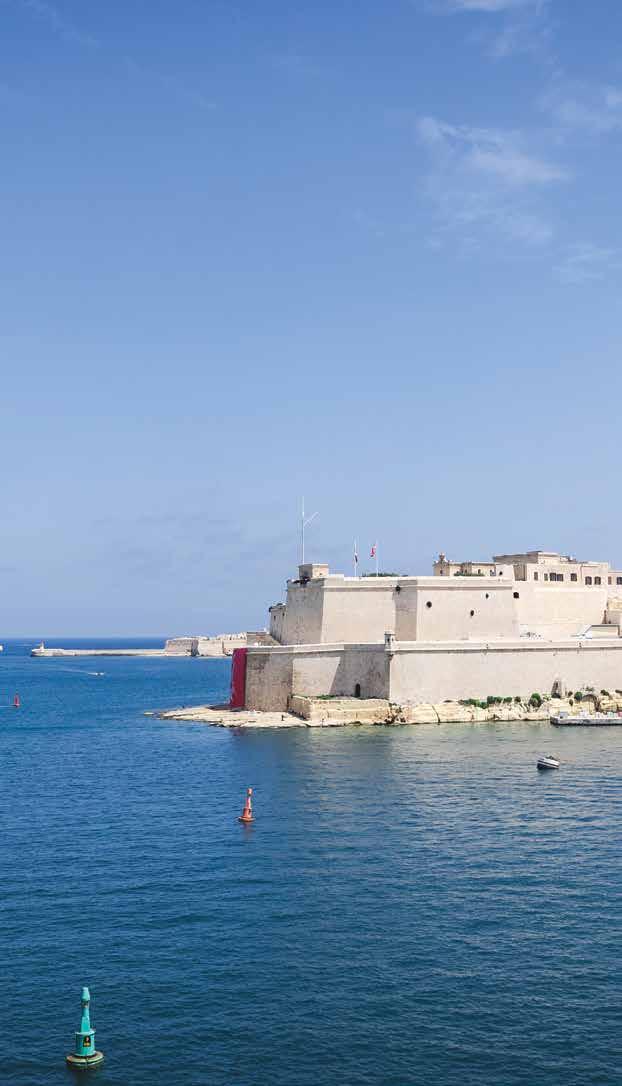
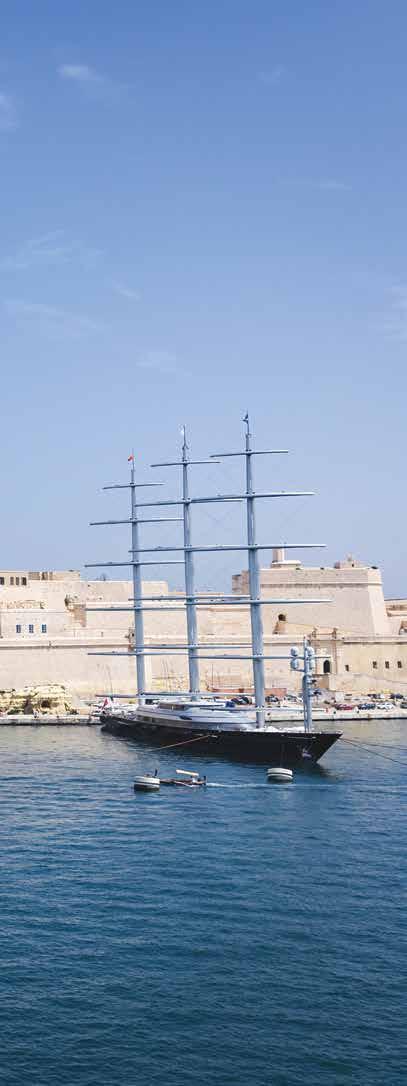
Beyond the allure of the Mediterranean, Malta’s membership in the European Union provides significant advantages. Malta adheres to the highest maritime standards, offering owners peace of mind and ensuring seamless operations within the bloc. The EU’s expansive economic zone also presents lucrative opportunities for charter operations, expanding potential revenue streams for vessel owners. Owners can benefit from reduced taxes on yacht management, crew employment and other maritime-related activities. Additionally, Malta’s tonnage tax regime provides a stable and predictable tax environment for vessel owners, fostering longterm investment. The country’s commitment to yachting is evident in its world-class marinas and wide array of support services, making Malta a respected major player in this sector.
Meanwhile, the 9H Register, as Malta’s aircraft registry is called, is the fastest-growing globally. Major airlines, charter outfits, jet leasing companies, and individual owners have registered aircraft in Malta, highlighting the country’s ability to generate interest from a wide range of sectors. The country’s tax incentives for aircraft leasing and ownership make it an attractive jurisdiction for those seeking to optimise their investment, and its strategic location has helped establish it as a convenient base for private aircraft, offering easy access to various European and North African destinations. Malta’s aviation authority maintains stringent safety standards, ensuring that aircraft bearing the Maltese flag are synonymous with reliability.
Reputation is important in any sector, and the maritime and aviation sectors are no exception. Malta’s status as a global player in mobile asset registration entails responsibilities that the country’s regulatory bodies embrace wholeheartedly, with continuous efforts to provide tangible benefits to registrants. These frameworks have evolved over the years and today provide for innovative corporate set-ups that allow for exceptional tax mitigation opportunities and a high degree of flexibility, while complying with the highest standards of European and global maritime and aviation authorities – ensuring that the Maltese flag is welcome and trusted in all ports. Other attractive features include cost-effective fee structures, responsive and experienced regulators, and the ready availability of ancillary services, making Malta a jurisdiction of choice for those seeking to domicile their most valuable assets with peace of mind.
5,500
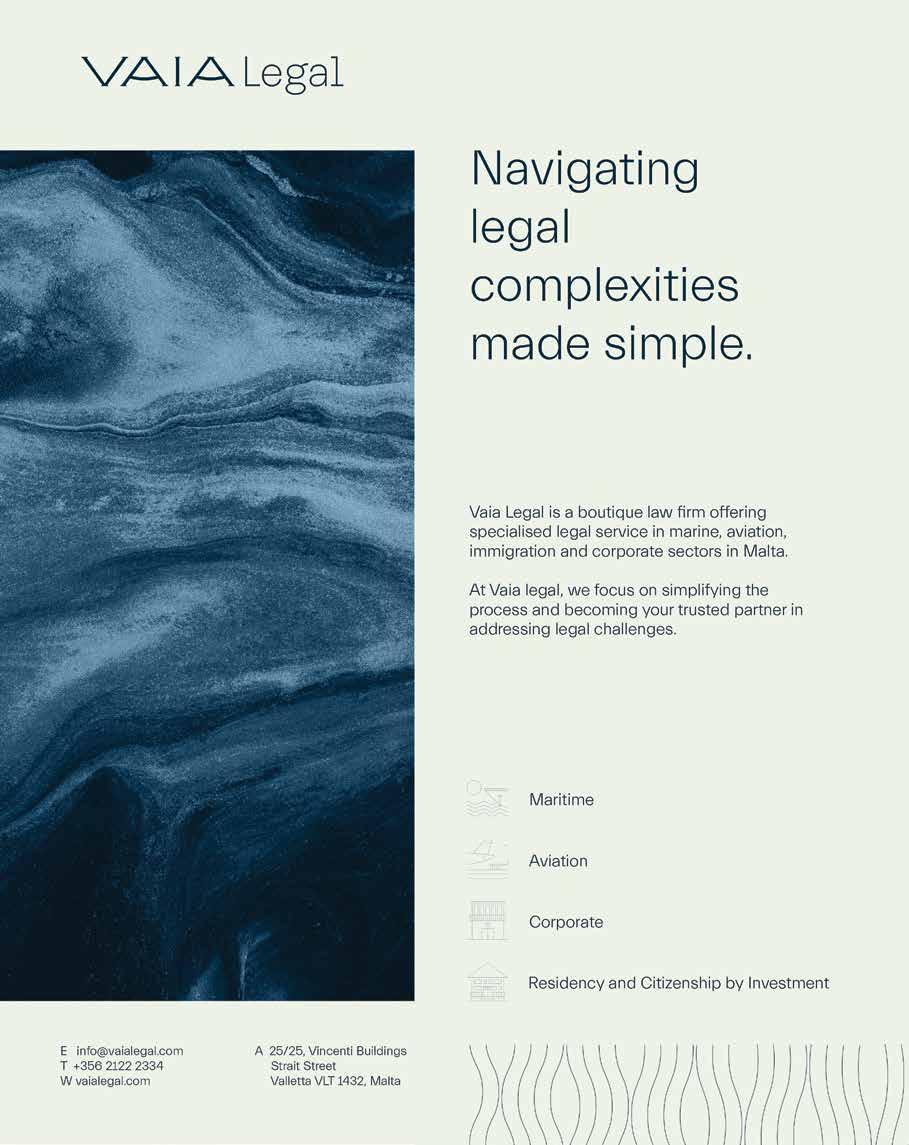
Malta’s rise as the leading ship registry in the European Union is the result of a combination of factors, including sustained efforts by both the private sector and the Government over several decades. Malta’s location at the intercontinental boundary plays a role, as does the use of English in business and everyday life. Its natural harbours, world-class port infrastructure and the calibre of service providers capable of navigating the most complex tasks –from refits to sales – have all contributed to this sustained success. Yet at the core of Malta’s attractiveness to ship owners is one of the world’s most comprehensive regulatory frameworks for vessels, a simple tonnage tax system and stringent safety requirements that make the Maltese flag trusted around the globe.
Malta’s history is a maritime one, with its fortunes closely tied to naval developments in the Mediterranean. After the departure of the last British sailors in 1979, successive governments invested heavily in the country’s maritime infrastructure, both physical and regulatory, contributing to the development of a comprehensive package of benefits and incentives that is lauded for its high standards and efficiency.
Those high standards are recognised internationally. As of 2024, the Maltese flag enjoys the highest seal of approval from the Paris and Tokyo MOI White Lists. Most recently, the jurisdiction solidified its status as a top flag of choice when it was acknowledged as a top-performing flag state by the US Coast Guard’s QUALSHIP21 initiative, leading to significant benefits for registrants, from a lower incidence of boarding inspections to insurance savings.
Those same high standards, however, come with conditions. Although registering a vessel in Malta is flexible, cost-effective and carries considerable legal, financial and operational benefits, prospective registrants should be aware that the regulator takes a proactive approach to monitoring compliance. After all, the good standing of the flag – and with it, every vessel that flies it – is on the line.
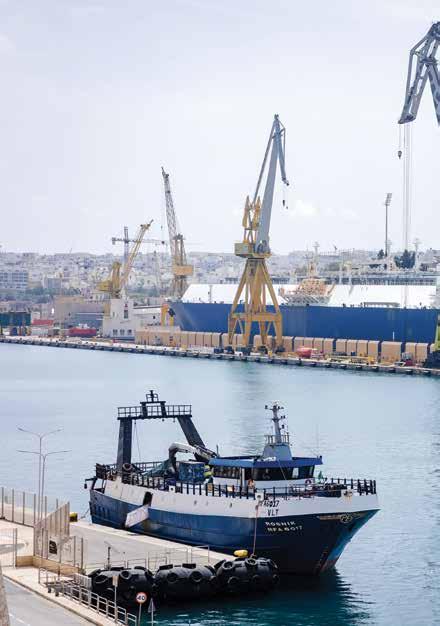
Any type of vessel can be registered in Malta, including private and commercial yachts, cruise liners, super tankers, oil rigs, barges, and vessels under construction. Malta also provides for bareboat charter registration of foreign ships, meaning that matters regarding title over the ship, mortgages and encumbrances remain the remit of the foreign registry, while the operation of the vessel falls under the jurisdiction of the Maltese registry.
There are no restrictions on the nationality of the master, officers, crew, shareholders, or directors, and vessels may be registered personally by EU citizens or through an EU-registered corporate body with owners of any nationality. Inspection requirements vary by the ship’s age, but there are no fees or hidden costs associated with inspections. Ships that have been in service for 25 years or more are typically not accepted, although this restriction may be waived in certain circumstances.
Ship owners and operators find in Malta the full range of necessary services, including ship repair and maintenance facilities, supply chain provision, crew provision, training, bunkering, technical services, certification, and more, providing support to vessels as well as to the oil and gas industry in the Mediterranean.
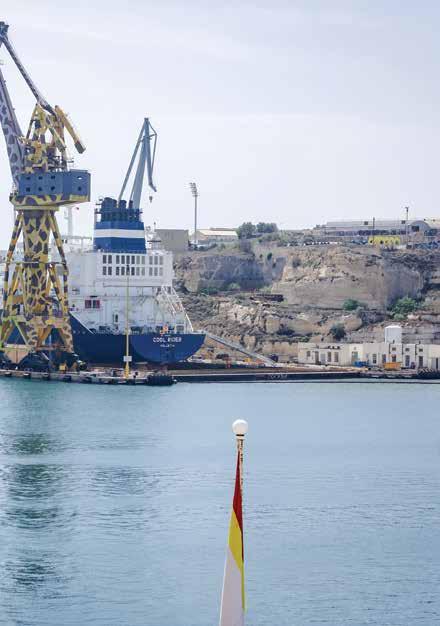
Responsibility for the Merchant Shipping Register lies with Transport Malta, an independent regulatory public agency.
The Maltese Government has signalled that it is committed to the growth and continued improvement of the registry and is working closely with private stakeholders to attract further interest while keeping abreast of the changing international regulatory landscape and ensuring that sustainability considerations are placed at the heart of the sector’s development.
Registration Fees and Taxation
Malta’s attractive tonnage tax regime does away with the traditional method of taxation in favour of a highly competitive tax on a vessel’s net tonnage (NT). As part of the Maltese registry’s efforts to maintain a modern fleet with minimal environmental impact, ships that are less than 10 years old are eligible for discounts.
The tonnage tax system is straightforward. Under this regime, revenues derived from shipping activities are exempt from Maltese income tax. Profits made from the sale of such ships, or from the sale of stock in companies owning them, are also untaxed, as are dividends paid to shareholders from shipping-related profits. The
rules become even more attractive when considering Malta’s wide network of double taxation agreements.
A company may register under the tonnage tax rules when at least 60 per cent of its fleet is flying an EU/EEA flag. However, the registry is flexible and allows considerable leeway for new registrants, which only need to have a minimum of 25 per cent of their fleet meeting this criterion – although this must gradually increase. Eligibility for non-EEA ships depends on having their commercial and strategic management based in an EU/EEA country. Most ships, such as cargo, passenger, research, and cable-laying vessels, are eligible, but fishing ships, fixed offshore installations and ships primarily used for sports and recreation are excluded.
Ships that are not registered under tonnage tax rules have their profits taxed at the standard corporate rate of 35 per cent, and shareholders receiving dividends arising from this taxed income are therefore entitled to claim a refund, limiting their tax exposure (seep.68)
Central to the tonnage tax regime’s functioning is the requirement to maintain separate ring-fenced accounts for activities that are derived from shipping activities and therefore tax-exempt, and those that are not. In cases where there is no income except that derived from shipping-related activities, the organisation can submit a simplified tax declaration instead of a regular income tax return.
Ships registered in Malta and engaged in commercial activities are generally subject to extensive VAT exemptions. Commercial yachts, for example, are exempt from VAT on supplies and maintenance, and are not obliged to charge VAT on charter revenue.
Shipping organisations and financiers of ships registered under the Maltese flag enjoy a secure environment with reliable levels of protection comparable to those found in the English Merchant Shipping Act. Constituting an executive title, mortgages are enforceable upon default, with no need for a prior court judgement. Further mortgages, transfers and deletion of vessels are conditional only on the mortgagee’s permission. Financiers can also rest assured that registered mortgages take priority over special privileges or liens that were not previously recorded on the appurtenances or accessories of a vessel, while also being attached to proceeds from insurance and indemnities for
mishaps. Since vessels are considered separate and distinct assets within the estate of their owner, any arrest or enforcement by mortgagees can proceed irrespective of any other insolvency proceedings. It is also possible to register a mortgage under a trust for the benefit of anyone to whom an obligation is due.
In 2024, Malta signed the Beijing Convention on the Judicial Sale of Ships, which brings additional clarity to an area that had at times caused costly interruptions to trade. Under the treaty, buyers of vessels at judicial auction can rest assured that their title is free from encumbrances, while sellers can negotiate better terms, as financiers benefit from increased certainty.
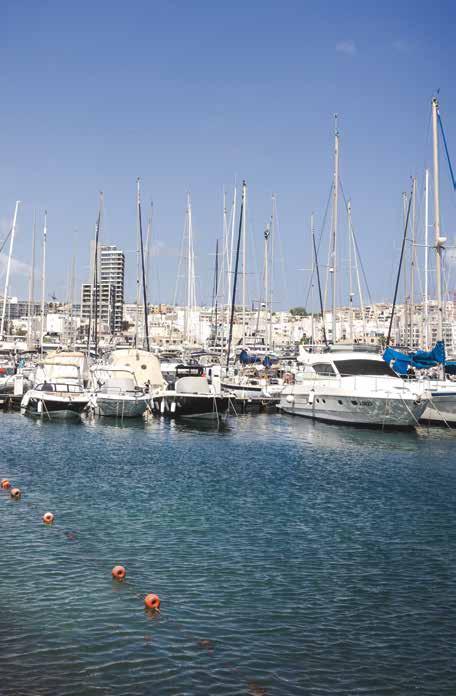
Today, Malta is an undisputed world leader in the registration of superyachts and the largest European flag, having made steady inroads in the superyacht sector by attracting some of the world’s most beautiful yachts and influential yacht owners. The number of commercial and private yachts over 24m in length registered under the Malta flag stand at 383 and 724 respectively – more than any other flag. This success is underpinned by the legal protections afforded to financiers, effective tax structuring options, a solid legal system, and streamlined importation procedures. These are complemented by the excellent marina, refit, chandlery, and agency services offered to yachts physically calling at Malta’s ports.
Malta’s maritime industry stakeholders and authorities have recognised the value that this industry brings and have taken tangible steps to support it, working hand in hand to provide a fullservice offering, with the country’s small size rendering individual relationships easier to develop and manage. Malta is now reaping the rewards as superyacht owners grow increasingly aware of the potential benefits afforded by the eight-pointed cross.
As a registry, Malta faces strong competition from other flag states that are similarly looking to attract the attention of the rapidly growing luxury vessels industry. It has therefore built on the heritage, reputation and success that the country has enjoyed for centuries as a shipping jurisdiction by developing tailor-made, professionally delivered solutions, as well as through efforts to strengthen legislative and practical frameworks to effectively service the industry and lay the groundwork for further growth. In this regard, Malta is now working on its first official superyacht policy to determine how it can remain the top proposition for superyacht owners.
Yachts can be registered for both private and commercial use, and can avail themselves of all the benefits afforded to other ships, including low registration costs and taxes, as well as free global navigation. Additionally, recent changes to the VAT treatment of pleasure yacht leasing mean that owners can establish attractive operational lease models with cash flow advantages and overall VAT optimisation. These changes lead to varying VAT rates based on where the vessel is used, with no VAT applicable on its enjoyment in non-EU or international waters unless the lessee is using it for commercial purposes.
Godwin Xerri is Chairman of the Malta Maritime Forum (MMF), which serves as a common platform bringing together Malta-based entities involved in the maritime, logistics and transport sectors. He is CEO of Focal Logistics Group and a founding member and CEO of Combined Maritime Services Ltd, a leading multidisciplinary specialist in maritime consultancy. He also currently serves as Chairman of the Worldwide Ship Agencies Association (WWSA).
Apart from registration and the benefits it offers, what can shipowners find in Malta?
The Maltese flag represents an entire sector in its own right, as vessel registration generates a wide array of activities involving numerous stakeholders. Beyond ship registration, Malta provides a comprehensive range of maritime services, including transshipment and cargo handling at its natural ports, towage services and supply vessel operations, pilotage, ship repair, as well as surveying, insurance, banking, and legal support – creating an extensive ecosystem. Shipowners can also benefit from Malta’s favourable fiscal regimes to engage in additional activities, such as ship management and crew services.
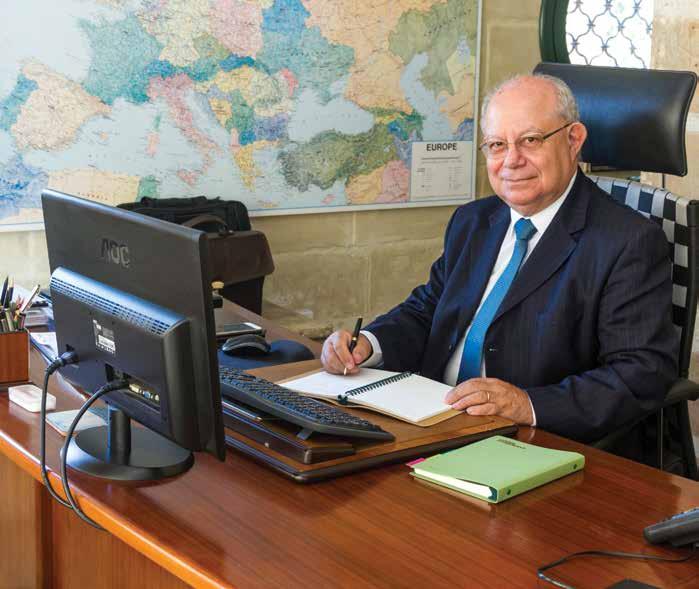
What do foreign shipowners think of the way maritime cases are handled in Malta?
Malta’s legislative system has a very strong reputation in international shipping circles. This is mainly due to the robustness of its laws, such as the Merchant Shipping Act, and the expediency with which our courts handle maritime cases. Malta is fortunate to have judges who understand the nature of the maritime industry, where expediency is the guiding light. This is evidenced by the volume of judicial sales and enforcement of mortgages that are effected in Malta, reflecting the confidence shipowners and financiers have in our courts. The recent announcement regarding the establishment of a Commercial Court with jurisdiction over maritime cases will give additional clout to Malta’s maritime judicial system.
What are the major challenges facing the maritime sector over the coming years, and what is Malta doing to prepare itself to meet them?
The maritime industry, both locally and regionally, is facing a combination of unfavourable conditions that present serious challenges for operators and those reliant on the connectivity that shipping provides.
There are regulatory issues, mainly emanating from the EU, which is promulgating directives that create an unfair competitive environment for small peripheral members states like Malta and Cyprus. These new regulations apply to EU states but apply differently, or not at all, to nearby ports or jurisdictions outside the EU, where business may instead be diverted. Other challenges arise from international political, diplomatic and military factors, such as the war in the Middle East and the Houthi attacks, which are diverting vessel traffic away from the Mediterranean.
The twin transitions of digitalisation and decarbonisation are also posing serious challenges. While the maritime industry is committed to achieving carbon neutrality, technology is struggling to keep up with the industry’s needs, particularly regarding new fuels, creating an uncertainty that is not conducive to investment.
Malta is fortunate to have judges who understand the nature of the maritime industry, where expediency is the guiding light.
BizAv Services is a leading aviation consultancy firm, providing dedicated support to the aviation industry since 2008. Philip Apap Bologna, a Co-Founder and Director at the firm, has been involved in the civil aviation industry for over 35 years, with experience in various roles including as a pilot and trainer, as well as in management positions.
Malta has emerged as the fastest-growing aircraft registry in Europe. What are the reasons behind this development?
Malta’s geographical location and history have played an important part in the development of the country’s trade and service industries over the years. Malta enjoys a culture that welcomes diversity and adapts well to change and opportunity. British rule in Malta coincided with the development of global commerce and the emergence of aviation as a new global industry. Maltese commercial law and aviation standards were originally based on the requirements of the British system, which was the leading jurisdiction at the time. Today, Malta is a member of the EU and the European Aviation Safety Agency (EASA), offering the world’s highest and most modern aviation standards.
Malta’s Civil Aviation Directorate plays an important role in actively supporting the local aviation sector’s growth by providing robust oversight combined with a proactive and business-friendly approach to investors. It is this combination of advantageous factors that makes Malta the preferred home for aviation-related commercial activities.
Malta is fortunate to have a Civil Aviation Authority staffed with industry professionals who come from operational backgrounds, bringing handson experience and a deep understanding of the issues airlines face on a daily basis.
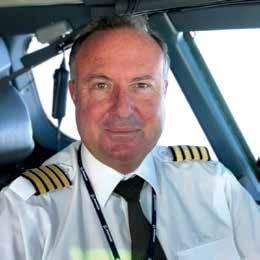
BizAv provides a full spectrum of services in the aviation sector, including safety and operational consultancy, management training and recruitment. Why do foreign airlines come to Malta to obtain these services?
The biggest challenge Malta faced when it first ventured into the aviation world was the natural isolation of the island, dependent on limited air connections and the inadequate video conferencing technology of the time. This changed with the introduction of low air fares and new routes from Malta to regional airports across Europe, along with significant advances in synchronous video conferencing technology.
Thanks to this increased connectivity, BizAv was able to adapt and deliver services to customers in Malta and worldwide, without the need for our clients to physically come to Malta. This ease of connectivity, together with the high standard and quality of our services, is one reason why our clients see good value in what we offer.
In your conversations with foreign airlines and operators, what do they find most surprising – positively or negatively – about Malta?
On the positive side, airlines and operators established in Malta appreciate the genuine hospitality, personal attention and flexibility when dealing with issues that can be easily resolved. On the negative side, Malta has not been able to effectively find solutions to overcome the challenges arising from its physical isolation as an island. Additionally, there is an ongoing shortage of qualified aviation personnel needed for the management and operation of aviation entities.
How do Malta’s Government and authorities support the aviation sector?
Malta is fortunate to have a Civil Aviation Authority staffed with industry professionals who come from operational backgrounds, bringing hands-on experience and a deep understanding of the issues airlines face on a daily basis. This understanding and appreciation of the challenges that airlines and other aviation entities face are key to fostering successful relationships between the authorities and operators, in order to achieve the highest safety standards expected by the industry. In this regard, Malta’s Civil Aviation Directorate has proven to be a strong and reliable partner, supporting international investors who choose to base their operations in Malta.
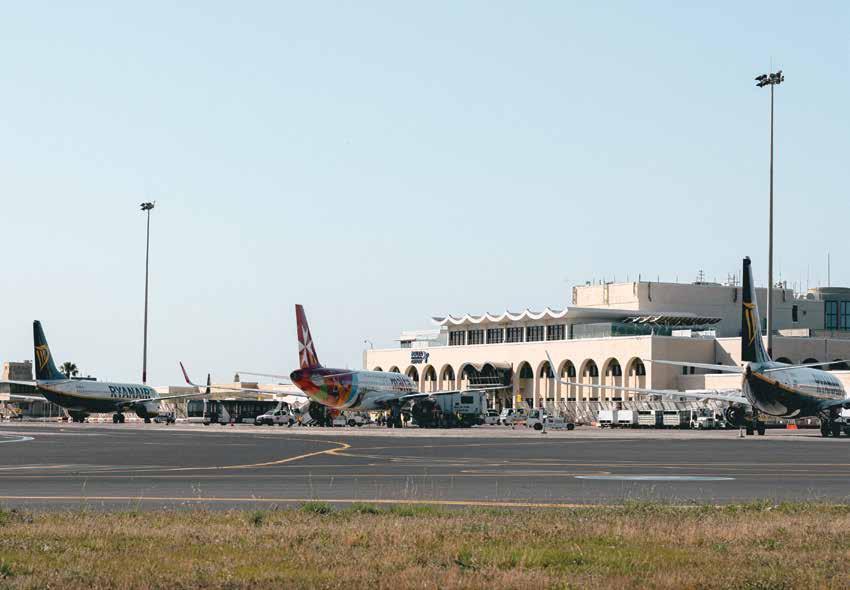
Over the last 15 years, the number of aircraft registered in Malta has grown tenfold as the country has gradually gained a reputation as one of the go-to jurisdictions for the domiciliation of these valuable assets. Europe’s biggest airlines – Lufthansa and Ryanair – have not only registered dozens of their aircraft on Malta’s 9H Register, but they have also established major maintenance, repair and overhaul (MRO) facilities on the island, reflecting their commitment through substantial investments. In 2024, they were joined by easyJet, which took over one of Malta’s largest MRO operations. Apart from commercial liners, private jet charter operators like VistaJet and AirX, as well as several wet-lease companies, have also found Malta to be a welcoming home for both their aircraft and operations.
So why have some of the largest European players in the aviation sector chosen this small island on the edge of Europe to domicile their aircraft?
The answer lies in Malta’s successful application of a tried-and-tested formula to cultivate niche sectors: a mix of bold incentives, a tough but flexible regulatory framework, and an openness to dialogue resulting in bespoke solutions. Supporting the smooth functioning of the industry are various ancillary services, including pilot and crew training schools, repair and maintenance facilities, refitting operations, and insurance, brokerage, surveying, and back-office set-ups.
The result is a package proposition that is tough to beat. Aircraft on the 9H Register can circulate freely around Europe and can be based and operated anywhere in the world. Aircraft registered in Malta can also take advantage of several specialised incentives, including an accelerated depreciation rate. Fractional ownership of aircraft is also possible, allowing co-owners, financed by separate creditors, to specify their individual stakes, and aircraft under construction or not in service are also accepted on the register.
Financiers also find Malta attractive, as the country’s ratification of the Cape Town Convention assures creditors that their interests are secure and allows for lower borrowing costs. As with ships, aircraft can be registered as security for debt, and such mortgages are not affected by the aircraft owner’s insolvency. There are no restrictions on the nationality of shareholders and directors of Maltese aviation companies, which can employ strategies to mitigate their tax exposure. In fact, Malta’s attractive corporate taxation regime, whereby shareholders may benefit from an effective tax rate of 5 per cent or even less (see p. 68), is particularly compelling for aviation stakeholders, with ownership, lease and operational (including charter) income on the international transport of goods and passengers being exempt from Maltese tax unless such income is remitted to Malta. There is no withholding tax on lease income and interest payments to non-residents, and aircraft are not subject to stamp duty and no duty is charged when importing civil aircraft into Malta.
Fleet operators will be especially pleased to know that Malta’s extensive network of double taxation treaties (see p. 254) eliminates complex accounting processes, with income from the international operation of aircraft being taxable only in the country where the effective management of the company is situated. Additionally, employees incur income tax only in their respective country of employment – an attractive payroll-simplifying prospect for commercial airlines with a multinational workforce – while companies with private jets do not need to include their use by employees as a taxable fringe benefit.
Local authorities’ supportive stance towards foreign investment is also reflected in the active support provided by the Civil Aviation Authority within Transport Malta, which stands ready to contribute to a smooth registration process with its practical understanding of the sector. With regards to safety – a paramount concern – operators, passengers and lessees alike can rest assured that Malta-registered aircraft are subject to the most comprehensive safety regulations, overseen by the European Aviation Safety Agency, the body responsible for ensuring safety and environmental protection in air transport in Europe.
As the central location for aviation activities in the Maltese Islands, Malta International Airport is currently undergoing active expansion to better cater to the needs of the burgeoning industry, while preparations are underway to build a small airfield in Gozo for private and general aviation activities. Adjacent to the main airport is the Safi Aviation Park, operated by the state industrial parks company INDIS, which offers secure airside facilities in full compliance with applicable standards and hosts many of the leading entities operating in the Maltese aviation sector.
With the number of aircraft registered in Malta continuing to increase, the sector presents abundant opportunities for serious investors ready to play a role in the development of Malta as an aviation hub.

Private aircraft
Citizens of or undertakings established in an OECD country and any other country approved by the Minister (‘International Registrant’), provided that they have the legal capacity to own or operate an aircraft, appoint a local resident agent to represent the owner for matters concerning the registration and comply with the applicable regulations.
Commercial aircraft
Maltese, EU, EEA or Swiss citizens with a residence or business in these jurisdictions can register commercial aircraft, which may be co-owned.
Undertakings formed and having their registered office, central administration and principal place of business within Malta, the EU, the EEA, or Switzerland, which are at least 50 per cent owned by the governments of these countries or by persons referred to above, whether directly or indirectly through one or more intermediate undertakings.
All operators of aircraft engaged in commercial air transport require an Air Operator Certificate (AOC) and an Operating Licence granted by Malta’s Civil Aviation Directorate.
Aircraft can be registered in any one of the following capacities:
By an owner operating an aircraft
By an owner of an aircraft under construction or currently inactive
By an operator of an aircraft under a temporary title
By a buyer of an aircraft under a conditional sale or title reservation
By a trustee for the benefit of beneficiaries
With over 20 years of experience in the aviation industry, Daniel Galea has taken on a variety of roles, starting as an apprentice and rising through the ranks to now lead easyJet Engineering Malta as its Managing Director.
easyJet Engineering is, in some respects, a recent arrival to Malta, having completed the acquisition of the SR Technics Malta operation in 2024. Having served at the helm of the company both before and after the transaction, can you share why easyJet felt that the investment was the right move?
easyJet’s acquisition of the facility allowed it to complement and strengthen its in-house capabilities. Having been the launch customer of SR Technics Malta when the company started operations in 2009, the relationship between the facility and easyJet developed and grew stronger over time. They understood our capabilities, our people and the high level of quality work delivered at the facility.
How has Malta’s rising popularity as a jurisdiction for the registration of aircraft changed the local aviation services sector?
The success of the aviation industry in Malta is based on multiple factors, with the growth of the aircraft registry highlighting the strength of the industry as a whole. The sterling work carried out by the authorities, primarily the Civil Aviation Directorate within Transport Malta, as well as other players within the industry, has completely transformed the aviation landscape. Multiple opportunities have been created for people who want to join the aviation sector. These include roles in organisations like Continuing Airworthiness Management Organisations (CAMO) to support the growing number of Air Operating Certificates (AOC), Line Maintenance Part145 approvals and Design Organisations Part-21.
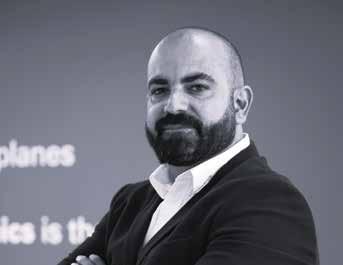
The growth of Malta’s aircraft registry has also created opportunities in other aviation sectors that were not previously present on the island, opening doors for operators, service providers and investors.
Can you identify any major market gaps in Malta’s aviation service offering?
In the future, it will be important to attract more research and development organisations to continue supporting the development of the ecosystem.
Does the local labour market satisfy the demand for skilled labour?
While we have the resources we need to run our operations, easyJet is a growing airline. That creates opportunities for new jobs, so we would absolutely welcome a greater focus locally on further developing Malta’s skills pipeline in engineering.
If you had to share one piece of advice with a foreign aviation-related firm looking at the possibility of setting up in Malta, what would it be?
Malta offers several advantages, such as very attractive fiscal benefits, a strong legislative framework, a safe and politically stable country, a high-quality workforce, and a proactive Civil Aviation Directorate that is always there to support and help. My advice to any investor considering Malta is to spend time here to understand the culture and to integrate with other players in the aviation cluster and the broader business community. This is a small country and building a strong network is key.
The growth of Malta’s aircraft registry has also created opportunities in other aviation sectors that were not previously present on the island, opening doors for operators, service providers and investors.
Dr Katrina Abela heads Vaia Legal, a boutique law firm offering specialised legal services in the maritime, aviation and corporate fields in Malta. She has extensive experience in yacht and aircraft sale and purchase transactions, ownership structures, customs importations, and registration.
What are vessel and aircraft owners looking for in a jurisdiction to register their mobile assets?
We generally find that our clients are primarily concerned with the complexity of the documents they need to provide, the language used by the jurisdiction and the extent to which their individual rights can be enforced. There is also a growing focus on safety regulations and the jurisdiction’s reputation for upholding safety standards.
What should superyacht owners considering Malta keep in mind?
Registrants should understand that Malta is an autonomous jurisdiction and does not form part of any other registry. We often encounter clients comparing the Maltese registration process to that of other countries, when in fact, Malta has studied and improved the procedures, laws and regulations of other jurisdictions. This has resulted in a system unique to Malta. It is therefore essential that clients view Malta as a standalone jurisdiction with certain similarities to other registries, rather than as one that is identical to those they may already be familiar with.
Are there any particular challenges facing Malta as a ship and aircraft registry? How is it meeting these challenges?
I believe the main challenge stems from the success of both registries. As a result, it is crucial to maintain adequate support in the respective departments in terms of human resources, while staying abreast of current trends and technologies.
In 2020, Malta introduced legislation for Mobile Assets Protected Cell Companies (MAPCC). In your experience, have you seen interest in such structures? What do ship owners gain by utilising MAPCCs?
MAPCCs have been highly successful, and their use has clearly increased since they were first introduced in 2020. Vessel owners tend to opt for MAPCCs as they benefit from the segregation of different pools of their assets and liabilities within a single entity. This ensures that the assets and liabilities of each individual cell are distinct from the core cell company. MAPCCs are also frequently utilised for aircraft fleets.
How satisfied would you say clients who choose Malta to register their vessel are with their choice?
Our firm specialises in the yachting industry, where transactions tend to move at a fast pace. Clients who choose to register their vessels in Malta are generally very satisfied and we see a high volume of returning clients and referrals. The Maltese flag is the largest in the EU and is internationally recognised and respected, which facilitates inspections and other technical processes. The registry itself is fairly efficient and provides a 24hr service to its clients. The Merchant Shipping Act also provides a comprehensive and secure registration framework, supported by effective corporate structures that meet the needs of our clients.

Clients who choose to register their vessels in Malta are generally very satisfied and we see a high volume of returning clients and referrals.

Anyone registering a ship or aircraft in Malta can utilise the country’s novel cell company framework to segregate and protect these assets from claims by creditors. Malta is the only country in Europe to provide for such set-ups, known as Mobile Assets Protected Cell Companies (MAPCC).
Taking inspiration from cell company structures used in the insurance and securitisation fields (seep.149), the MAPCC structure provides additional safeguards while offering cost-efficient benefits – namely the possibility for different cells to use a single operative licence. Cells are also much easier to open and close than entire companies. The cell company retains single legal personhood, although each individual cell needs to be registered with the Registry of Companies under a distinct name.
If the company directors maintain a clear, constant and easily distinguishable separation between all the differently designated assets, MAPCC structures can issue shares and pay out dividends for any of their cells without taking into consideration the financial position of any other cell within the company or of the company’s core (non-cellular) assets.

Tourism has long been the backbone of Malta’s economy, retaining its prominence even as the country has diversified into other thriving sectors. The industry continues to experience unprecedented growth, with 2024 projected to be a recordbreaking year, attracting over 3.5 million tourists. Employing nearly 25,000 people and generating billions in annual revenue, tourism drives investments across complementary industries such as gastronomy, retail, culture, and real estate. In 2024, tourists are forecast to spend over €3 billion in Malta, following a remarkable 2023 that surpassed pre-pandemic records and defied expectations of a slow recovery.
Malta’s tourism appeal is undeniably multifaceted. While its sunny climate and beaches remain major attractions, the islands have successfully positioned themselves as a year-round destination, thanks to a unique combination of history, culture and modern experiences. Visitors are drawn to historic landmarks, world-class cultural events and unparalleled diving opportunities, including underwater wrecks that showcase Malta’s rich maritime heritage. For those seeking luxury, Malta offers high-end accommodations and a flourishing fine-dining scene that celebrates local and international gastronomy.
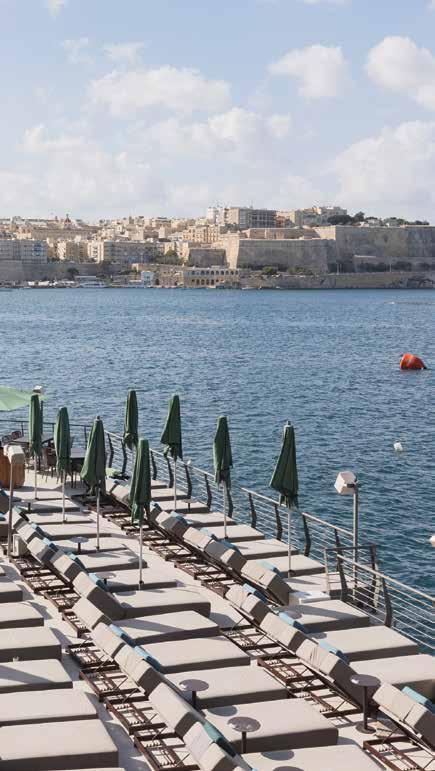
The extensive revitalisation of Valletta and the Three Cities over the past decade has restored sophistication to these historic areas, reminiscent of their golden age under the Knights Hospitaller. In Mdina, often referred to as the Silent City, visitors can dine, explore and stay in elegant ancestral homes belonging to Malta’s noble families. Many historic palazzos have been transformed into boutique hospitality venues, while an exclusive selection of Michelin-recognised restaurants caters to discerning tastes.
For a cosmopolitan experience, areas like Sliema and St Julian’s offer a vibrant mix of designer shopping, bustling
nightlife and Mediterranean charm. These North Harbour districts attract both tourists and global hotel brands, including the Hyatt Regency, Meliá and Barceló, all of which have entered the Maltese market in recent years.
Investors in all kinds of tourism-related activities will therefore find plenty of opportunities in Malta, with the number of arrivals and total spend on an upward trajectory. The country’s vision for the tourism sector focuses on diversifying the experiences on offer through the development of new economic niches, such as sports and religious tourism, and the introduction of new retail and gastronomic brands. Another key focus is quality, with both the public and private sectors investing in upgrades to the tourism product to attract higher-spending visitors. Key to this endeavour is the Malta Tourism Authority’s (MTA) Visit Malta campaign, which works alongside private operators to promote the country as a tourism destination in key markets around the globe.
With 98 per cent of visitors arriving by air, connectivity is a crucial factor in Malta’s tourism growth – and a key constraint. Malta International Airport serves as the nation’s gateway, offering direct flights to around 100 destinations through both flag carriers and low-cost airlines. Ryanair has played a significant role in increasing visitor numbers, alongside the recent transition from Air Malta to KM Malta Airlines in 2024. The newly established national airline, while still state-owned, is set to sell a third of its shareholding to private investors as part of an agreement with the European Commission.
Malta’s blend of historical allure, modern sophistication and robust air connectivity to Europe and the Middle East has cemented its reputation as both a leisure destination and a hub for tourismrelated entrepreneurship. The growing number of conferences and expos hosted on the island underscores its appeal for event organisers. With ongoing investments in infrastructure, cultural initiatives and sustainability – coupled with efforts by the private sector to enhance the tourism product and attract higherspending visitors – Malta is poised for a bright future. The country continues to skilfully blend its rich heritage with contemporary innovation, solidifying its status as a sought-after destination.
25%
of arrivals in any given year are returning visitors Around
The average tourist spends
7 nights in Malta
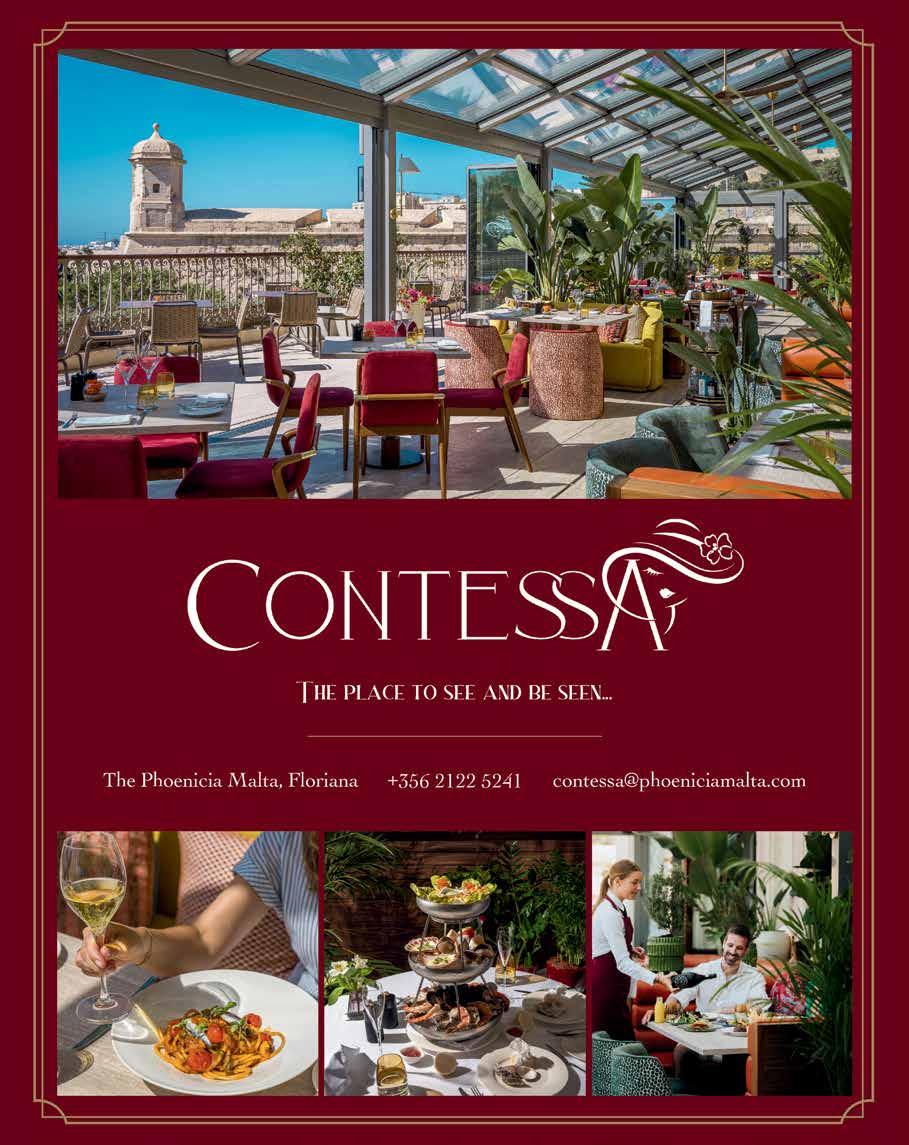

Malta’s compact size belies its wealth of attractions, offering visitors a multitude of activities and experiences that leave many eager to return.
Around a quarter of tourists each year are repeat visitors, having realised during previous trips how much remains to be discovered. The sentiment is common among visitors and residents alike, who uncover new reasons to be entranced by the country year after year.
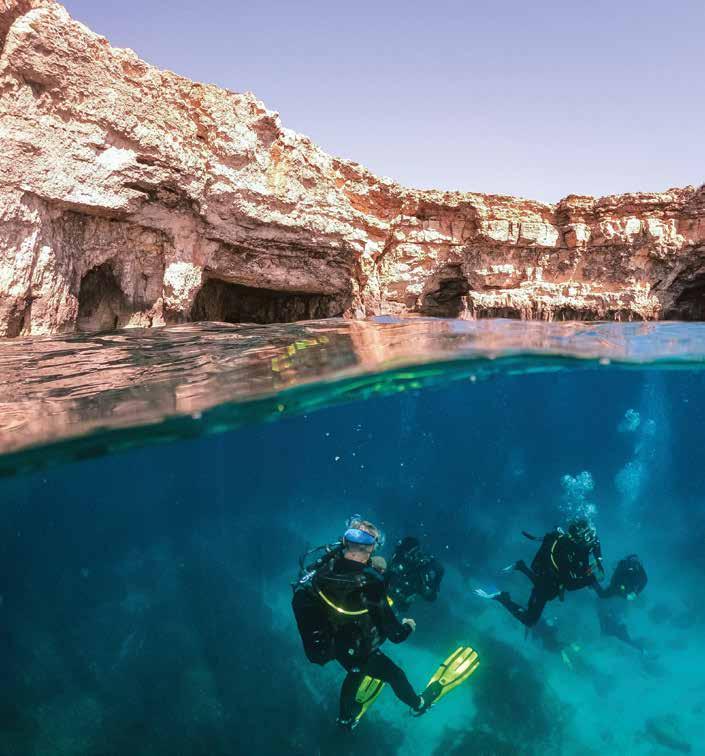
Renowned for their alluring combination of sun and sea, Malta, Gozo and Comino feature beaches ranging from bustling, amenity-filled spots to secluded havens, many boasting Blue Flag status. Divers are drawn to the waters surrounding the islands, which have gained an international reputation as a “wreck diver’s paradise”, with over 60 shipwreck sites, including World War II destroyers and oil tankers, hosting rich marine life. A landmark addition in 2023 was a deepwater archaeological diving site off Gozo, offering a unique glimpse into ancient maritime history.
Tourists are also captivated by Malta’s UNESCO-listed Megalithic Temples, among the oldest freestanding structures in the world, predating Stonehenge. Precisely calibrated to the movement of the skies, these temples are architectural marvels that have captured the imagination of all who gaze upon them. Beyond these temples, Malta’s rich heritage is on full display
throughout the country, with prehistoric cart ruts, cave dwellings and Roman roads adding to the islands’ open-air museum feel. The legacy of the Knights of St John stands out, with their intimidating fortifications shaping the very landscape and presenting an unmissable sight.
Malta’s living heritage comes alive in the vibrant village feasts held throughout summer, where sacred and secular traditions intermingle. Fireworks light up the skies, and town squares transform into social hubs filled with food, drink and festivities, embodying Malta’s communal spirit.
Malta’s compact size allows tourists to experience all these diverse attractions while based at a single hotel. Five-, four- and three-star accommodations are complemented by boutique hotels, often nestled in gorgeous historical settings, along with a wide array of Airbnbs. Those seeking high-quality lodgings have a plethora of options, with renowned brands such as Hilton, Westin, InterContinental, Marriott, Hyatt, Kempinski, Meliá, Barceló, Corinthia, and Relais et Châteaux present across the islands. In 2024, the opening of Cugó Gran Vittoriosa in a historic palace added another luxury accommodation option near the existing Cugó Gran Macina, housed within Malta’s awe-inspiring bastions.
The retail offering has also seen major developments in recent years, as more international brands enter the market and broaden the products and services available to the millions of tourists visiting the islands. Recent additions to Malta’s food scene include the French high-end confectionery Ladurée, the Italian
artisanal gelato maker GROM and new establishments like Toro Toro and Mamachi, featuring contemporary fusion cuisine, while the renowned French brand Paul Le Café is set to open at Malta International Airport over the coming months.
In 2024, two major retail developments opened their doors to the public. Mercury in St Julian’s and The Shoreline at SmartCity have significantly expanded the island’s commercial space, offering new experiences for shoppers and thrill-seekers alike. Mercury features an entire go-kart track, while The Shoreline boasts indoor climbing facilities.
These trends underscore Malta’s direction as it strives to cater to modern, cosmopolitan tastes. Foreign investors will find that projects aligned with the country’s vision are warmly welcomed on the island.
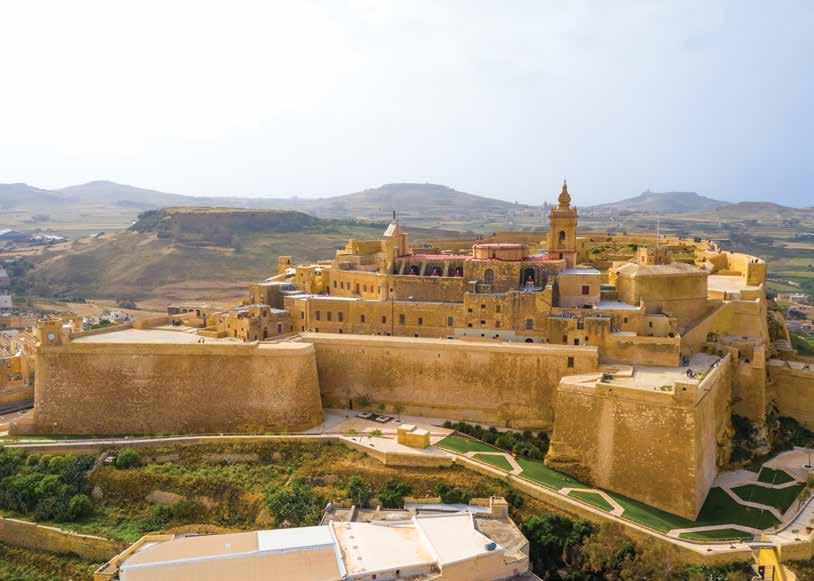

Clint Camilleri – an architect by profession – has been overseeing Gozo’s tourism, cultural and business strategy as Minister for Gozo for the past four years. In 2024, the country’s Planning Authority was also placed under his remit.
In recent years, there has been more awareness of the need to transition from a quantity-driven to a qualityfocused tourism product. In what way could such a shift for Malta and Gozo’s tourism sector open further investment opportunities?
The distinction between quantity and quality isn’t always straightforward, as the two concepts can often overlap. In the case of Gozo, I believe quality goes beyond just ‘expenditure per capita’. Our vision for Gozo is to offer an immersive experience where tourists discover local products, engage with our rich cultural heritage and connect with the locals to experience our way of life. By highlighting this experiential side, we encourage longer stays and promote the type of sustainable tourism that benefits both visitors and the local community.
We are also driven to attract higher-spending visitors seeking premium, high-standard experiences. Investors who provide upscale, unique accommodation experiences will find fertile ground for growth in Gozo. The global demand for wellness experiences is growing, and Gozo’s tranquil natural environment positions it as the perfect destination for wellness resorts, yoga retreats and spa facilities.
The MTA’s Malta Tourism Strategy 2021-2030 calls for Gozo to be established as a “distinct tourism destination” focusing on “relaxation, wellness, gastronomy, active and rural tourism experiences in a lower volume setting.” Why is this a priority and how can it be achieved?
Establishing Gozo as a distinct tourism destination is a priority because it leverages the island’s unique qualities that set it apart from mainland Malta. Gozo’s slower pace, unspoiled natural
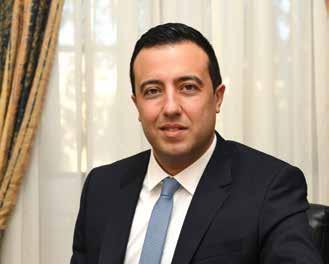
beauty and deep-rooted agricultural traditions make it the ideal place for visitors seeking relaxation and authenticity, a combination that is increasingly sought after in global tourism. To achieve this, we are focusing on promoting Gozo’s core offerings – wellness, gastronomy and rural tourism – through targeted marketing campaigns. Investing in eco-friendly transportation, high-quality accommodations, and accessible tourist facilities, while preserving Gozo’s natural environment, is another critical aspect of this vision.
What is your vision for Gozo’s tourism sector in the years to come?
Our vision for Gozo’s tourism sector is to strike a balance between sustainable growth and preserving the island’s unique charm. We see Gozo becoming a premier destination for eco-conscious travellers, where relaxation, wellness and active tourism seamlessly coexist with our rich cultural heritage and natural beauty. We, together with all stakeholders, will continue investing in eco-friendly infrastructure while encouraging businesses to adopt sustainable practices, with the aim of positioning Gozo as a model for green tourism in the Mediterranean. Tourism should benefit the Gozitan community by creating jobs, supporting local businesses and contributing to the island’s economic prosperity – all while respecting our way of life and protecting the environment. Our long-term goal, and we firmly believe we are achieving this, is to establish Gozo as a year-round destination, not just a summer getaway. By promoting off-season travel through wellness retreats, cultural events and rural tourism, we can create a more stable and sustainable tourism economy that spreads its benefits throughout the entire year. Through these initiatives, I am confident that Gozo can flourish as a distinct and sustainable destination, offering both locals and visitors an authentic and enriching experience. Finally, the sports tourism segment has tremendous growth potential in the near future, particularly with the investment in the Gozo Indoor Sports and Aquatic Pavilion – a state-of-the-art complex designed to accommodate a variety of sports disciplines.
Investors who provide upscale, unique accommodation experiences will find fertile ground for growth in Gozo.
Malta’s event calendar presents a vibrant mix of music, cultural and other events. Drawing on the islands’ central location and excellent air connectivity, these events attract both local and international audiences. Major highlights include Isle of MTV, Europe’s largest free music festival, which transforms Floriana’s Granaries into a buzzing concert venue showcasing top-tier and emerging artists. British and Italian organisers have also capitalised on Malta’s appeal, hosting destination festivals that feature star performers and attract thousands of attendees annually, cementing the islands’ reputation as a premier festival hotspot.
Amid the activities drawing youthful clubbers and music enthusiasts, visitors can also enjoy events with a distinct cultural dimension. The Malta Jazz Festival, for example, is renowned for its stellar lineup of global talent, and stands as one of Europe’s foremost jazz events. For classical music fans, the Valletta Baroque Festival provides a refined experience with performances in historic venues. Additionally, local favourites like Valletta’s Notte Bianca and the Birgu Fest illuminate the charm of these historic cities, allowing attendees to experience their beauty under the soft glow of creative and candlelit lighting.
Expos and conferences play a pivotal role in diversifying Malta’s tourism sector, attracting thousands of professionals annually across industries such as iGaming,
medicinal cannabis, aviation, and maritime. These events are hosted in welcoming conference venues and supported by innovative local suppliers and event planners skilled in handling complex logistics. Beyond the professional agenda, many expos feature off-site activities, blending business with leisure by offering cultural tours, club nights and iconic boat parties that showcase Malta’s rich entertainment offerings. Together, these festivals and conferences reinforce Malta’s status as a dynamic, multifaceted destination.

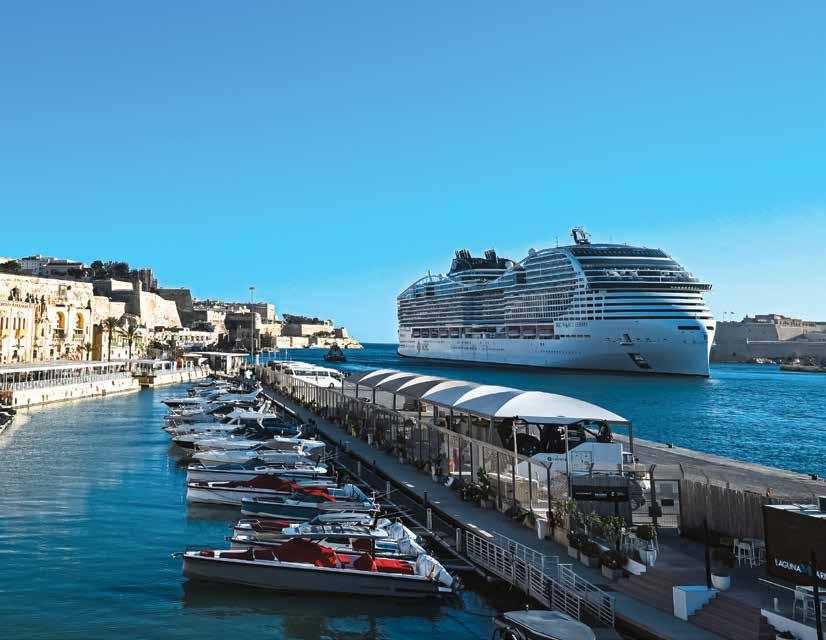
Malta’s popularity as a cruise destination and its inclusion in many cruise lines’ itineraries has led to the ongoing expansion of Valletta Cruise Port, which is set to become one of the Mediterranean’s first cruise ports to offer shore-to-ship power across all berths. Meanwhile, although it lacks dedicated harbour facilities, Gozo is also gaining a positive profile as a destination off the beaten track, with a marked increase in the number of cruise liners berthing off the island.
The cruise sector is undergoing a shift as luxury players like Four Seasons and Ritz-Carlton enter the market, bringing their distinctive hospitality to the seas. This development promises to further boost Malta’s profile, with both brands exhibiting a strong connection to the country through their flags, vessel names and itineraries. As the industry evolves, Malta is poised to be one of the main beneficiaries of this revitalisation of the cruise experience.
Over a 27-year career, Rebecca Bonnici, CEO of BELS English Language Schools, has been driven to foster language-teaching excellence. Today, she persists in this mission through her roles as FELTOM Chairperson, Tourism Operators Business Section Committee Member for The Malta Chamber and ELT Council Board Member.
How does Malta’s strategic location and offering in the Mediterranean influence tourism investment opportunities?
Malta’s strategic location, nestled in the heart of the Mediterranean, has always been a significant advantage in encouraging tourism investment. The islands, serving as a convenient destination and hub, attract travellers from diverse regions. This unique positioning ensures a steady flow of visitors seeking a mix of cultural heritage, leisure and educational experiences, making it an attractive proposition for tourism investors.
Evidence of this can be seen with airlines constantly increasing routes and the frequency of stable routes, which further contributes to the growth of tourism in Malta.
For many years, and despite global upheavals, the ELT industry has been a mainstay of Malta’s tourism product. Could you tell us more about the factors driving its growth?
Malta’s English Language Teaching (ELT) industry has thrived consistently due to several key factors. Malta offers an immersive English-speaking environment unique within the Mediterranean region, making it an attractive option for students from nonEnglish-speaking countries. The country’s established reputation for high-quality education, supported by well-regulated institutions, ongoing improvements in connectivity and competitive pricing, has helped Malta stand out. Moreover, Malta’s compact size and safety appeal to parents sending younger students abroad, while its vibrant leisure activities and cultural offerings cater to older students. Even in the face of global upheavals, the adaptability of Maltese schools, including rapid digitalisation and a strong focus on student welfare, has been critical in maintaining growth and resilience within the sector, giving investors confidence in the sector’s future.
In Malta, the ELT sector has created synergies across other branches of the tourism landscape, such as with the hospitality, entertainment and cultural industries. How has this boosted Malta’s attractiveness to investors?
The interdependence between the ELT sector and other branches of tourism has been crucial in driving investment into Malta. English language students often stay for extended periods, directly supporting the hospitality sector through accommodation and related services. They also engage in the local entertainment scene, visit historical and cultural sites, and participate in leisure

activities, thus fuelling a wide range of economic activities. These synergies create a multiplier effect, enhancing the island’s overall tourism infrastructure. For investors, this means that their stake in the ELT industry is not limited to education alone but is linked to broader, thriving sectors. As a result, Malta has emerged as a holistic destination that offers students more than just learning, and this integration significantly boosts investor confidence.
Looking ahead, what will be the major factors driving more global investment to the Maltese ELT sector in the future?
Several factors will likely drive global investment into the Maltese ELT sector in the coming years. The increasing demand for English as a global lingua franca, especially in emerging economies, will continue to position Malta as a preferred destination for language learning. Innovations in hybrid learning models, combining inperson and online experiences, are expected to broaden market reach. However, the role of Government initiatives to enhance infrastructure and expand student visa offerings cannot be overstated. These steps will be crucial in attracting international students and reassuring potential investors about the sector’s future growth. Malta’s ability to market itself as a safe, culturally rich and welcoming environment will further enhance its attractiveness, especially as more students and parents seek destinations that offer a balanced educational and leisure experience. Finally, Malta’s established reputation and regulatory framework will give investors confidence in the sustainability of the ELT sector’s growth.
Malta has emerged as a holistic destination that offers students more than just learning, and this integration significantly boosts investor confidence.
Robyn Pratt was appointed General Manager of The Phoenicia Hotel Malta in 2021, after over four decades in the hospitality industry. She started her career in catering, owning her own restaurant in Australia by the age of 20, following which she joined ITT Sheraton, which later became Starwood Hotels & Resorts. Since then, she has worked across Europe, Africa and the Middle East in senior roles. She moved to Malta in 2011, working as a consultant for a spate of international hospitality firms before joining The Phoenicia.
Over the past few years, we’ve seen a burgeoning of Malta’s hospitality offering. What are the factors driving investment opportunities in the sector?
Investors have taken advantage of the opportunities presented by the significant growth in tourism to Malta. This has been a persistent trend, which we can credit for attracting investor interest.
In recent years, there has been more awareness of the need to transition from a quantity-driven to a qualityfocused tourism product. In what way would you expect this to impact the hospitality industry? Is there room for further investment in the hospitality sector, or have we reached saturation point?
I support the strategy to better align our tourism product with a quality-focused rather than numbers-based vision – and not just within the hotels industry but across all destination-driven sectors. The attractiveness of Malta as a tourism destination, driven by the appreciation of history and culture, alongside the Mediterranean climate and environment, will diminish if the infrastructure cannot support it. It is not just about the number of hotels or beds on the island; we need to look after the destination to ensure the industry’s future sustainability. Ultimately, both locals and tourists must be able to enjoy Malta as both a home and a place to visit.
With sustainability becoming more of a priority, how do you see the hospitality and accommodation sector evolving in line with developing contingencies, and what investment opportunities could this open up?
Sustainability encompasses many aspects; it’s not solely related to energy consumption but, just as importantly, it includes the protection of local treasures, culture and communities. Our guests love the historical and cultural aspects of Malta, so this is an important consideration for the future. If we operate by balancing the quality versus quantity ratio, we can position Malta in the best way possible. At The Phoenicia Malta, we will continue to identify opportunities to become more sustainable. However, the wider industry also needs to pinpoint any opportunities which will support stakeholders to become more sustainable.

Looking ahead, what will be the major factors driving more global investment to the Maltese hospitality sector?
In my opinion, one of the major factors which will drive global investment to the Maltese hospitality industry is the ability to prove to international investors that the country can support the growth of luxury tourism. This is a segment offering high-quality experiences, approached in a holistic manner. We must therefore consider the entire guest experience. It is not just about offering high-quality accommodation; from arrival to departure, guests need to be provided with that extra level of service. This, I believe, will sustain the industry into the future. Creating meaningful travel experiences should be a priority for the growth of the industry.
Creating meaningful travel experiences should be a priority for the growth of the industry.
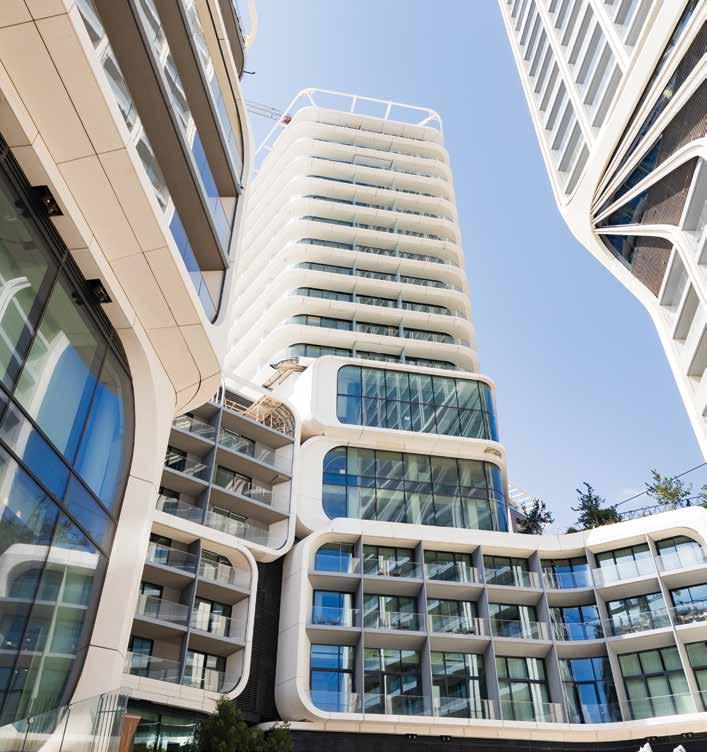
Malta’s tourism sector presents numerous opportunities for investors, from established brands to ambitious entrepreneurs. The variety of experiences the country offers to visitors means there are multiple avenues for potential investment. Capital has poured into several areas as the country revamps its tourism product and looks towards its long-term sustainability, with international hotel chains increasingly seeking to establish a presence in Malta’s thriving tourism market. Independent investors, meanwhile, are renovating historic buildings into boutique accommodation, filling the inevitable market gaps created as tourist arrivals outpace current offerings.
Gastronomy is a major area of opportunity. Since the Michelin Guide’s arrival in Malta in 2020, the fine dining scene has flourished, with restaurants competing for the coveted recognition by enhancing their offerings. In 2024, ION Harbour in Valletta became Malta’s first establishment to earn two Michelin stars. Six other restaurants currently hold one Michelin star, but there is plenty of room for more as the country repositions itself as a destination for discerning tourists seeking elevated quality experiences.
Malta’s retail scene, on the other hand, is arguably trailing behind in this shift towards higher-end offerings. The luxury retail market remains underserved, making it ripe for investment. Although retail
space is not lacking and several upmarket brands can be found on the island, there remains no truly sophisticated suite of haute couture and luxury fashion outlets. One reason for this is the lack of adequate space in Valletta, the natural home of brands serving the truly high-end market segment, though a major redevelopment project currently underway at the capital’s Coliseum complex, located opposite the awe-inspiring St John’s Co-Cathedral, promises to address this need, opening the door to bold investors ready to bring fresh concepts and new brands to an area of unparalleled prestige.
Understanding Malta’s strategic priorities, and why people come here, is crucial for investors looking to tap into the lucrative tourism sector. The drive to become a more refined destination – while maintaining yearround visitor numbers – creates a welcoming environment for highquality investment, particularly for internationally renowned brands with a pull factor of their own. Similarly, initiatives to increase arrivals in the
shoulder months will be well-received, in line with efforts to mitigate the inherently seasonal nature of tourism in a seaside destination. Not that the seaside should be disregarded: around 60 to 70 per cent of tourists cite the sea and culture as their main reasons for travelling to the islands. Meanwhile, business and special occasions such as music festivals and weddings are the main motivators for 8 per cent of travellers, with scuba diving and wellness accounting for 5 per cent each. Just under 4 per cent come to study English at one of the many schools concentrated around Sliema, St Julian’s and St Paul’s Bay.
Investors, companies and entrepreneurs exploring the opportunities offered by a destination attracting over 3.5 million tourists annually will find strong support from the MTA and the Ministry for Tourism, guiding them on the practical realities of the market and the legal obligations that are necessary to ensure that high standards remain the order of the day. The MTA is tasked with promoting Malta as a tourism destination around the world, and is also responsible for the licensing of hotels, short-lets, restaurants, bars, and other tourism-related business, making it a natural first point of contact. As with other sectors, local insight and perspective can make all the difference, so establishing early relationships with the
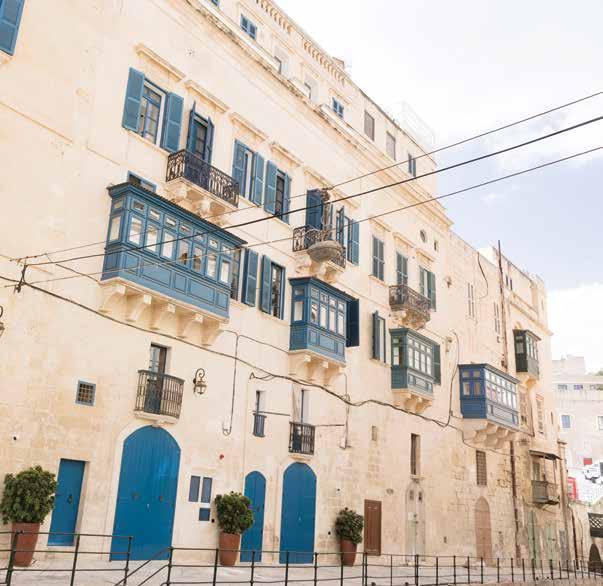
A pioneer of local market research, Lawrence Zammit has been involved in several corporate entities with a leading role in Malta’s economy, and has acted as an advisor, consultant and trainer to numerous commercial endeavours.
Drawing on your more than 40 years of experience in the Maltese business landscape, how has the relative importance of Malta’s tourism sector changed over the years?
The tourism sector has been an essential mainstay of our economy since we achieved independence in 1964. Thanks to significant financial incentives extended by the then-Government, Malta was able to attract global companies such as Hilton and Sheraton to invest here. We had a number of Maltese-owned hotels, which increased as tourism developed in the 1960s. The Corinthia Group, now an international brand with locations across Europe and beyond, owes its origin to that time.
It is certainly unquestionable that the country’s economic growth is due to the development of the tourism sector, which has many facets. Some of these facets, such as educational and health tourism, can be developed further if we pay more attention to quality. We also need to keep in mind that the tourism sector has a positive impact on other economic sectors, such as retailing, transportation and even manufacturing.
As Chairman of Grand Harbour Marina, one of Malta’s top berthing points for superyachts, what synergies or overlaps are there between the yachting and tourism sectors?
In the last 20 years, one of the niches that has been developed is the yachting sector. This is distinct from yacht registration services which a number of professional services firms offer. Grand Harbour Marina, through its parent company Camper & Nicholsons, has put Malta on the map for superyachts. Over the years we have invested a significant amount of money in promoting Malta’s attractiveness as a location for superyacht berthing.
Malta has several natural harbours which are an important attraction. However, in this regard, we need to ensure that the product and service are continually upgraded. Investment in infrastructure is also a must.
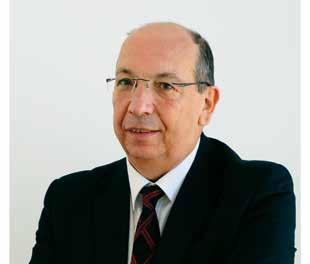
You have also served on the Board of Directors of Malta International Airport (MIA). As the main entryway and exit point for the vast majority of visitors to Malta, what is its role in the country’s tourism sector?
Traditionally, the role of an airport was to provide a service to passengers on arrival and departure. The role of airports changed drastically in the last 30 years or so. They became important players in attracting airlines to a country or region, and Malta has been no exception. In fact, when MIA was privatised, one of the strategic objectives of the Government of Malta was that the operator would help to develop Malta’s connectivity. Thanks to its strategic investment, I would say that MIA has achieved this fully.
What one key piece of advice would you share with a foreign investor looking to invest in Malta’s tourism sector?
Further investment in tourism should be focused exclusively on upgrading our product and service. Malta’s size means that there is a limit to our capacity and the time has come for us to take stock of the situation to make sure that further investment is directed toward improving the quality of our product. Having more of the same would be a waste of resources and money. Certain niches are not yet fully tapped. This does not mean increasing tourism arrivals but rather replacing some existing segments with higher value-added ones. My advice to a foreign investor is to identify these niches and focus on developing them.
Further investment in tourism should be focused exclusively on upgrading our product and service.
Positioned at the crossroads of the Mediterranean, Malta has long been recognised for its strategic location. Today, this historical advantage has taken on new meaning in the business events sector, where the island nation is rapidly emerging as a premier destination for international conferences and corporate gatherings.
“We’re the meeting point in the Mediterranean,” says Antonella Aquilina, Senior Manager at VisitMalta Incentives & Meetings, forming part of the Malta Tourism Authority. With 14 years of experience in the sector, she has witnessed firsthand how Malta’s unique characteristics have shaped its success in the MICE (Meetings, Incentives, Conferences, and Events) industry.

One of Malta’s most distinctive features is the variety of experiences available within remarkably short distances.
“One minute you can be having breakfast by the sea with your colleagues, and the next you can be experiencing a historic area where the knights once were,” Antonella explains. This compact geography allows event organisers to create diverse, rich experiences without the logistical challenges often found in larger destinations.
And while being an island destination might seem limiting, Antonella explains that on the contrary, it has become one of Malta’s strongest selling points. “Having one airport actually helps logistically,” she notes. “People can come directly into Malta, making coordination simpler for international events.” The only downfall – the fact that you can only reach Malta by air or sea from Sicily – is counteracted by excellent flight connections and a comprehensive network that serves international visitors well.
What truly sets Malta apart, however, is its ability to balance historic heritage with modern business requirements. Unlike competitors who might excel in ultra-modern facilities but lack historical depth, Malta offers both. This combination proves particularly attractive to event


“One minute you can be having breakfast by the sea with your colleagues, and the next you can be experiencing a historic area where the knights once were.”
organisers seeking distinctive experiences. “Most of the time, people want to host events somewhere particular, somewhere different,” Antonella explains. “We can offer that uniqueness.”
The island’s emergence as a hub for innovative industries, particularly fintech, blockchain and iGaming, has further enhanced its appeal. These sectors have brought increased international visibility and created valuable ripple effects. Events like SIGMA and MedTech, which the Malta Tourism Authority has supported over the years, have been instrumental in bringing people to experience the country firsthand. “They get to see what the destination has to offer, either to invest and start their businesses here, or for hosting their conferences or incentive trips,” Antonella says.
Professional development and ongoing training form another cornerstone of Malta’s MICE industry excellence. “The MTA offers various training opportunities that are tailored to members of staff and trade partners, across a broad range of topics,” Antonella explains. This commitment to continuous improvement includes innovative approaches like village training sessions, where staff meet local artisans and experience firsthand the cultural elements they’ll be sharing with visitors.
Delving deeper into the island’s benefits, Antonella believes that Malta’s strength in the MICE sector rests on three key pillars. The first is the quality of local trade partners, from international hotel chains to destination management companies. “We offer something different because we tend
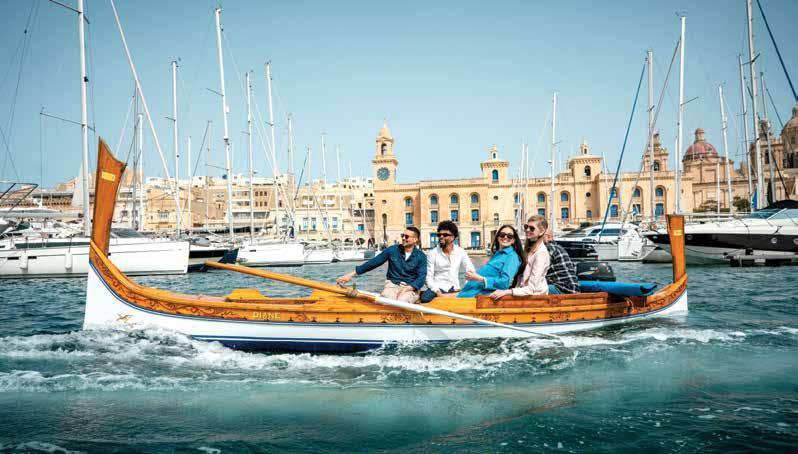
to go the extra mile,” she explains, emphasising the island’s reputation for hospitality. This relationship-driven approach has proven particularly successful, with many destination management companies maintaining client relationships that span years and extend beyond Malta’s borders.
The second advantage is the population’s multilingual capabilities, a factor that Antonella says is often taken for granted locally but provides significant value internationally. “The fact that organisers can find people who can speak professionally in English or any other language is a big plus,” she notes, pointing out that many competing destinations still face language barriers.
The third element is Malta’s distinctive character as an island nation. This uniqueness manifests in everything from local gastronomy to venue options. Antonella highlights Valletta’s Mediterranean Conference Centre as Malta’s flagship location, exemplifying the successful blend of cultural significance and modern capability. “Even though it’s a historic venue, it also has facilities and options for modern technology,” she notes. Indeed, the destination’s strength lies in its variety, with multiple venues within close proximity.
“Considering our size, we actually have five very good convention centres which can offer a multitude of possibilities,” Antonella continues, referencing facilities like the Intercontinental Arena, the Hilton Conference Centre, the MFCC (Malta Fairs and Conventions Centre) and the Oracle Conference Centre.
Meanwhile, event planning in Malta benefits from exceptional attention to detail and contingency planning. “When you’re booking a venue, you will often be given a backup plan with it,” Antonella affirms, which is particularly important for outdoor events, despite the island’s famed favourable year-round weather. This level of preparedness, combined with the close proximity of venues, ensures smooth event execution regardless of circumstances.
The proximity of venues has also led to innovative solutions for large events. “We’ve had larger groups where hotels from different chains partner together,” Antonella explains, highlighting a recent large-scale event in St Julian’s, for which a ‘hub’ was created – with the conference itself taking place in one hotel, and workshops held across several nearby hotels, with people walking between them. This was possible
“When you host an event in Malta, you’re not just choosing a location; you’re embracing a complete experience that can’t be replicated anywhere else.”
because of the weather, the synergy that exists and the close proximity, she smiles.
Gozo, Malta’s sister island, adds another dimension to the country’s MICE offerings. Antonella describes it as “our cherry on the cake,” emphasising that it’s not merely an add-on to Malta programmes but a destination in its own right. “When we’re looking at senior level corporate or more high-end events, Gozo is ideal because there is an added element of privacy and exclusivity,” she explains. “You can literally privatise certain hotels or farmhouses for smaller groups, offering true exclusivity.”
The island also offers unique activities that complement corporate programmes. “There’s kayaking, rock climbing and yacht trips,” Antonella notes, giving some examples. Significant investment from local suppliers, the Gozo Tourism Association and various ministries continues to develop its MICE potential.
Meanwhile, Antonella continues, sustainability has become an increasingly important factor in the MICE industry. While acknowledging that this is an area of ongoing development, she describes her team’s practical approach: “We promote restaurants which follow the farm-to-fork concept and incorporate local wines from local wineries. These might seem like small things, but they have a ripple effect.”
The Authority has also taken concrete steps to advance sustainability initiatives. “During the Covid-19 pandemic, we took the opportunity to focus on this topic,” Antonella reveals. “We offered training for the trade and are seeing more of our trade partners positioning sustainability as one of their core values.” The team also actively participates in knowledge exchange, attending international trade shows like IMEX to learn from other destinations and tourism boards about sustainable practices.
Major events have played a crucial role in establishing Malta’s reputation in the MICE sector. The success of international conferences and exhibitions has created a snowball effect, with each successful event building the island’s credibility as a business destination. “When we host events, the knowledge transfer isn’t just about tourism,” Antonella emphasises. “It’s about creating lasting connections and opportunities that benefit both visitors and locals.”
The Covid-19 pandemic also accelerated Malta’s investment in digital infrastructure, with many companies developing capabilities for hybrid events. This development aligns well with sustainability goals, allowing
some delegates to participate virtually when necessary. “Most hotels and conference spaces offer free Wi-Fi at very good speeds,” Antonella notes, contrasting this with international trade shows where such services often come at a premium.
“What makes Malta unique isn’t just any single element,” Antonella reflects. “It’s the symphony of experiences we can create – from historic venues to cutting-edge facilities, from Mediterranean hospitality to professional excellence. When you host an event in Malta, you’re not just choosing a location; you’re embracing a complete experience that can’t be replicated anywhere else.”
Looking to the future, Antonella’s and her department’s passion for Malta’s MICE industry is evident. “You can’t find Malta and Gozo anywhere else,” she states simply, encapsulating what makes the destination unique. This commitment to creating lasting value, combined with the island’s unique blend of historic charm and modern efficiency, continues to strengthen its position in the international MICE landscape.
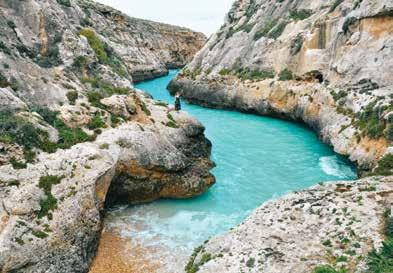

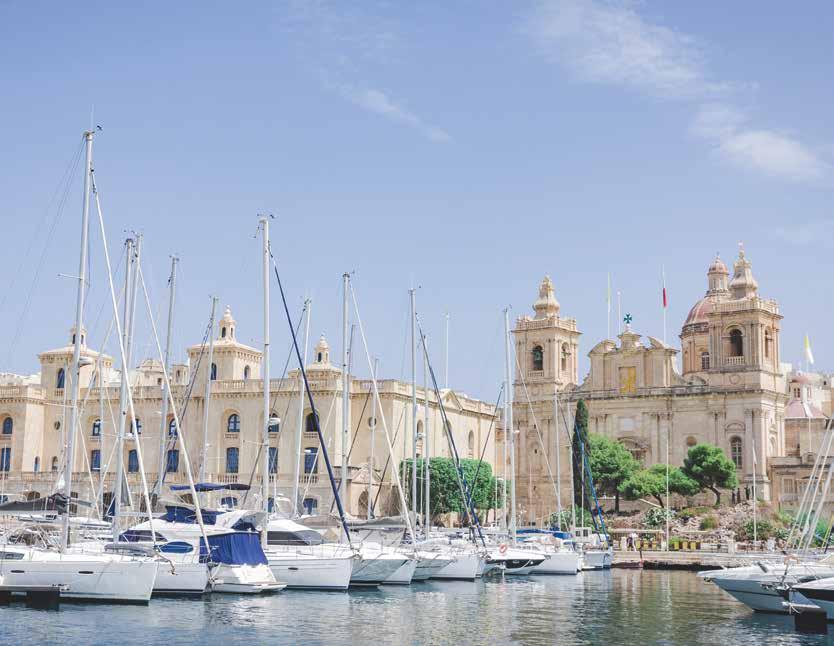
As with everything in life, there are no shortcuts to making sound investment decisions. Investors must begin by considering their unique circumstances and evaluating numerous factors within the ever-evolving environment in which decisions are made. In this publication, we present a carefully curated collection of essential facts and insights to guide prospective investors as they assess the opportunities available in Malta. Throughout, we highlight the importance of strategic connections, emphasising that access to the right information can significantly influence investment outcomes.
This chapter provides useful information for both foreign and local investors embarking on their journey through Malta’s business landscape. It includes a comprehensive directory of authorities, agencies, associations, and organisations, complete with contact details. We also stress the critical role of Malta’s embassies and consulates in promoting cross-border trade and investment, encouraging investors to establish key relationships with their local Maltese representatives.
Malta’s income tax regime is thoroughly explained, outlining the various types of income subject to local taxation and their corresponding obligations. Paired with insights into Malta’s favourable tax rules for foreign shareholders (see p. 68) and those benefiting from Malta’s residency schemes (see p. 92), prospective investors can effectively map their tax exposure. This makes the publication an
indispensable tool for investment planning. Additionally, the detailed inventory of Malta’s bilateral double taxation agreements offers valuable clarity on how Malta’s tax system aligns with those of other countries.
Every investment unfolds within a broader context – regulatory, financial and even physical. A thriving economy depends on efficient logistics networks, quality healthcare and seamless internet connectivity. In this chapter, we provide key details about Malta’s infrastructure, which, thanks to substantial public and private investment, compares favourably with that of highly developed European counterparts.
We are confident that the wealth of information presented here, along with the broader content of Malta Invest, will serve as a crucial resource for those exploring Malta’s economic potential. We hope it becomes a trusted guide, equipping you with the knowledge and insights necessary to make informed and successful investment decisions – whether you’re venturing into new opportunities or expanding existing ones.
Building a local network to support your investment goals is a powerful way to get a head start on your investment journey in Malta. Ample assistance and support are available for those who seek it, whether exploring new opportunities, looking for partners or requesting information on incentives. With support just a phone call or email away, the ease of communication between industry stakeholders at all levels is a key attraction, making the comprehensive list of local entities presented below an important resource for any prospective investor in Malta.
Malta Communications Authority (MCA)
Regulator of all communications services including TV, internet, mobile telephony, and radio, as well as eCommerce.
+356 2133 6840 customercare@mca.org.mt mca.org.mt
University of Malta
The leading higher education institution in Malta with faculties in a wide variety of subjects.
+356 2340 2340 info@um.edu.mt um.edu.mt
Malta College of Arts, Science and Technology (MCAST)
The top vocational and training college with hundreds of courses leading up to Master’s level.
+356 2398 7100 information@mcast.edu.mt mcast.edu.mt
Malta Further and Higher Education Authority (MFHEA)
Accrediting authority of Maltese education institutions providing quality assurance and recognition of local and international qualifications.
+356 2598 1489 info@mfhea.mt mfhea.mt
Department for Industrial and Employment Relations (DIER)
Government entity tasked with supporting good industrial relations and monitoring the legal application of employment contracts.
+356 2122 4245/6 info.dier@gov.mt dier.gov.mt
JobsPlus
The national employment agency issuing work permits.
+356 2125 5153 jobsplus@gov.mt jobsplus.gov.mt
Identità
Issuer of visas, identity cards, passports, and other services.
+356 2590 4000 enquiries.identita@gov.mt identita.gov.mt
Malta Financial Services Authority (MFSA)
Regulator of financial services in Malta.
+356 2144 1155 communications@mfsa.mt mfsa.mt
FinanceMalta
A public-private partnership set up to promote Malta as an international financial centre.
+356 2122 4525 info@financemalta.org financemalta.org
Malta Stock Exchange
Provides access to capital finance to large companies and SMEs alike through its Main and Prospects markets.
+356 2124 4051 borza@borzamalta.com.mt borzamalta.com.mt
Institute of Financial Services Practitioners
Association of professionals working across the entire range of financial services.
+356 9946 7041 / 9934 3240 / 9934 2991 info@ifsp.org.mt ifsp.org.mt
Malta Institute of Accountants
The voice of the accountancy profession in Malta.
+356 2258 1900 info@miamalta.org miamalta.org
Malta Institute of Taxation
Organisation of tax practitioners promoting good practice and knowledge through seminars and courses.
+356 2131 4653 info@maintax.org maintax.org
Private Equity and Venture Capital Association (PEVCA)
Association of fund managers, investors, family offices, and others working in Malta’s private capital ecosystem. info@pevca.mt pevca.mt
Malta Gaming Authority (MGA)
Regulator of all gambling services in Malta.
+356 2546 9000 info.mga@mga.org.mt mga.org.mt
Gaming Malta Foundation
Promoter of Malta as a centre of excellence for the broad gaming industry.
+356 2247 3000 info@gamingmalta.org gamingmalta.org
Association of iGaming companies based in Malta.
+356 7967 6868 info@igenorg.eu igenorg.eu
General Investment
Malta Enterprise
Malta’s economic development agency providing grants, incentives and other assistance for businesses looking to establish themselves in the country.
+356 2542 0000 info@maltaenterprise.com maltaenterprise.com
Malta Enterprise Gozo Office
+356 2156 4700
gozo.office@maltaenterprise.com / info@investingozo.com
Malta Enterprise UK Office
+44 20 7292 4800 peter.meli@maltaenterprise.com
Business 1st
One-stop-shop for business set-up.
+356 2542 2020 info@businessfirst.com.mt businessfirst.com.mt
Start In Malta
Initiative to improve Malta’s startup ecosystem.
+356 2542 0000 connect@startinmalta.com startinmalta.com
Start In Malta Gozo Office
+356 2156 4700
Malta Business Registry
Register of companies based in Malta.
+356 2258 2300 info.mbr@mbr.mt mbr.mt
Malta Government Investments
Government holding company and development partner.
+356 2149 7970 info.mgis@mgis.com.mt mgis.com.mt
Malta Investment Management Company (MIMCOL)
Government entity dedicated to creating, assisting and promoting economic development.
+356 2149 7970 info.mimcol@mimcol.com mimcol.com.mt
Malta Development Bank
Provider of financing facilities to support productive and viable startups, SMEs and infrastructural projects.
+356 2226 1700 info@mdb.org.mt mdb.org.mt
Gozo Regional Authority
Agency promoting economic development in Gozo.
+356 2215 6331/3 info@grda.mt grda.mt
Gozo Business Chamber
Association of businesses in Gozo.
+356 2155 0305 info@gozobusinesschamber.org gozobusinesschamber.org
Gozo Tourism Association
Association of tourism operators working in Gozo.
+356 2156 5171 / 2756 5171 / 2755 1999 info@islandofgozo.org; ceogta@islandofgozo.org islandofgozo.org
INDIS
State entity managing industrial space in Malta and Gozo.
+356 2226 4400 info@indismalta.com indismalta.com Investment Partner
Malta Film Commission
Government entity facilitating film production in Malta through tax credits, co-production grants and other incentives.
+356 2180 9135 info@mfc.com.mt maltafilmcommission.com
Medicines Authority (MA)
Regulator of the pharmaceutical industry in Malta.
+356 2343 9000 info.medicinesauthority@gov.mt medicinesauthority.gov.mt
Life Sciences Park
A life sciences hub providing laboratories and other facilities for research and development activities.
+356 2247 7600 info@maltalifesciencespark.com maltalifesciencespark.com
Planning Authority (PA)
Regulator of planning, zoning and building permits.
+356 2290 0000 customercare@pa.org.mt pa.org.mt
Environment and Resources Authority (ERA)
Regulator of Malta’s natural resources and all practices relating to their management.
+356 2292 3500 info.era@era.org.mt era.org.mt
Malta Development Association
Association of property developers and professionals working in the construction industry.
+356 7949 2095 info@mda.com.mt mda.com.mt
Community Malta Agency Agency managing Maltese citizenship.
+356 2122 5232 info@komunita.gov.mt komunita.gov.mt
Residency Malta Agency Agency managing Maltese residency.
+356 2203 4000 customercare.residencymalta@gov.mt residencymalta.gov.mt
Commissioner for Revenue
Malta’s centralised tax office responsible for income tax, social security and VAT.
+356 2568 5120/3/8 servizz@gov.mt cfr.gov.mt
Customs House
Department responsible for the control of the import and export of goods.
+356 2123 6795 malta.customs@gov.mt customs.gov.mt
Malta Digital Innovation Authority (MDIA)
Authority promoting and supporting Malta’s emergence as a hub of innovative technologies.
+356 2182 8800 info@mdia.gov.mt mdia.gov.mt
Tech.MT
Public-private entity tasked with supporting the development of digital services in Malta.
+356 2226 2100 techmt.contact@tech.mt tech.mt
Xjenza Malta
Advisor, promoter and supporter of Malta’s research and development efforts.
+356 2360 2200 info.xjenzamalta@gov.mt xjenzamalta.mt
Malta Tourism Authority (MTA)
Regulator of hospitality, catering and other tourism-related services.
+356 2291 5000 info@visitmalta.com mta.com.mt / visitmalta.com
Festivals Malta Agency
National body entrusted as caretaker of Malta’s calendar of cultural festivities.
+356 2334 7301 info.fm@festivals.mt festivals.mt
Valletta Cultural Agency
Agency set up to enable Valletta’s continuing development as a major cultural destination.
+356 2124 2018 info@vca.gov.mt vca.gov.mt
Foundation for Tourism Zone Development
Coordinator of facilities, projects and initiatives in zones dedicated to tourism.
+356 2137 6082 ftzd@gov.mt tourism.gov.mt/en/ftzd
Malta International Airport
Main point of entry and exit to and from Malta, serving millions of passengers every year.
+356 2124 9600 maltairport.com
Valletta Cruise Port
Port of call set against the stunning backdrop of Malta’s unique Grand Harbour.
+356 2567 3000 info@vallettacruiseport.com vallettacruiseport.com
Conventions Malta
Promoter of Malta and Gozo as a MICE destination.
+356 2291 5000 info@conventionsmalta.com conventionsmalta.com
Malta Hotels and Restaurants Association
Association of operators involved in the hospitality sector.
+356 2131 8133 mhra@mhra.org.mt mhra.org.mt
Trade
Commerce Department
Department responsible for the issuing of trade licences for certain regulated sectors and operator of Malta’s intellectual property portal.
+356 2122 6688 commerce@gov.mt commerce.gov.mt
TradeMalta
Public-private partnership supporting trade links and providing assistance to export-oriented companies based in Malta.
+356 2247 2400 info@trademalta.org trademalta.org
Valletta Gateway Terminal
Operator of commercial services in Malta’s Grand Harbour with facilities for RoRo, trailers, containers, conventional cargo, and vehicles.
+356 2205 7000 info@vgt.com.mt vgt.com.mt
Malta Freeport Terminals
Malta’s transshipment port serving as a versatile platform for the world’s major shipping lines.
+356 2225 1000 marketing@maltafreeport.com.mt maltafreeport.com.mt
Association
Malta Chamber of Commerce, Enterprise and Industry (The Malta Chamber)
The independent voice of the private sector in Malta, representing the biggest companies on the islands.
+356 2203 2304 info@maltachamber.org.mt maltachamber.org.mt
Malta Chamber of Small and Medium Enterprises
Association representing small and medium businesses operating in Malta.
+356 2123 2881 admin@smechamber.mt smechamber.mt
Malta Employers Association
Union of employers promoting sustainable economic development.
+356 2123 7585 / 2122 2992 admin@maltaemployers.com maltaemployers.com
Transport Malta (TM)
Government body overseeing all transport in Malta.
+356 2122 2203 info.tm@transport.gov.mt transport.gov.mt
TM Civil Aviation Directorate
+356 2555 5412 civil.aviation@transport.gov.mt
TM Merchant Shipping Directorate
+356 2125 0360 mershipmalta.tm@transport.gov.mt
TM Maritime Gozo Office
+356 2155 8856/7
Yachting Malta
Public-private partnership promoting Malta’s development as a hub for yachting events and services.
+356 9982 3780 ceo@yachtingmalta.org yachtingmalta.org
Malta Maritime Forum
Association bringing together all stakeholders in Malta’s maritime industry.
+356 2559 4188 admin@mmf.org.mt mmf.org.mt
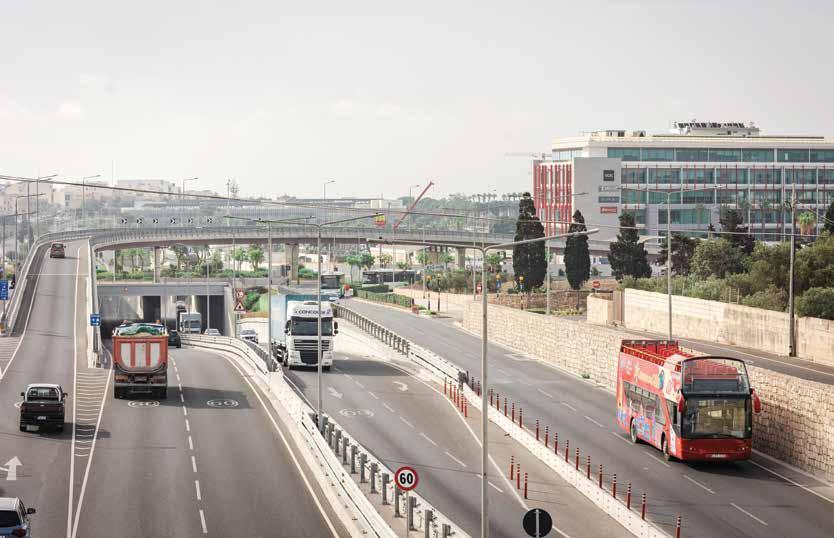

Malta enjoys good diplomatic relations with many countries, and its ambassadors and consuls play an important role in nurturing trade opportunities. Prospective foreign investors may find their local diplomat to be helpful in getting insightful information and direction to make their Maltese venture a smooth success.
Algeria Algiers Consulate +213 023092262 maltaconsulate.algiers@gov.mt
Australia Canberra High Commission +61 2 6290 1724 highcommission.canberra@gov.mt
Consulate +61 3 9670 8427 maltaconsulate.melbourne@gov.mt
Austria Vienna Embassy +43 1 5865010 maltaembassy.vienna@gov.mt
Belgium
2 238 26 08/343 01 95 maltaembassy.brussels@gov.mt
Brazil Brasilia Embassy maltaembassy.brasilia@gov.mt
Canada Toronto Consulate +1 416 207 0922/89 maltaconsulate.toronto@gov.mt
China Beijing Embassy +86 10 6532 3114 maltaembassy.beijing@gov.mt
Consulate +86 21 6265 0166 maltaconsulate.shanghai@gov.mt
Council of Europe Strasbourg Permanent Representation +33 388247610 malta-coe.strasbourg@gov.mt
Egypt
European
2461 9961/2 maltaembassy.cairo@gov.mt
France Paris Embassy +33 1 56 59 75 90 maltaembassy.paris@gov.mt
Germany
30 263 911 0 maltaembassy.berlin@gov.mt
India New Delhi High Commission +91 11 4767 4900 maltahighcommission.newdelhi@ gov.mt
Israel Tel Aviv
+972 3629 5914/5/6 maltaembassy.telaviv@gov.mt
Italy Rome Embassy +39 06 6879990 maltaembassy.rome@gov.mt
Japan Tokyo Embassy +81 3 5404 3450/1 maltaembassy.tokyo@gov.mt
Kuwait Kuwait City Embassy +965 253 880 45/6 maltaembassy.kuwaitcity@gov.mt
Libya Tripoli Embassy
21 3638522 maltaembassy.tripoli@gov.mt
Morocco Casablanca Consulate +212 520275820/4 maltaconsulate.casablanca@gov.mt
Netherlands The Hague Embassy
70 356 12 52 maltaembassy.thehague@gov.mt
Palestine Ramallah Representative Office +970 2 2413210/1 info.ramallah@gov.mt
Poland
Portugal
Qatar Doha
Nizhny Novgorod
22 646 46 39 maltaembassy.warsaw@gov.mt
maltaembassy.doha@gov.mt
maltaembassy.moscow@gov.mt
908 721 4880 maltaconsul.nizhnynovgorod@gov.mt
Saudi Arabia Riyadh Embassy + 966 11 463 2345/461 5315 maltaembassy.riyadh@gov.mt Spain Madrid Embassy +34 91 391 3061 maltaembassy.madrid@gov.mt
Tunisia Tunis Embassy +216 71965811/3652 maltaembassy.tunis@gov.mt Turkey Ankara Embassy
312 447 8051 maltaembassy.ankara@gov.mt
United Arab Emirates Abu Dhabi
United
United Nations Geneva Permanent Representation +41 22 901 05 80 malta-un.geneva@gov.mt
United States of America Washington D.C. Embassy

Malta operates a graduated progressive income tax regime with a top personal tax rate of 35 per cent for incomes above €60,000. The precise income required to qualify for a particular tax band depends on whether the individual is single, married or a parent, as shown below.
It is important to note that not all sources of income are subject to tax. Tax eligibility is also affected by residence and domicile. Individuals resident and domiciled in Malta are subject to personal tax on their worldwide income, while those who are domiciled but not ordinarily resident in Malta are only subject to tax on income arising in Malta and that remitted from abroad. The latter are therefore exempt from Maltese tax on income earned abroad which is not received in Malta. They are also exempt from tax on capital gains arising outside the country, whether or not it is remitted to Malta. However, persons married to an individual who is resident and domiciled in Malta are subject to taxation on their worldwide income, as if they themselves were resident in the country.
Malta has an extensive network of double taxation agreements currently in force. Residents of Malta can benefit from the following minimum rates of tax on dividends, interest and royalties.
This schedule is only intended to give a general outline of the maximum rates of tax applicable to dividends, interest and royalty payments under Malta’s tax treaties. It is advisable to consult the relevant tax treaty for more detailed information.
Source: Commissioner for Revenue
Acountry is only as strong as its infrastructure, so prospective investors will be glad to know that Malta’s compares favourably to that of most developed nations – a fact that may come as a surprise to those unfamiliar with the country. Despite its small size, or perhaps because of it, Malta has invested heavily in its built, digital and soft infrastructure.
Below, you can explore in-depth information about some of Malta’s key physical and digital infrastructure, which undergoes continuous upgrades to equip businesses with the tools they need to operate efficiently and effectively.
Malta International Airport is the first and last destination for over 95 per cent of all visitors to Malta. As the only air terminal in the country, it is a key contributor to its economic development, a role it has embraced by constantly investing in improvements to its facilities. Two runways, 3.5km and 2.4km long, connect Malta to around 100 destinations, including most regional capitals and major cities, many less than three hours away, through over 30 partner airlines. The 72,000sqm terminal hosts over 15 food and beverage outlets, 10 retail outlets and a pharmacy. Business travellers can make use of two executive lounges, while a separate, exclusive VIP terminal is typically used for diplomatic travel. The airport campus also includes 2,700 parking spaces, dedicated taxi and coach areas, and a state-of-the-art business centre, home to distinguished operations such as Microsoft and VistaJet. Over 18,000 tonnes of cargo pass through the airport annually, as it serves as the main base of Maltese
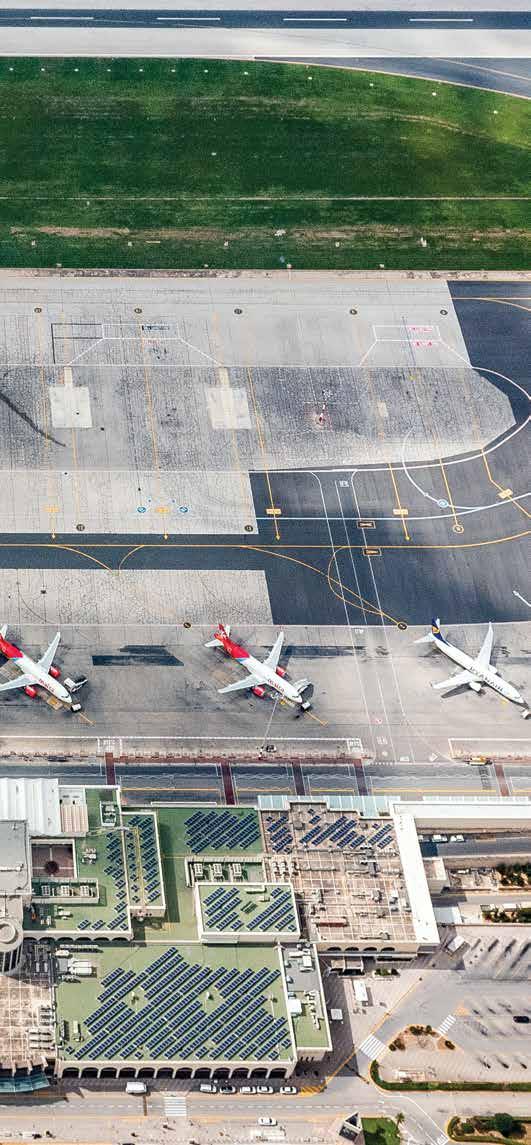
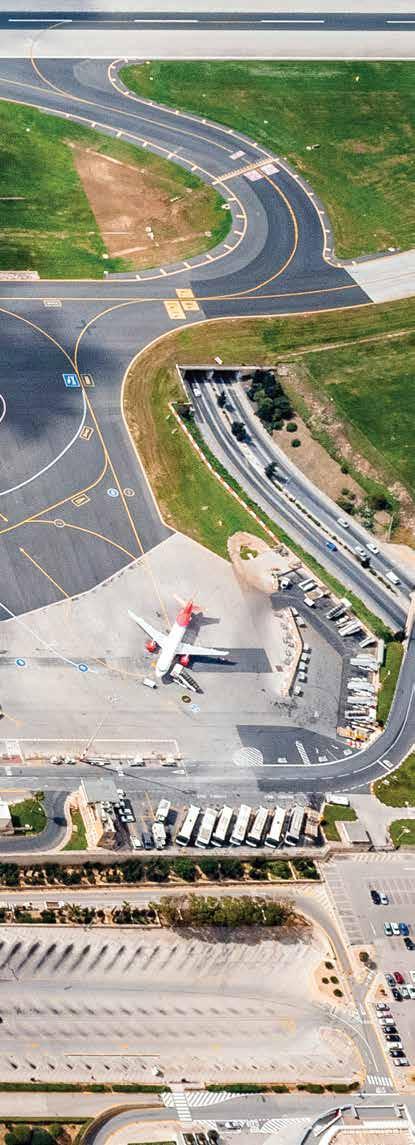
operations for global companies like DHL and Servisair. It also hosts several maintenance facilities, including those operated by Lufthansa Technik, Ryanair and easyJet. Since 2018, Malta International Airport has won Airports Council International’s Best Airport in Europe title six years in a row.
Further upgrades are underway, with plans to build a second business centre and a tenth apron, including a new taxiway and a staging area for ground handling operations. These projects, slated for completion in 2026, will prepare the airport for increasing traffic and commercial growth while reducing resource use.
As an island nation with a strong maritime tradition, Malta has long recognised the importance of maintaining the competitive edge of its port facilities. The Port of Valletta, also known as the Grand Harbour, is the main entry point for people and goods arriving by sea. It extends around 3.6km inland, operates 24 hours a day, 365 days a year, and offers a wide array of services, including ship repair and building yards, ship chandelling, bunkering facilities, and specialised silos. The main terminal can handle container, RoRo and conventional cargo. The Grand Harbour also houses the Valletta Cruise Port and provides ferry links to Sicily and Gozo.
Marsamxett Harbour, on the opposite side of Valletta, near the cosmopolitan areas of Sliema and Gżira, is largely dedicated to leisure activity and boasts several acclaimed yacht marinas.
At the southern end of the main island lies the Malta Freeport, which ranks among the Mediterranean’s largest transshipment ports. Operated by Yildirim Group, CMA-CGM and CMPort, its two terminals offer 2,462m of operational deep-water quays, 771,000sqm for container storage, a total of 15,297 container ground slots, and 1,840 reefer slots. With a water depth of 17m, the port can accommodate the latest class of 24,000 TEU vessels. The freeport has received over 2,000 ship calls and handled over 3 million TEU in a single year, with its 20 quayside cranes, 60 gantry cranes and highly skilled, dedicated personnel delivering fast turnarounds for some of the world’s largest shipping companies. Malta’s strategic position is fully exploited with over 120 global port connections, and the port continues to invest heavily in digitalisation, infrastructural development, productivity, and ongoing workforce training to stay ahead of the curve and meet demanding clients’ high expectations.
In 2023, Malta Freeport embarked on a €90 million extension to accommodate the mega container ships currently in development. Scheduled for completion in late 2024, the extension will increase the terminal’s capacity to 4 million TEU.
Most of Malta’s industrial space is spread across more than 15 industrial estates managed by a dedicated state agency, INDIS. Each industrial estate offers a variety of property solutions, which can often be tailored to tenants’ needs, with some estates equipped for specific sectors and industries, such as the Life Sciences Park, home to cutting-edge laboratories, and the Safi Aviation Park. However, manufacturing of all kinds remains the most common use for such spaces. INDIS takes a proactive approach to facilitating the setting up of business operations in Malta, working hand in hand with investors to find the solution that best suits their needs.
To prepare the country for the technological transition of the coming years, INDIS is making significant investments to expand and improve the industrial space on offer. These investments include the redevelopment of Kordin Business Centre into a modern startup facility and the extension of the Life Sciences Park. Investors interested in exploring the range of properties and potential partnerships available should contact INDIS or Malta Enterprise.
Malta’s main hospital, Mater Dei, is a modern, dynamic facility housed in one of the largest medical buildings in Europe, serving as an acute, general and teaching hospital, with a specialised oncology division located nearby. The Life Sciences Park is also in close proximity, facilitating the seamless integration of the latest R&D into clinical practice. Healthcare in Gozo is also excellent, evidenced by Queen Mary University of London’s renowned Barts Medical School’s decision to open a campus next door to Gozo General Hospital. Moreover, private healthcare providers operate specialised clinics and hospitals across the islands.
The public health service is free at the point of delivery for anyone working and paying social security contributions. Regardless of one’s insurance cover or lack thereof, no one is turned away in an emergency, although proof of insurance will be requested once the patient’s condition has stabilised.
As in the rest of the EU, the emergency freephone number to call for an ambulance is 112.
Malta has a well-regarded public school system, with free education available to locals up to tertiary level. The Catholic Church operates several schools, and there are also a relatively small number of private schools. Three of these,
Verdala, QSI and the newly opened Haileybury, cater to the expat community, offering international qualifications.
The University of Malta and the Malta College of Arts, Science and Technology are the main state-funded post-secondary and tertiary institutions, offering a wide selection of degrees in nearly all key subjects. Over the last two decades, several private institutions have also established themselves, with many partnering with international (mostly British) universities to offer internationally recognised qualifications, making Malta an attractive destination for those seeking a world-class education under clear blue skies.
Dialogue between higher education and industry is ongoing, with Government-backed research funds acting as catalysts for collaborative R&D projects that often reach the market and, at times, attract the attention of global players. Once again, the authorities’ willingness to listen and intervene as needed plays a crucial role in fostering fruitful cooperation.
Two of Malta’s most significant drivers of growth in the 21st century, together contributing nearly a fifth of GDP, are gaming and financial services. The fact that these two industries, which are heavily reliant on fast and stable network connections, were able to develop and succeed highlights the quality of the country’s communications infrastructure, which compares favourably with that of most major European cities. In fact, Malta is the only EU member state with full coverage of ultrafast fixed internet, while the three mobile operators in the liberalised market provide coverage extending to every corner of the country.
The European Commission’s Digital Economy and Society Index (DESI) ranks Malta fifth among EU member states, with the country performing above the EU average in all five dimensions of the index. The success of Malta’s IT infrastructure in supporting sectors such as software and game development, gaming and financial services, has spurred further investment, with the country now positioning itself to venture into future tech like artificial intelligence (AI) and the Internet of Things (IoT).
Malta is connected to the internet via several cable links to Sicily, while Gozo, which has its own digital development agenda, is connected to the main island through two fibre optic cables. The second cable, opened in late 2020, aims to attract tech investment to Gozo.
